Role of Project Manager in Implementing Enterprise System in Nigerian Telecoms Companies
VerifiedAdded on 2022/12/05
|89
|26690
|284
AI Summary
This research highlights the role of the project manager in transforming the business functionality of Nigerian telecom companies with the implementation of enterprise management system. It aims to recommend different methodologies of information technologies for improving the efficiency of the telecom industry. The research focuses on the character played by the project manager in implementing the EMS system and the benefits it brings to the telecom industry. The research also analyzes the challenges faced by the project manager and the impact of EMS on the performance of the telecom industry. The research is conducted on two telecom companies in Nigeria, NTEL and 9Mobile.
Contribute Materials
Your contribution can guide someone’s learning journey. Share your
documents today.
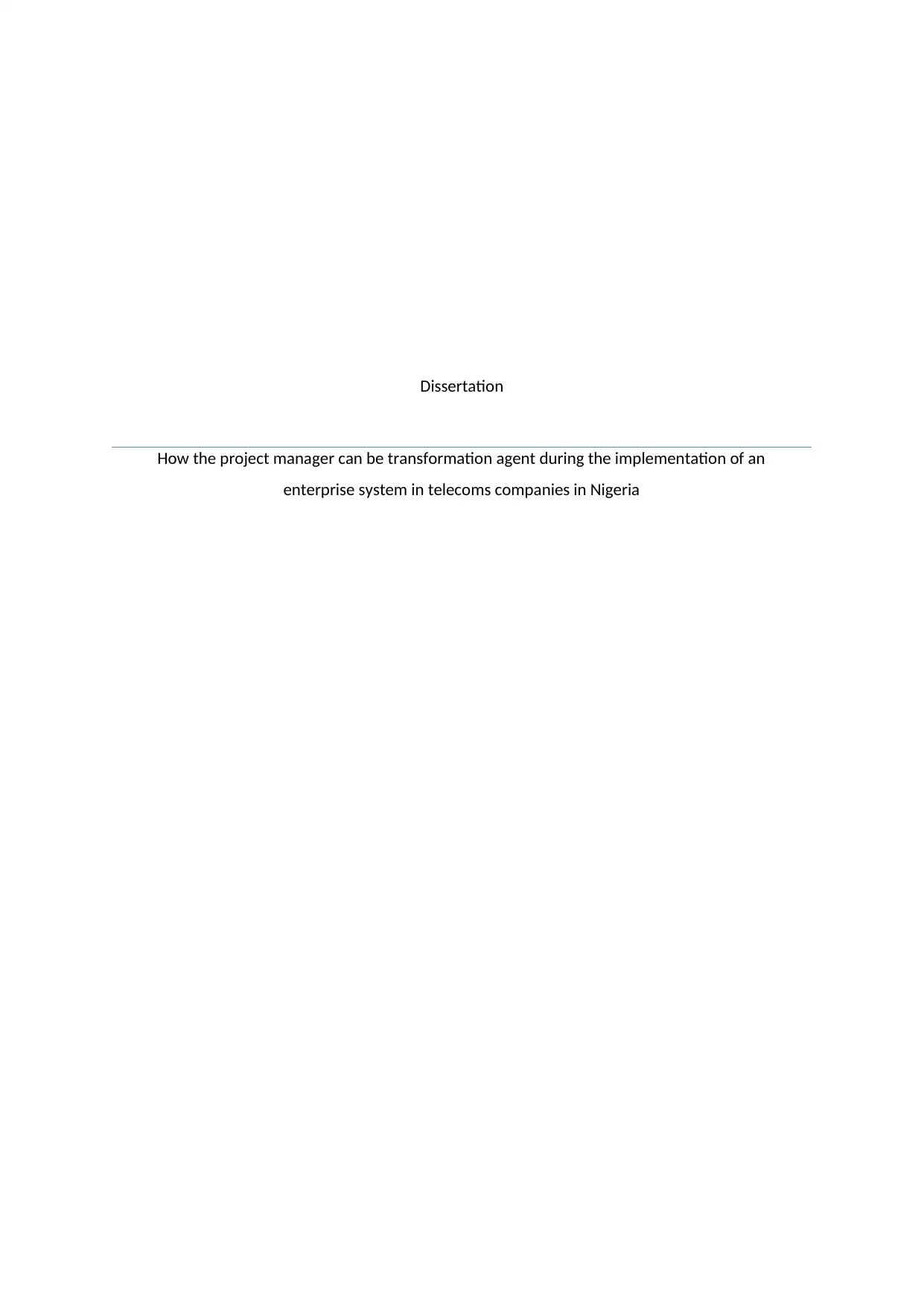
Dissertation
How the project manager can be transformation agent during the implementation of an
enterprise system in telecoms companies in Nigeria
How the project manager can be transformation agent during the implementation of an
enterprise system in telecoms companies in Nigeria
Secure Best Marks with AI Grader
Need help grading? Try our AI Grader for instant feedback on your assignments.
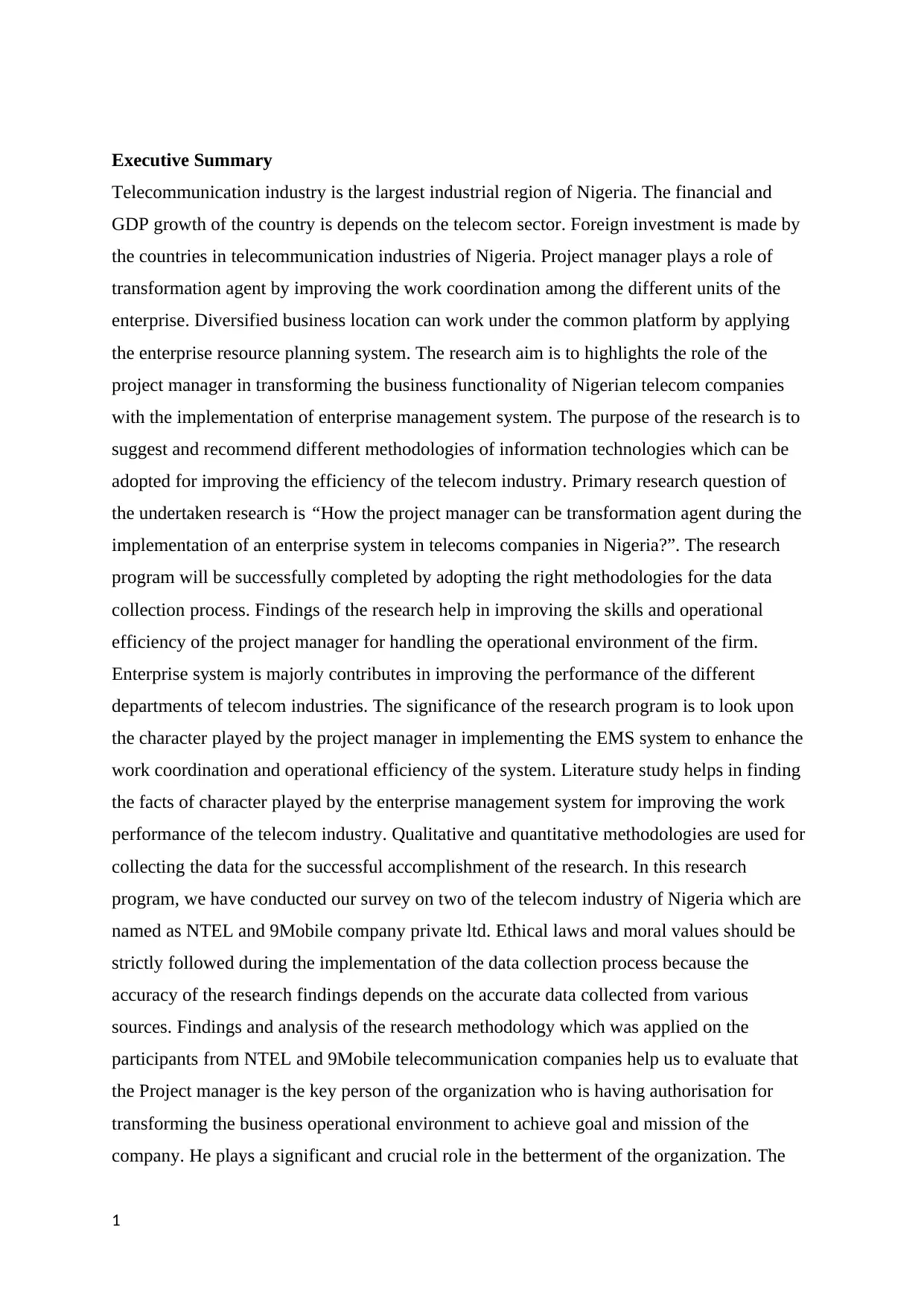
Executive Summary
Telecommunication industry is the largest industrial region of Nigeria. The financial and
GDP growth of the country is depends on the telecom sector. Foreign investment is made by
the countries in telecommunication industries of Nigeria. Project manager plays a role of
transformation agent by improving the work coordination among the different units of the
enterprise. Diversified business location can work under the common platform by applying
the enterprise resource planning system. The research aim is to highlights the role of the
project manager in transforming the business functionality of Nigerian telecom companies
with the implementation of enterprise management system. The purpose of the research is to
suggest and recommend different methodologies of information technologies which can be
adopted for improving the efficiency of the telecom industry. Primary research question of
the undertaken research is “How the project manager can be transformation agent during the
implementation of an enterprise system in telecoms companies in Nigeria?”. The research
program will be successfully completed by adopting the right methodologies for the data
collection process. Findings of the research help in improving the skills and operational
efficiency of the project manager for handling the operational environment of the firm.
Enterprise system is majorly contributes in improving the performance of the different
departments of telecom industries. The significance of the research program is to look upon
the character played by the project manager in implementing the EMS system to enhance the
work coordination and operational efficiency of the system. Literature study helps in finding
the facts of character played by the enterprise management system for improving the work
performance of the telecom industry. Qualitative and quantitative methodologies are used for
collecting the data for the successful accomplishment of the research. In this research
program, we have conducted our survey on two of the telecom industry of Nigeria which are
named as NTEL and 9Mobile company private ltd. Ethical laws and moral values should be
strictly followed during the implementation of the data collection process because the
accuracy of the research findings depends on the accurate data collected from various
sources. Findings and analysis of the research methodology which was applied on the
participants from NTEL and 9Mobile telecommunication companies help us to evaluate that
the Project manager is the key person of the organization who is having authorisation for
transforming the business operational environment to achieve goal and mission of the
company. He plays a significant and crucial role in the betterment of the organization. The
1
Telecommunication industry is the largest industrial region of Nigeria. The financial and
GDP growth of the country is depends on the telecom sector. Foreign investment is made by
the countries in telecommunication industries of Nigeria. Project manager plays a role of
transformation agent by improving the work coordination among the different units of the
enterprise. Diversified business location can work under the common platform by applying
the enterprise resource planning system. The research aim is to highlights the role of the
project manager in transforming the business functionality of Nigerian telecom companies
with the implementation of enterprise management system. The purpose of the research is to
suggest and recommend different methodologies of information technologies which can be
adopted for improving the efficiency of the telecom industry. Primary research question of
the undertaken research is “How the project manager can be transformation agent during the
implementation of an enterprise system in telecoms companies in Nigeria?”. The research
program will be successfully completed by adopting the right methodologies for the data
collection process. Findings of the research help in improving the skills and operational
efficiency of the project manager for handling the operational environment of the firm.
Enterprise system is majorly contributes in improving the performance of the different
departments of telecom industries. The significance of the research program is to look upon
the character played by the project manager in implementing the EMS system to enhance the
work coordination and operational efficiency of the system. Literature study helps in finding
the facts of character played by the enterprise management system for improving the work
performance of the telecom industry. Qualitative and quantitative methodologies are used for
collecting the data for the successful accomplishment of the research. In this research
program, we have conducted our survey on two of the telecom industry of Nigeria which are
named as NTEL and 9Mobile company private ltd. Ethical laws and moral values should be
strictly followed during the implementation of the data collection process because the
accuracy of the research findings depends on the accurate data collected from various
sources. Findings and analysis of the research methodology which was applied on the
participants from NTEL and 9Mobile telecommunication companies help us to evaluate that
the Project manager is the key person of the organization who is having authorisation for
transforming the business operational environment to achieve goal and mission of the
company. He plays a significant and crucial role in the betterment of the organization. The
1
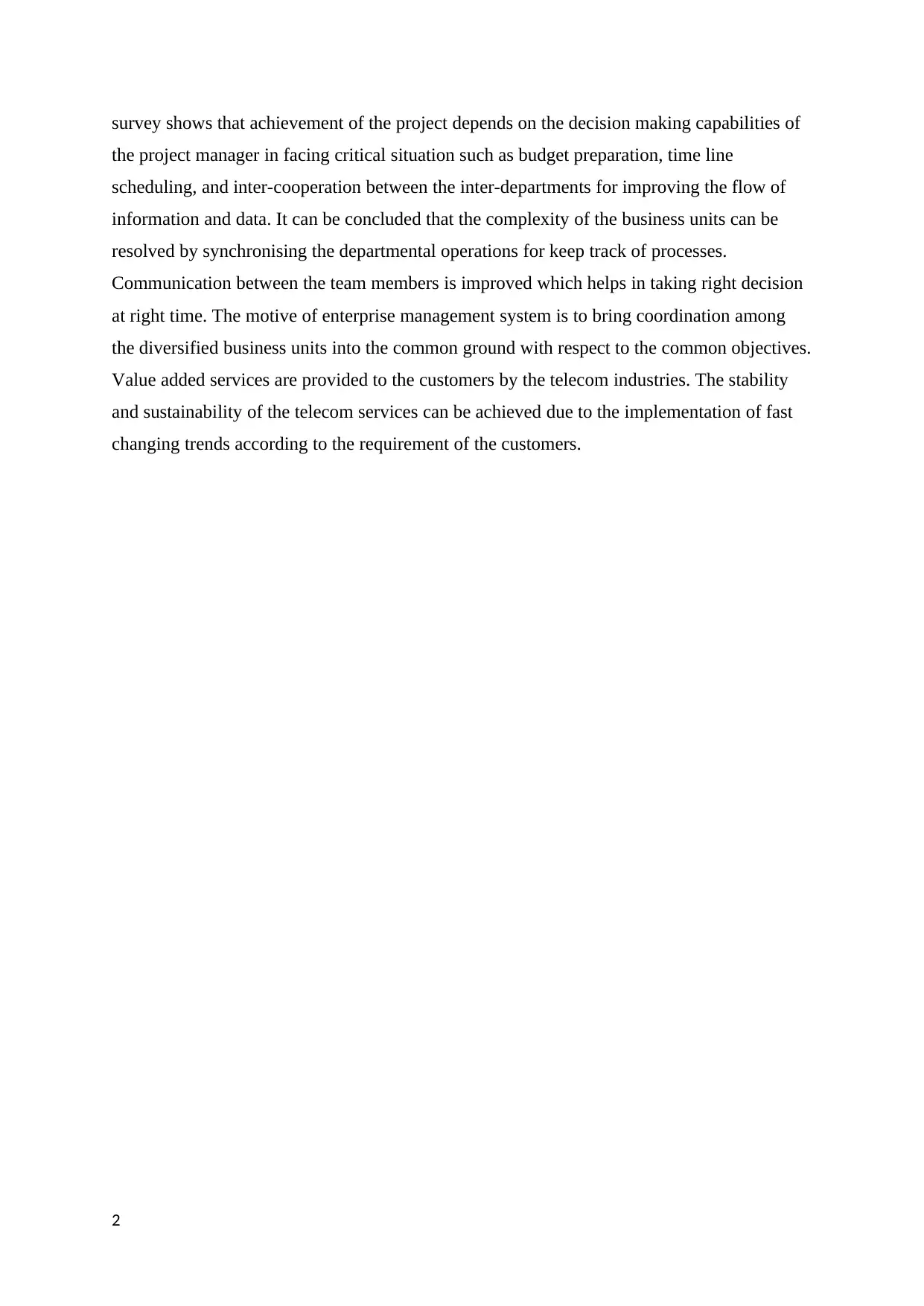
survey shows that achievement of the project depends on the decision making capabilities of
the project manager in facing critical situation such as budget preparation, time line
scheduling, and inter-cooperation between the inter-departments for improving the flow of
information and data. It can be concluded that the complexity of the business units can be
resolved by synchronising the departmental operations for keep track of processes.
Communication between the team members is improved which helps in taking right decision
at right time. The motive of enterprise management system is to bring coordination among
the diversified business units into the common ground with respect to the common objectives.
Value added services are provided to the customers by the telecom industries. The stability
and sustainability of the telecom services can be achieved due to the implementation of fast
changing trends according to the requirement of the customers.
2
the project manager in facing critical situation such as budget preparation, time line
scheduling, and inter-cooperation between the inter-departments for improving the flow of
information and data. It can be concluded that the complexity of the business units can be
resolved by synchronising the departmental operations for keep track of processes.
Communication between the team members is improved which helps in taking right decision
at right time. The motive of enterprise management system is to bring coordination among
the diversified business units into the common ground with respect to the common objectives.
Value added services are provided to the customers by the telecom industries. The stability
and sustainability of the telecom services can be achieved due to the implementation of fast
changing trends according to the requirement of the customers.
2
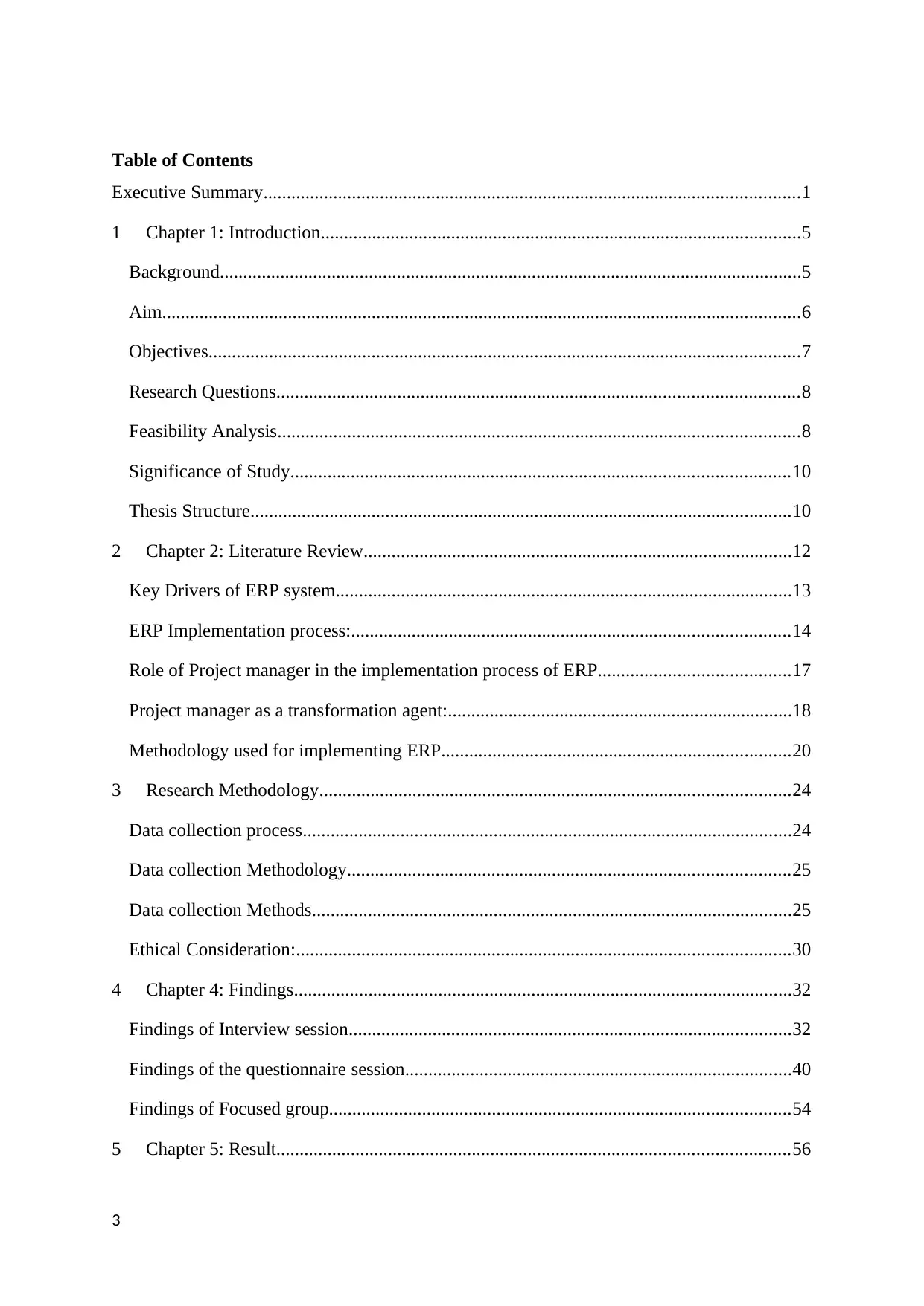
Table of Contents
Executive Summary...................................................................................................................1
1 Chapter 1: Introduction.......................................................................................................5
Background.............................................................................................................................5
Aim.........................................................................................................................................6
Objectives...............................................................................................................................7
Research Questions................................................................................................................8
Feasibility Analysis................................................................................................................8
Significance of Study...........................................................................................................10
Thesis Structure....................................................................................................................10
2 Chapter 2: Literature Review............................................................................................12
Key Drivers of ERP system..................................................................................................13
ERP Implementation process:..............................................................................................14
Role of Project manager in the implementation process of ERP.........................................17
Project manager as a transformation agent:..........................................................................18
Methodology used for implementing ERP...........................................................................20
3 Research Methodology.....................................................................................................24
Data collection process.........................................................................................................24
Data collection Methodology...............................................................................................25
Data collection Methods.......................................................................................................25
Ethical Consideration:..........................................................................................................30
4 Chapter 4: Findings...........................................................................................................32
Findings of Interview session...............................................................................................32
Findings of the questionnaire session...................................................................................40
Findings of Focused group...................................................................................................54
5 Chapter 5: Result..............................................................................................................56
3
Executive Summary...................................................................................................................1
1 Chapter 1: Introduction.......................................................................................................5
Background.............................................................................................................................5
Aim.........................................................................................................................................6
Objectives...............................................................................................................................7
Research Questions................................................................................................................8
Feasibility Analysis................................................................................................................8
Significance of Study...........................................................................................................10
Thesis Structure....................................................................................................................10
2 Chapter 2: Literature Review............................................................................................12
Key Drivers of ERP system..................................................................................................13
ERP Implementation process:..............................................................................................14
Role of Project manager in the implementation process of ERP.........................................17
Project manager as a transformation agent:..........................................................................18
Methodology used for implementing ERP...........................................................................20
3 Research Methodology.....................................................................................................24
Data collection process.........................................................................................................24
Data collection Methodology...............................................................................................25
Data collection Methods.......................................................................................................25
Ethical Consideration:..........................................................................................................30
4 Chapter 4: Findings...........................................................................................................32
Findings of Interview session...............................................................................................32
Findings of the questionnaire session...................................................................................40
Findings of Focused group...................................................................................................54
5 Chapter 5: Result..............................................................................................................56
3
Secure Best Marks with AI Grader
Need help grading? Try our AI Grader for instant feedback on your assignments.

6 Chapter 6: Discussion.......................................................................................................65
Project Manager as a transformation agent by using ERP:..................................................68
7 Chapter 7: Conclusion......................................................................................................73
8 References.........................................................................................................................76
4
Project Manager as a transformation agent by using ERP:..................................................68
7 Chapter 7: Conclusion......................................................................................................73
8 References.........................................................................................................................76
4
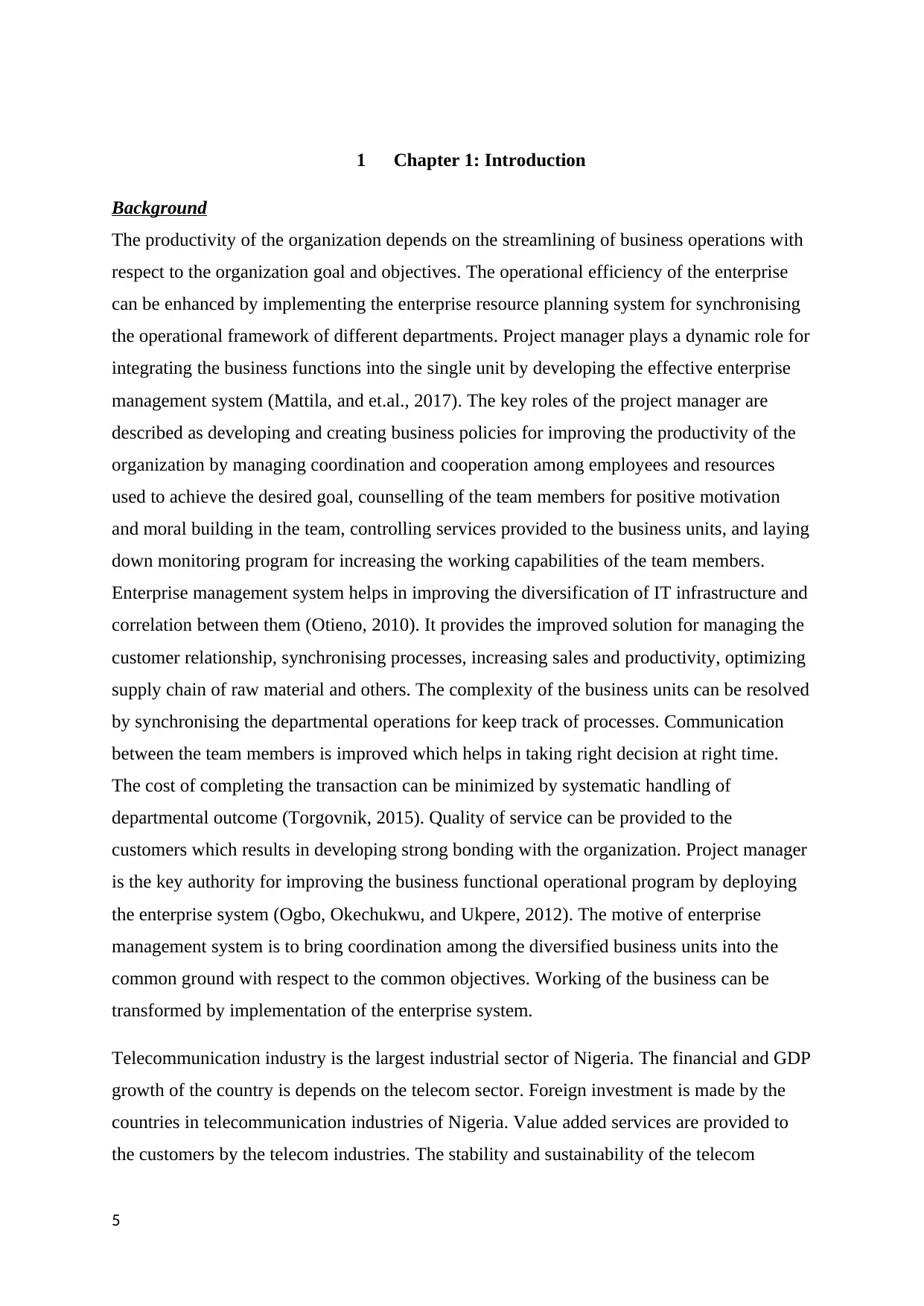
1 Chapter 1: Introduction
Background
The productivity of the organization depends on the streamlining of business operations with
respect to the organization goal and objectives. The operational efficiency of the enterprise
can be enhanced by implementing the enterprise resource planning system for synchronising
the operational framework of different departments. Project manager plays a dynamic role for
integrating the business functions into the single unit by developing the effective enterprise
management system (Mattila, and et.al., 2017). The key roles of the project manager are
described as developing and creating business policies for improving the productivity of the
organization by managing coordination and cooperation among employees and resources
used to achieve the desired goal, counselling of the team members for positive motivation
and moral building in the team, controlling services provided to the business units, and laying
down monitoring program for increasing the working capabilities of the team members.
Enterprise management system helps in improving the diversification of IT infrastructure and
correlation between them (Otieno, 2010). It provides the improved solution for managing the
customer relationship, synchronising processes, increasing sales and productivity, optimizing
supply chain of raw material and others. The complexity of the business units can be resolved
by synchronising the departmental operations for keep track of processes. Communication
between the team members is improved which helps in taking right decision at right time.
The cost of completing the transaction can be minimized by systematic handling of
departmental outcome (Torgovnik, 2015). Quality of service can be provided to the
customers which results in developing strong bonding with the organization. Project manager
is the key authority for improving the business functional operational program by deploying
the enterprise system (Ogbo, Okechukwu, and Ukpere, 2012). The motive of enterprise
management system is to bring coordination among the diversified business units into the
common ground with respect to the common objectives. Working of the business can be
transformed by implementation of the enterprise system.
Telecommunication industry is the largest industrial sector of Nigeria. The financial and GDP
growth of the country is depends on the telecom sector. Foreign investment is made by the
countries in telecommunication industries of Nigeria. Value added services are provided to
the customers by the telecom industries. The stability and sustainability of the telecom
5
Background
The productivity of the organization depends on the streamlining of business operations with
respect to the organization goal and objectives. The operational efficiency of the enterprise
can be enhanced by implementing the enterprise resource planning system for synchronising
the operational framework of different departments. Project manager plays a dynamic role for
integrating the business functions into the single unit by developing the effective enterprise
management system (Mattila, and et.al., 2017). The key roles of the project manager are
described as developing and creating business policies for improving the productivity of the
organization by managing coordination and cooperation among employees and resources
used to achieve the desired goal, counselling of the team members for positive motivation
and moral building in the team, controlling services provided to the business units, and laying
down monitoring program for increasing the working capabilities of the team members.
Enterprise management system helps in improving the diversification of IT infrastructure and
correlation between them (Otieno, 2010). It provides the improved solution for managing the
customer relationship, synchronising processes, increasing sales and productivity, optimizing
supply chain of raw material and others. The complexity of the business units can be resolved
by synchronising the departmental operations for keep track of processes. Communication
between the team members is improved which helps in taking right decision at right time.
The cost of completing the transaction can be minimized by systematic handling of
departmental outcome (Torgovnik, 2015). Quality of service can be provided to the
customers which results in developing strong bonding with the organization. Project manager
is the key authority for improving the business functional operational program by deploying
the enterprise system (Ogbo, Okechukwu, and Ukpere, 2012). The motive of enterprise
management system is to bring coordination among the diversified business units into the
common ground with respect to the common objectives. Working of the business can be
transformed by implementation of the enterprise system.
Telecommunication industry is the largest industrial sector of Nigeria. The financial and GDP
growth of the country is depends on the telecom sector. Foreign investment is made by the
countries in telecommunication industries of Nigeria. Value added services are provided to
the customers by the telecom industries. The stability and sustainability of the telecom
5
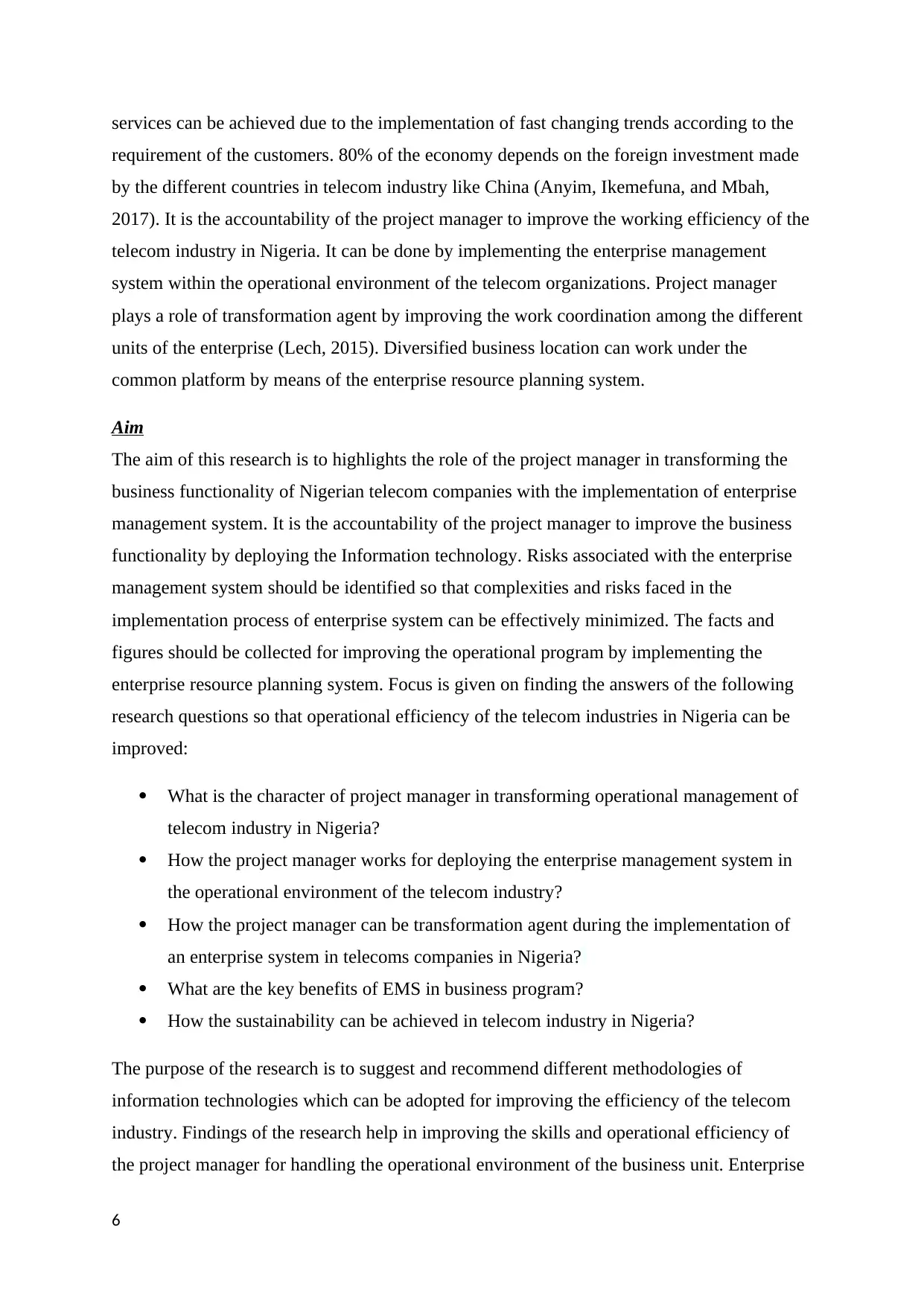
services can be achieved due to the implementation of fast changing trends according to the
requirement of the customers. 80% of the economy depends on the foreign investment made
by the different countries in telecom industry like China (Anyim, Ikemefuna, and Mbah,
2017). It is the accountability of the project manager to improve the working efficiency of the
telecom industry in Nigeria. It can be done by implementing the enterprise management
system within the operational environment of the telecom organizations. Project manager
plays a role of transformation agent by improving the work coordination among the different
units of the enterprise (Lech, 2015). Diversified business location can work under the
common platform by means of the enterprise resource planning system.
Aim
The aim of this research is to highlights the role of the project manager in transforming the
business functionality of Nigerian telecom companies with the implementation of enterprise
management system. It is the accountability of the project manager to improve the business
functionality by deploying the Information technology. Risks associated with the enterprise
management system should be identified so that complexities and risks faced in the
implementation process of enterprise system can be effectively minimized. The facts and
figures should be collected for improving the operational program by implementing the
enterprise resource planning system. Focus is given on finding the answers of the following
research questions so that operational efficiency of the telecom industries in Nigeria can be
improved:
What is the character of project manager in transforming operational management of
telecom industry in Nigeria?
How the project manager works for deploying the enterprise management system in
the operational environment of the telecom industry?
How the project manager can be transformation agent during the implementation of
an enterprise system in telecoms companies in Nigeria?
What are the key benefits of EMS in business program?
How the sustainability can be achieved in telecom industry in Nigeria?
The purpose of the research is to suggest and recommend different methodologies of
information technologies which can be adopted for improving the efficiency of the telecom
industry. Findings of the research help in improving the skills and operational efficiency of
the project manager for handling the operational environment of the business unit. Enterprise
6
requirement of the customers. 80% of the economy depends on the foreign investment made
by the different countries in telecom industry like China (Anyim, Ikemefuna, and Mbah,
2017). It is the accountability of the project manager to improve the working efficiency of the
telecom industry in Nigeria. It can be done by implementing the enterprise management
system within the operational environment of the telecom organizations. Project manager
plays a role of transformation agent by improving the work coordination among the different
units of the enterprise (Lech, 2015). Diversified business location can work under the
common platform by means of the enterprise resource planning system.
Aim
The aim of this research is to highlights the role of the project manager in transforming the
business functionality of Nigerian telecom companies with the implementation of enterprise
management system. It is the accountability of the project manager to improve the business
functionality by deploying the Information technology. Risks associated with the enterprise
management system should be identified so that complexities and risks faced in the
implementation process of enterprise system can be effectively minimized. The facts and
figures should be collected for improving the operational program by implementing the
enterprise resource planning system. Focus is given on finding the answers of the following
research questions so that operational efficiency of the telecom industries in Nigeria can be
improved:
What is the character of project manager in transforming operational management of
telecom industry in Nigeria?
How the project manager works for deploying the enterprise management system in
the operational environment of the telecom industry?
How the project manager can be transformation agent during the implementation of
an enterprise system in telecoms companies in Nigeria?
What are the key benefits of EMS in business program?
How the sustainability can be achieved in telecom industry in Nigeria?
The purpose of the research is to suggest and recommend different methodologies of
information technologies which can be adopted for improving the efficiency of the telecom
industry. Findings of the research help in improving the skills and operational efficiency of
the project manager for handling the operational environment of the business unit. Enterprise
6
Paraphrase This Document
Need a fresh take? Get an instant paraphrase of this document with our AI Paraphraser
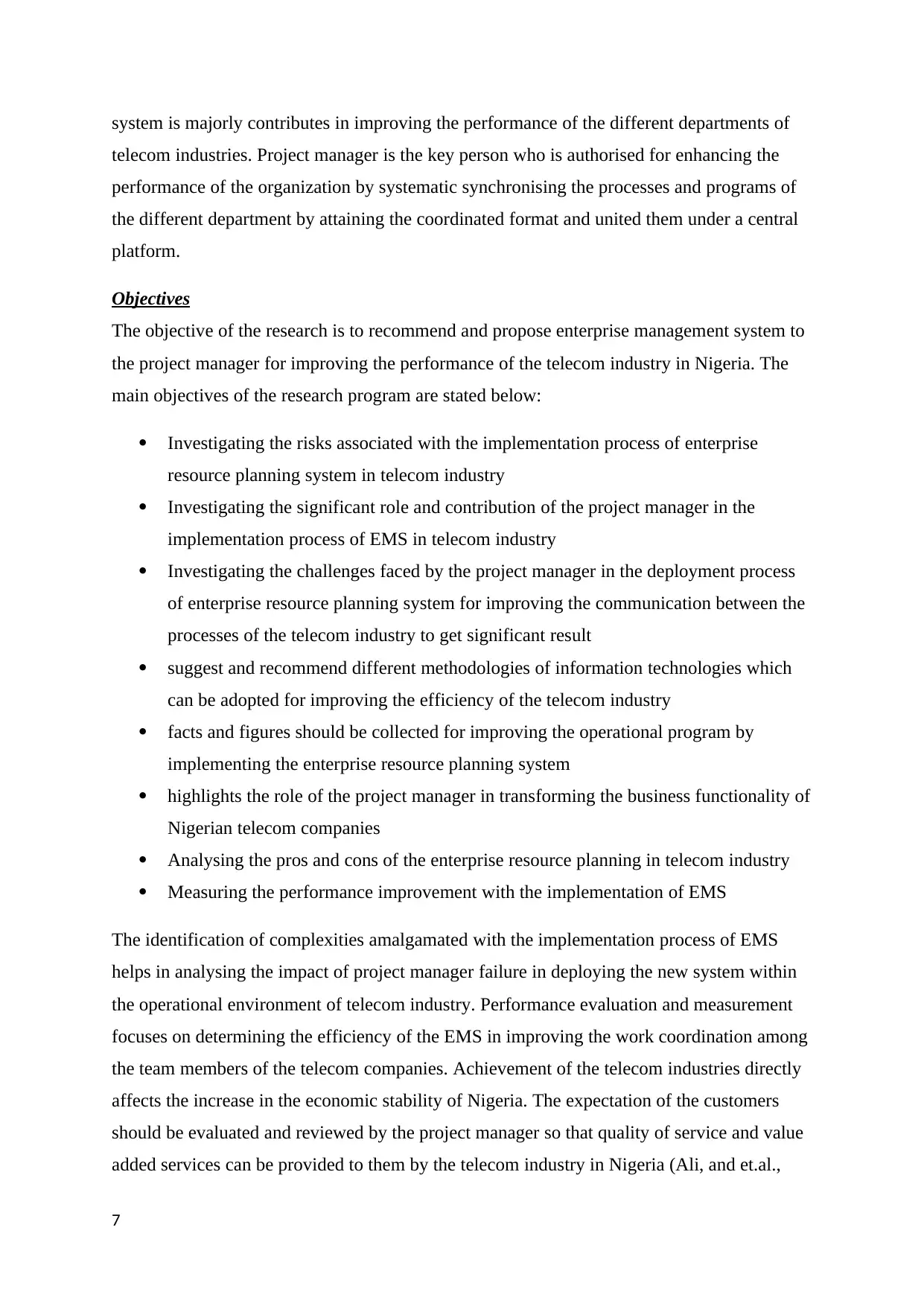
system is majorly contributes in improving the performance of the different departments of
telecom industries. Project manager is the key person who is authorised for enhancing the
performance of the organization by systematic synchronising the processes and programs of
the different department by attaining the coordinated format and united them under a central
platform.
Objectives
The objective of the research is to recommend and propose enterprise management system to
the project manager for improving the performance of the telecom industry in Nigeria. The
main objectives of the research program are stated below:
Investigating the risks associated with the implementation process of enterprise
resource planning system in telecom industry
Investigating the significant role and contribution of the project manager in the
implementation process of EMS in telecom industry
Investigating the challenges faced by the project manager in the deployment process
of enterprise resource planning system for improving the communication between the
processes of the telecom industry to get significant result
suggest and recommend different methodologies of information technologies which
can be adopted for improving the efficiency of the telecom industry
facts and figures should be collected for improving the operational program by
implementing the enterprise resource planning system
highlights the role of the project manager in transforming the business functionality of
Nigerian telecom companies
Analysing the pros and cons of the enterprise resource planning in telecom industry
Measuring the performance improvement with the implementation of EMS
The identification of complexities amalgamated with the implementation process of EMS
helps in analysing the impact of project manager failure in deploying the new system within
the operational environment of telecom industry. Performance evaluation and measurement
focuses on determining the efficiency of the EMS in improving the work coordination among
the team members of the telecom companies. Achievement of the telecom industries directly
affects the increase in the economic stability of Nigeria. The expectation of the customers
should be evaluated and reviewed by the project manager so that quality of service and value
added services can be provided to them by the telecom industry in Nigeria (Ali, and et.al.,
7
telecom industries. Project manager is the key person who is authorised for enhancing the
performance of the organization by systematic synchronising the processes and programs of
the different department by attaining the coordinated format and united them under a central
platform.
Objectives
The objective of the research is to recommend and propose enterprise management system to
the project manager for improving the performance of the telecom industry in Nigeria. The
main objectives of the research program are stated below:
Investigating the risks associated with the implementation process of enterprise
resource planning system in telecom industry
Investigating the significant role and contribution of the project manager in the
implementation process of EMS in telecom industry
Investigating the challenges faced by the project manager in the deployment process
of enterprise resource planning system for improving the communication between the
processes of the telecom industry to get significant result
suggest and recommend different methodologies of information technologies which
can be adopted for improving the efficiency of the telecom industry
facts and figures should be collected for improving the operational program by
implementing the enterprise resource planning system
highlights the role of the project manager in transforming the business functionality of
Nigerian telecom companies
Analysing the pros and cons of the enterprise resource planning in telecom industry
Measuring the performance improvement with the implementation of EMS
The identification of complexities amalgamated with the implementation process of EMS
helps in analysing the impact of project manager failure in deploying the new system within
the operational environment of telecom industry. Performance evaluation and measurement
focuses on determining the efficiency of the EMS in improving the work coordination among
the team members of the telecom companies. Achievement of the telecom industries directly
affects the increase in the economic stability of Nigeria. The expectation of the customers
should be evaluated and reviewed by the project manager so that quality of service and value
added services can be provided to them by the telecom industry in Nigeria (Ali, and et.al.,
7
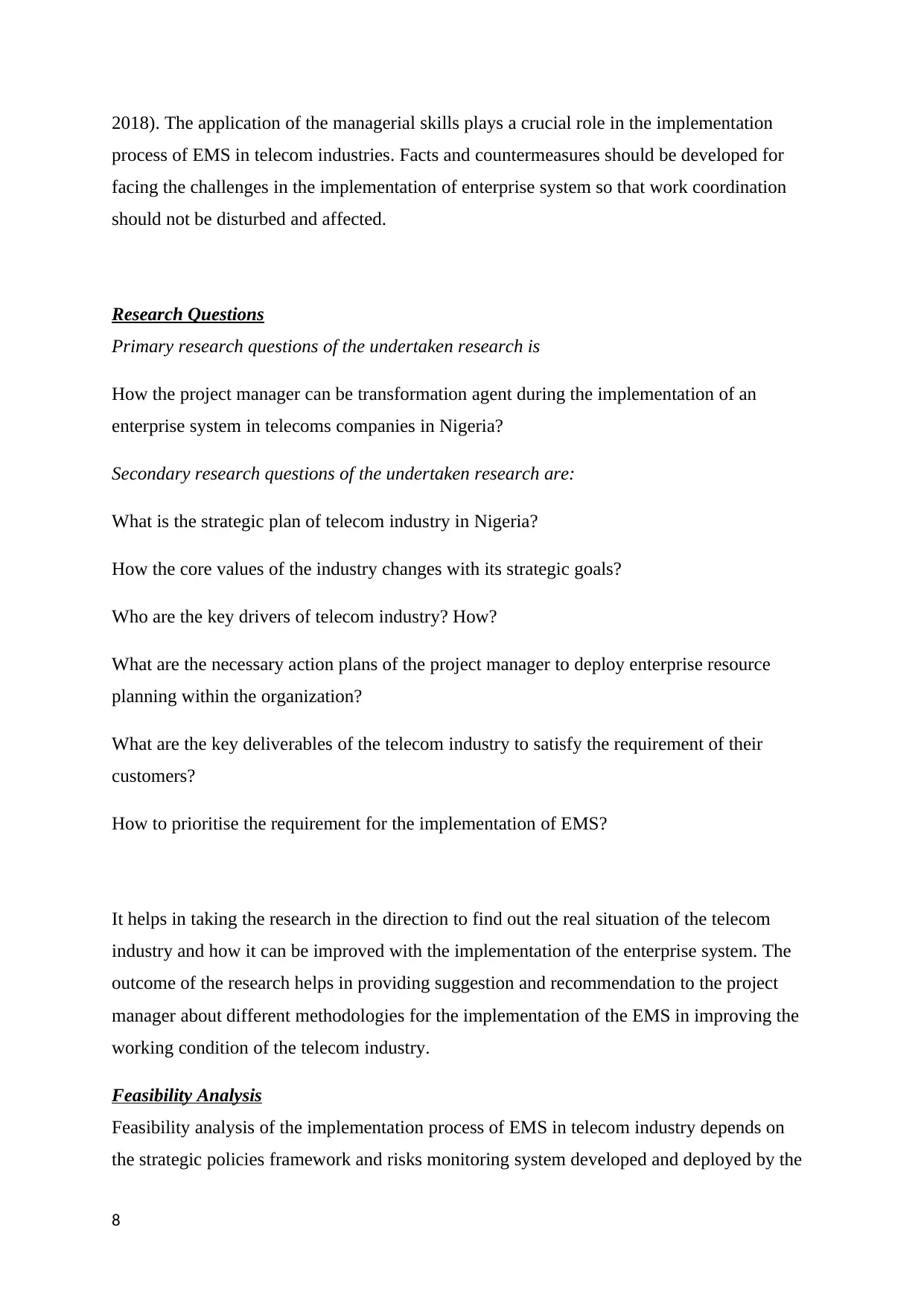
2018). The application of the managerial skills plays a crucial role in the implementation
process of EMS in telecom industries. Facts and countermeasures should be developed for
facing the challenges in the implementation of enterprise system so that work coordination
should not be disturbed and affected.
Research Questions
Primary research questions of the undertaken research is
How the project manager can be transformation agent during the implementation of an
enterprise system in telecoms companies in Nigeria?
Secondary research questions of the undertaken research are:
What is the strategic plan of telecom industry in Nigeria?
How the core values of the industry changes with its strategic goals?
Who are the key drivers of telecom industry? How?
What are the necessary action plans of the project manager to deploy enterprise resource
planning within the organization?
What are the key deliverables of the telecom industry to satisfy the requirement of their
customers?
How to prioritise the requirement for the implementation of EMS?
It helps in taking the research in the direction to find out the real situation of the telecom
industry and how it can be improved with the implementation of the enterprise system. The
outcome of the research helps in providing suggestion and recommendation to the project
manager about different methodologies for the implementation of the EMS in improving the
working condition of the telecom industry.
Feasibility Analysis
Feasibility analysis of the implementation process of EMS in telecom industry depends on
the strategic policies framework and risks monitoring system developed and deployed by the
8
process of EMS in telecom industries. Facts and countermeasures should be developed for
facing the challenges in the implementation of enterprise system so that work coordination
should not be disturbed and affected.
Research Questions
Primary research questions of the undertaken research is
How the project manager can be transformation agent during the implementation of an
enterprise system in telecoms companies in Nigeria?
Secondary research questions of the undertaken research are:
What is the strategic plan of telecom industry in Nigeria?
How the core values of the industry changes with its strategic goals?
Who are the key drivers of telecom industry? How?
What are the necessary action plans of the project manager to deploy enterprise resource
planning within the organization?
What are the key deliverables of the telecom industry to satisfy the requirement of their
customers?
How to prioritise the requirement for the implementation of EMS?
It helps in taking the research in the direction to find out the real situation of the telecom
industry and how it can be improved with the implementation of the enterprise system. The
outcome of the research helps in providing suggestion and recommendation to the project
manager about different methodologies for the implementation of the EMS in improving the
working condition of the telecom industry.
Feasibility Analysis
Feasibility analysis of the implementation process of EMS in telecom industry depends on
the strategic policies framework and risks monitoring system developed and deployed by the
8
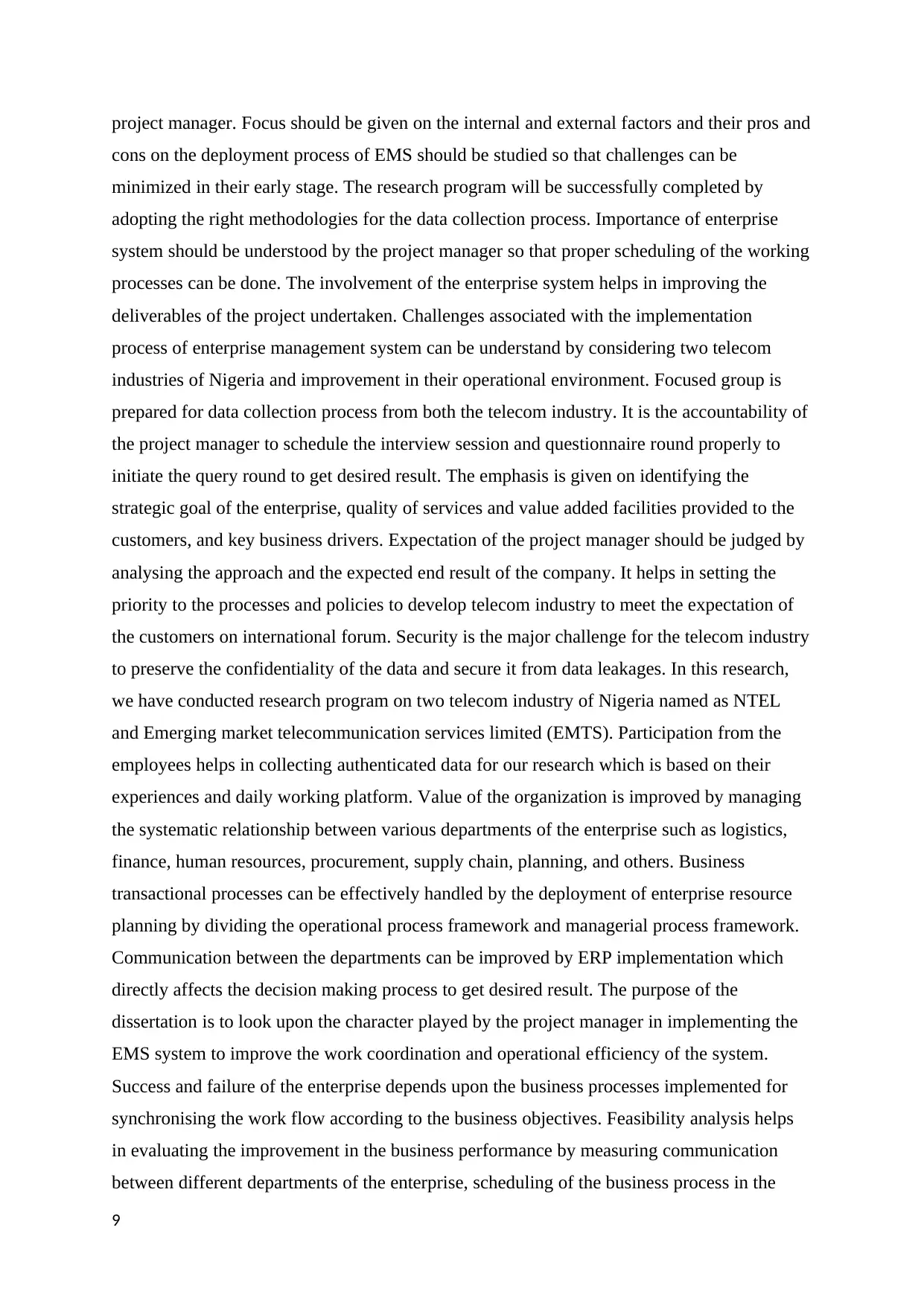
project manager. Focus should be given on the internal and external factors and their pros and
cons on the deployment process of EMS should be studied so that challenges can be
minimized in their early stage. The research program will be successfully completed by
adopting the right methodologies for the data collection process. Importance of enterprise
system should be understood by the project manager so that proper scheduling of the working
processes can be done. The involvement of the enterprise system helps in improving the
deliverables of the project undertaken. Challenges associated with the implementation
process of enterprise management system can be understand by considering two telecom
industries of Nigeria and improvement in their operational environment. Focused group is
prepared for data collection process from both the telecom industry. It is the accountability of
the project manager to schedule the interview session and questionnaire round properly to
initiate the query round to get desired result. The emphasis is given on identifying the
strategic goal of the enterprise, quality of services and value added facilities provided to the
customers, and key business drivers. Expectation of the project manager should be judged by
analysing the approach and the expected end result of the company. It helps in setting the
priority to the processes and policies to develop telecom industry to meet the expectation of
the customers on international forum. Security is the major challenge for the telecom industry
to preserve the confidentiality of the data and secure it from data leakages. In this research,
we have conducted research program on two telecom industry of Nigeria named as NTEL
and Emerging market telecommunication services limited (EMTS). Participation from the
employees helps in collecting authenticated data for our research which is based on their
experiences and daily working platform. Value of the organization is improved by managing
the systematic relationship between various departments of the enterprise such as logistics,
finance, human resources, procurement, supply chain, planning, and others. Business
transactional processes can be effectively handled by the deployment of enterprise resource
planning by dividing the operational process framework and managerial process framework.
Communication between the departments can be improved by ERP implementation which
directly affects the decision making process to get desired result. The purpose of the
dissertation is to look upon the character played by the project manager in implementing the
EMS system to improve the work coordination and operational efficiency of the system.
Success and failure of the enterprise depends upon the business processes implemented for
synchronising the work flow according to the business objectives. Feasibility analysis helps
in evaluating the improvement in the business performance by measuring communication
between different departments of the enterprise, scheduling of the business process in the
9
cons on the deployment process of EMS should be studied so that challenges can be
minimized in their early stage. The research program will be successfully completed by
adopting the right methodologies for the data collection process. Importance of enterprise
system should be understood by the project manager so that proper scheduling of the working
processes can be done. The involvement of the enterprise system helps in improving the
deliverables of the project undertaken. Challenges associated with the implementation
process of enterprise management system can be understand by considering two telecom
industries of Nigeria and improvement in their operational environment. Focused group is
prepared for data collection process from both the telecom industry. It is the accountability of
the project manager to schedule the interview session and questionnaire round properly to
initiate the query round to get desired result. The emphasis is given on identifying the
strategic goal of the enterprise, quality of services and value added facilities provided to the
customers, and key business drivers. Expectation of the project manager should be judged by
analysing the approach and the expected end result of the company. It helps in setting the
priority to the processes and policies to develop telecom industry to meet the expectation of
the customers on international forum. Security is the major challenge for the telecom industry
to preserve the confidentiality of the data and secure it from data leakages. In this research,
we have conducted research program on two telecom industry of Nigeria named as NTEL
and Emerging market telecommunication services limited (EMTS). Participation from the
employees helps in collecting authenticated data for our research which is based on their
experiences and daily working platform. Value of the organization is improved by managing
the systematic relationship between various departments of the enterprise such as logistics,
finance, human resources, procurement, supply chain, planning, and others. Business
transactional processes can be effectively handled by the deployment of enterprise resource
planning by dividing the operational process framework and managerial process framework.
Communication between the departments can be improved by ERP implementation which
directly affects the decision making process to get desired result. The purpose of the
dissertation is to look upon the character played by the project manager in implementing the
EMS system to improve the work coordination and operational efficiency of the system.
Success and failure of the enterprise depends upon the business processes implemented for
synchronising the work flow according to the business objectives. Feasibility analysis helps
in evaluating the improvement in the business performance by measuring communication
between different departments of the enterprise, scheduling of the business process in the
9
Secure Best Marks with AI Grader
Need help grading? Try our AI Grader for instant feedback on your assignments.
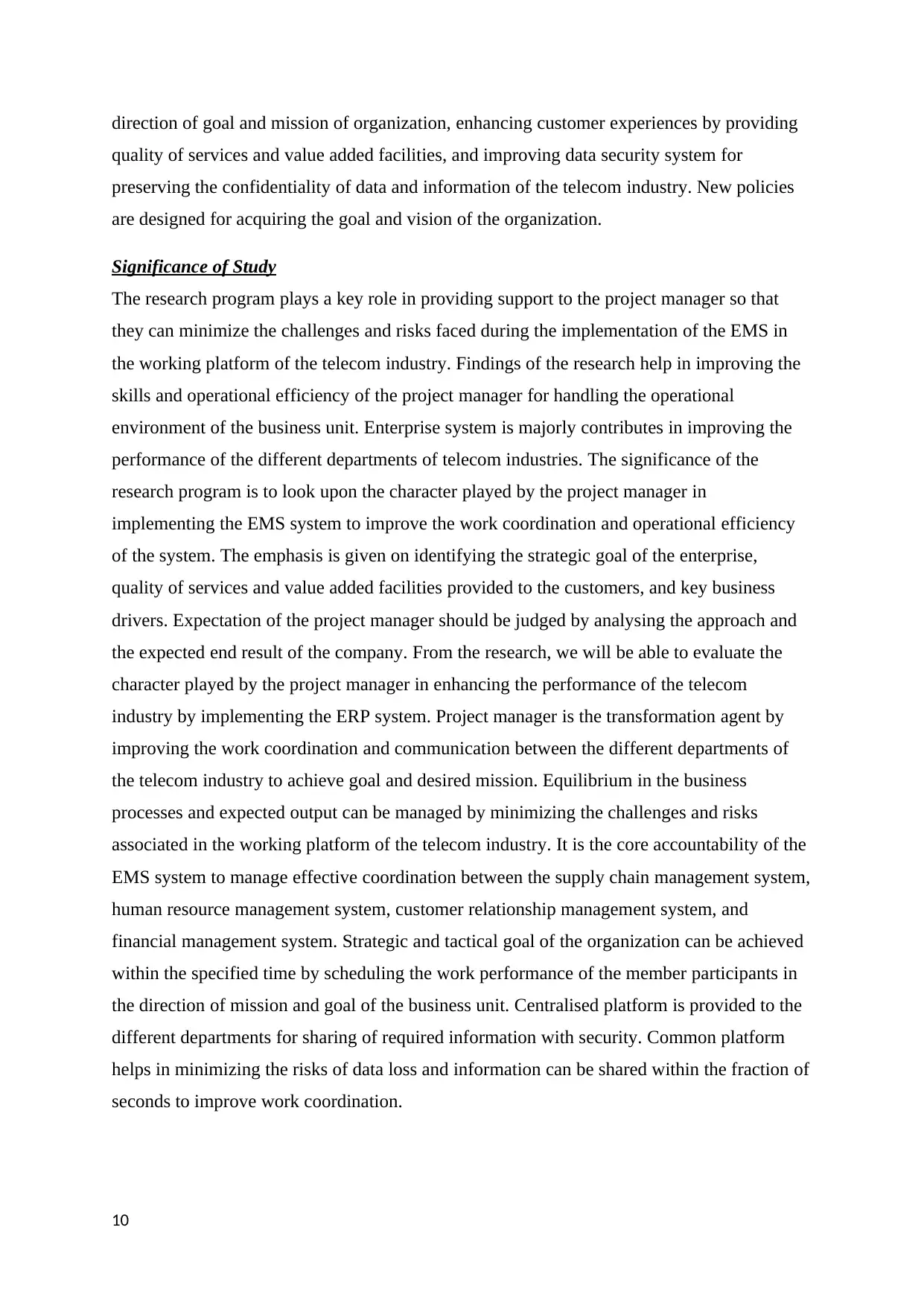
direction of goal and mission of organization, enhancing customer experiences by providing
quality of services and value added facilities, and improving data security system for
preserving the confidentiality of data and information of the telecom industry. New policies
are designed for acquiring the goal and vision of the organization.
Significance of Study
The research program plays a key role in providing support to the project manager so that
they can minimize the challenges and risks faced during the implementation of the EMS in
the working platform of the telecom industry. Findings of the research help in improving the
skills and operational efficiency of the project manager for handling the operational
environment of the business unit. Enterprise system is majorly contributes in improving the
performance of the different departments of telecom industries. The significance of the
research program is to look upon the character played by the project manager in
implementing the EMS system to improve the work coordination and operational efficiency
of the system. The emphasis is given on identifying the strategic goal of the enterprise,
quality of services and value added facilities provided to the customers, and key business
drivers. Expectation of the project manager should be judged by analysing the approach and
the expected end result of the company. From the research, we will be able to evaluate the
character played by the project manager in enhancing the performance of the telecom
industry by implementing the ERP system. Project manager is the transformation agent by
improving the work coordination and communication between the different departments of
the telecom industry to achieve goal and desired mission. Equilibrium in the business
processes and expected output can be managed by minimizing the challenges and risks
associated in the working platform of the telecom industry. It is the core accountability of the
EMS system to manage effective coordination between the supply chain management system,
human resource management system, customer relationship management system, and
financial management system. Strategic and tactical goal of the organization can be achieved
within the specified time by scheduling the work performance of the member participants in
the direction of mission and goal of the business unit. Centralised platform is provided to the
different departments for sharing of required information with security. Common platform
helps in minimizing the risks of data loss and information can be shared within the fraction of
seconds to improve work coordination.
10
quality of services and value added facilities, and improving data security system for
preserving the confidentiality of data and information of the telecom industry. New policies
are designed for acquiring the goal and vision of the organization.
Significance of Study
The research program plays a key role in providing support to the project manager so that
they can minimize the challenges and risks faced during the implementation of the EMS in
the working platform of the telecom industry. Findings of the research help in improving the
skills and operational efficiency of the project manager for handling the operational
environment of the business unit. Enterprise system is majorly contributes in improving the
performance of the different departments of telecom industries. The significance of the
research program is to look upon the character played by the project manager in
implementing the EMS system to improve the work coordination and operational efficiency
of the system. The emphasis is given on identifying the strategic goal of the enterprise,
quality of services and value added facilities provided to the customers, and key business
drivers. Expectation of the project manager should be judged by analysing the approach and
the expected end result of the company. From the research, we will be able to evaluate the
character played by the project manager in enhancing the performance of the telecom
industry by implementing the ERP system. Project manager is the transformation agent by
improving the work coordination and communication between the different departments of
the telecom industry to achieve goal and desired mission. Equilibrium in the business
processes and expected output can be managed by minimizing the challenges and risks
associated in the working platform of the telecom industry. It is the core accountability of the
EMS system to manage effective coordination between the supply chain management system,
human resource management system, customer relationship management system, and
financial management system. Strategic and tactical goal of the organization can be achieved
within the specified time by scheduling the work performance of the member participants in
the direction of mission and goal of the business unit. Centralised platform is provided to the
different departments for sharing of required information with security. Common platform
helps in minimizing the risks of data loss and information can be shared within the fraction of
seconds to improve work coordination.
10
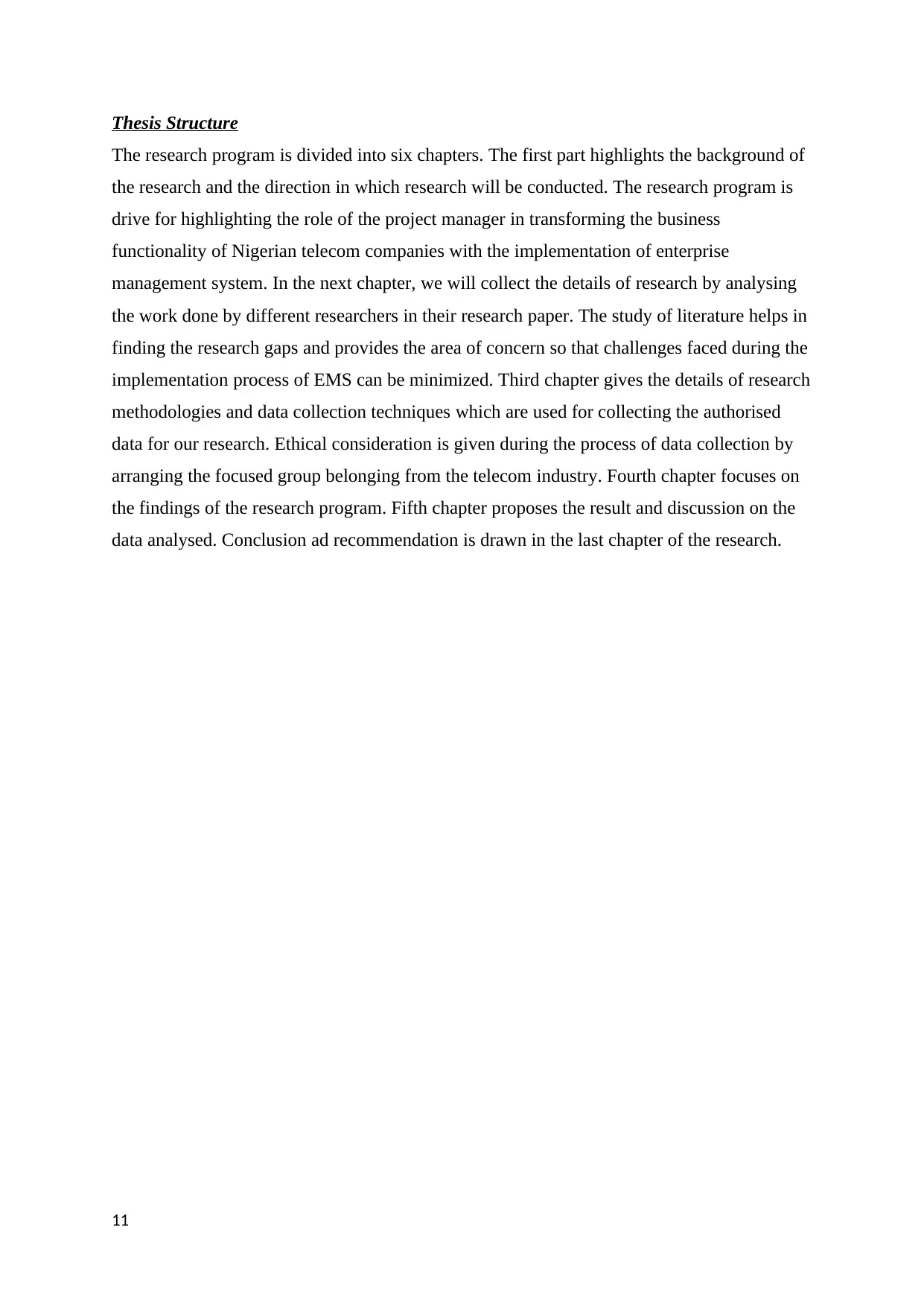
Thesis Structure
The research program is divided into six chapters. The first part highlights the background of
the research and the direction in which research will be conducted. The research program is
drive for highlighting the role of the project manager in transforming the business
functionality of Nigerian telecom companies with the implementation of enterprise
management system. In the next chapter, we will collect the details of research by analysing
the work done by different researchers in their research paper. The study of literature helps in
finding the research gaps and provides the area of concern so that challenges faced during the
implementation process of EMS can be minimized. Third chapter gives the details of research
methodologies and data collection techniques which are used for collecting the authorised
data for our research. Ethical consideration is given during the process of data collection by
arranging the focused group belonging from the telecom industry. Fourth chapter focuses on
the findings of the research program. Fifth chapter proposes the result and discussion on the
data analysed. Conclusion ad recommendation is drawn in the last chapter of the research.
11
The research program is divided into six chapters. The first part highlights the background of
the research and the direction in which research will be conducted. The research program is
drive for highlighting the role of the project manager in transforming the business
functionality of Nigerian telecom companies with the implementation of enterprise
management system. In the next chapter, we will collect the details of research by analysing
the work done by different researchers in their research paper. The study of literature helps in
finding the research gaps and provides the area of concern so that challenges faced during the
implementation process of EMS can be minimized. Third chapter gives the details of research
methodologies and data collection techniques which are used for collecting the authorised
data for our research. Ethical consideration is given during the process of data collection by
arranging the focused group belonging from the telecom industry. Fourth chapter focuses on
the findings of the research program. Fifth chapter proposes the result and discussion on the
data analysed. Conclusion ad recommendation is drawn in the last chapter of the research.
11
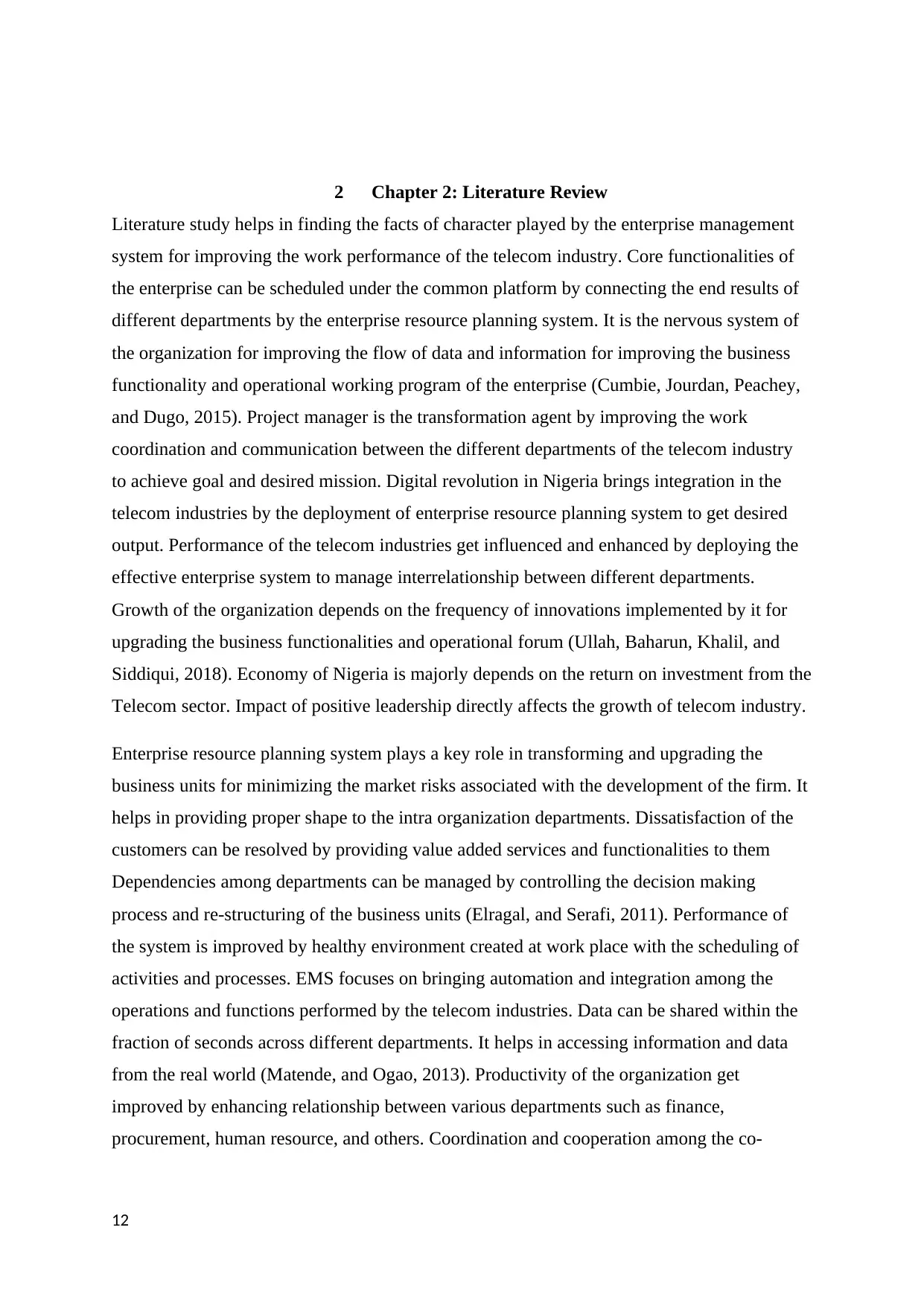
2 Chapter 2: Literature Review
Literature study helps in finding the facts of character played by the enterprise management
system for improving the work performance of the telecom industry. Core functionalities of
the enterprise can be scheduled under the common platform by connecting the end results of
different departments by the enterprise resource planning system. It is the nervous system of
the organization for improving the flow of data and information for improving the business
functionality and operational working program of the enterprise (Cumbie, Jourdan, Peachey,
and Dugo, 2015). Project manager is the transformation agent by improving the work
coordination and communication between the different departments of the telecom industry
to achieve goal and desired mission. Digital revolution in Nigeria brings integration in the
telecom industries by the deployment of enterprise resource planning system to get desired
output. Performance of the telecom industries get influenced and enhanced by deploying the
effective enterprise system to manage interrelationship between different departments.
Growth of the organization depends on the frequency of innovations implemented by it for
upgrading the business functionalities and operational forum (Ullah, Baharun, Khalil, and
Siddiqui, 2018). Economy of Nigeria is majorly depends on the return on investment from the
Telecom sector. Impact of positive leadership directly affects the growth of telecom industry.
Enterprise resource planning system plays a key role in transforming and upgrading the
business units for minimizing the market risks associated with the development of the firm. It
helps in providing proper shape to the intra organization departments. Dissatisfaction of the
customers can be resolved by providing value added services and functionalities to them
Dependencies among departments can be managed by controlling the decision making
process and re-structuring of the business units (Elragal, and Serafi, 2011). Performance of
the system is improved by healthy environment created at work place with the scheduling of
activities and processes. EMS focuses on bringing automation and integration among the
operations and functions performed by the telecom industries. Data can be shared within the
fraction of seconds across different departments. It helps in accessing information and data
from the real world (Matende, and Ogao, 2013). Productivity of the organization get
improved by enhancing relationship between various departments such as finance,
procurement, human resource, and others. Coordination and cooperation among the co-
12
Literature study helps in finding the facts of character played by the enterprise management
system for improving the work performance of the telecom industry. Core functionalities of
the enterprise can be scheduled under the common platform by connecting the end results of
different departments by the enterprise resource planning system. It is the nervous system of
the organization for improving the flow of data and information for improving the business
functionality and operational working program of the enterprise (Cumbie, Jourdan, Peachey,
and Dugo, 2015). Project manager is the transformation agent by improving the work
coordination and communication between the different departments of the telecom industry
to achieve goal and desired mission. Digital revolution in Nigeria brings integration in the
telecom industries by the deployment of enterprise resource planning system to get desired
output. Performance of the telecom industries get influenced and enhanced by deploying the
effective enterprise system to manage interrelationship between different departments.
Growth of the organization depends on the frequency of innovations implemented by it for
upgrading the business functionalities and operational forum (Ullah, Baharun, Khalil, and
Siddiqui, 2018). Economy of Nigeria is majorly depends on the return on investment from the
Telecom sector. Impact of positive leadership directly affects the growth of telecom industry.
Enterprise resource planning system plays a key role in transforming and upgrading the
business units for minimizing the market risks associated with the development of the firm. It
helps in providing proper shape to the intra organization departments. Dissatisfaction of the
customers can be resolved by providing value added services and functionalities to them
Dependencies among departments can be managed by controlling the decision making
process and re-structuring of the business units (Elragal, and Serafi, 2011). Performance of
the system is improved by healthy environment created at work place with the scheduling of
activities and processes. EMS focuses on bringing automation and integration among the
operations and functions performed by the telecom industries. Data can be shared within the
fraction of seconds across different departments. It helps in accessing information and data
from the real world (Matende, and Ogao, 2013). Productivity of the organization get
improved by enhancing relationship between various departments such as finance,
procurement, human resource, and others. Coordination and cooperation among the co-
12
Paraphrase This Document
Need a fresh take? Get an instant paraphrase of this document with our AI Paraphraser
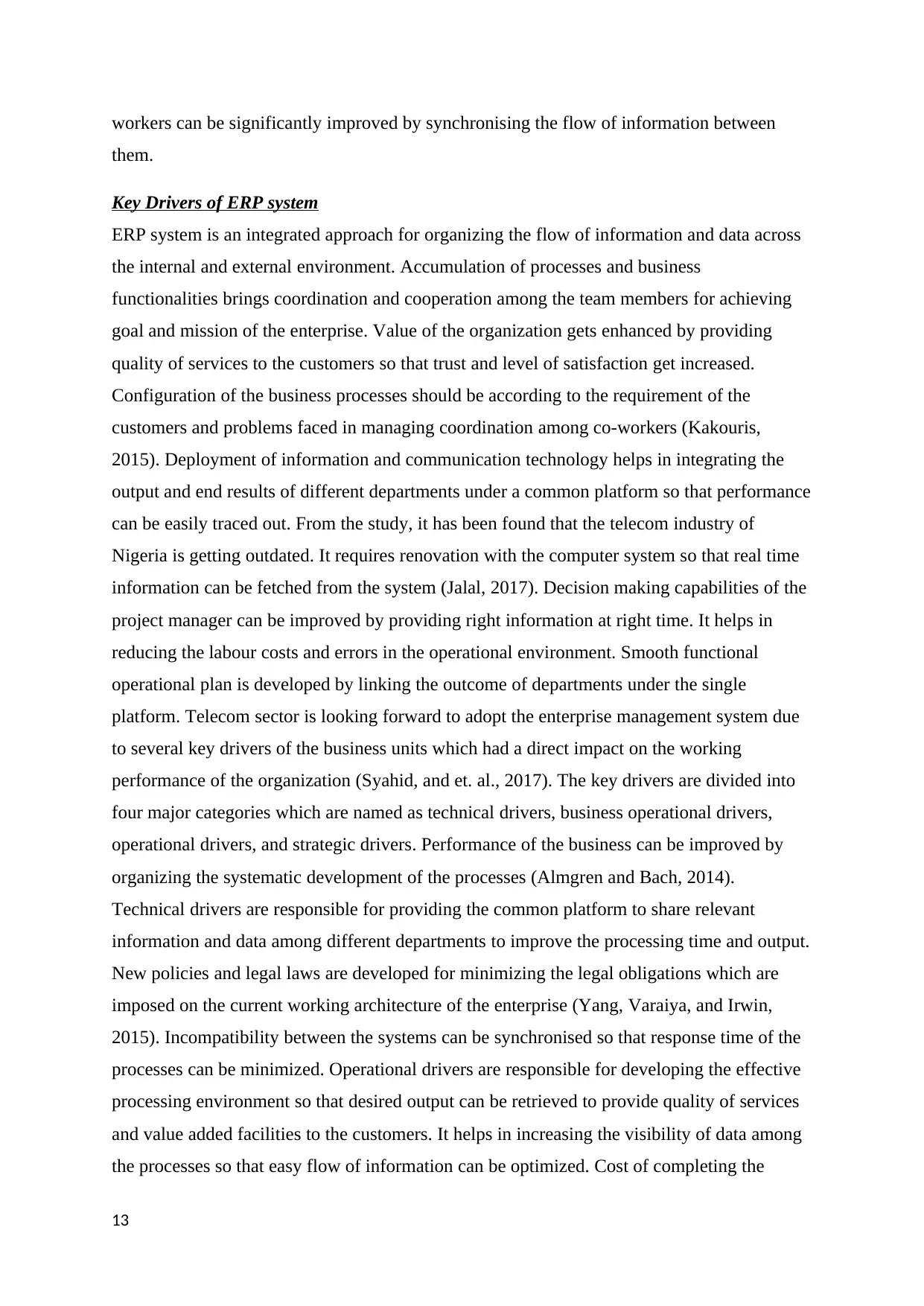
workers can be significantly improved by synchronising the flow of information between
them.
Key Drivers of ERP system
ERP system is an integrated approach for organizing the flow of information and data across
the internal and external environment. Accumulation of processes and business
functionalities brings coordination and cooperation among the team members for achieving
goal and mission of the enterprise. Value of the organization gets enhanced by providing
quality of services to the customers so that trust and level of satisfaction get increased.
Configuration of the business processes should be according to the requirement of the
customers and problems faced in managing coordination among co-workers (Kakouris,
2015). Deployment of information and communication technology helps in integrating the
output and end results of different departments under a common platform so that performance
can be easily traced out. From the study, it has been found that the telecom industry of
Nigeria is getting outdated. It requires renovation with the computer system so that real time
information can be fetched from the system (Jalal, 2017). Decision making capabilities of the
project manager can be improved by providing right information at right time. It helps in
reducing the labour costs and errors in the operational environment. Smooth functional
operational plan is developed by linking the outcome of departments under the single
platform. Telecom sector is looking forward to adopt the enterprise management system due
to several key drivers of the business units which had a direct impact on the working
performance of the organization (Syahid, and et. al., 2017). The key drivers are divided into
four major categories which are named as technical drivers, business operational drivers,
operational drivers, and strategic drivers. Performance of the business can be improved by
organizing the systematic development of the processes (Almgren and Bach, 2014).
Technical drivers are responsible for providing the common platform to share relevant
information and data among different departments to improve the processing time and output.
New policies and legal laws are developed for minimizing the legal obligations which are
imposed on the current working architecture of the enterprise (Yang, Varaiya, and Irwin,
2015). Incompatibility between the systems can be synchronised so that response time of the
processes can be minimized. Operational drivers are responsible for developing the effective
processing environment so that desired output can be retrieved to provide quality of services
and value added facilities to the customers. It helps in increasing the visibility of data among
the processes so that easy flow of information can be optimized. Cost of completing the
13
them.
Key Drivers of ERP system
ERP system is an integrated approach for organizing the flow of information and data across
the internal and external environment. Accumulation of processes and business
functionalities brings coordination and cooperation among the team members for achieving
goal and mission of the enterprise. Value of the organization gets enhanced by providing
quality of services to the customers so that trust and level of satisfaction get increased.
Configuration of the business processes should be according to the requirement of the
customers and problems faced in managing coordination among co-workers (Kakouris,
2015). Deployment of information and communication technology helps in integrating the
output and end results of different departments under a common platform so that performance
can be easily traced out. From the study, it has been found that the telecom industry of
Nigeria is getting outdated. It requires renovation with the computer system so that real time
information can be fetched from the system (Jalal, 2017). Decision making capabilities of the
project manager can be improved by providing right information at right time. It helps in
reducing the labour costs and errors in the operational environment. Smooth functional
operational plan is developed by linking the outcome of departments under the single
platform. Telecom sector is looking forward to adopt the enterprise management system due
to several key drivers of the business units which had a direct impact on the working
performance of the organization (Syahid, and et. al., 2017). The key drivers are divided into
four major categories which are named as technical drivers, business operational drivers,
operational drivers, and strategic drivers. Performance of the business can be improved by
organizing the systematic development of the processes (Almgren and Bach, 2014).
Technical drivers are responsible for providing the common platform to share relevant
information and data among different departments to improve the processing time and output.
New policies and legal laws are developed for minimizing the legal obligations which are
imposed on the current working architecture of the enterprise (Yang, Varaiya, and Irwin,
2015). Incompatibility between the systems can be synchronised so that response time of the
processes can be minimized. Operational drivers are responsible for developing the effective
processing environment so that desired output can be retrieved to provide quality of services
and value added facilities to the customers. It helps in increasing the visibility of data among
the processes so that easy flow of information can be optimized. Cost of completing the
13
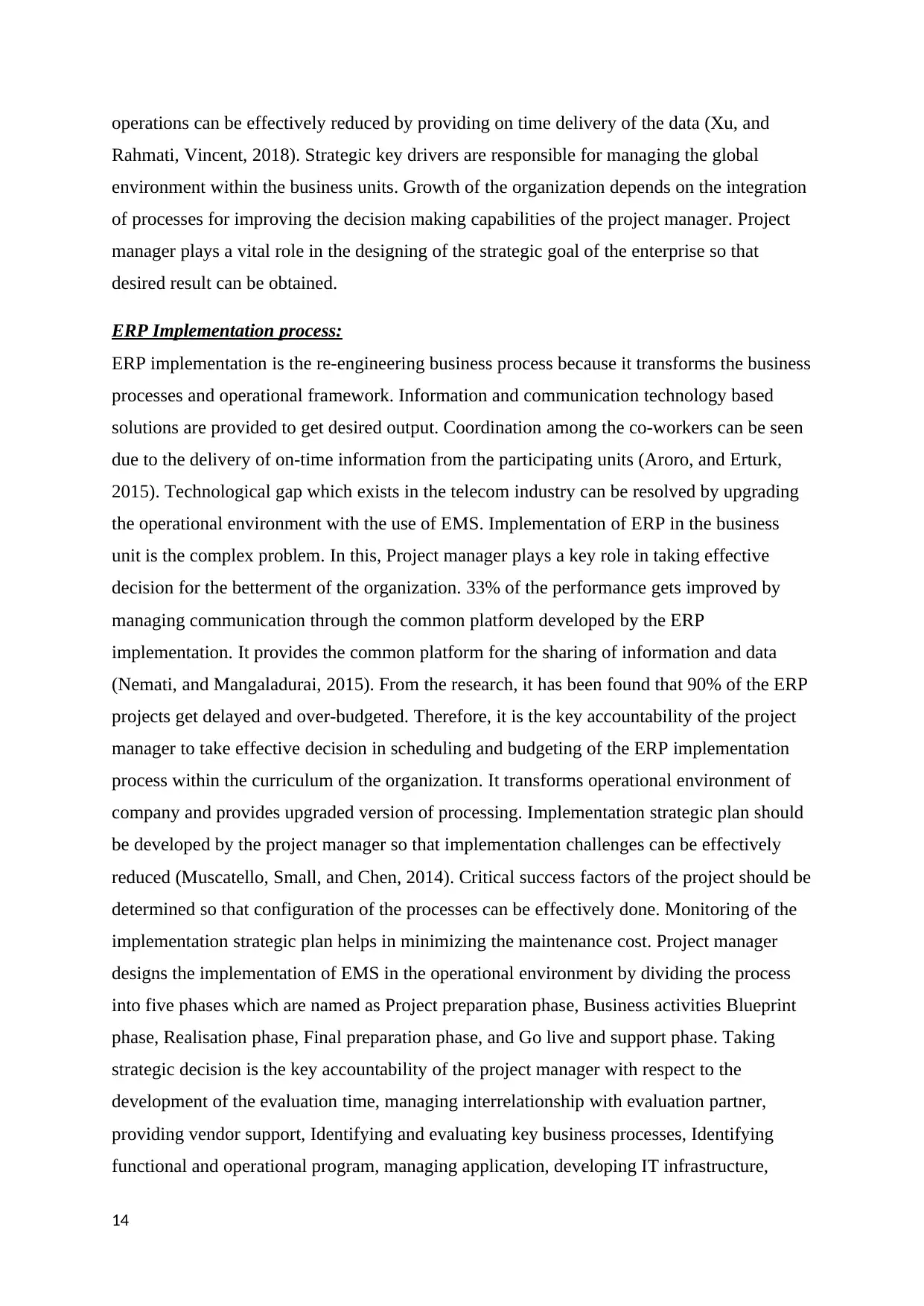
operations can be effectively reduced by providing on time delivery of the data (Xu, and
Rahmati, Vincent, 2018). Strategic key drivers are responsible for managing the global
environment within the business units. Growth of the organization depends on the integration
of processes for improving the decision making capabilities of the project manager. Project
manager plays a vital role in the designing of the strategic goal of the enterprise so that
desired result can be obtained.
ERP Implementation process:
ERP implementation is the re-engineering business process because it transforms the business
processes and operational framework. Information and communication technology based
solutions are provided to get desired output. Coordination among the co-workers can be seen
due to the delivery of on-time information from the participating units (Aroro, and Erturk,
2015). Technological gap which exists in the telecom industry can be resolved by upgrading
the operational environment with the use of EMS. Implementation of ERP in the business
unit is the complex problem. In this, Project manager plays a key role in taking effective
decision for the betterment of the organization. 33% of the performance gets improved by
managing communication through the common platform developed by the ERP
implementation. It provides the common platform for the sharing of information and data
(Nemati, and Mangaladurai, 2015). From the research, it has been found that 90% of the ERP
projects get delayed and over-budgeted. Therefore, it is the key accountability of the project
manager to take effective decision in scheduling and budgeting of the ERP implementation
process within the curriculum of the organization. It transforms operational environment of
company and provides upgraded version of processing. Implementation strategic plan should
be developed by the project manager so that implementation challenges can be effectively
reduced (Muscatello, Small, and Chen, 2014). Critical success factors of the project should be
determined so that configuration of the processes can be effectively done. Monitoring of the
implementation strategic plan helps in minimizing the maintenance cost. Project manager
designs the implementation of EMS in the operational environment by dividing the process
into five phases which are named as Project preparation phase, Business activities Blueprint
phase, Realisation phase, Final preparation phase, and Go live and support phase. Taking
strategic decision is the key accountability of the project manager with respect to the
development of the evaluation time, managing interrelationship with evaluation partner,
providing vendor support, Identifying and evaluating key business processes, Identifying
functional and operational program, managing application, developing IT infrastructure,
14
Rahmati, Vincent, 2018). Strategic key drivers are responsible for managing the global
environment within the business units. Growth of the organization depends on the integration
of processes for improving the decision making capabilities of the project manager. Project
manager plays a vital role in the designing of the strategic goal of the enterprise so that
desired result can be obtained.
ERP Implementation process:
ERP implementation is the re-engineering business process because it transforms the business
processes and operational framework. Information and communication technology based
solutions are provided to get desired output. Coordination among the co-workers can be seen
due to the delivery of on-time information from the participating units (Aroro, and Erturk,
2015). Technological gap which exists in the telecom industry can be resolved by upgrading
the operational environment with the use of EMS. Implementation of ERP in the business
unit is the complex problem. In this, Project manager plays a key role in taking effective
decision for the betterment of the organization. 33% of the performance gets improved by
managing communication through the common platform developed by the ERP
implementation. It provides the common platform for the sharing of information and data
(Nemati, and Mangaladurai, 2015). From the research, it has been found that 90% of the ERP
projects get delayed and over-budgeted. Therefore, it is the key accountability of the project
manager to take effective decision in scheduling and budgeting of the ERP implementation
process within the curriculum of the organization. It transforms operational environment of
company and provides upgraded version of processing. Implementation strategic plan should
be developed by the project manager so that implementation challenges can be effectively
reduced (Muscatello, Small, and Chen, 2014). Critical success factors of the project should be
determined so that configuration of the processes can be effectively done. Monitoring of the
implementation strategic plan helps in minimizing the maintenance cost. Project manager
designs the implementation of EMS in the operational environment by dividing the process
into five phases which are named as Project preparation phase, Business activities Blueprint
phase, Realisation phase, Final preparation phase, and Go live and support phase. Taking
strategic decision is the key accountability of the project manager with respect to the
development of the evaluation time, managing interrelationship with evaluation partner,
providing vendor support, Identifying and evaluating key business processes, Identifying
functional and operational program, managing application, developing IT infrastructure,
14
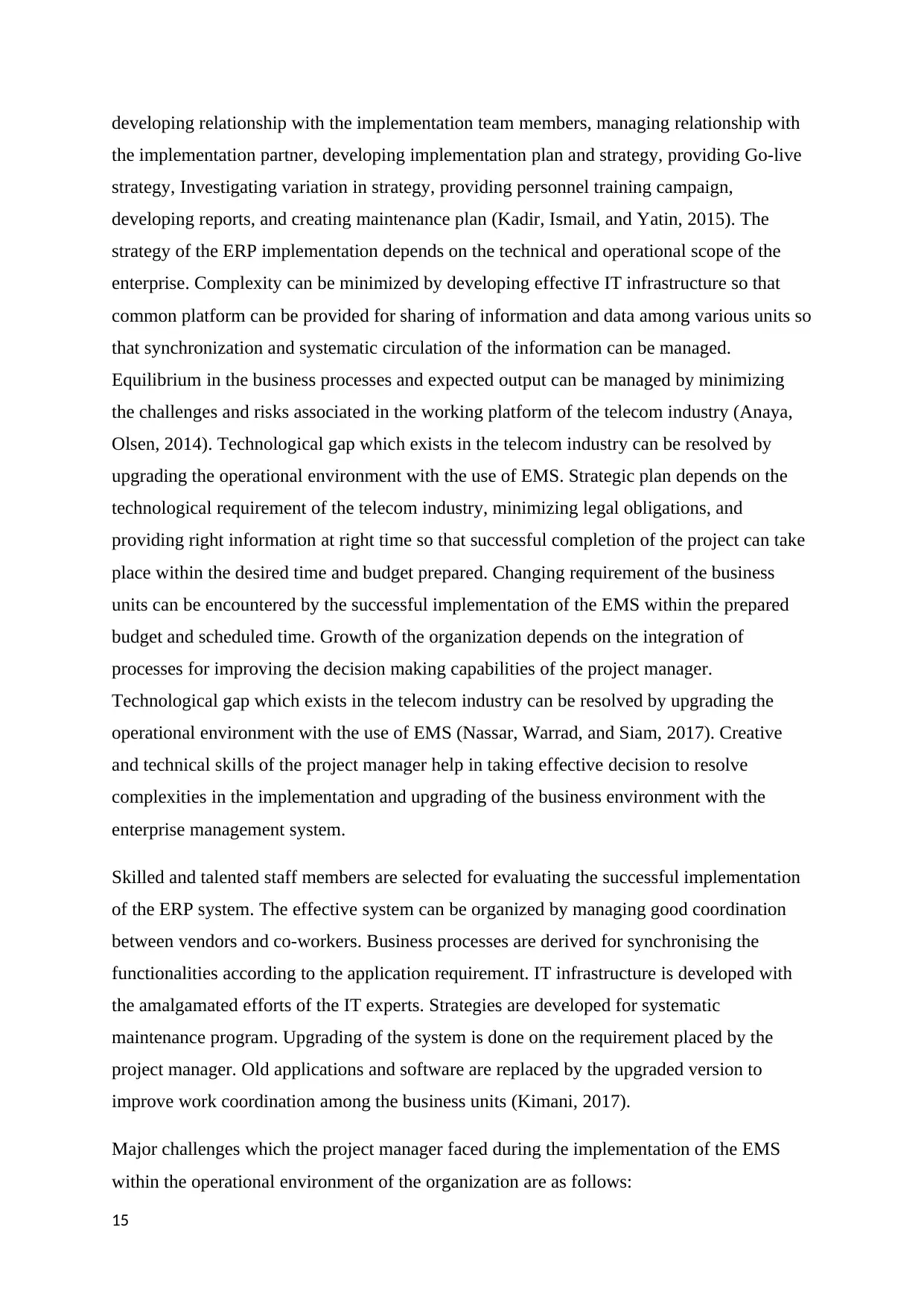
developing relationship with the implementation team members, managing relationship with
the implementation partner, developing implementation plan and strategy, providing Go-live
strategy, Investigating variation in strategy, providing personnel training campaign,
developing reports, and creating maintenance plan (Kadir, Ismail, and Yatin, 2015). The
strategy of the ERP implementation depends on the technical and operational scope of the
enterprise. Complexity can be minimized by developing effective IT infrastructure so that
common platform can be provided for sharing of information and data among various units so
that synchronization and systematic circulation of the information can be managed.
Equilibrium in the business processes and expected output can be managed by minimizing
the challenges and risks associated in the working platform of the telecom industry (Anaya,
Olsen, 2014). Technological gap which exists in the telecom industry can be resolved by
upgrading the operational environment with the use of EMS. Strategic plan depends on the
technological requirement of the telecom industry, minimizing legal obligations, and
providing right information at right time so that successful completion of the project can take
place within the desired time and budget prepared. Changing requirement of the business
units can be encountered by the successful implementation of the EMS within the prepared
budget and scheduled time. Growth of the organization depends on the integration of
processes for improving the decision making capabilities of the project manager.
Technological gap which exists in the telecom industry can be resolved by upgrading the
operational environment with the use of EMS (Nassar, Warrad, and Siam, 2017). Creative
and technical skills of the project manager help in taking effective decision to resolve
complexities in the implementation and upgrading of the business environment with the
enterprise management system.
Skilled and talented staff members are selected for evaluating the successful implementation
of the ERP system. The effective system can be organized by managing good coordination
between vendors and co-workers. Business processes are derived for synchronising the
functionalities according to the application requirement. IT infrastructure is developed with
the amalgamated efforts of the IT experts. Strategies are developed for systematic
maintenance program. Upgrading of the system is done on the requirement placed by the
project manager. Old applications and software are replaced by the upgraded version to
improve work coordination among the business units (Kimani, 2017).
Major challenges which the project manager faced during the implementation of the EMS
within the operational environment of the organization are as follows:
15
the implementation partner, developing implementation plan and strategy, providing Go-live
strategy, Investigating variation in strategy, providing personnel training campaign,
developing reports, and creating maintenance plan (Kadir, Ismail, and Yatin, 2015). The
strategy of the ERP implementation depends on the technical and operational scope of the
enterprise. Complexity can be minimized by developing effective IT infrastructure so that
common platform can be provided for sharing of information and data among various units so
that synchronization and systematic circulation of the information can be managed.
Equilibrium in the business processes and expected output can be managed by minimizing
the challenges and risks associated in the working platform of the telecom industry (Anaya,
Olsen, 2014). Technological gap which exists in the telecom industry can be resolved by
upgrading the operational environment with the use of EMS. Strategic plan depends on the
technological requirement of the telecom industry, minimizing legal obligations, and
providing right information at right time so that successful completion of the project can take
place within the desired time and budget prepared. Changing requirement of the business
units can be encountered by the successful implementation of the EMS within the prepared
budget and scheduled time. Growth of the organization depends on the integration of
processes for improving the decision making capabilities of the project manager.
Technological gap which exists in the telecom industry can be resolved by upgrading the
operational environment with the use of EMS (Nassar, Warrad, and Siam, 2017). Creative
and technical skills of the project manager help in taking effective decision to resolve
complexities in the implementation and upgrading of the business environment with the
enterprise management system.
Skilled and talented staff members are selected for evaluating the successful implementation
of the ERP system. The effective system can be organized by managing good coordination
between vendors and co-workers. Business processes are derived for synchronising the
functionalities according to the application requirement. IT infrastructure is developed with
the amalgamated efforts of the IT experts. Strategies are developed for systematic
maintenance program. Upgrading of the system is done on the requirement placed by the
project manager. Old applications and software are replaced by the upgraded version to
improve work coordination among the business units (Kimani, 2017).
Major challenges which the project manager faced during the implementation of the EMS
within the operational environment of the organization are as follows:
15
Secure Best Marks with AI Grader
Need help grading? Try our AI Grader for instant feedback on your assignments.
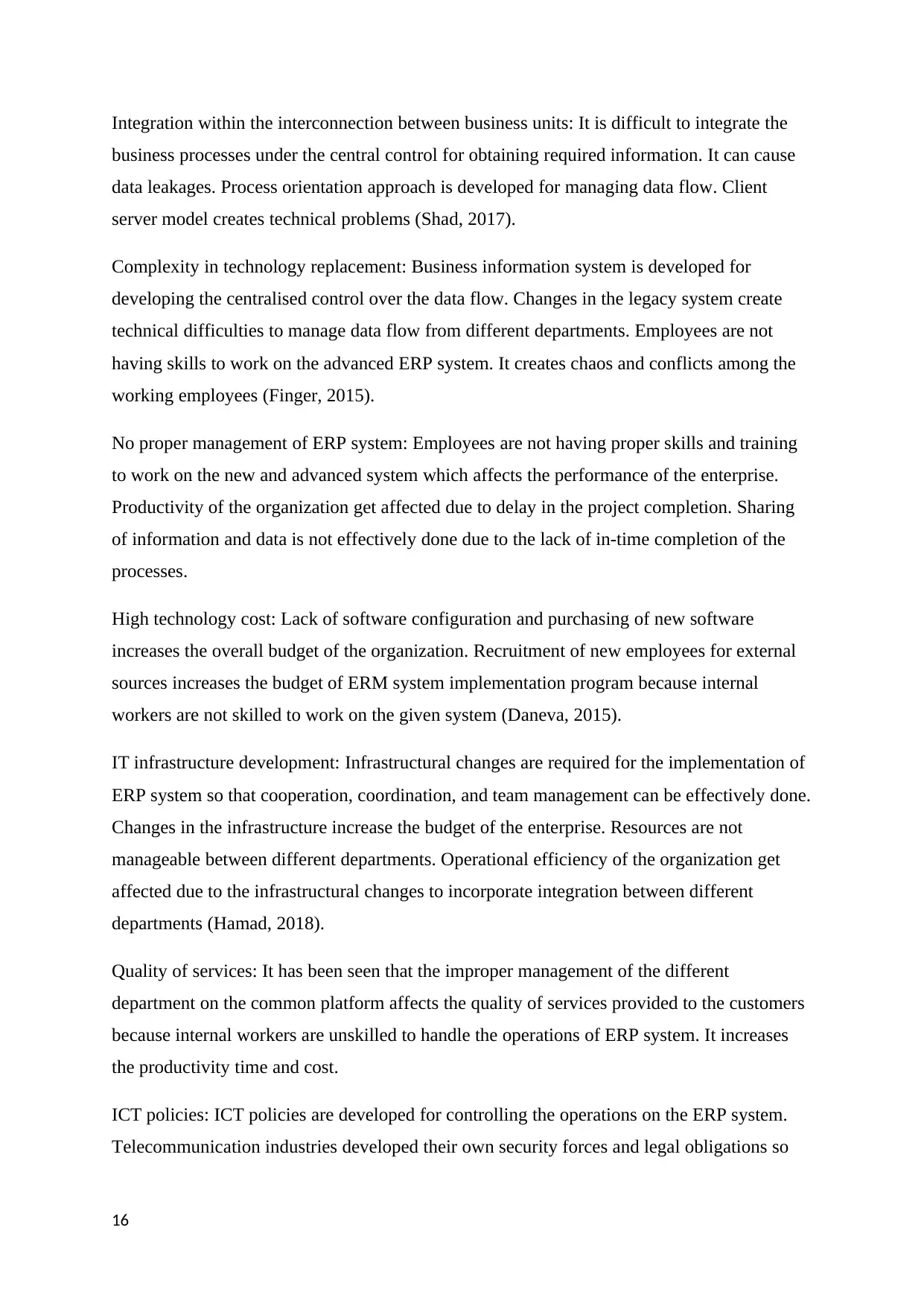
Integration within the interconnection between business units: It is difficult to integrate the
business processes under the central control for obtaining required information. It can cause
data leakages. Process orientation approach is developed for managing data flow. Client
server model creates technical problems (Shad, 2017).
Complexity in technology replacement: Business information system is developed for
developing the centralised control over the data flow. Changes in the legacy system create
technical difficulties to manage data flow from different departments. Employees are not
having skills to work on the advanced ERP system. It creates chaos and conflicts among the
working employees (Finger, 2015).
No proper management of ERP system: Employees are not having proper skills and training
to work on the new and advanced system which affects the performance of the enterprise.
Productivity of the organization get affected due to delay in the project completion. Sharing
of information and data is not effectively done due to the lack of in-time completion of the
processes.
High technology cost: Lack of software configuration and purchasing of new software
increases the overall budget of the organization. Recruitment of new employees for external
sources increases the budget of ERM system implementation program because internal
workers are not skilled to work on the given system (Daneva, 2015).
IT infrastructure development: Infrastructural changes are required for the implementation of
ERP system so that cooperation, coordination, and team management can be effectively done.
Changes in the infrastructure increase the budget of the enterprise. Resources are not
manageable between different departments. Operational efficiency of the organization get
affected due to the infrastructural changes to incorporate integration between different
departments (Hamad, 2018).
Quality of services: It has been seen that the improper management of the different
department on the common platform affects the quality of services provided to the customers
because internal workers are unskilled to handle the operations of ERP system. It increases
the productivity time and cost.
ICT policies: ICT policies are developed for controlling the operations on the ERP system.
Telecommunication industries developed their own security forces and legal obligations so
16
business processes under the central control for obtaining required information. It can cause
data leakages. Process orientation approach is developed for managing data flow. Client
server model creates technical problems (Shad, 2017).
Complexity in technology replacement: Business information system is developed for
developing the centralised control over the data flow. Changes in the legacy system create
technical difficulties to manage data flow from different departments. Employees are not
having skills to work on the advanced ERP system. It creates chaos and conflicts among the
working employees (Finger, 2015).
No proper management of ERP system: Employees are not having proper skills and training
to work on the new and advanced system which affects the performance of the enterprise.
Productivity of the organization get affected due to delay in the project completion. Sharing
of information and data is not effectively done due to the lack of in-time completion of the
processes.
High technology cost: Lack of software configuration and purchasing of new software
increases the overall budget of the organization. Recruitment of new employees for external
sources increases the budget of ERM system implementation program because internal
workers are not skilled to work on the given system (Daneva, 2015).
IT infrastructure development: Infrastructural changes are required for the implementation of
ERP system so that cooperation, coordination, and team management can be effectively done.
Changes in the infrastructure increase the budget of the enterprise. Resources are not
manageable between different departments. Operational efficiency of the organization get
affected due to the infrastructural changes to incorporate integration between different
departments (Hamad, 2018).
Quality of services: It has been seen that the improper management of the different
department on the common platform affects the quality of services provided to the customers
because internal workers are unskilled to handle the operations of ERP system. It increases
the productivity time and cost.
ICT policies: ICT policies are developed for controlling the operations on the ERP system.
Telecommunication industries developed their own security forces and legal obligations so
16
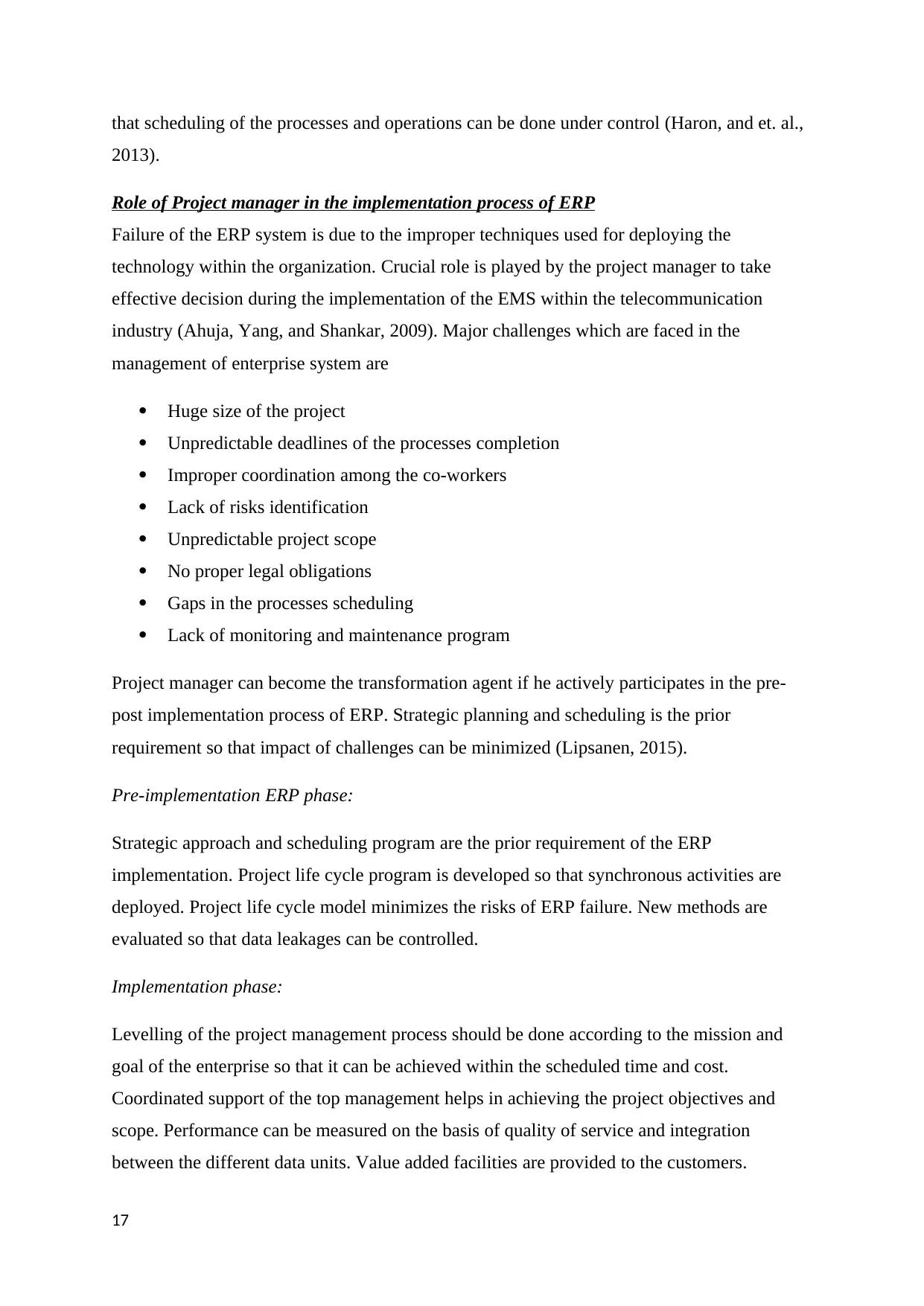
that scheduling of the processes and operations can be done under control (Haron, and et. al.,
2013).
Role of Project manager in the implementation process of ERP
Failure of the ERP system is due to the improper techniques used for deploying the
technology within the organization. Crucial role is played by the project manager to take
effective decision during the implementation of the EMS within the telecommunication
industry (Ahuja, Yang, and Shankar, 2009). Major challenges which are faced in the
management of enterprise system are
Huge size of the project
Unpredictable deadlines of the processes completion
Improper coordination among the co-workers
Lack of risks identification
Unpredictable project scope
No proper legal obligations
Gaps in the processes scheduling
Lack of monitoring and maintenance program
Project manager can become the transformation agent if he actively participates in the pre-
post implementation process of ERP. Strategic planning and scheduling is the prior
requirement so that impact of challenges can be minimized (Lipsanen, 2015).
Pre-implementation ERP phase:
Strategic approach and scheduling program are the prior requirement of the ERP
implementation. Project life cycle program is developed so that synchronous activities are
deployed. Project life cycle model minimizes the risks of ERP failure. New methods are
evaluated so that data leakages can be controlled.
Implementation phase:
Levelling of the project management process should be done according to the mission and
goal of the enterprise so that it can be achieved within the scheduled time and cost.
Coordinated support of the top management helps in achieving the project objectives and
scope. Performance can be measured on the basis of quality of service and integration
between the different data units. Value added facilities are provided to the customers.
17
2013).
Role of Project manager in the implementation process of ERP
Failure of the ERP system is due to the improper techniques used for deploying the
technology within the organization. Crucial role is played by the project manager to take
effective decision during the implementation of the EMS within the telecommunication
industry (Ahuja, Yang, and Shankar, 2009). Major challenges which are faced in the
management of enterprise system are
Huge size of the project
Unpredictable deadlines of the processes completion
Improper coordination among the co-workers
Lack of risks identification
Unpredictable project scope
No proper legal obligations
Gaps in the processes scheduling
Lack of monitoring and maintenance program
Project manager can become the transformation agent if he actively participates in the pre-
post implementation process of ERP. Strategic planning and scheduling is the prior
requirement so that impact of challenges can be minimized (Lipsanen, 2015).
Pre-implementation ERP phase:
Strategic approach and scheduling program are the prior requirement of the ERP
implementation. Project life cycle program is developed so that synchronous activities are
deployed. Project life cycle model minimizes the risks of ERP failure. New methods are
evaluated so that data leakages can be controlled.
Implementation phase:
Levelling of the project management process should be done according to the mission and
goal of the enterprise so that it can be achieved within the scheduled time and cost.
Coordinated support of the top management helps in achieving the project objectives and
scope. Performance can be measured on the basis of quality of service and integration
between the different data units. Value added facilities are provided to the customers.
17
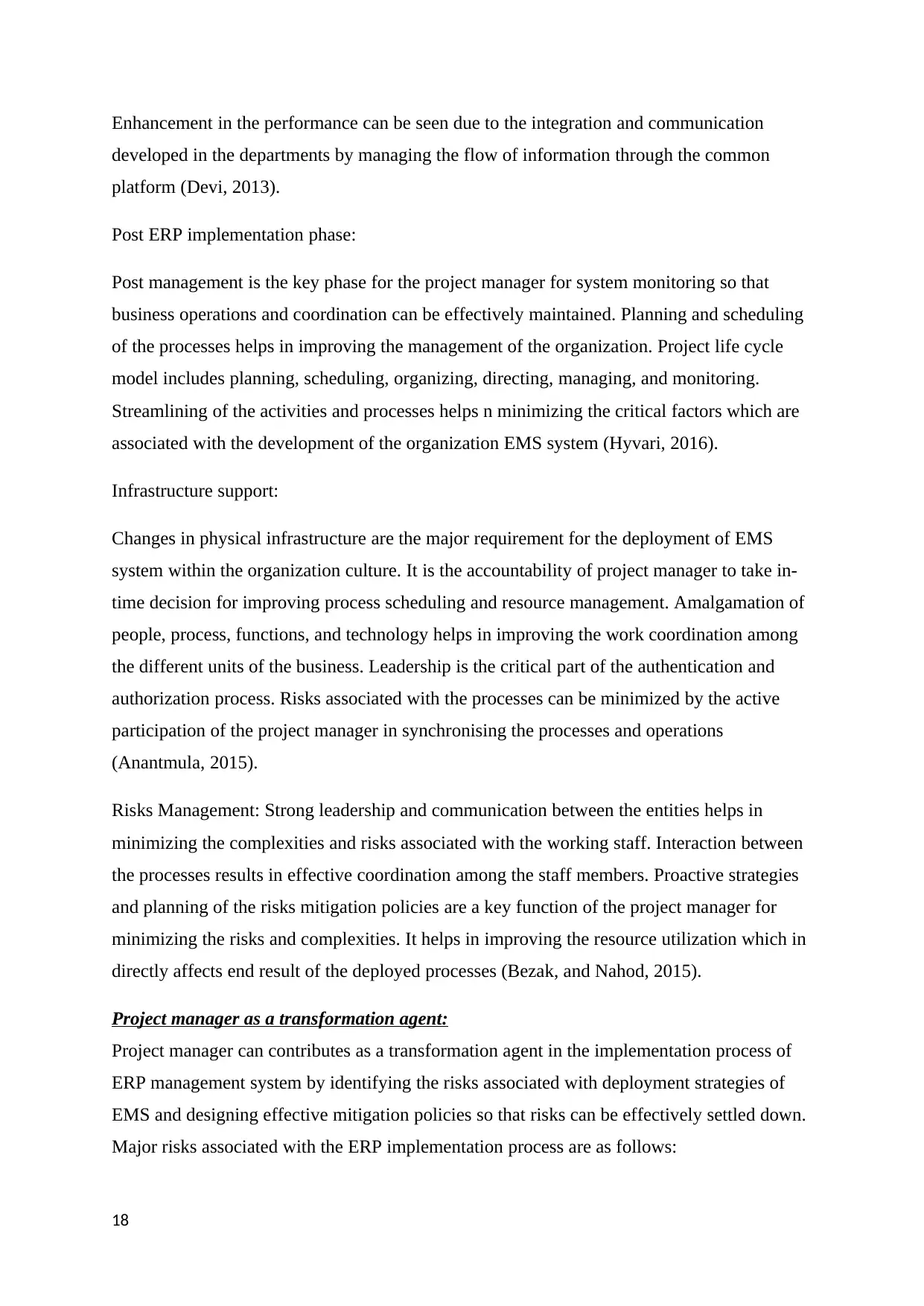
Enhancement in the performance can be seen due to the integration and communication
developed in the departments by managing the flow of information through the common
platform (Devi, 2013).
Post ERP implementation phase:
Post management is the key phase for the project manager for system monitoring so that
business operations and coordination can be effectively maintained. Planning and scheduling
of the processes helps in improving the management of the organization. Project life cycle
model includes planning, scheduling, organizing, directing, managing, and monitoring.
Streamlining of the activities and processes helps n minimizing the critical factors which are
associated with the development of the organization EMS system (Hyvari, 2016).
Infrastructure support:
Changes in physical infrastructure are the major requirement for the deployment of EMS
system within the organization culture. It is the accountability of project manager to take in-
time decision for improving process scheduling and resource management. Amalgamation of
people, process, functions, and technology helps in improving the work coordination among
the different units of the business. Leadership is the critical part of the authentication and
authorization process. Risks associated with the processes can be minimized by the active
participation of the project manager in synchronising the processes and operations
(Anantmula, 2015).
Risks Management: Strong leadership and communication between the entities helps in
minimizing the complexities and risks associated with the working staff. Interaction between
the processes results in effective coordination among the staff members. Proactive strategies
and planning of the risks mitigation policies are a key function of the project manager for
minimizing the risks and complexities. It helps in improving the resource utilization which in
directly affects end result of the deployed processes (Bezak, and Nahod, 2015).
Project manager as a transformation agent:
Project manager can contributes as a transformation agent in the implementation process of
ERP management system by identifying the risks associated with deployment strategies of
EMS and designing effective mitigation policies so that risks can be effectively settled down.
Major risks associated with the ERP implementation process are as follows:
18
developed in the departments by managing the flow of information through the common
platform (Devi, 2013).
Post ERP implementation phase:
Post management is the key phase for the project manager for system monitoring so that
business operations and coordination can be effectively maintained. Planning and scheduling
of the processes helps in improving the management of the organization. Project life cycle
model includes planning, scheduling, organizing, directing, managing, and monitoring.
Streamlining of the activities and processes helps n minimizing the critical factors which are
associated with the development of the organization EMS system (Hyvari, 2016).
Infrastructure support:
Changes in physical infrastructure are the major requirement for the deployment of EMS
system within the organization culture. It is the accountability of project manager to take in-
time decision for improving process scheduling and resource management. Amalgamation of
people, process, functions, and technology helps in improving the work coordination among
the different units of the business. Leadership is the critical part of the authentication and
authorization process. Risks associated with the processes can be minimized by the active
participation of the project manager in synchronising the processes and operations
(Anantmula, 2015).
Risks Management: Strong leadership and communication between the entities helps in
minimizing the complexities and risks associated with the working staff. Interaction between
the processes results in effective coordination among the staff members. Proactive strategies
and planning of the risks mitigation policies are a key function of the project manager for
minimizing the risks and complexities. It helps in improving the resource utilization which in
directly affects end result of the deployed processes (Bezak, and Nahod, 2015).
Project manager as a transformation agent:
Project manager can contributes as a transformation agent in the implementation process of
ERP management system by identifying the risks associated with deployment strategies of
EMS and designing effective mitigation policies so that risks can be effectively settled down.
Major risks associated with the ERP implementation process are as follows:
18
Paraphrase This Document
Need a fresh take? Get an instant paraphrase of this document with our AI Paraphraser
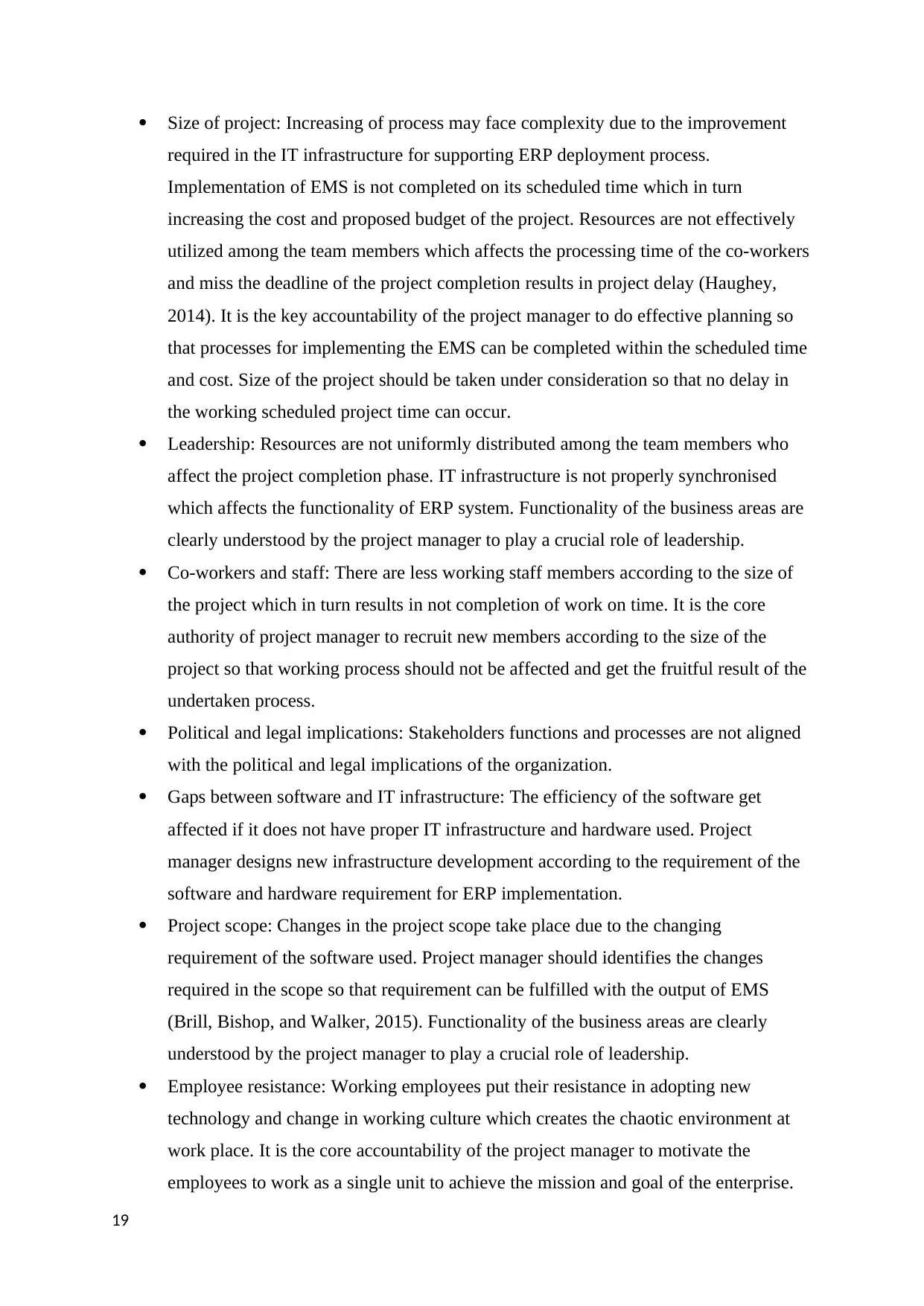
Size of project: Increasing of process may face complexity due to the improvement
required in the IT infrastructure for supporting ERP deployment process.
Implementation of EMS is not completed on its scheduled time which in turn
increasing the cost and proposed budget of the project. Resources are not effectively
utilized among the team members which affects the processing time of the co-workers
and miss the deadline of the project completion results in project delay (Haughey,
2014). It is the key accountability of the project manager to do effective planning so
that processes for implementing the EMS can be completed within the scheduled time
and cost. Size of the project should be taken under consideration so that no delay in
the working scheduled project time can occur.
Leadership: Resources are not uniformly distributed among the team members who
affect the project completion phase. IT infrastructure is not properly synchronised
which affects the functionality of ERP system. Functionality of the business areas are
clearly understood by the project manager to play a crucial role of leadership.
Co-workers and staff: There are less working staff members according to the size of
the project which in turn results in not completion of work on time. It is the core
authority of project manager to recruit new members according to the size of the
project so that working process should not be affected and get the fruitful result of the
undertaken process.
Political and legal implications: Stakeholders functions and processes are not aligned
with the political and legal implications of the organization.
Gaps between software and IT infrastructure: The efficiency of the software get
affected if it does not have proper IT infrastructure and hardware used. Project
manager designs new infrastructure development according to the requirement of the
software and hardware requirement for ERP implementation.
Project scope: Changes in the project scope take place due to the changing
requirement of the software used. Project manager should identifies the changes
required in the scope so that requirement can be fulfilled with the output of EMS
(Brill, Bishop, and Walker, 2015). Functionality of the business areas are clearly
understood by the project manager to play a crucial role of leadership.
Employee resistance: Working employees put their resistance in adopting new
technology and change in working culture which creates the chaotic environment at
work place. It is the core accountability of the project manager to motivate the
employees to work as a single unit to achieve the mission and goal of the enterprise.
19
required in the IT infrastructure for supporting ERP deployment process.
Implementation of EMS is not completed on its scheduled time which in turn
increasing the cost and proposed budget of the project. Resources are not effectively
utilized among the team members which affects the processing time of the co-workers
and miss the deadline of the project completion results in project delay (Haughey,
2014). It is the key accountability of the project manager to do effective planning so
that processes for implementing the EMS can be completed within the scheduled time
and cost. Size of the project should be taken under consideration so that no delay in
the working scheduled project time can occur.
Leadership: Resources are not uniformly distributed among the team members who
affect the project completion phase. IT infrastructure is not properly synchronised
which affects the functionality of ERP system. Functionality of the business areas are
clearly understood by the project manager to play a crucial role of leadership.
Co-workers and staff: There are less working staff members according to the size of
the project which in turn results in not completion of work on time. It is the core
authority of project manager to recruit new members according to the size of the
project so that working process should not be affected and get the fruitful result of the
undertaken process.
Political and legal implications: Stakeholders functions and processes are not aligned
with the political and legal implications of the organization.
Gaps between software and IT infrastructure: The efficiency of the software get
affected if it does not have proper IT infrastructure and hardware used. Project
manager designs new infrastructure development according to the requirement of the
software and hardware requirement for ERP implementation.
Project scope: Changes in the project scope take place due to the changing
requirement of the software used. Project manager should identifies the changes
required in the scope so that requirement can be fulfilled with the output of EMS
(Brill, Bishop, and Walker, 2015). Functionality of the business areas are clearly
understood by the project manager to play a crucial role of leadership.
Employee resistance: Working employees put their resistance in adopting new
technology and change in working culture which creates the chaotic environment at
work place. It is the core accountability of the project manager to motivate the
employees to work as a single unit to achieve the mission and goal of the enterprise.
19
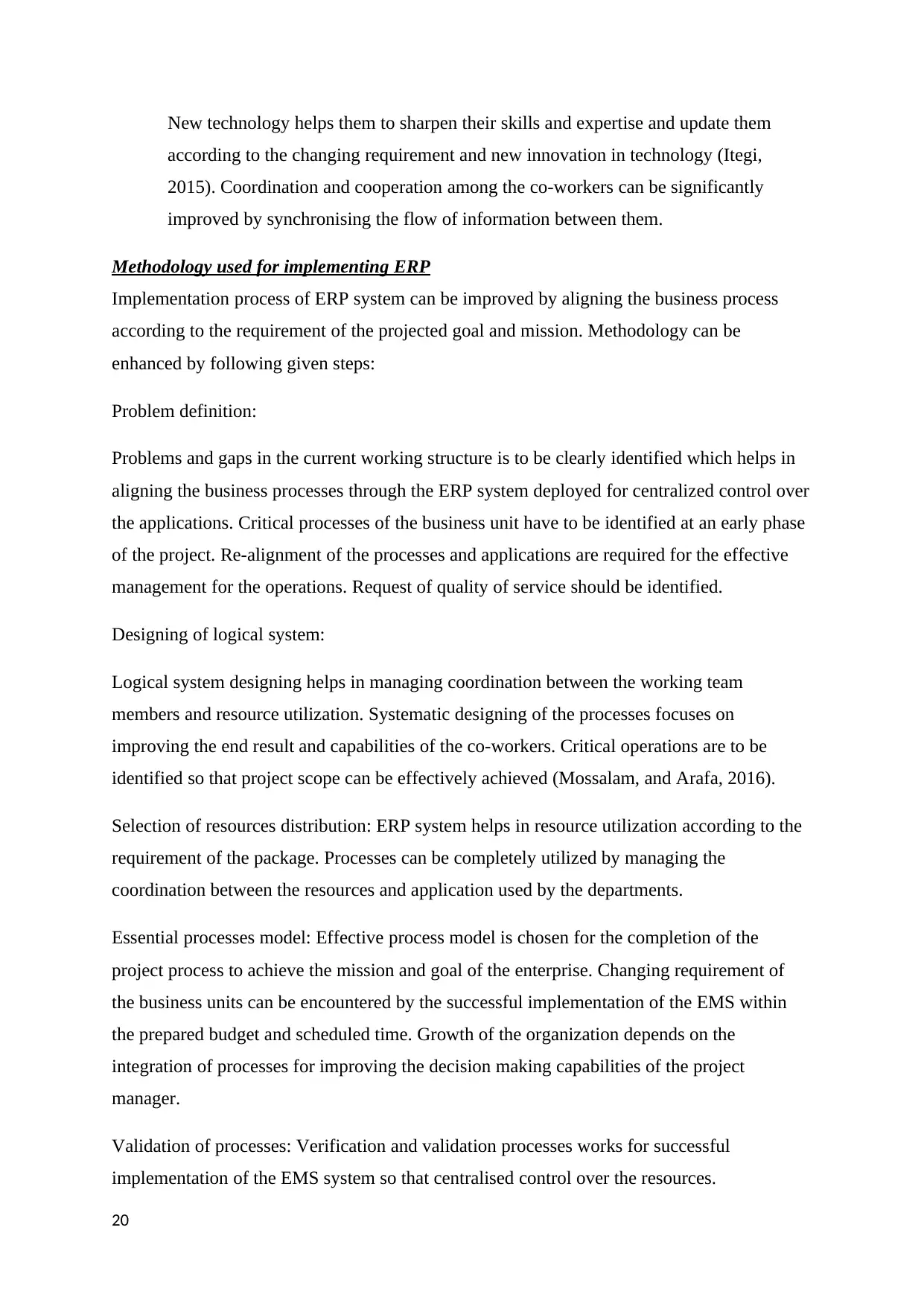
New technology helps them to sharpen their skills and expertise and update them
according to the changing requirement and new innovation in technology (Itegi,
2015). Coordination and cooperation among the co-workers can be significantly
improved by synchronising the flow of information between them.
Methodology used for implementing ERP
Implementation process of ERP system can be improved by aligning the business process
according to the requirement of the projected goal and mission. Methodology can be
enhanced by following given steps:
Problem definition:
Problems and gaps in the current working structure is to be clearly identified which helps in
aligning the business processes through the ERP system deployed for centralized control over
the applications. Critical processes of the business unit have to be identified at an early phase
of the project. Re-alignment of the processes and applications are required for the effective
management for the operations. Request of quality of service should be identified.
Designing of logical system:
Logical system designing helps in managing coordination between the working team
members and resource utilization. Systematic designing of the processes focuses on
improving the end result and capabilities of the co-workers. Critical operations are to be
identified so that project scope can be effectively achieved (Mossalam, and Arafa, 2016).
Selection of resources distribution: ERP system helps in resource utilization according to the
requirement of the package. Processes can be completely utilized by managing the
coordination between the resources and application used by the departments.
Essential processes model: Effective process model is chosen for the completion of the
project process to achieve the mission and goal of the enterprise. Changing requirement of
the business units can be encountered by the successful implementation of the EMS within
the prepared budget and scheduled time. Growth of the organization depends on the
integration of processes for improving the decision making capabilities of the project
manager.
Validation of processes: Verification and validation processes works for successful
implementation of the EMS system so that centralised control over the resources.
20
according to the changing requirement and new innovation in technology (Itegi,
2015). Coordination and cooperation among the co-workers can be significantly
improved by synchronising the flow of information between them.
Methodology used for implementing ERP
Implementation process of ERP system can be improved by aligning the business process
according to the requirement of the projected goal and mission. Methodology can be
enhanced by following given steps:
Problem definition:
Problems and gaps in the current working structure is to be clearly identified which helps in
aligning the business processes through the ERP system deployed for centralized control over
the applications. Critical processes of the business unit have to be identified at an early phase
of the project. Re-alignment of the processes and applications are required for the effective
management for the operations. Request of quality of service should be identified.
Designing of logical system:
Logical system designing helps in managing coordination between the working team
members and resource utilization. Systematic designing of the processes focuses on
improving the end result and capabilities of the co-workers. Critical operations are to be
identified so that project scope can be effectively achieved (Mossalam, and Arafa, 2016).
Selection of resources distribution: ERP system helps in resource utilization according to the
requirement of the package. Processes can be completely utilized by managing the
coordination between the resources and application used by the departments.
Essential processes model: Effective process model is chosen for the completion of the
project process to achieve the mission and goal of the enterprise. Changing requirement of
the business units can be encountered by the successful implementation of the EMS within
the prepared budget and scheduled time. Growth of the organization depends on the
integration of processes for improving the decision making capabilities of the project
manager.
Validation of processes: Verification and validation processes works for successful
implementation of the EMS system so that centralised control over the resources.
20
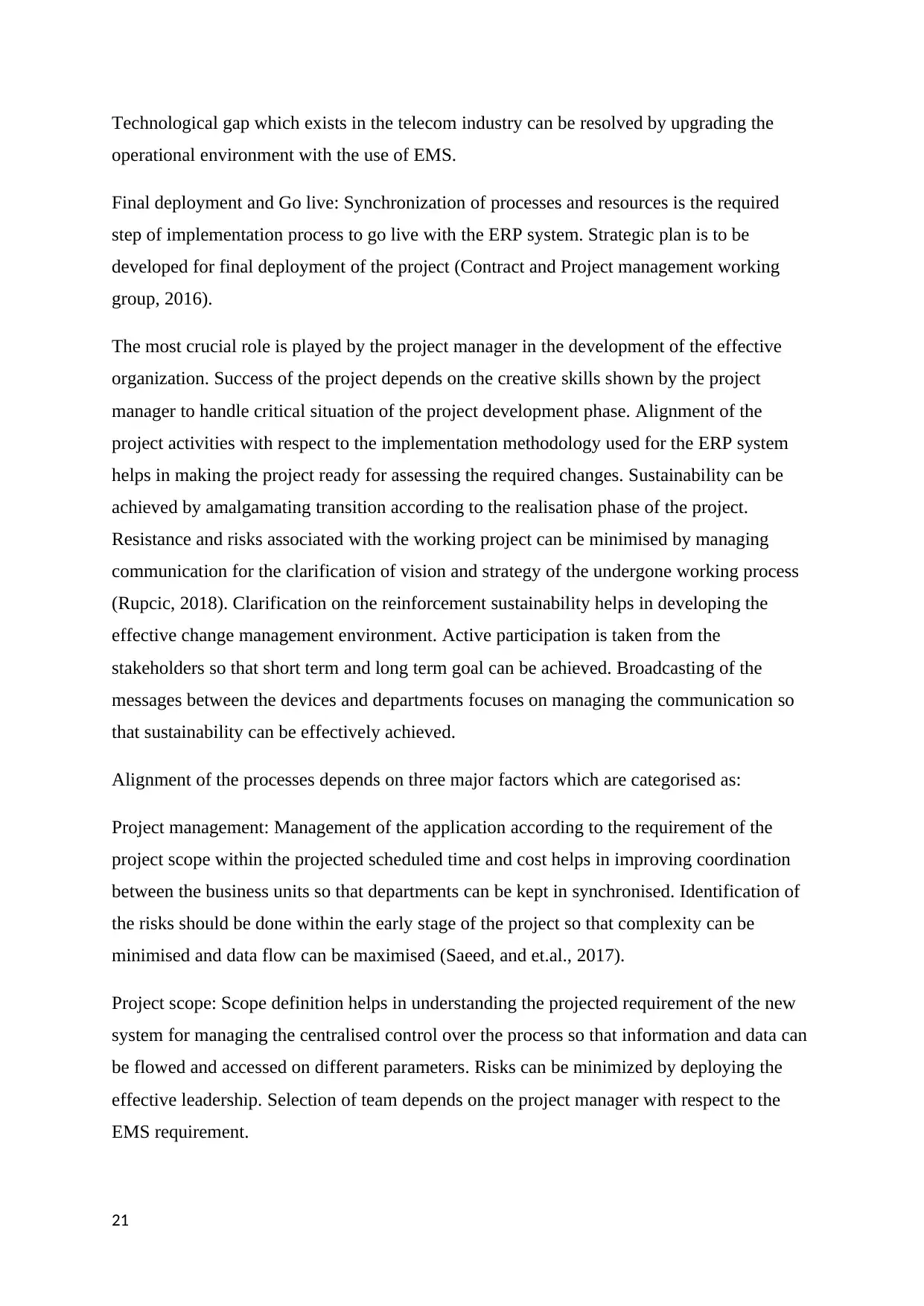
Technological gap which exists in the telecom industry can be resolved by upgrading the
operational environment with the use of EMS.
Final deployment and Go live: Synchronization of processes and resources is the required
step of implementation process to go live with the ERP system. Strategic plan is to be
developed for final deployment of the project (Contract and Project management working
group, 2016).
The most crucial role is played by the project manager in the development of the effective
organization. Success of the project depends on the creative skills shown by the project
manager to handle critical situation of the project development phase. Alignment of the
project activities with respect to the implementation methodology used for the ERP system
helps in making the project ready for assessing the required changes. Sustainability can be
achieved by amalgamating transition according to the realisation phase of the project.
Resistance and risks associated with the working project can be minimised by managing
communication for the clarification of vision and strategy of the undergone working process
(Rupcic, 2018). Clarification on the reinforcement sustainability helps in developing the
effective change management environment. Active participation is taken from the
stakeholders so that short term and long term goal can be achieved. Broadcasting of the
messages between the devices and departments focuses on managing the communication so
that sustainability can be effectively achieved.
Alignment of the processes depends on three major factors which are categorised as:
Project management: Management of the application according to the requirement of the
project scope within the projected scheduled time and cost helps in improving coordination
between the business units so that departments can be kept in synchronised. Identification of
the risks should be done within the early stage of the project so that complexity can be
minimised and data flow can be maximised (Saeed, and et.al., 2017).
Project scope: Scope definition helps in understanding the projected requirement of the new
system for managing the centralised control over the process so that information and data can
be flowed and accessed on different parameters. Risks can be minimized by deploying the
effective leadership. Selection of team depends on the project manager with respect to the
EMS requirement.
21
operational environment with the use of EMS.
Final deployment and Go live: Synchronization of processes and resources is the required
step of implementation process to go live with the ERP system. Strategic plan is to be
developed for final deployment of the project (Contract and Project management working
group, 2016).
The most crucial role is played by the project manager in the development of the effective
organization. Success of the project depends on the creative skills shown by the project
manager to handle critical situation of the project development phase. Alignment of the
project activities with respect to the implementation methodology used for the ERP system
helps in making the project ready for assessing the required changes. Sustainability can be
achieved by amalgamating transition according to the realisation phase of the project.
Resistance and risks associated with the working project can be minimised by managing
communication for the clarification of vision and strategy of the undergone working process
(Rupcic, 2018). Clarification on the reinforcement sustainability helps in developing the
effective change management environment. Active participation is taken from the
stakeholders so that short term and long term goal can be achieved. Broadcasting of the
messages between the devices and departments focuses on managing the communication so
that sustainability can be effectively achieved.
Alignment of the processes depends on three major factors which are categorised as:
Project management: Management of the application according to the requirement of the
project scope within the projected scheduled time and cost helps in improving coordination
between the business units so that departments can be kept in synchronised. Identification of
the risks should be done within the early stage of the project so that complexity can be
minimised and data flow can be maximised (Saeed, and et.al., 2017).
Project scope: Scope definition helps in understanding the projected requirement of the new
system for managing the centralised control over the process so that information and data can
be flowed and accessed on different parameters. Risks can be minimized by deploying the
effective leadership. Selection of team depends on the project manager with respect to the
EMS requirement.
21
Secure Best Marks with AI Grader
Need help grading? Try our AI Grader for instant feedback on your assignments.
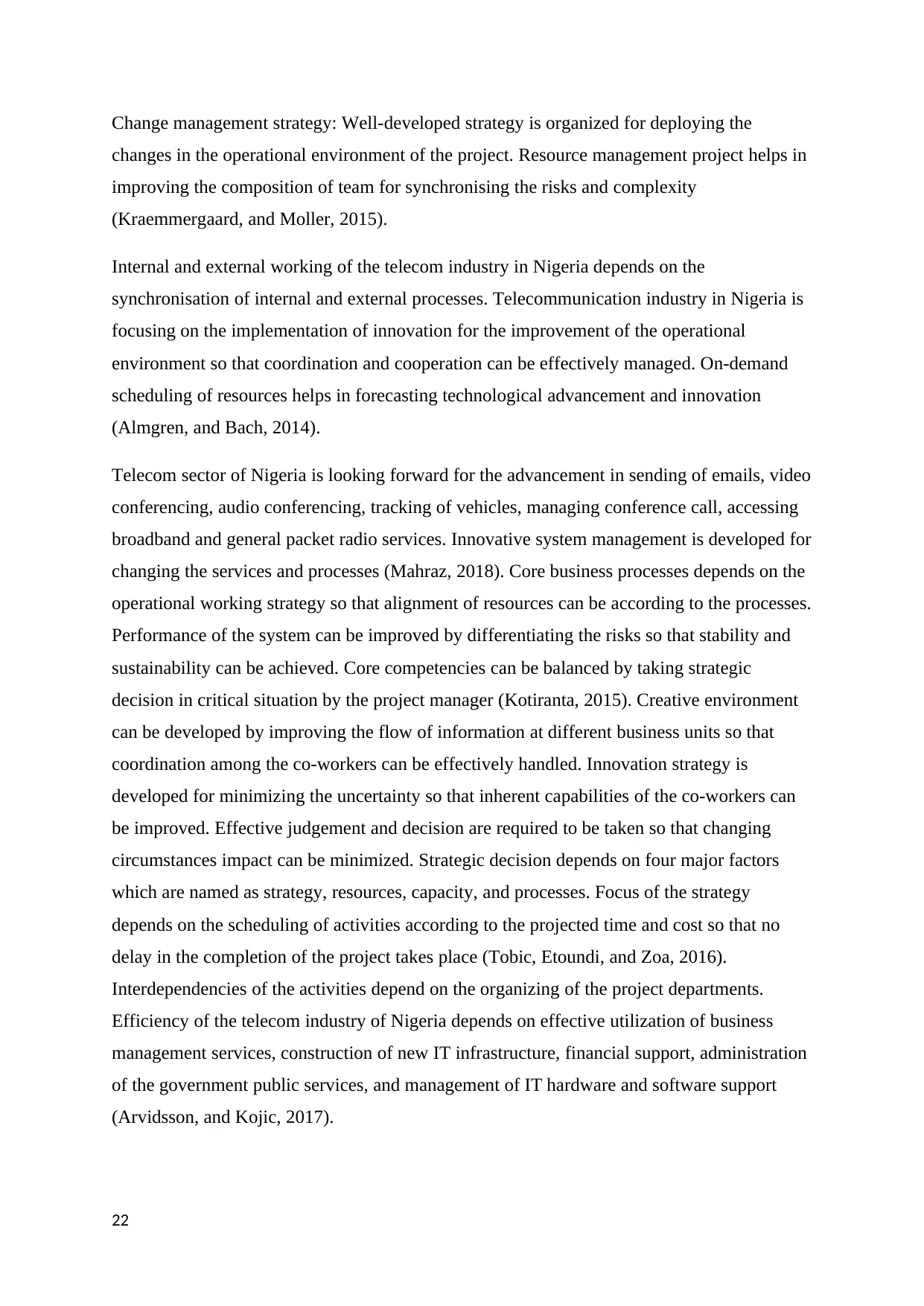
Change management strategy: Well-developed strategy is organized for deploying the
changes in the operational environment of the project. Resource management project helps in
improving the composition of team for synchronising the risks and complexity
(Kraemmergaard, and Moller, 2015).
Internal and external working of the telecom industry in Nigeria depends on the
synchronisation of internal and external processes. Telecommunication industry in Nigeria is
focusing on the implementation of innovation for the improvement of the operational
environment so that coordination and cooperation can be effectively managed. On-demand
scheduling of resources helps in forecasting technological advancement and innovation
(Almgren, and Bach, 2014).
Telecom sector of Nigeria is looking forward for the advancement in sending of emails, video
conferencing, audio conferencing, tracking of vehicles, managing conference call, accessing
broadband and general packet radio services. Innovative system management is developed for
changing the services and processes (Mahraz, 2018). Core business processes depends on the
operational working strategy so that alignment of resources can be according to the processes.
Performance of the system can be improved by differentiating the risks so that stability and
sustainability can be achieved. Core competencies can be balanced by taking strategic
decision in critical situation by the project manager (Kotiranta, 2015). Creative environment
can be developed by improving the flow of information at different business units so that
coordination among the co-workers can be effectively handled. Innovation strategy is
developed for minimizing the uncertainty so that inherent capabilities of the co-workers can
be improved. Effective judgement and decision are required to be taken so that changing
circumstances impact can be minimized. Strategic decision depends on four major factors
which are named as strategy, resources, capacity, and processes. Focus of the strategy
depends on the scheduling of activities according to the projected time and cost so that no
delay in the completion of the project takes place (Tobic, Etoundi, and Zoa, 2016).
Interdependencies of the activities depend on the organizing of the project departments.
Efficiency of the telecom industry of Nigeria depends on effective utilization of business
management services, construction of new IT infrastructure, financial support, administration
of the government public services, and management of IT hardware and software support
(Arvidsson, and Kojic, 2017).
22
changes in the operational environment of the project. Resource management project helps in
improving the composition of team for synchronising the risks and complexity
(Kraemmergaard, and Moller, 2015).
Internal and external working of the telecom industry in Nigeria depends on the
synchronisation of internal and external processes. Telecommunication industry in Nigeria is
focusing on the implementation of innovation for the improvement of the operational
environment so that coordination and cooperation can be effectively managed. On-demand
scheduling of resources helps in forecasting technological advancement and innovation
(Almgren, and Bach, 2014).
Telecom sector of Nigeria is looking forward for the advancement in sending of emails, video
conferencing, audio conferencing, tracking of vehicles, managing conference call, accessing
broadband and general packet radio services. Innovative system management is developed for
changing the services and processes (Mahraz, 2018). Core business processes depends on the
operational working strategy so that alignment of resources can be according to the processes.
Performance of the system can be improved by differentiating the risks so that stability and
sustainability can be achieved. Core competencies can be balanced by taking strategic
decision in critical situation by the project manager (Kotiranta, 2015). Creative environment
can be developed by improving the flow of information at different business units so that
coordination among the co-workers can be effectively handled. Innovation strategy is
developed for minimizing the uncertainty so that inherent capabilities of the co-workers can
be improved. Effective judgement and decision are required to be taken so that changing
circumstances impact can be minimized. Strategic decision depends on four major factors
which are named as strategy, resources, capacity, and processes. Focus of the strategy
depends on the scheduling of activities according to the projected time and cost so that no
delay in the completion of the project takes place (Tobic, Etoundi, and Zoa, 2016).
Interdependencies of the activities depend on the organizing of the project departments.
Efficiency of the telecom industry of Nigeria depends on effective utilization of business
management services, construction of new IT infrastructure, financial support, administration
of the government public services, and management of IT hardware and software support
(Arvidsson, and Kojic, 2017).
22
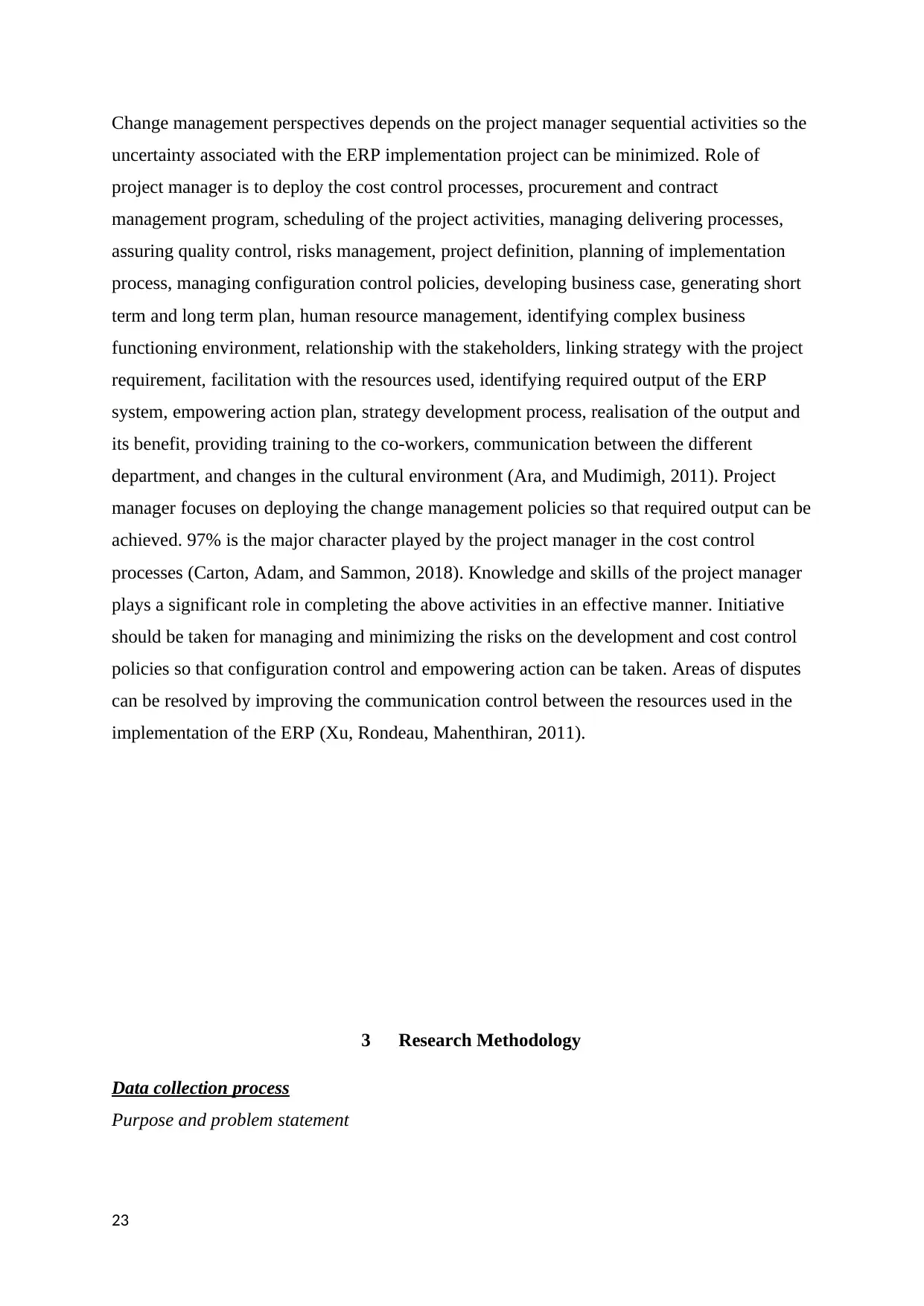
Change management perspectives depends on the project manager sequential activities so the
uncertainty associated with the ERP implementation project can be minimized. Role of
project manager is to deploy the cost control processes, procurement and contract
management program, scheduling of the project activities, managing delivering processes,
assuring quality control, risks management, project definition, planning of implementation
process, managing configuration control policies, developing business case, generating short
term and long term plan, human resource management, identifying complex business
functioning environment, relationship with the stakeholders, linking strategy with the project
requirement, facilitation with the resources used, identifying required output of the ERP
system, empowering action plan, strategy development process, realisation of the output and
its benefit, providing training to the co-workers, communication between the different
department, and changes in the cultural environment (Ara, and Mudimigh, 2011). Project
manager focuses on deploying the change management policies so that required output can be
achieved. 97% is the major character played by the project manager in the cost control
processes (Carton, Adam, and Sammon, 2018). Knowledge and skills of the project manager
plays a significant role in completing the above activities in an effective manner. Initiative
should be taken for managing and minimizing the risks on the development and cost control
policies so that configuration control and empowering action can be taken. Areas of disputes
can be resolved by improving the communication control between the resources used in the
implementation of the ERP (Xu, Rondeau, Mahenthiran, 2011).
3 Research Methodology
Data collection process
Purpose and problem statement
23
uncertainty associated with the ERP implementation project can be minimized. Role of
project manager is to deploy the cost control processes, procurement and contract
management program, scheduling of the project activities, managing delivering processes,
assuring quality control, risks management, project definition, planning of implementation
process, managing configuration control policies, developing business case, generating short
term and long term plan, human resource management, identifying complex business
functioning environment, relationship with the stakeholders, linking strategy with the project
requirement, facilitation with the resources used, identifying required output of the ERP
system, empowering action plan, strategy development process, realisation of the output and
its benefit, providing training to the co-workers, communication between the different
department, and changes in the cultural environment (Ara, and Mudimigh, 2011). Project
manager focuses on deploying the change management policies so that required output can be
achieved. 97% is the major character played by the project manager in the cost control
processes (Carton, Adam, and Sammon, 2018). Knowledge and skills of the project manager
plays a significant role in completing the above activities in an effective manner. Initiative
should be taken for managing and minimizing the risks on the development and cost control
policies so that configuration control and empowering action can be taken. Areas of disputes
can be resolved by improving the communication control between the resources used in the
implementation of the ERP (Xu, Rondeau, Mahenthiran, 2011).
3 Research Methodology
Data collection process
Purpose and problem statement
23
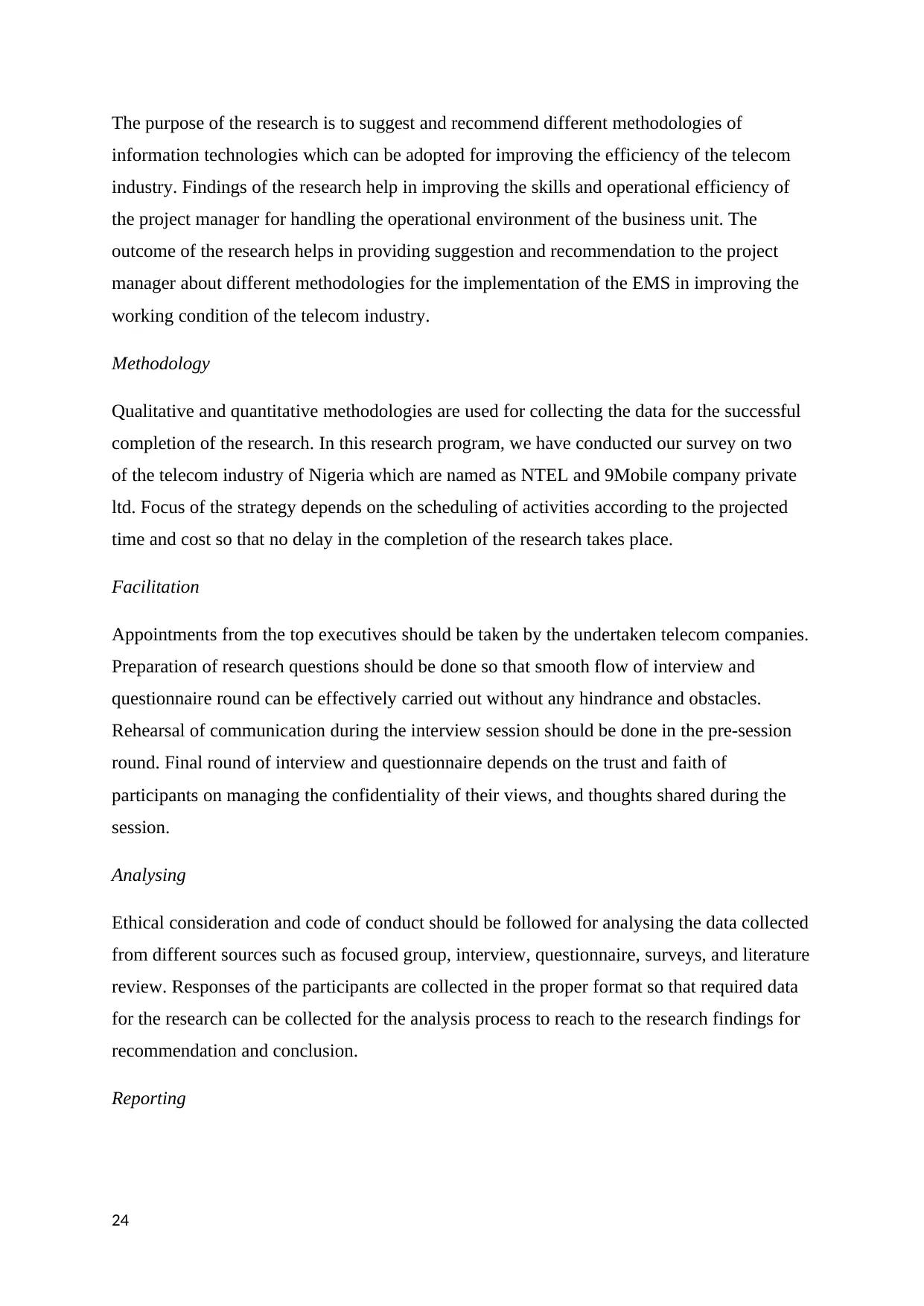
The purpose of the research is to suggest and recommend different methodologies of
information technologies which can be adopted for improving the efficiency of the telecom
industry. Findings of the research help in improving the skills and operational efficiency of
the project manager for handling the operational environment of the business unit. The
outcome of the research helps in providing suggestion and recommendation to the project
manager about different methodologies for the implementation of the EMS in improving the
working condition of the telecom industry.
Methodology
Qualitative and quantitative methodologies are used for collecting the data for the successful
completion of the research. In this research program, we have conducted our survey on two
of the telecom industry of Nigeria which are named as NTEL and 9Mobile company private
ltd. Focus of the strategy depends on the scheduling of activities according to the projected
time and cost so that no delay in the completion of the research takes place.
Facilitation
Appointments from the top executives should be taken by the undertaken telecom companies.
Preparation of research questions should be done so that smooth flow of interview and
questionnaire round can be effectively carried out without any hindrance and obstacles.
Rehearsal of communication during the interview session should be done in the pre-session
round. Final round of interview and questionnaire depends on the trust and faith of
participants on managing the confidentiality of their views, and thoughts shared during the
session.
Analysing
Ethical consideration and code of conduct should be followed for analysing the data collected
from different sources such as focused group, interview, questionnaire, surveys, and literature
review. Responses of the participants are collected in the proper format so that required data
for the research can be collected for the analysis process to reach to the research findings for
recommendation and conclusion.
Reporting
24
information technologies which can be adopted for improving the efficiency of the telecom
industry. Findings of the research help in improving the skills and operational efficiency of
the project manager for handling the operational environment of the business unit. The
outcome of the research helps in providing suggestion and recommendation to the project
manager about different methodologies for the implementation of the EMS in improving the
working condition of the telecom industry.
Methodology
Qualitative and quantitative methodologies are used for collecting the data for the successful
completion of the research. In this research program, we have conducted our survey on two
of the telecom industry of Nigeria which are named as NTEL and 9Mobile company private
ltd. Focus of the strategy depends on the scheduling of activities according to the projected
time and cost so that no delay in the completion of the research takes place.
Facilitation
Appointments from the top executives should be taken by the undertaken telecom companies.
Preparation of research questions should be done so that smooth flow of interview and
questionnaire round can be effectively carried out without any hindrance and obstacles.
Rehearsal of communication during the interview session should be done in the pre-session
round. Final round of interview and questionnaire depends on the trust and faith of
participants on managing the confidentiality of their views, and thoughts shared during the
session.
Analysing
Ethical consideration and code of conduct should be followed for analysing the data collected
from different sources such as focused group, interview, questionnaire, surveys, and literature
review. Responses of the participants are collected in the proper format so that required data
for the research can be collected for the analysis process to reach to the research findings for
recommendation and conclusion.
Reporting
24
Paraphrase This Document
Need a fresh take? Get an instant paraphrase of this document with our AI Paraphraser
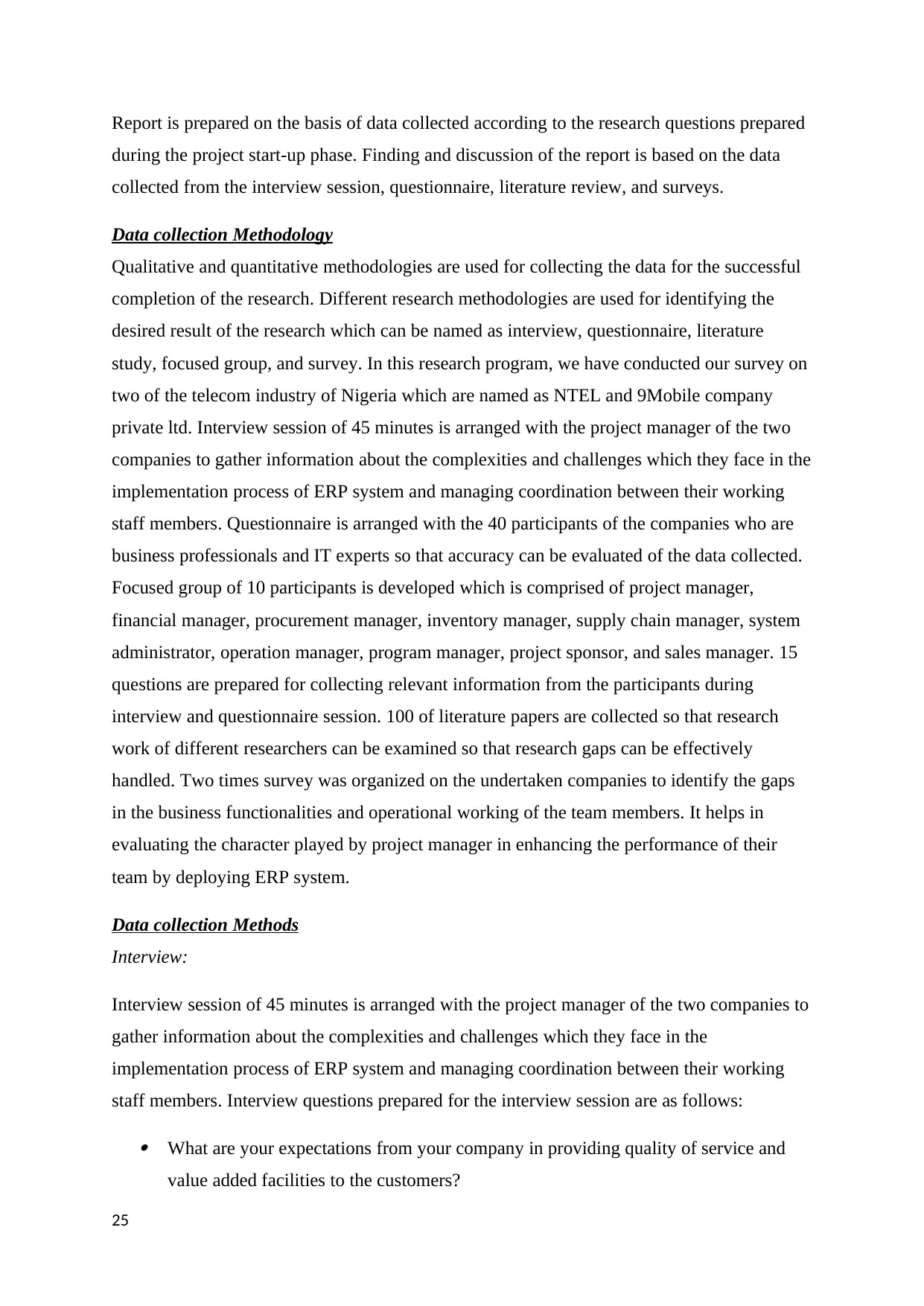
Report is prepared on the basis of data collected according to the research questions prepared
during the project start-up phase. Finding and discussion of the report is based on the data
collected from the interview session, questionnaire, literature review, and surveys.
Data collection Methodology
Qualitative and quantitative methodologies are used for collecting the data for the successful
completion of the research. Different research methodologies are used for identifying the
desired result of the research which can be named as interview, questionnaire, literature
study, focused group, and survey. In this research program, we have conducted our survey on
two of the telecom industry of Nigeria which are named as NTEL and 9Mobile company
private ltd. Interview session of 45 minutes is arranged with the project manager of the two
companies to gather information about the complexities and challenges which they face in the
implementation process of ERP system and managing coordination between their working
staff members. Questionnaire is arranged with the 40 participants of the companies who are
business professionals and IT experts so that accuracy can be evaluated of the data collected.
Focused group of 10 participants is developed which is comprised of project manager,
financial manager, procurement manager, inventory manager, supply chain manager, system
administrator, operation manager, program manager, project sponsor, and sales manager. 15
questions are prepared for collecting relevant information from the participants during
interview and questionnaire session. 100 of literature papers are collected so that research
work of different researchers can be examined so that research gaps can be effectively
handled. Two times survey was organized on the undertaken companies to identify the gaps
in the business functionalities and operational working of the team members. It helps in
evaluating the character played by project manager in enhancing the performance of their
team by deploying ERP system.
Data collection Methods
Interview:
Interview session of 45 minutes is arranged with the project manager of the two companies to
gather information about the complexities and challenges which they face in the
implementation process of ERP system and managing coordination between their working
staff members. Interview questions prepared for the interview session are as follows:
What are your expectations from your company in providing quality of service and
value added facilities to the customers?
25
during the project start-up phase. Finding and discussion of the report is based on the data
collected from the interview session, questionnaire, literature review, and surveys.
Data collection Methodology
Qualitative and quantitative methodologies are used for collecting the data for the successful
completion of the research. Different research methodologies are used for identifying the
desired result of the research which can be named as interview, questionnaire, literature
study, focused group, and survey. In this research program, we have conducted our survey on
two of the telecom industry of Nigeria which are named as NTEL and 9Mobile company
private ltd. Interview session of 45 minutes is arranged with the project manager of the two
companies to gather information about the complexities and challenges which they face in the
implementation process of ERP system and managing coordination between their working
staff members. Questionnaire is arranged with the 40 participants of the companies who are
business professionals and IT experts so that accuracy can be evaluated of the data collected.
Focused group of 10 participants is developed which is comprised of project manager,
financial manager, procurement manager, inventory manager, supply chain manager, system
administrator, operation manager, program manager, project sponsor, and sales manager. 15
questions are prepared for collecting relevant information from the participants during
interview and questionnaire session. 100 of literature papers are collected so that research
work of different researchers can be examined so that research gaps can be effectively
handled. Two times survey was organized on the undertaken companies to identify the gaps
in the business functionalities and operational working of the team members. It helps in
evaluating the character played by project manager in enhancing the performance of their
team by deploying ERP system.
Data collection Methods
Interview:
Interview session of 45 minutes is arranged with the project manager of the two companies to
gather information about the complexities and challenges which they face in the
implementation process of ERP system and managing coordination between their working
staff members. Interview questions prepared for the interview session are as follows:
What are your expectations from your company in providing quality of service and
value added facilities to the customers?
25
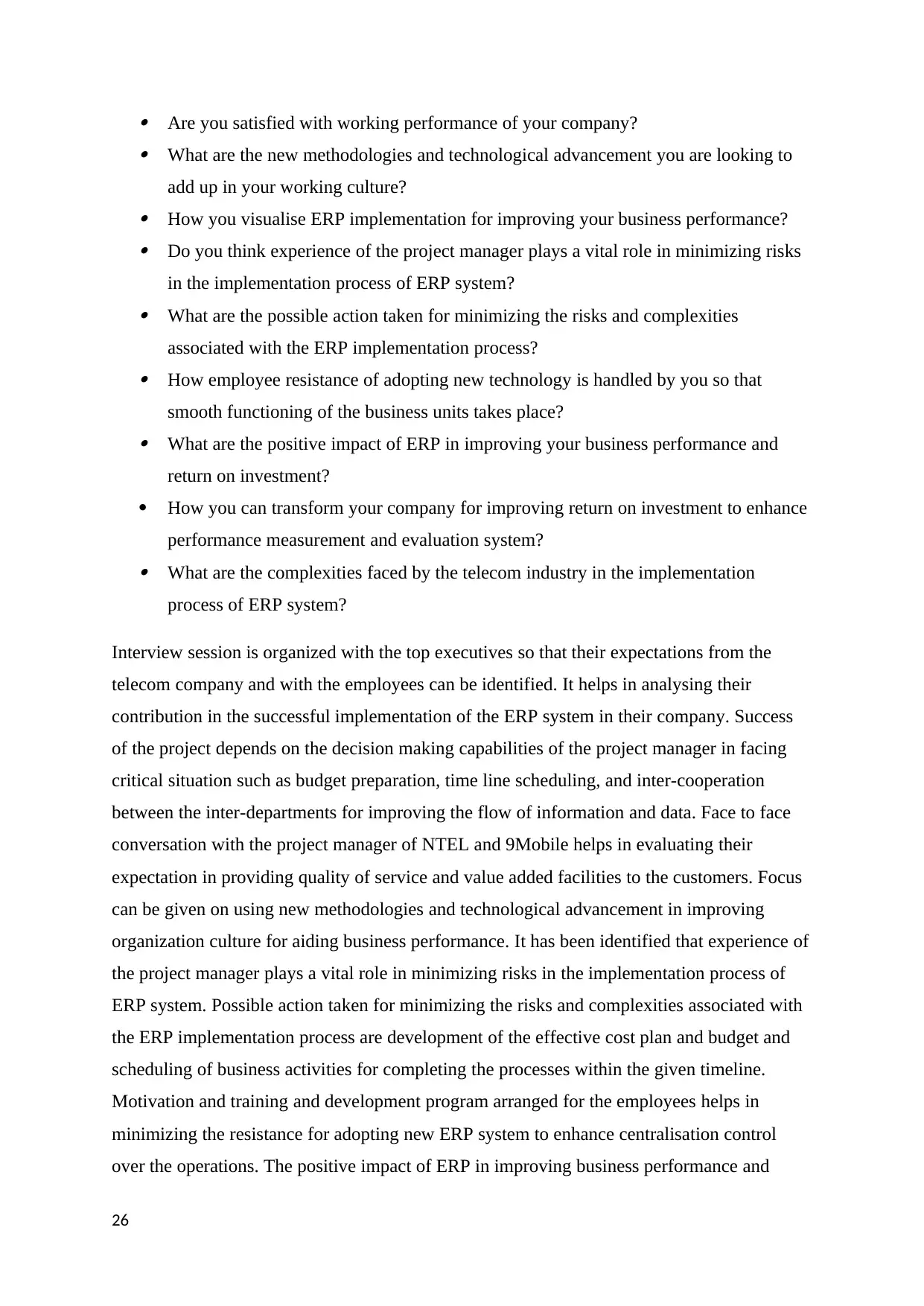
Are you satisfied with working performance of your company? What are the new methodologies and technological advancement you are looking to
add up in your working culture? How you visualise ERP implementation for improving your business performance? Do you think experience of the project manager plays a vital role in minimizing risks
in the implementation process of ERP system? What are the possible action taken for minimizing the risks and complexities
associated with the ERP implementation process? How employee resistance of adopting new technology is handled by you so that
smooth functioning of the business units takes place? What are the positive impact of ERP in improving your business performance and
return on investment?
How you can transform your company for improving return on investment to enhance
performance measurement and evaluation system? What are the complexities faced by the telecom industry in the implementation
process of ERP system?
Interview session is organized with the top executives so that their expectations from the
telecom company and with the employees can be identified. It helps in analysing their
contribution in the successful implementation of the ERP system in their company. Success
of the project depends on the decision making capabilities of the project manager in facing
critical situation such as budget preparation, time line scheduling, and inter-cooperation
between the inter-departments for improving the flow of information and data. Face to face
conversation with the project manager of NTEL and 9Mobile helps in evaluating their
expectation in providing quality of service and value added facilities to the customers. Focus
can be given on using new methodologies and technological advancement in improving
organization culture for aiding business performance. It has been identified that experience of
the project manager plays a vital role in minimizing risks in the implementation process of
ERP system. Possible action taken for minimizing the risks and complexities associated with
the ERP implementation process are development of the effective cost plan and budget and
scheduling of business activities for completing the processes within the given timeline.
Motivation and training and development program arranged for the employees helps in
minimizing the resistance for adopting new ERP system to enhance centralisation control
over the operations. The positive impact of ERP in improving business performance and
26
add up in your working culture? How you visualise ERP implementation for improving your business performance? Do you think experience of the project manager plays a vital role in minimizing risks
in the implementation process of ERP system? What are the possible action taken for minimizing the risks and complexities
associated with the ERP implementation process? How employee resistance of adopting new technology is handled by you so that
smooth functioning of the business units takes place? What are the positive impact of ERP in improving your business performance and
return on investment?
How you can transform your company for improving return on investment to enhance
performance measurement and evaluation system? What are the complexities faced by the telecom industry in the implementation
process of ERP system?
Interview session is organized with the top executives so that their expectations from the
telecom company and with the employees can be identified. It helps in analysing their
contribution in the successful implementation of the ERP system in their company. Success
of the project depends on the decision making capabilities of the project manager in facing
critical situation such as budget preparation, time line scheduling, and inter-cooperation
between the inter-departments for improving the flow of information and data. Face to face
conversation with the project manager of NTEL and 9Mobile helps in evaluating their
expectation in providing quality of service and value added facilities to the customers. Focus
can be given on using new methodologies and technological advancement in improving
organization culture for aiding business performance. It has been identified that experience of
the project manager plays a vital role in minimizing risks in the implementation process of
ERP system. Possible action taken for minimizing the risks and complexities associated with
the ERP implementation process are development of the effective cost plan and budget and
scheduling of business activities for completing the processes within the given timeline.
Motivation and training and development program arranged for the employees helps in
minimizing the resistance for adopting new ERP system to enhance centralisation control
over the operations. The positive impact of ERP in improving business performance and
26
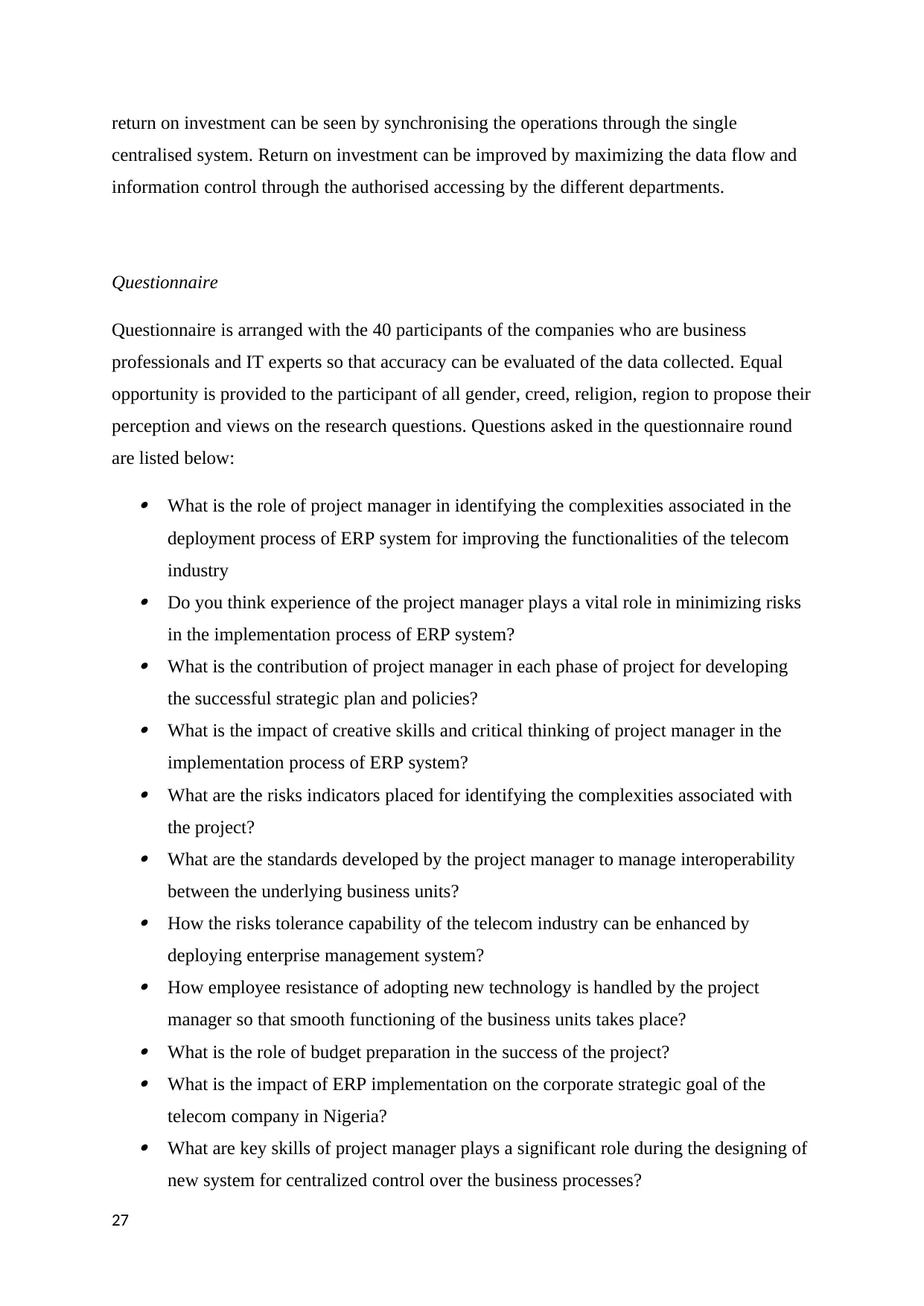
return on investment can be seen by synchronising the operations through the single
centralised system. Return on investment can be improved by maximizing the data flow and
information control through the authorised accessing by the different departments.
Questionnaire
Questionnaire is arranged with the 40 participants of the companies who are business
professionals and IT experts so that accuracy can be evaluated of the data collected. Equal
opportunity is provided to the participant of all gender, creed, religion, region to propose their
perception and views on the research questions. Questions asked in the questionnaire round
are listed below:
What is the role of project manager in identifying the complexities associated in the
deployment process of ERP system for improving the functionalities of the telecom
industry Do you think experience of the project manager plays a vital role in minimizing risks
in the implementation process of ERP system? What is the contribution of project manager in each phase of project for developing
the successful strategic plan and policies? What is the impact of creative skills and critical thinking of project manager in the
implementation process of ERP system? What are the risks indicators placed for identifying the complexities associated with
the project? What are the standards developed by the project manager to manage interoperability
between the underlying business units? How the risks tolerance capability of the telecom industry can be enhanced by
deploying enterprise management system? How employee resistance of adopting new technology is handled by the project
manager so that smooth functioning of the business units takes place? What is the role of budget preparation in the success of the project? What is the impact of ERP implementation on the corporate strategic goal of the
telecom company in Nigeria? What are key skills of project manager plays a significant role during the designing of
new system for centralized control over the business processes?
27
centralised system. Return on investment can be improved by maximizing the data flow and
information control through the authorised accessing by the different departments.
Questionnaire
Questionnaire is arranged with the 40 participants of the companies who are business
professionals and IT experts so that accuracy can be evaluated of the data collected. Equal
opportunity is provided to the participant of all gender, creed, religion, region to propose their
perception and views on the research questions. Questions asked in the questionnaire round
are listed below:
What is the role of project manager in identifying the complexities associated in the
deployment process of ERP system for improving the functionalities of the telecom
industry Do you think experience of the project manager plays a vital role in minimizing risks
in the implementation process of ERP system? What is the contribution of project manager in each phase of project for developing
the successful strategic plan and policies? What is the impact of creative skills and critical thinking of project manager in the
implementation process of ERP system? What are the risks indicators placed for identifying the complexities associated with
the project? What are the standards developed by the project manager to manage interoperability
between the underlying business units? How the risks tolerance capability of the telecom industry can be enhanced by
deploying enterprise management system? How employee resistance of adopting new technology is handled by the project
manager so that smooth functioning of the business units takes place? What is the role of budget preparation in the success of the project? What is the impact of ERP implementation on the corporate strategic goal of the
telecom company in Nigeria? What are key skills of project manager plays a significant role during the designing of
new system for centralized control over the business processes?
27
Secure Best Marks with AI Grader
Need help grading? Try our AI Grader for instant feedback on your assignments.
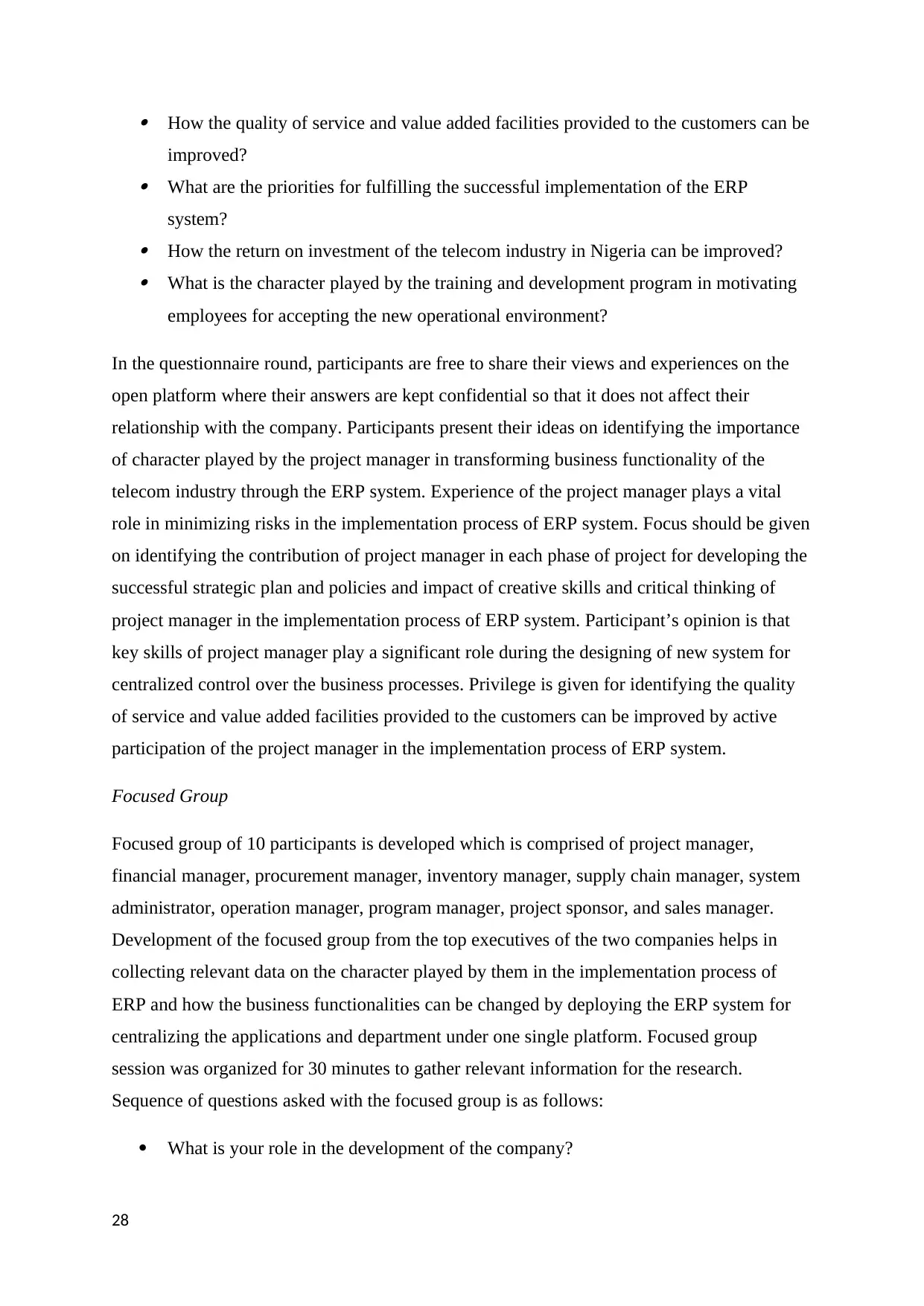
How the quality of service and value added facilities provided to the customers can be
improved? What are the priorities for fulfilling the successful implementation of the ERP
system? How the return on investment of the telecom industry in Nigeria can be improved? What is the character played by the training and development program in motivating
employees for accepting the new operational environment?
In the questionnaire round, participants are free to share their views and experiences on the
open platform where their answers are kept confidential so that it does not affect their
relationship with the company. Participants present their ideas on identifying the importance
of character played by the project manager in transforming business functionality of the
telecom industry through the ERP system. Experience of the project manager plays a vital
role in minimizing risks in the implementation process of ERP system. Focus should be given
on identifying the contribution of project manager in each phase of project for developing the
successful strategic plan and policies and impact of creative skills and critical thinking of
project manager in the implementation process of ERP system. Participant’s opinion is that
key skills of project manager play a significant role during the designing of new system for
centralized control over the business processes. Privilege is given for identifying the quality
of service and value added facilities provided to the customers can be improved by active
participation of the project manager in the implementation process of ERP system.
Focused Group
Focused group of 10 participants is developed which is comprised of project manager,
financial manager, procurement manager, inventory manager, supply chain manager, system
administrator, operation manager, program manager, project sponsor, and sales manager.
Development of the focused group from the top executives of the two companies helps in
collecting relevant data on the character played by them in the implementation process of
ERP and how the business functionalities can be changed by deploying the ERP system for
centralizing the applications and department under one single platform. Focused group
session was organized for 30 minutes to gather relevant information for the research.
Sequence of questions asked with the focused group is as follows:
What is your role in the development of the company?
28
improved? What are the priorities for fulfilling the successful implementation of the ERP
system? How the return on investment of the telecom industry in Nigeria can be improved? What is the character played by the training and development program in motivating
employees for accepting the new operational environment?
In the questionnaire round, participants are free to share their views and experiences on the
open platform where their answers are kept confidential so that it does not affect their
relationship with the company. Participants present their ideas on identifying the importance
of character played by the project manager in transforming business functionality of the
telecom industry through the ERP system. Experience of the project manager plays a vital
role in minimizing risks in the implementation process of ERP system. Focus should be given
on identifying the contribution of project manager in each phase of project for developing the
successful strategic plan and policies and impact of creative skills and critical thinking of
project manager in the implementation process of ERP system. Participant’s opinion is that
key skills of project manager play a significant role during the designing of new system for
centralized control over the business processes. Privilege is given for identifying the quality
of service and value added facilities provided to the customers can be improved by active
participation of the project manager in the implementation process of ERP system.
Focused Group
Focused group of 10 participants is developed which is comprised of project manager,
financial manager, procurement manager, inventory manager, supply chain manager, system
administrator, operation manager, program manager, project sponsor, and sales manager.
Development of the focused group from the top executives of the two companies helps in
collecting relevant data on the character played by them in the implementation process of
ERP and how the business functionalities can be changed by deploying the ERP system for
centralizing the applications and department under one single platform. Focused group
session was organized for 30 minutes to gather relevant information for the research.
Sequence of questions asked with the focused group is as follows:
What is your role in the development of the company?
28
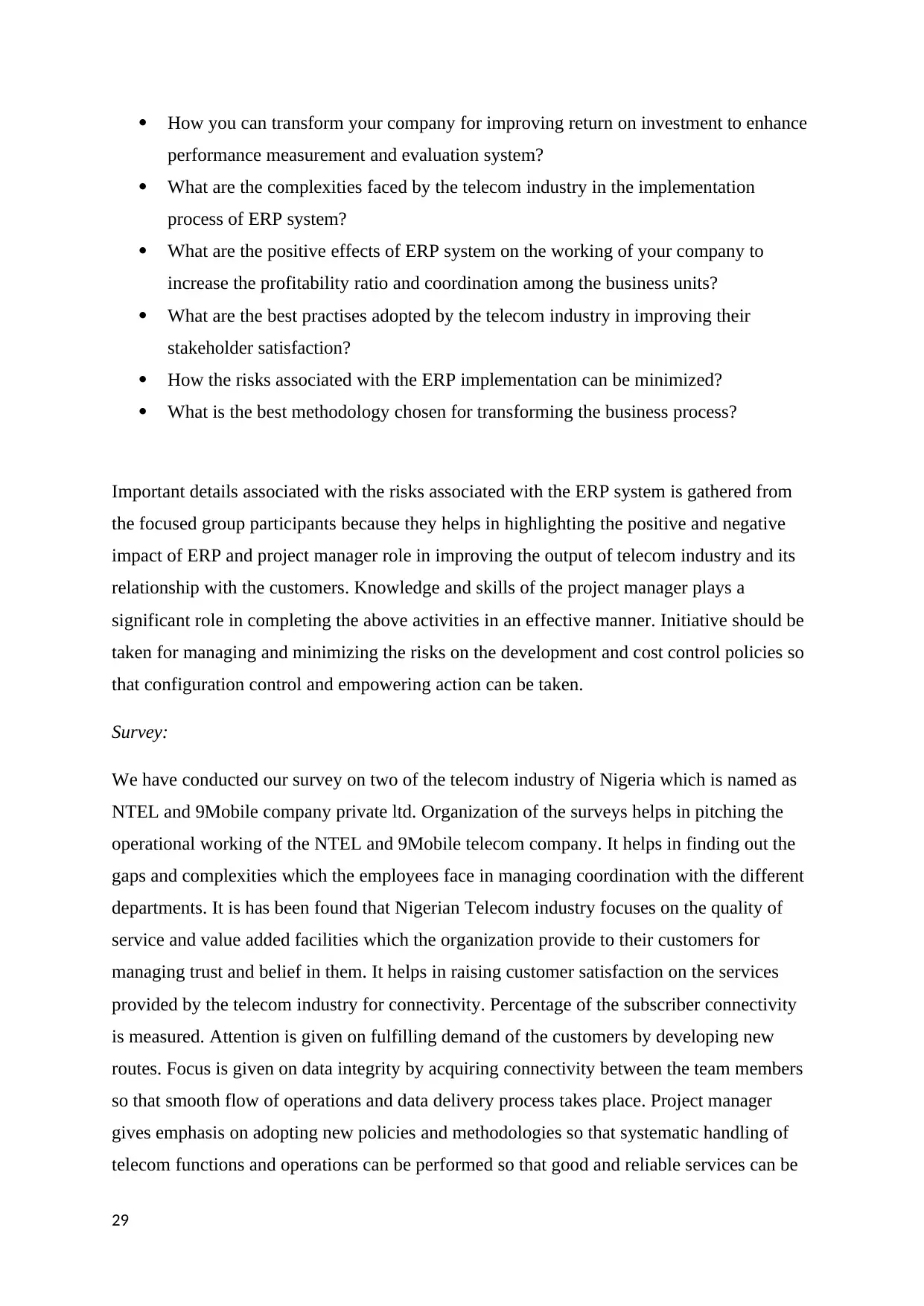
How you can transform your company for improving return on investment to enhance
performance measurement and evaluation system?
What are the complexities faced by the telecom industry in the implementation
process of ERP system?
What are the positive effects of ERP system on the working of your company to
increase the profitability ratio and coordination among the business units?
What are the best practises adopted by the telecom industry in improving their
stakeholder satisfaction?
How the risks associated with the ERP implementation can be minimized?
What is the best methodology chosen for transforming the business process?
Important details associated with the risks associated with the ERP system is gathered from
the focused group participants because they helps in highlighting the positive and negative
impact of ERP and project manager role in improving the output of telecom industry and its
relationship with the customers. Knowledge and skills of the project manager plays a
significant role in completing the above activities in an effective manner. Initiative should be
taken for managing and minimizing the risks on the development and cost control policies so
that configuration control and empowering action can be taken.
Survey:
We have conducted our survey on two of the telecom industry of Nigeria which is named as
NTEL and 9Mobile company private ltd. Organization of the surveys helps in pitching the
operational working of the NTEL and 9Mobile telecom company. It helps in finding out the
gaps and complexities which the employees face in managing coordination with the different
departments. It is has been found that Nigerian Telecom industry focuses on the quality of
service and value added facilities which the organization provide to their customers for
managing trust and belief in them. It helps in raising customer satisfaction on the services
provided by the telecom industry for connectivity. Percentage of the subscriber connectivity
is measured. Attention is given on fulfilling demand of the customers by developing new
routes. Focus is given on data integrity by acquiring connectivity between the team members
so that smooth flow of operations and data delivery process takes place. Project manager
gives emphasis on adopting new policies and methodologies so that systematic handling of
telecom functions and operations can be performed so that good and reliable services can be
29
performance measurement and evaluation system?
What are the complexities faced by the telecom industry in the implementation
process of ERP system?
What are the positive effects of ERP system on the working of your company to
increase the profitability ratio and coordination among the business units?
What are the best practises adopted by the telecom industry in improving their
stakeholder satisfaction?
How the risks associated with the ERP implementation can be minimized?
What is the best methodology chosen for transforming the business process?
Important details associated with the risks associated with the ERP system is gathered from
the focused group participants because they helps in highlighting the positive and negative
impact of ERP and project manager role in improving the output of telecom industry and its
relationship with the customers. Knowledge and skills of the project manager plays a
significant role in completing the above activities in an effective manner. Initiative should be
taken for managing and minimizing the risks on the development and cost control policies so
that configuration control and empowering action can be taken.
Survey:
We have conducted our survey on two of the telecom industry of Nigeria which is named as
NTEL and 9Mobile company private ltd. Organization of the surveys helps in pitching the
operational working of the NTEL and 9Mobile telecom company. It helps in finding out the
gaps and complexities which the employees face in managing coordination with the different
departments. It is has been found that Nigerian Telecom industry focuses on the quality of
service and value added facilities which the organization provide to their customers for
managing trust and belief in them. It helps in raising customer satisfaction on the services
provided by the telecom industry for connectivity. Percentage of the subscriber connectivity
is measured. Attention is given on fulfilling demand of the customers by developing new
routes. Focus is given on data integrity by acquiring connectivity between the team members
so that smooth flow of operations and data delivery process takes place. Project manager
gives emphasis on adopting new policies and methodologies so that systematic handling of
telecom functions and operations can be performed so that good and reliable services can be
29
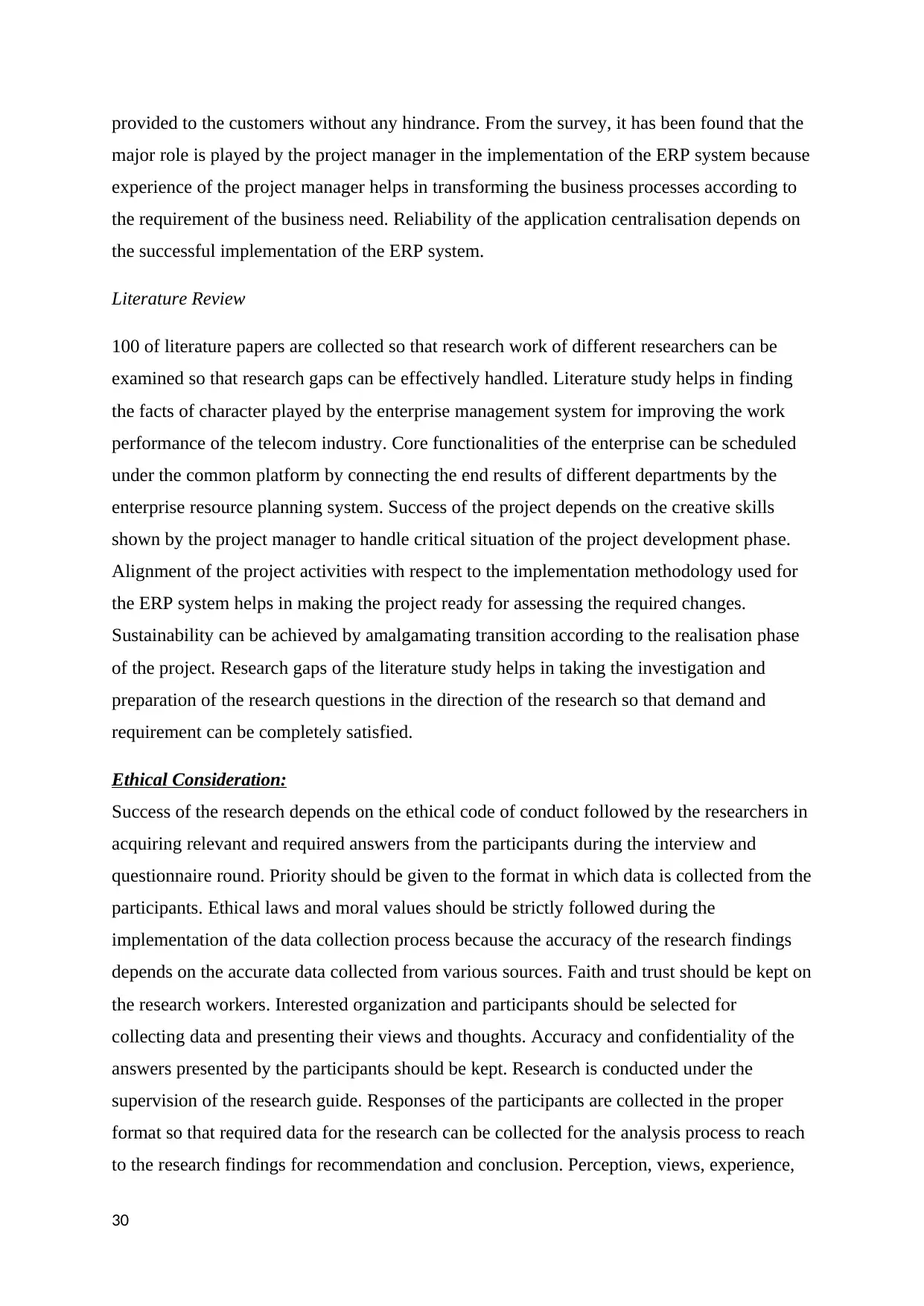
provided to the customers without any hindrance. From the survey, it has been found that the
major role is played by the project manager in the implementation of the ERP system because
experience of the project manager helps in transforming the business processes according to
the requirement of the business need. Reliability of the application centralisation depends on
the successful implementation of the ERP system.
Literature Review
100 of literature papers are collected so that research work of different researchers can be
examined so that research gaps can be effectively handled. Literature study helps in finding
the facts of character played by the enterprise management system for improving the work
performance of the telecom industry. Core functionalities of the enterprise can be scheduled
under the common platform by connecting the end results of different departments by the
enterprise resource planning system. Success of the project depends on the creative skills
shown by the project manager to handle critical situation of the project development phase.
Alignment of the project activities with respect to the implementation methodology used for
the ERP system helps in making the project ready for assessing the required changes.
Sustainability can be achieved by amalgamating transition according to the realisation phase
of the project. Research gaps of the literature study helps in taking the investigation and
preparation of the research questions in the direction of the research so that demand and
requirement can be completely satisfied.
Ethical Consideration:
Success of the research depends on the ethical code of conduct followed by the researchers in
acquiring relevant and required answers from the participants during the interview and
questionnaire round. Priority should be given to the format in which data is collected from the
participants. Ethical laws and moral values should be strictly followed during the
implementation of the data collection process because the accuracy of the research findings
depends on the accurate data collected from various sources. Faith and trust should be kept on
the research workers. Interested organization and participants should be selected for
collecting data and presenting their views and thoughts. Accuracy and confidentiality of the
answers presented by the participants should be kept. Research is conducted under the
supervision of the research guide. Responses of the participants are collected in the proper
format so that required data for the research can be collected for the analysis process to reach
to the research findings for recommendation and conclusion. Perception, views, experience,
30
major role is played by the project manager in the implementation of the ERP system because
experience of the project manager helps in transforming the business processes according to
the requirement of the business need. Reliability of the application centralisation depends on
the successful implementation of the ERP system.
Literature Review
100 of literature papers are collected so that research work of different researchers can be
examined so that research gaps can be effectively handled. Literature study helps in finding
the facts of character played by the enterprise management system for improving the work
performance of the telecom industry. Core functionalities of the enterprise can be scheduled
under the common platform by connecting the end results of different departments by the
enterprise resource planning system. Success of the project depends on the creative skills
shown by the project manager to handle critical situation of the project development phase.
Alignment of the project activities with respect to the implementation methodology used for
the ERP system helps in making the project ready for assessing the required changes.
Sustainability can be achieved by amalgamating transition according to the realisation phase
of the project. Research gaps of the literature study helps in taking the investigation and
preparation of the research questions in the direction of the research so that demand and
requirement can be completely satisfied.
Ethical Consideration:
Success of the research depends on the ethical code of conduct followed by the researchers in
acquiring relevant and required answers from the participants during the interview and
questionnaire round. Priority should be given to the format in which data is collected from the
participants. Ethical laws and moral values should be strictly followed during the
implementation of the data collection process because the accuracy of the research findings
depends on the accurate data collected from various sources. Faith and trust should be kept on
the research workers. Interested organization and participants should be selected for
collecting data and presenting their views and thoughts. Accuracy and confidentiality of the
answers presented by the participants should be kept. Research is conducted under the
supervision of the research guide. Responses of the participants are collected in the proper
format so that required data for the research can be collected for the analysis process to reach
to the research findings for recommendation and conclusion. Perception, views, experience,
30
Paraphrase This Document
Need a fresh take? Get an instant paraphrase of this document with our AI Paraphraser
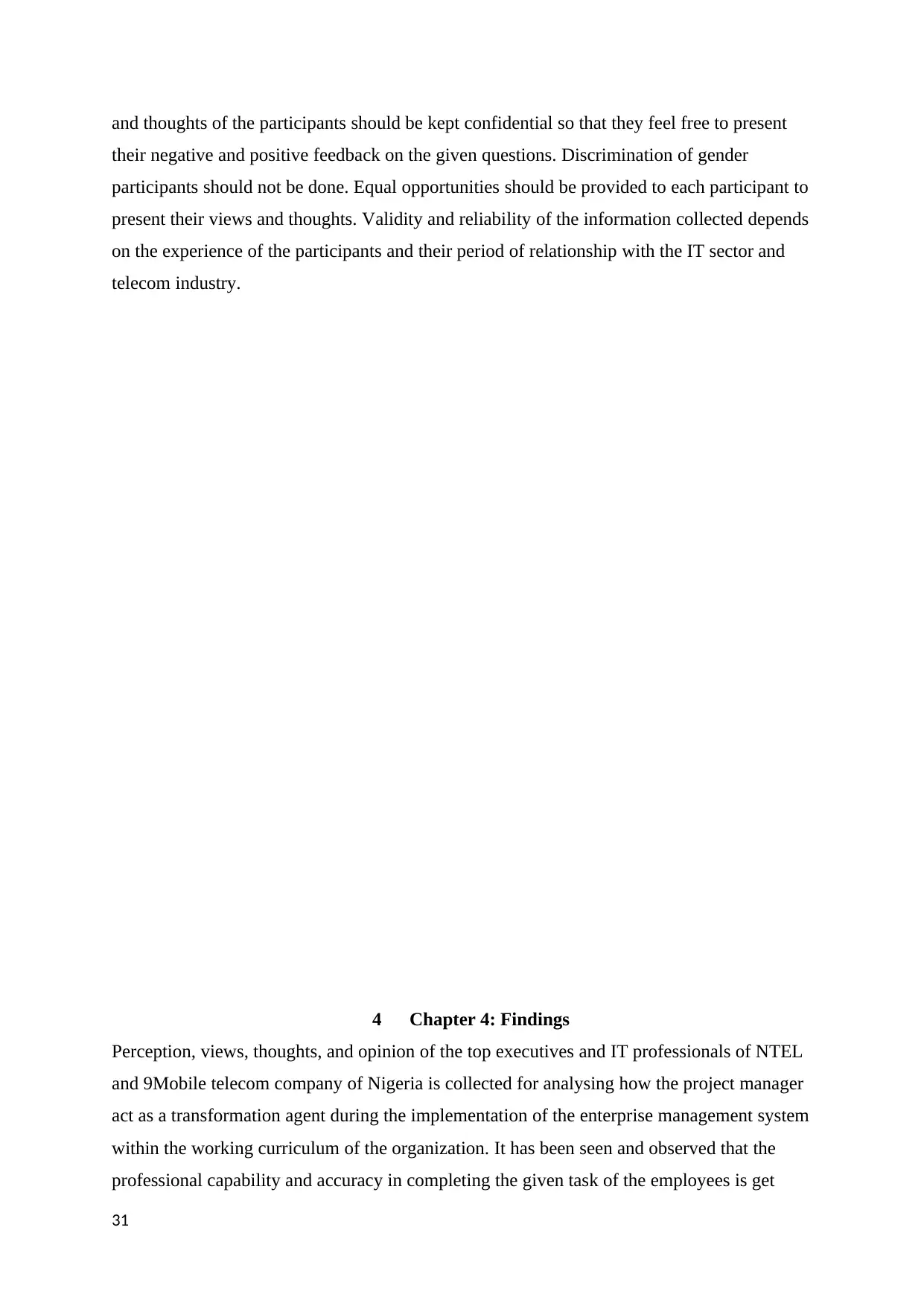
and thoughts of the participants should be kept confidential so that they feel free to present
their negative and positive feedback on the given questions. Discrimination of gender
participants should not be done. Equal opportunities should be provided to each participant to
present their views and thoughts. Validity and reliability of the information collected depends
on the experience of the participants and their period of relationship with the IT sector and
telecom industry.
4 Chapter 4: Findings
Perception, views, thoughts, and opinion of the top executives and IT professionals of NTEL
and 9Mobile telecom company of Nigeria is collected for analysing how the project manager
act as a transformation agent during the implementation of the enterprise management system
within the working curriculum of the organization. It has been seen and observed that the
professional capability and accuracy in completing the given task of the employees is get
31
their negative and positive feedback on the given questions. Discrimination of gender
participants should not be done. Equal opportunities should be provided to each participant to
present their views and thoughts. Validity and reliability of the information collected depends
on the experience of the participants and their period of relationship with the IT sector and
telecom industry.
4 Chapter 4: Findings
Perception, views, thoughts, and opinion of the top executives and IT professionals of NTEL
and 9Mobile telecom company of Nigeria is collected for analysing how the project manager
act as a transformation agent during the implementation of the enterprise management system
within the working curriculum of the organization. It has been seen and observed that the
professional capability and accuracy in completing the given task of the employees is get
31
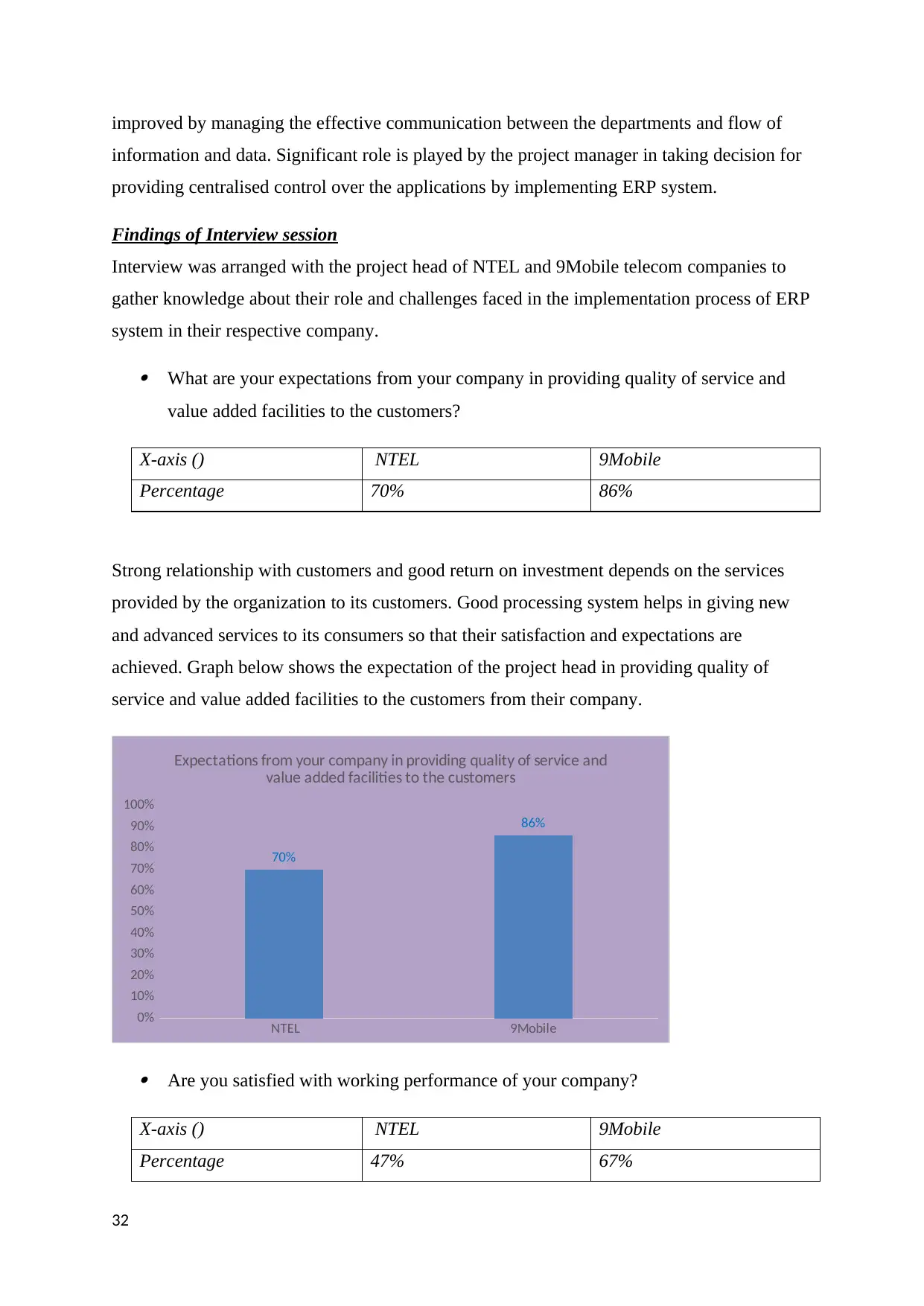
improved by managing the effective communication between the departments and flow of
information and data. Significant role is played by the project manager in taking decision for
providing centralised control over the applications by implementing ERP system.
Findings of Interview session
Interview was arranged with the project head of NTEL and 9Mobile telecom companies to
gather knowledge about their role and challenges faced in the implementation process of ERP
system in their respective company.
What are your expectations from your company in providing quality of service and
value added facilities to the customers?
X-axis () NTEL 9Mobile
Percentage 70% 86%
Strong relationship with customers and good return on investment depends on the services
provided by the organization to its customers. Good processing system helps in giving new
and advanced services to its consumers so that their satisfaction and expectations are
achieved. Graph below shows the expectation of the project head in providing quality of
service and value added facilities to the customers from their company.
NTEL 9Mobile
0%
10%
20%
30%
40%
50%
60%
70%
80%
90%
100%
70%
86%
Expectations from your company in providing quality of service and
value added facilities to the customers
Are you satisfied with working performance of your company?
X-axis () NTEL 9Mobile
Percentage 47% 67%
32
information and data. Significant role is played by the project manager in taking decision for
providing centralised control over the applications by implementing ERP system.
Findings of Interview session
Interview was arranged with the project head of NTEL and 9Mobile telecom companies to
gather knowledge about their role and challenges faced in the implementation process of ERP
system in their respective company.
What are your expectations from your company in providing quality of service and
value added facilities to the customers?
X-axis () NTEL 9Mobile
Percentage 70% 86%
Strong relationship with customers and good return on investment depends on the services
provided by the organization to its customers. Good processing system helps in giving new
and advanced services to its consumers so that their satisfaction and expectations are
achieved. Graph below shows the expectation of the project head in providing quality of
service and value added facilities to the customers from their company.
NTEL 9Mobile
0%
10%
20%
30%
40%
50%
60%
70%
80%
90%
100%
70%
86%
Expectations from your company in providing quality of service and
value added facilities to the customers
Are you satisfied with working performance of your company?
X-axis () NTEL 9Mobile
Percentage 47% 67%
32
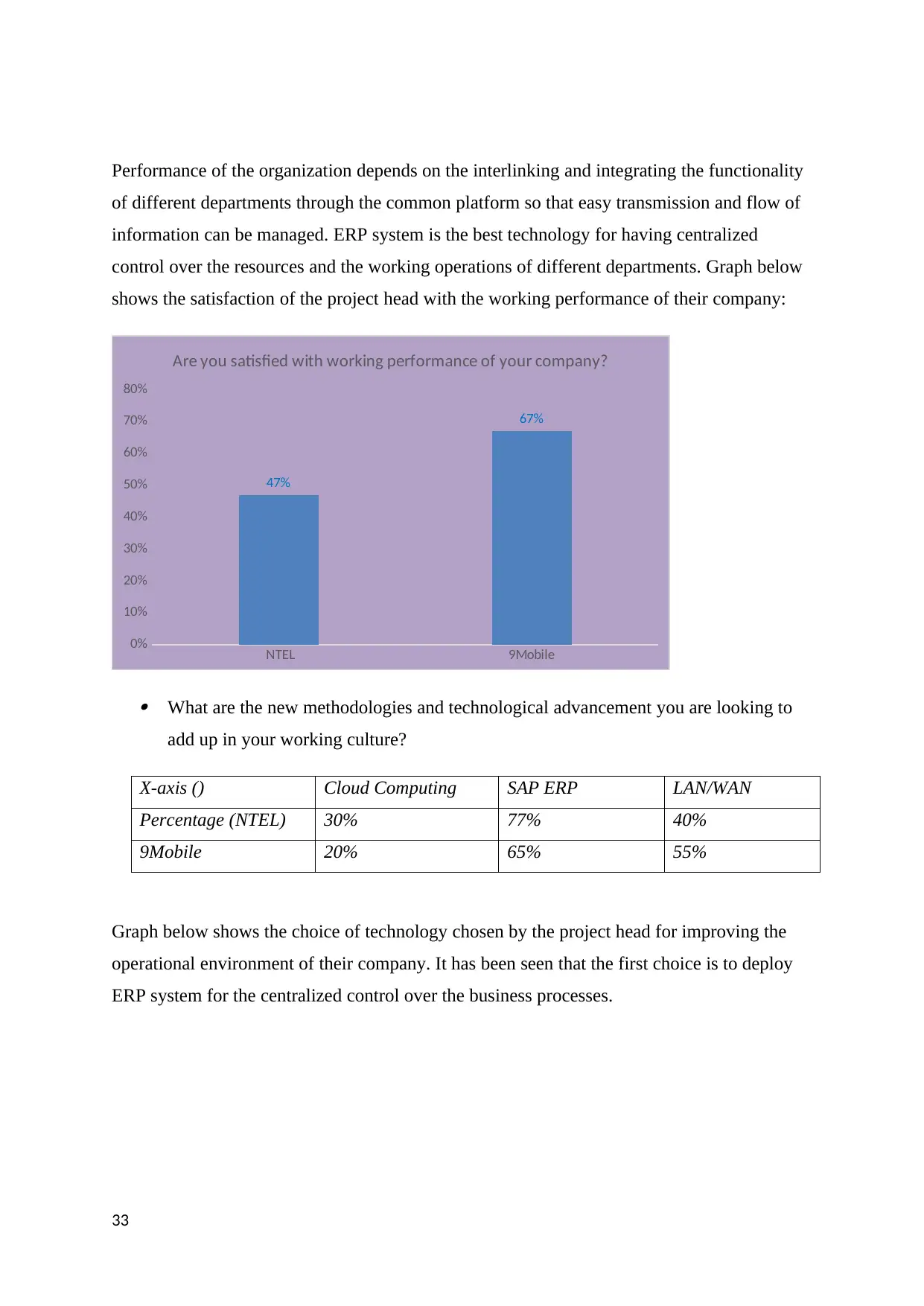
Performance of the organization depends on the interlinking and integrating the functionality
of different departments through the common platform so that easy transmission and flow of
information can be managed. ERP system is the best technology for having centralized
control over the resources and the working operations of different departments. Graph below
shows the satisfaction of the project head with the working performance of their company:
NTEL 9Mobile
0%
10%
20%
30%
40%
50%
60%
70%
80%
47%
67%
Are you satisfied with working performance of your company?
What are the new methodologies and technological advancement you are looking to
add up in your working culture?
X-axis () Cloud Computing SAP ERP LAN/WAN
Percentage (NTEL) 30% 77% 40%
9Mobile 20% 65% 55%
Graph below shows the choice of technology chosen by the project head for improving the
operational environment of their company. It has been seen that the first choice is to deploy
ERP system for the centralized control over the business processes.
33
of different departments through the common platform so that easy transmission and flow of
information can be managed. ERP system is the best technology for having centralized
control over the resources and the working operations of different departments. Graph below
shows the satisfaction of the project head with the working performance of their company:
NTEL 9Mobile
0%
10%
20%
30%
40%
50%
60%
70%
80%
47%
67%
Are you satisfied with working performance of your company?
What are the new methodologies and technological advancement you are looking to
add up in your working culture?
X-axis () Cloud Computing SAP ERP LAN/WAN
Percentage (NTEL) 30% 77% 40%
9Mobile 20% 65% 55%
Graph below shows the choice of technology chosen by the project head for improving the
operational environment of their company. It has been seen that the first choice is to deploy
ERP system for the centralized control over the business processes.
33
Secure Best Marks with AI Grader
Need help grading? Try our AI Grader for instant feedback on your assignments.
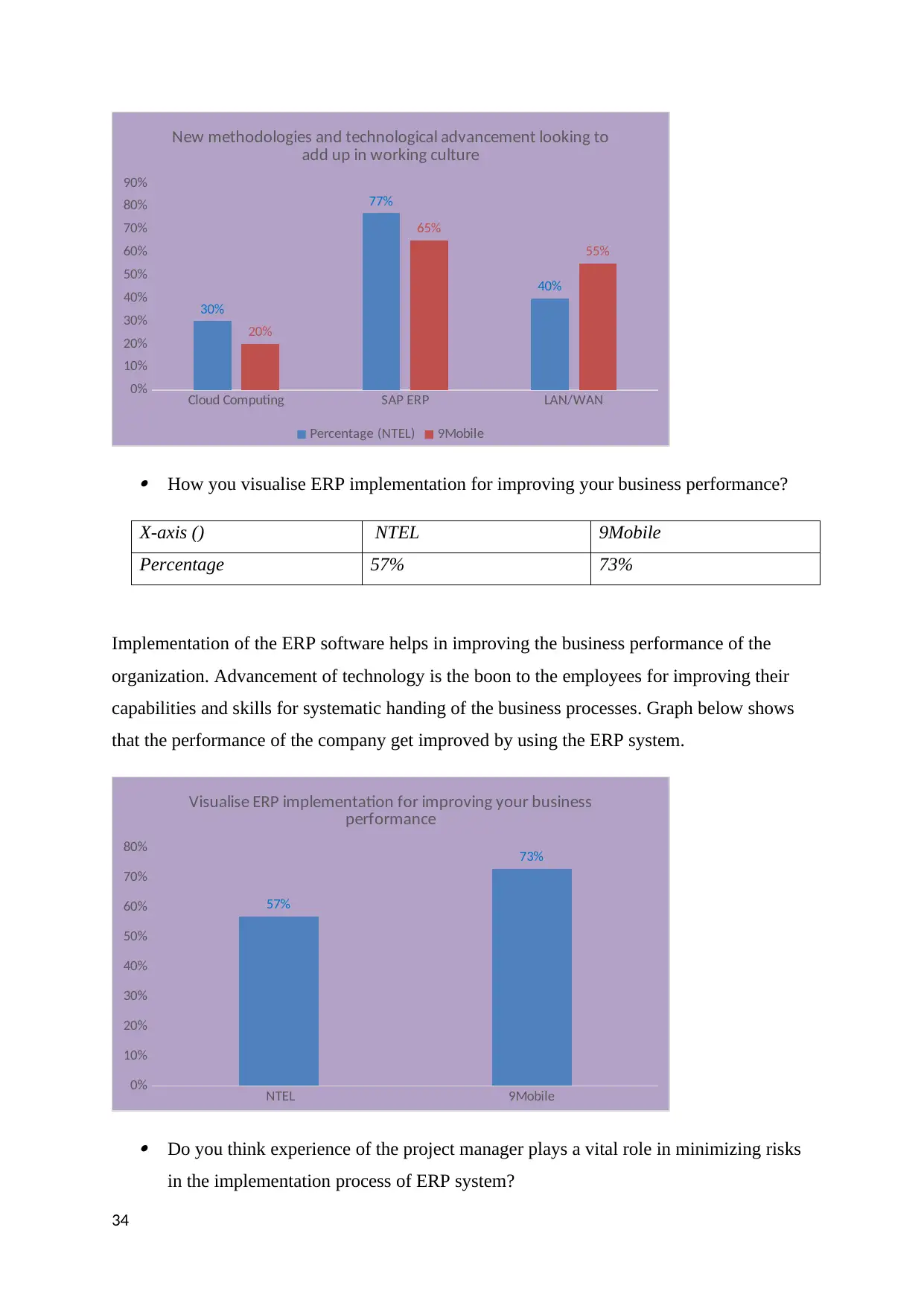
Cloud Computing SAP ERP LAN/WAN
0%
10%
20%
30%
40%
50%
60%
70%
80%
90%
30%
77%
40%
20%
65%
55%
New methodologies and technological advancement looking to
add up in working culture
Percentage (NTEL) 9Mobile
How you visualise ERP implementation for improving your business performance?
X-axis () NTEL 9Mobile
Percentage 57% 73%
Implementation of the ERP software helps in improving the business performance of the
organization. Advancement of technology is the boon to the employees for improving their
capabilities and skills for systematic handing of the business processes. Graph below shows
that the performance of the company get improved by using the ERP system.
NTEL 9Mobile
0%
10%
20%
30%
40%
50%
60%
70%
80%
57%
73%
Visualise ERP implementation for improving your business
performance
Do you think experience of the project manager plays a vital role in minimizing risks
in the implementation process of ERP system?
34
0%
10%
20%
30%
40%
50%
60%
70%
80%
90%
30%
77%
40%
20%
65%
55%
New methodologies and technological advancement looking to
add up in working culture
Percentage (NTEL) 9Mobile
How you visualise ERP implementation for improving your business performance?
X-axis () NTEL 9Mobile
Percentage 57% 73%
Implementation of the ERP software helps in improving the business performance of the
organization. Advancement of technology is the boon to the employees for improving their
capabilities and skills for systematic handing of the business processes. Graph below shows
that the performance of the company get improved by using the ERP system.
NTEL 9Mobile
0%
10%
20%
30%
40%
50%
60%
70%
80%
57%
73%
Visualise ERP implementation for improving your business
performance
Do you think experience of the project manager plays a vital role in minimizing risks
in the implementation process of ERP system?
34
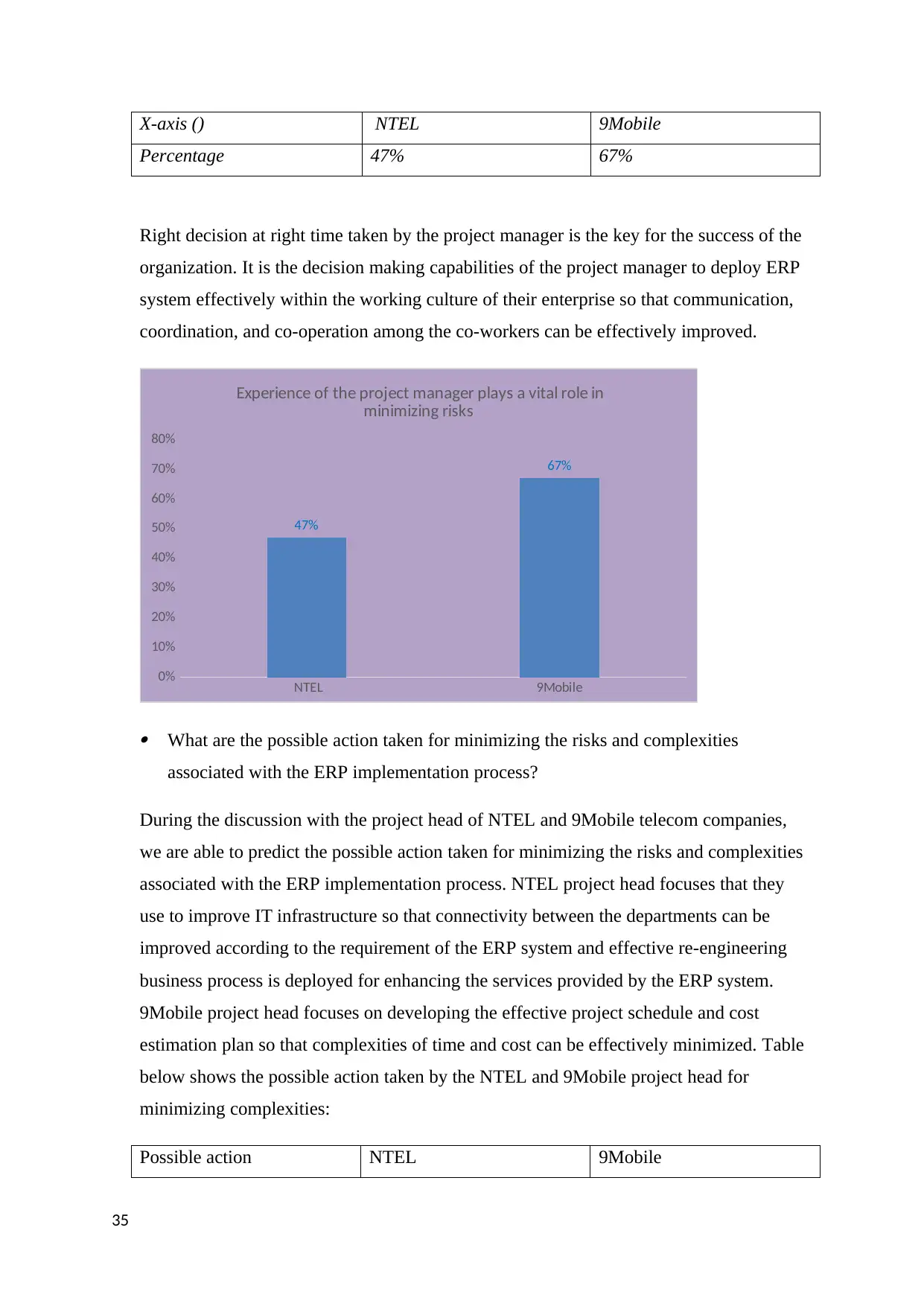
X-axis () NTEL 9Mobile
Percentage 47% 67%
Right decision at right time taken by the project manager is the key for the success of the
organization. It is the decision making capabilities of the project manager to deploy ERP
system effectively within the working culture of their enterprise so that communication,
coordination, and co-operation among the co-workers can be effectively improved.
NTEL 9Mobile
0%
10%
20%
30%
40%
50%
60%
70%
80%
47%
67%
Experience of the project manager plays a vital role in
minimizing risks
What are the possible action taken for minimizing the risks and complexities
associated with the ERP implementation process?
During the discussion with the project head of NTEL and 9Mobile telecom companies,
we are able to predict the possible action taken for minimizing the risks and complexities
associated with the ERP implementation process. NTEL project head focuses that they
use to improve IT infrastructure so that connectivity between the departments can be
improved according to the requirement of the ERP system and effective re-engineering
business process is deployed for enhancing the services provided by the ERP system.
9Mobile project head focuses on developing the effective project schedule and cost
estimation plan so that complexities of time and cost can be effectively minimized. Table
below shows the possible action taken by the NTEL and 9Mobile project head for
minimizing complexities:
Possible action NTEL 9Mobile
35
Percentage 47% 67%
Right decision at right time taken by the project manager is the key for the success of the
organization. It is the decision making capabilities of the project manager to deploy ERP
system effectively within the working culture of their enterprise so that communication,
coordination, and co-operation among the co-workers can be effectively improved.
NTEL 9Mobile
0%
10%
20%
30%
40%
50%
60%
70%
80%
47%
67%
Experience of the project manager plays a vital role in
minimizing risks
What are the possible action taken for minimizing the risks and complexities
associated with the ERP implementation process?
During the discussion with the project head of NTEL and 9Mobile telecom companies,
we are able to predict the possible action taken for minimizing the risks and complexities
associated with the ERP implementation process. NTEL project head focuses that they
use to improve IT infrastructure so that connectivity between the departments can be
improved according to the requirement of the ERP system and effective re-engineering
business process is deployed for enhancing the services provided by the ERP system.
9Mobile project head focuses on developing the effective project schedule and cost
estimation plan so that complexities of time and cost can be effectively minimized. Table
below shows the possible action taken by the NTEL and 9Mobile project head for
minimizing complexities:
Possible action NTEL 9Mobile
35
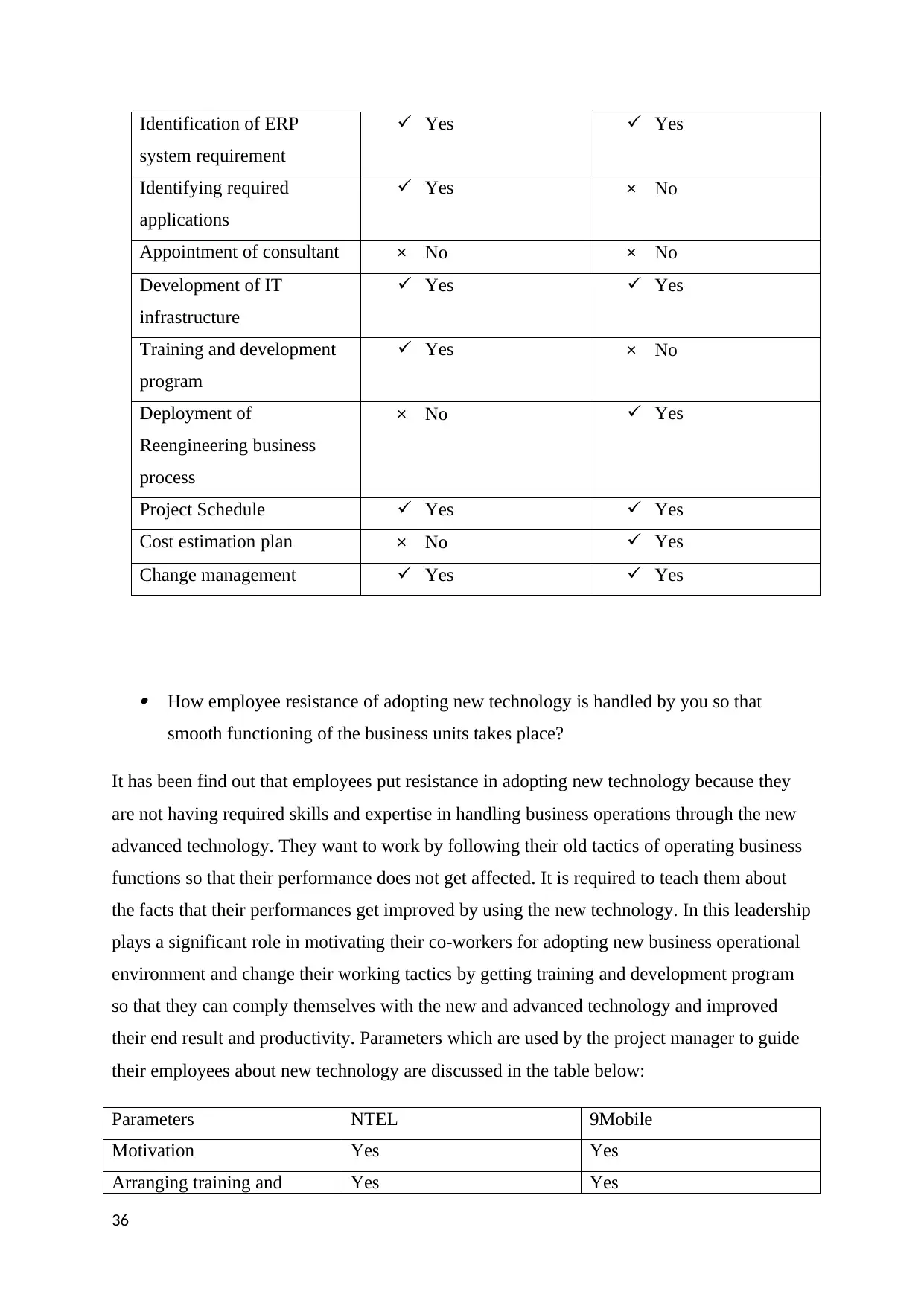
Identification of ERP
system requirement
Yes Yes
Identifying required
applications
Yes × No
Appointment of consultant × No × No
Development of IT
infrastructure
Yes Yes
Training and development
program
Yes × No
Deployment of
Reengineering business
process
× No Yes
Project Schedule Yes Yes
Cost estimation plan × No Yes
Change management Yes Yes
How employee resistance of adopting new technology is handled by you so that
smooth functioning of the business units takes place?
It has been find out that employees put resistance in adopting new technology because they
are not having required skills and expertise in handling business operations through the new
advanced technology. They want to work by following their old tactics of operating business
functions so that their performance does not get affected. It is required to teach them about
the facts that their performances get improved by using the new technology. In this leadership
plays a significant role in motivating their co-workers for adopting new business operational
environment and change their working tactics by getting training and development program
so that they can comply themselves with the new and advanced technology and improved
their end result and productivity. Parameters which are used by the project manager to guide
their employees about new technology are discussed in the table below:
Parameters NTEL 9Mobile
Motivation Yes Yes
Arranging training and Yes Yes
36
system requirement
Yes Yes
Identifying required
applications
Yes × No
Appointment of consultant × No × No
Development of IT
infrastructure
Yes Yes
Training and development
program
Yes × No
Deployment of
Reengineering business
process
× No Yes
Project Schedule Yes Yes
Cost estimation plan × No Yes
Change management Yes Yes
How employee resistance of adopting new technology is handled by you so that
smooth functioning of the business units takes place?
It has been find out that employees put resistance in adopting new technology because they
are not having required skills and expertise in handling business operations through the new
advanced technology. They want to work by following their old tactics of operating business
functions so that their performance does not get affected. It is required to teach them about
the facts that their performances get improved by using the new technology. In this leadership
plays a significant role in motivating their co-workers for adopting new business operational
environment and change their working tactics by getting training and development program
so that they can comply themselves with the new and advanced technology and improved
their end result and productivity. Parameters which are used by the project manager to guide
their employees about new technology are discussed in the table below:
Parameters NTEL 9Mobile
Motivation Yes Yes
Arranging training and Yes Yes
36
Paraphrase This Document
Need a fresh take? Get an instant paraphrase of this document with our AI Paraphraser
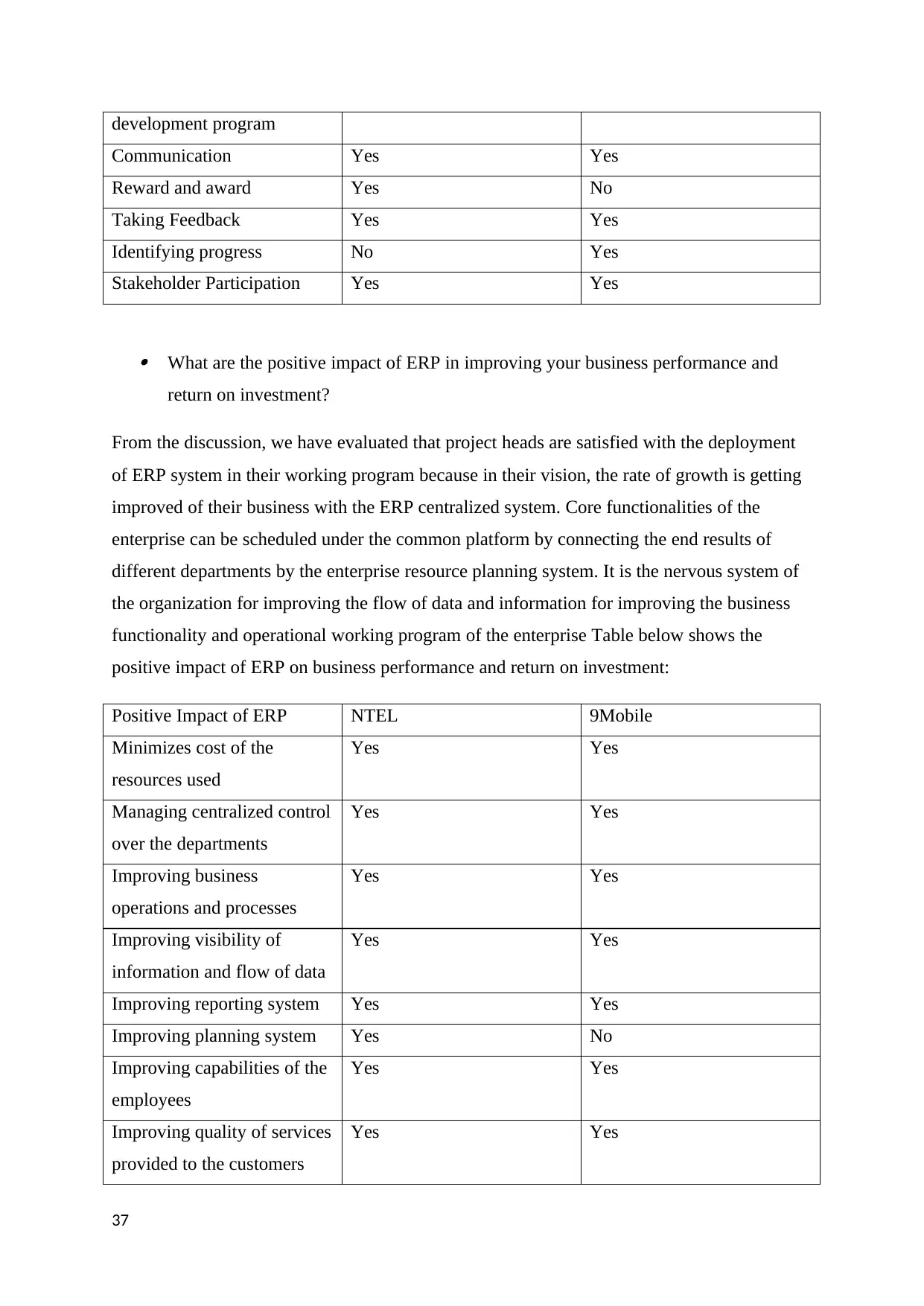
development program
Communication Yes Yes
Reward and award Yes No
Taking Feedback Yes Yes
Identifying progress No Yes
Stakeholder Participation Yes Yes
What are the positive impact of ERP in improving your business performance and
return on investment?
From the discussion, we have evaluated that project heads are satisfied with the deployment
of ERP system in their working program because in their vision, the rate of growth is getting
improved of their business with the ERP centralized system. Core functionalities of the
enterprise can be scheduled under the common platform by connecting the end results of
different departments by the enterprise resource planning system. It is the nervous system of
the organization for improving the flow of data and information for improving the business
functionality and operational working program of the enterprise Table below shows the
positive impact of ERP on business performance and return on investment:
Positive Impact of ERP NTEL 9Mobile
Minimizes cost of the
resources used
Yes Yes
Managing centralized control
over the departments
Yes Yes
Improving business
operations and processes
Yes Yes
Improving visibility of
information and flow of data
Yes Yes
Improving reporting system Yes Yes
Improving planning system Yes No
Improving capabilities of the
employees
Yes Yes
Improving quality of services
provided to the customers
Yes Yes
37
Communication Yes Yes
Reward and award Yes No
Taking Feedback Yes Yes
Identifying progress No Yes
Stakeholder Participation Yes Yes
What are the positive impact of ERP in improving your business performance and
return on investment?
From the discussion, we have evaluated that project heads are satisfied with the deployment
of ERP system in their working program because in their vision, the rate of growth is getting
improved of their business with the ERP centralized system. Core functionalities of the
enterprise can be scheduled under the common platform by connecting the end results of
different departments by the enterprise resource planning system. It is the nervous system of
the organization for improving the flow of data and information for improving the business
functionality and operational working program of the enterprise Table below shows the
positive impact of ERP on business performance and return on investment:
Positive Impact of ERP NTEL 9Mobile
Minimizes cost of the
resources used
Yes Yes
Managing centralized control
over the departments
Yes Yes
Improving business
operations and processes
Yes Yes
Improving visibility of
information and flow of data
Yes Yes
Improving reporting system Yes Yes
Improving planning system Yes No
Improving capabilities of the
employees
Yes Yes
Improving quality of services
provided to the customers
Yes Yes
37
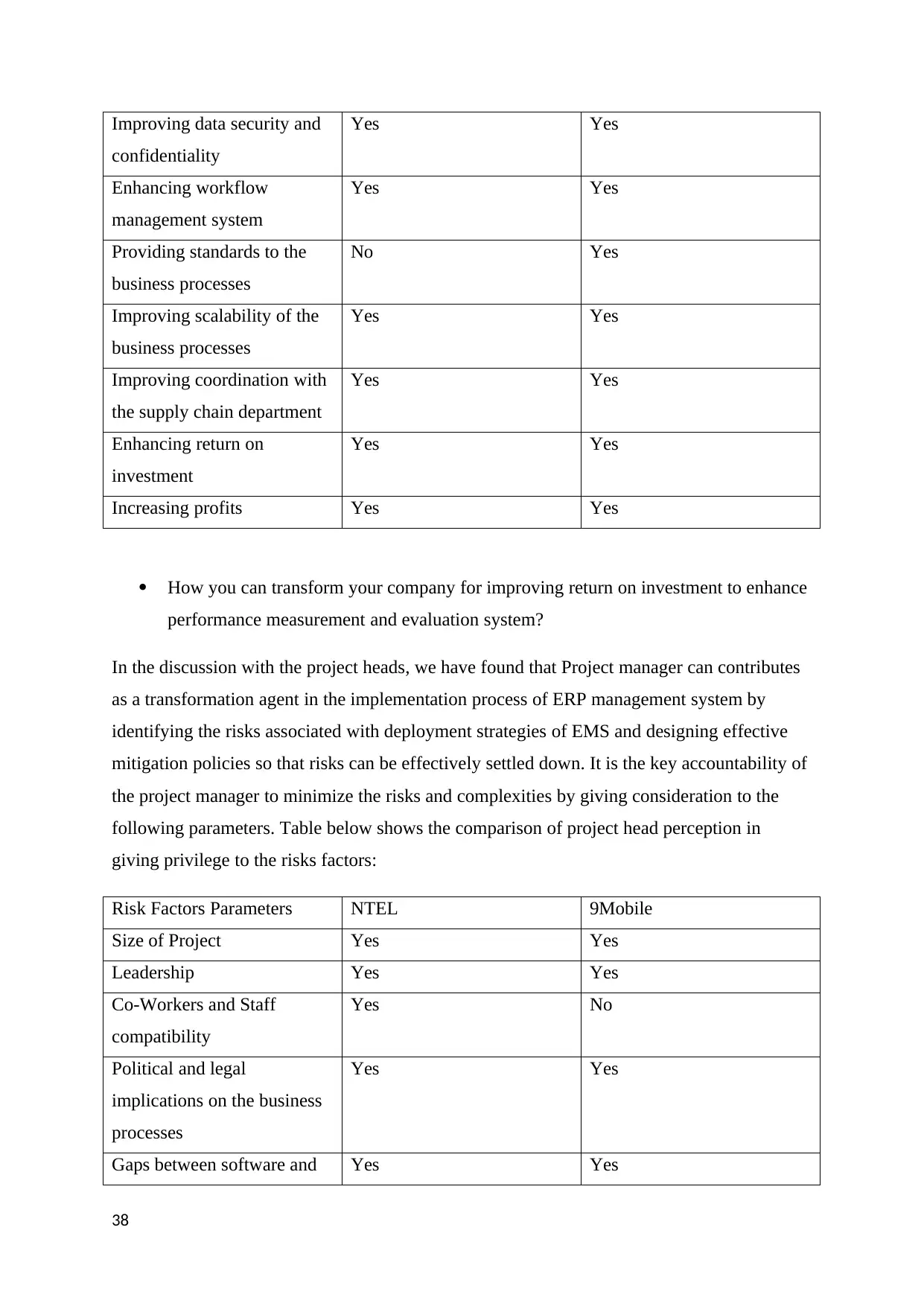
Improving data security and
confidentiality
Yes Yes
Enhancing workflow
management system
Yes Yes
Providing standards to the
business processes
No Yes
Improving scalability of the
business processes
Yes Yes
Improving coordination with
the supply chain department
Yes Yes
Enhancing return on
investment
Yes Yes
Increasing profits Yes Yes
How you can transform your company for improving return on investment to enhance
performance measurement and evaluation system?
In the discussion with the project heads, we have found that Project manager can contributes
as a transformation agent in the implementation process of ERP management system by
identifying the risks associated with deployment strategies of EMS and designing effective
mitigation policies so that risks can be effectively settled down. It is the key accountability of
the project manager to minimize the risks and complexities by giving consideration to the
following parameters. Table below shows the comparison of project head perception in
giving privilege to the risks factors:
Risk Factors Parameters NTEL 9Mobile
Size of Project Yes Yes
Leadership Yes Yes
Co-Workers and Staff
compatibility
Yes No
Political and legal
implications on the business
processes
Yes Yes
Gaps between software and Yes Yes
38
confidentiality
Yes Yes
Enhancing workflow
management system
Yes Yes
Providing standards to the
business processes
No Yes
Improving scalability of the
business processes
Yes Yes
Improving coordination with
the supply chain department
Yes Yes
Enhancing return on
investment
Yes Yes
Increasing profits Yes Yes
How you can transform your company for improving return on investment to enhance
performance measurement and evaluation system?
In the discussion with the project heads, we have found that Project manager can contributes
as a transformation agent in the implementation process of ERP management system by
identifying the risks associated with deployment strategies of EMS and designing effective
mitigation policies so that risks can be effectively settled down. It is the key accountability of
the project manager to minimize the risks and complexities by giving consideration to the
following parameters. Table below shows the comparison of project head perception in
giving privilege to the risks factors:
Risk Factors Parameters NTEL 9Mobile
Size of Project Yes Yes
Leadership Yes Yes
Co-Workers and Staff
compatibility
Yes No
Political and legal
implications on the business
processes
Yes Yes
Gaps between software and Yes Yes
38
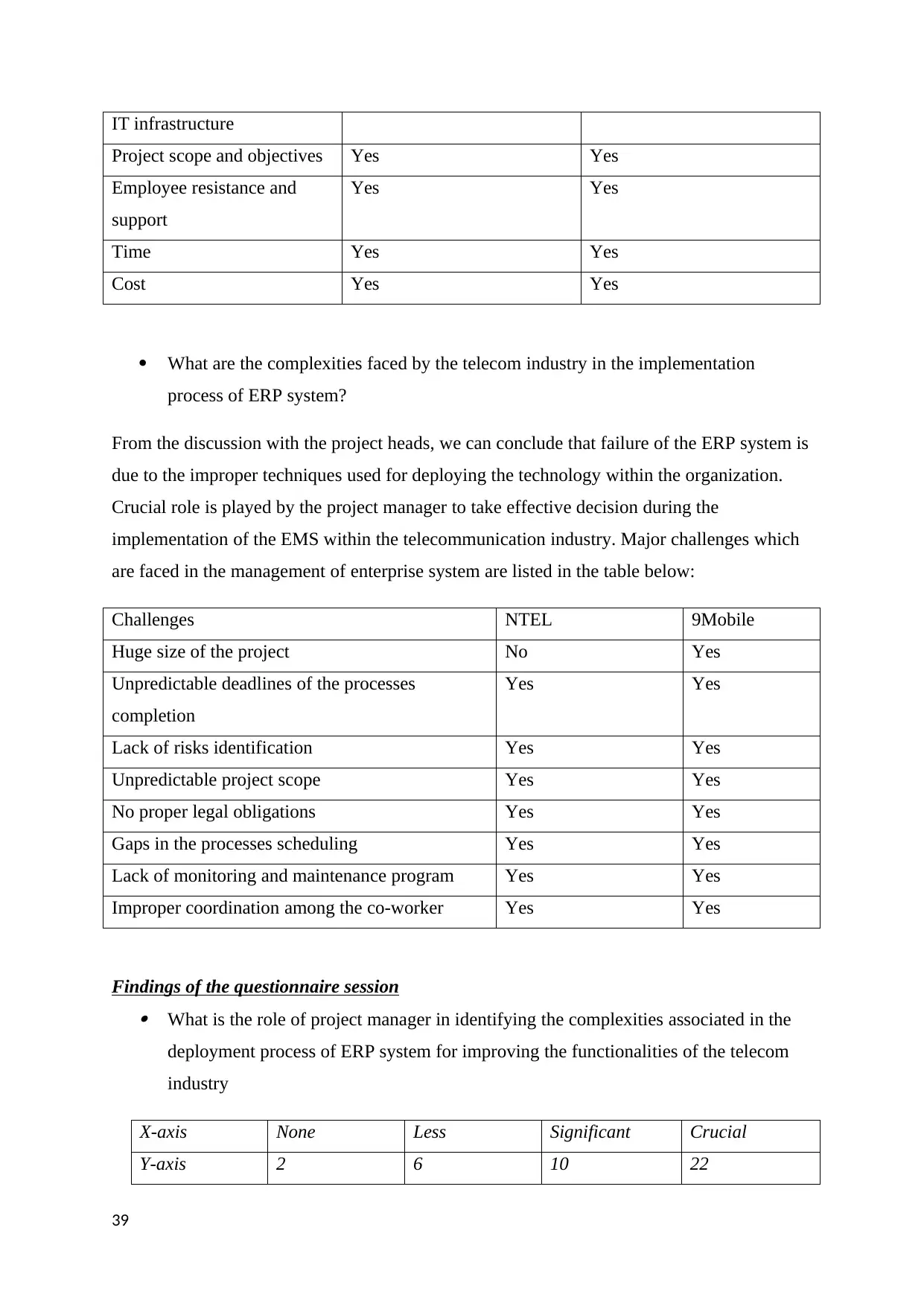
IT infrastructure
Project scope and objectives Yes Yes
Employee resistance and
support
Yes Yes
Time Yes Yes
Cost Yes Yes
What are the complexities faced by the telecom industry in the implementation
process of ERP system?
From the discussion with the project heads, we can conclude that failure of the ERP system is
due to the improper techniques used for deploying the technology within the organization.
Crucial role is played by the project manager to take effective decision during the
implementation of the EMS within the telecommunication industry. Major challenges which
are faced in the management of enterprise system are listed in the table below:
Challenges NTEL 9Mobile
Huge size of the project No Yes
Unpredictable deadlines of the processes
completion
Yes Yes
Lack of risks identification Yes Yes
Unpredictable project scope Yes Yes
No proper legal obligations Yes Yes
Gaps in the processes scheduling Yes Yes
Lack of monitoring and maintenance program Yes Yes
Improper coordination among the co-worker Yes Yes
Findings of the questionnaire session What is the role of project manager in identifying the complexities associated in the
deployment process of ERP system for improving the functionalities of the telecom
industry
X-axis None Less Significant Crucial
Y-axis 2 6 10 22
39
Project scope and objectives Yes Yes
Employee resistance and
support
Yes Yes
Time Yes Yes
Cost Yes Yes
What are the complexities faced by the telecom industry in the implementation
process of ERP system?
From the discussion with the project heads, we can conclude that failure of the ERP system is
due to the improper techniques used for deploying the technology within the organization.
Crucial role is played by the project manager to take effective decision during the
implementation of the EMS within the telecommunication industry. Major challenges which
are faced in the management of enterprise system are listed in the table below:
Challenges NTEL 9Mobile
Huge size of the project No Yes
Unpredictable deadlines of the processes
completion
Yes Yes
Lack of risks identification Yes Yes
Unpredictable project scope Yes Yes
No proper legal obligations Yes Yes
Gaps in the processes scheduling Yes Yes
Lack of monitoring and maintenance program Yes Yes
Improper coordination among the co-worker Yes Yes
Findings of the questionnaire session What is the role of project manager in identifying the complexities associated in the
deployment process of ERP system for improving the functionalities of the telecom
industry
X-axis None Less Significant Crucial
Y-axis 2 6 10 22
39
Secure Best Marks with AI Grader
Need help grading? Try our AI Grader for instant feedback on your assignments.
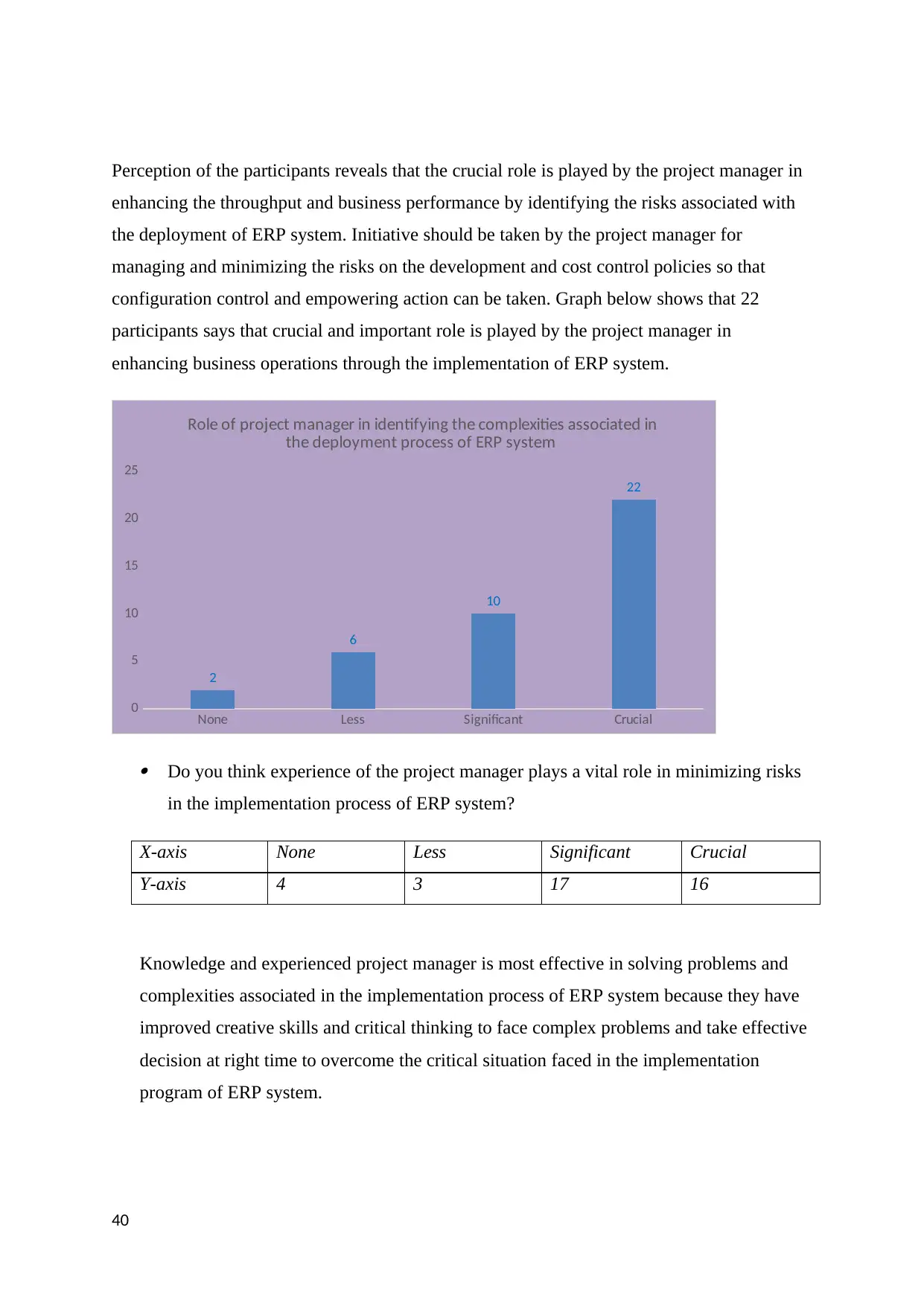
Perception of the participants reveals that the crucial role is played by the project manager in
enhancing the throughput and business performance by identifying the risks associated with
the deployment of ERP system. Initiative should be taken by the project manager for
managing and minimizing the risks on the development and cost control policies so that
configuration control and empowering action can be taken. Graph below shows that 22
participants says that crucial and important role is played by the project manager in
enhancing business operations through the implementation of ERP system.
None Less Significant Crucial
0
5
10
15
20
25
2
6
10
22
Role of project manager in identifying the complexities associated in
the deployment process of ERP system
Do you think experience of the project manager plays a vital role in minimizing risks
in the implementation process of ERP system?
X-axis None Less Significant Crucial
Y-axis 4 3 17 16
Knowledge and experienced project manager is most effective in solving problems and
complexities associated in the implementation process of ERP system because they have
improved creative skills and critical thinking to face complex problems and take effective
decision at right time to overcome the critical situation faced in the implementation
program of ERP system.
40
enhancing the throughput and business performance by identifying the risks associated with
the deployment of ERP system. Initiative should be taken by the project manager for
managing and minimizing the risks on the development and cost control policies so that
configuration control and empowering action can be taken. Graph below shows that 22
participants says that crucial and important role is played by the project manager in
enhancing business operations through the implementation of ERP system.
None Less Significant Crucial
0
5
10
15
20
25
2
6
10
22
Role of project manager in identifying the complexities associated in
the deployment process of ERP system
Do you think experience of the project manager plays a vital role in minimizing risks
in the implementation process of ERP system?
X-axis None Less Significant Crucial
Y-axis 4 3 17 16
Knowledge and experienced project manager is most effective in solving problems and
complexities associated in the implementation process of ERP system because they have
improved creative skills and critical thinking to face complex problems and take effective
decision at right time to overcome the critical situation faced in the implementation
program of ERP system.
40
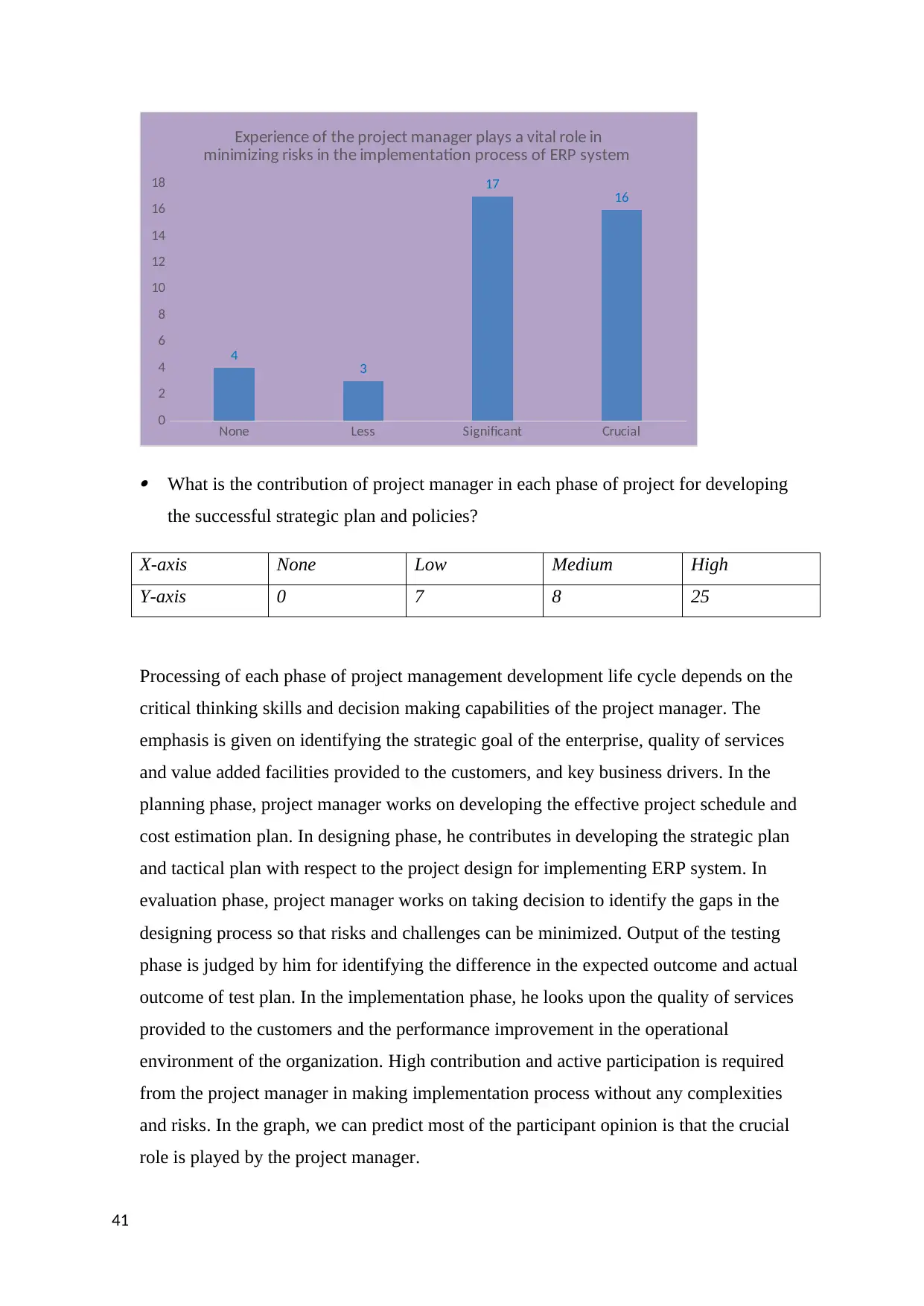
None Less Significant Crucial
0
2
4
6
8
10
12
14
16
18
4 3
17 16
Experience of the project manager plays a vital role in
minimizing risks in the implementation process of ERP system
What is the contribution of project manager in each phase of project for developing
the successful strategic plan and policies?
X-axis None Low Medium High
Y-axis 0 7 8 25
Processing of each phase of project management development life cycle depends on the
critical thinking skills and decision making capabilities of the project manager. The
emphasis is given on identifying the strategic goal of the enterprise, quality of services
and value added facilities provided to the customers, and key business drivers. In the
planning phase, project manager works on developing the effective project schedule and
cost estimation plan. In designing phase, he contributes in developing the strategic plan
and tactical plan with respect to the project design for implementing ERP system. In
evaluation phase, project manager works on taking decision to identify the gaps in the
designing process so that risks and challenges can be minimized. Output of the testing
phase is judged by him for identifying the difference in the expected outcome and actual
outcome of test plan. In the implementation phase, he looks upon the quality of services
provided to the customers and the performance improvement in the operational
environment of the organization. High contribution and active participation is required
from the project manager in making implementation process without any complexities
and risks. In the graph, we can predict most of the participant opinion is that the crucial
role is played by the project manager.
41
0
2
4
6
8
10
12
14
16
18
4 3
17 16
Experience of the project manager plays a vital role in
minimizing risks in the implementation process of ERP system
What is the contribution of project manager in each phase of project for developing
the successful strategic plan and policies?
X-axis None Low Medium High
Y-axis 0 7 8 25
Processing of each phase of project management development life cycle depends on the
critical thinking skills and decision making capabilities of the project manager. The
emphasis is given on identifying the strategic goal of the enterprise, quality of services
and value added facilities provided to the customers, and key business drivers. In the
planning phase, project manager works on developing the effective project schedule and
cost estimation plan. In designing phase, he contributes in developing the strategic plan
and tactical plan with respect to the project design for implementing ERP system. In
evaluation phase, project manager works on taking decision to identify the gaps in the
designing process so that risks and challenges can be minimized. Output of the testing
phase is judged by him for identifying the difference in the expected outcome and actual
outcome of test plan. In the implementation phase, he looks upon the quality of services
provided to the customers and the performance improvement in the operational
environment of the organization. High contribution and active participation is required
from the project manager in making implementation process without any complexities
and risks. In the graph, we can predict most of the participant opinion is that the crucial
role is played by the project manager.
41
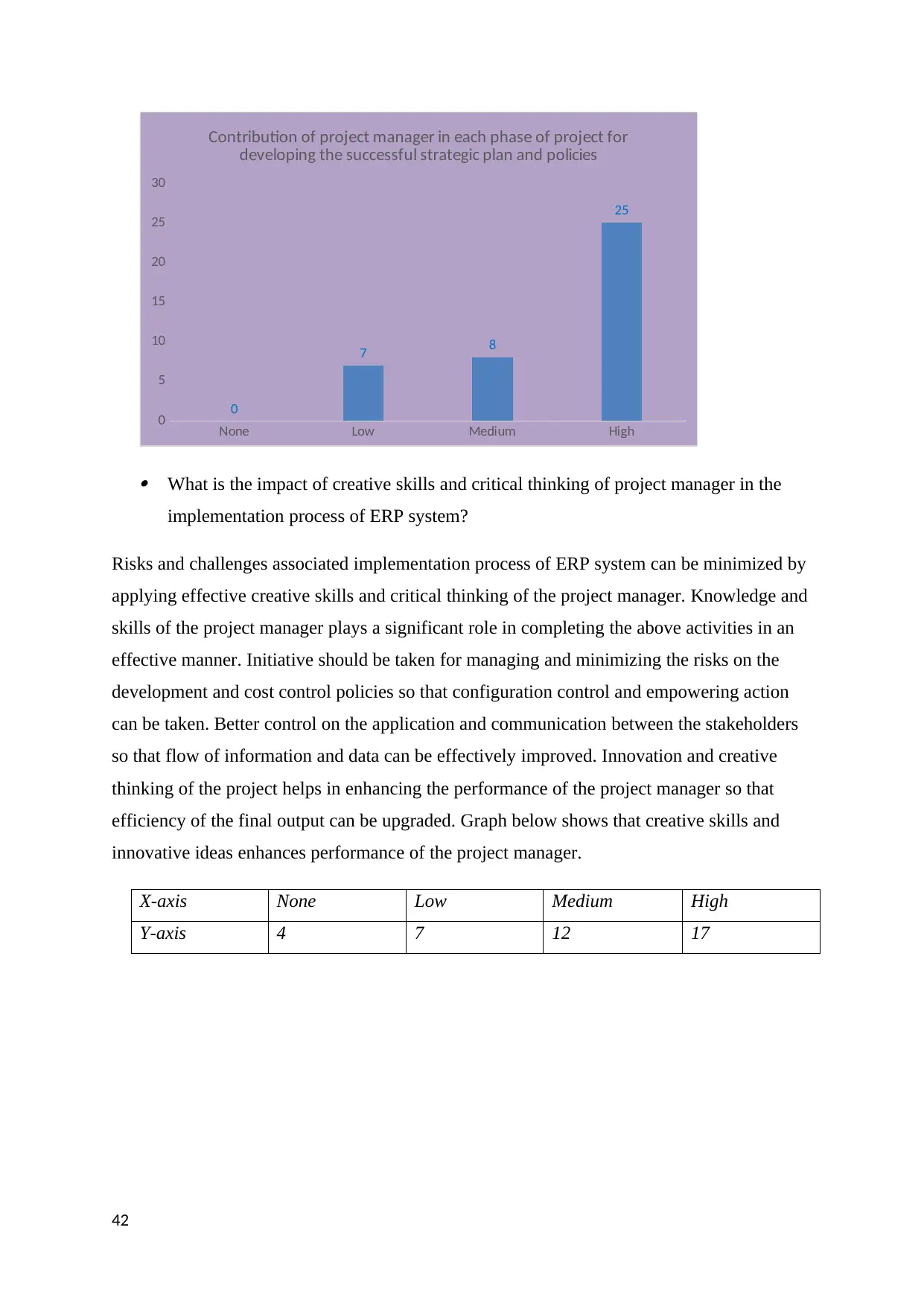
None Low Medium High
0
5
10
15
20
25
30
0
7 8
25
Contribution of project manager in each phase of project for
developing the successful strategic plan and policies
What is the impact of creative skills and critical thinking of project manager in the
implementation process of ERP system?
Risks and challenges associated implementation process of ERP system can be minimized by
applying effective creative skills and critical thinking of the project manager. Knowledge and
skills of the project manager plays a significant role in completing the above activities in an
effective manner. Initiative should be taken for managing and minimizing the risks on the
development and cost control policies so that configuration control and empowering action
can be taken. Better control on the application and communication between the stakeholders
so that flow of information and data can be effectively improved. Innovation and creative
thinking of the project helps in enhancing the performance of the project manager so that
efficiency of the final output can be upgraded. Graph below shows that creative skills and
innovative ideas enhances performance of the project manager.
X-axis None Low Medium High
Y-axis 4 7 12 17
42
0
5
10
15
20
25
30
0
7 8
25
Contribution of project manager in each phase of project for
developing the successful strategic plan and policies
What is the impact of creative skills and critical thinking of project manager in the
implementation process of ERP system?
Risks and challenges associated implementation process of ERP system can be minimized by
applying effective creative skills and critical thinking of the project manager. Knowledge and
skills of the project manager plays a significant role in completing the above activities in an
effective manner. Initiative should be taken for managing and minimizing the risks on the
development and cost control policies so that configuration control and empowering action
can be taken. Better control on the application and communication between the stakeholders
so that flow of information and data can be effectively improved. Innovation and creative
thinking of the project helps in enhancing the performance of the project manager so that
efficiency of the final output can be upgraded. Graph below shows that creative skills and
innovative ideas enhances performance of the project manager.
X-axis None Low Medium High
Y-axis 4 7 12 17
42
Paraphrase This Document
Need a fresh take? Get an instant paraphrase of this document with our AI Paraphraser
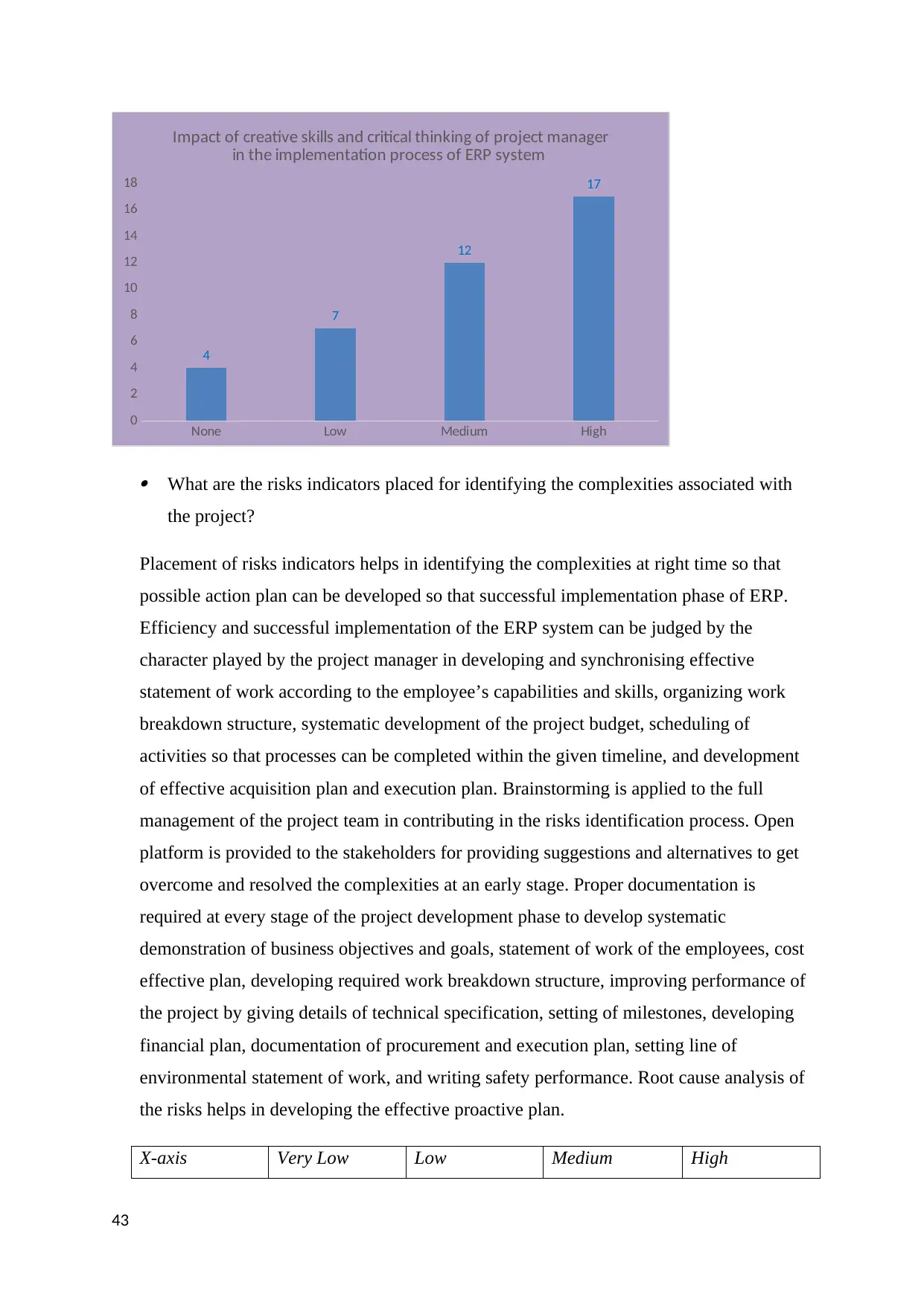
None Low Medium High
0
2
4
6
8
10
12
14
16
18
4
7
12
17
Impact of creative skills and critical thinking of project manager
in the implementation process of ERP system
What are the risks indicators placed for identifying the complexities associated with
the project?
Placement of risks indicators helps in identifying the complexities at right time so that
possible action plan can be developed so that successful implementation phase of ERP.
Efficiency and successful implementation of the ERP system can be judged by the
character played by the project manager in developing and synchronising effective
statement of work according to the employee’s capabilities and skills, organizing work
breakdown structure, systematic development of the project budget, scheduling of
activities so that processes can be completed within the given timeline, and development
of effective acquisition plan and execution plan. Brainstorming is applied to the full
management of the project team in contributing in the risks identification process. Open
platform is provided to the stakeholders for providing suggestions and alternatives to get
overcome and resolved the complexities at an early stage. Proper documentation is
required at every stage of the project development phase to develop systematic
demonstration of business objectives and goals, statement of work of the employees, cost
effective plan, developing required work breakdown structure, improving performance of
the project by giving details of technical specification, setting of milestones, developing
financial plan, documentation of procurement and execution plan, setting line of
environmental statement of work, and writing safety performance. Root cause analysis of
the risks helps in developing the effective proactive plan.
X-axis Very Low Low Medium High
43
0
2
4
6
8
10
12
14
16
18
4
7
12
17
Impact of creative skills and critical thinking of project manager
in the implementation process of ERP system
What are the risks indicators placed for identifying the complexities associated with
the project?
Placement of risks indicators helps in identifying the complexities at right time so that
possible action plan can be developed so that successful implementation phase of ERP.
Efficiency and successful implementation of the ERP system can be judged by the
character played by the project manager in developing and synchronising effective
statement of work according to the employee’s capabilities and skills, organizing work
breakdown structure, systematic development of the project budget, scheduling of
activities so that processes can be completed within the given timeline, and development
of effective acquisition plan and execution plan. Brainstorming is applied to the full
management of the project team in contributing in the risks identification process. Open
platform is provided to the stakeholders for providing suggestions and alternatives to get
overcome and resolved the complexities at an early stage. Proper documentation is
required at every stage of the project development phase to develop systematic
demonstration of business objectives and goals, statement of work of the employees, cost
effective plan, developing required work breakdown structure, improving performance of
the project by giving details of technical specification, setting of milestones, developing
financial plan, documentation of procurement and execution plan, setting line of
environmental statement of work, and writing safety performance. Root cause analysis of
the risks helps in developing the effective proactive plan.
X-axis Very Low Low Medium High
43
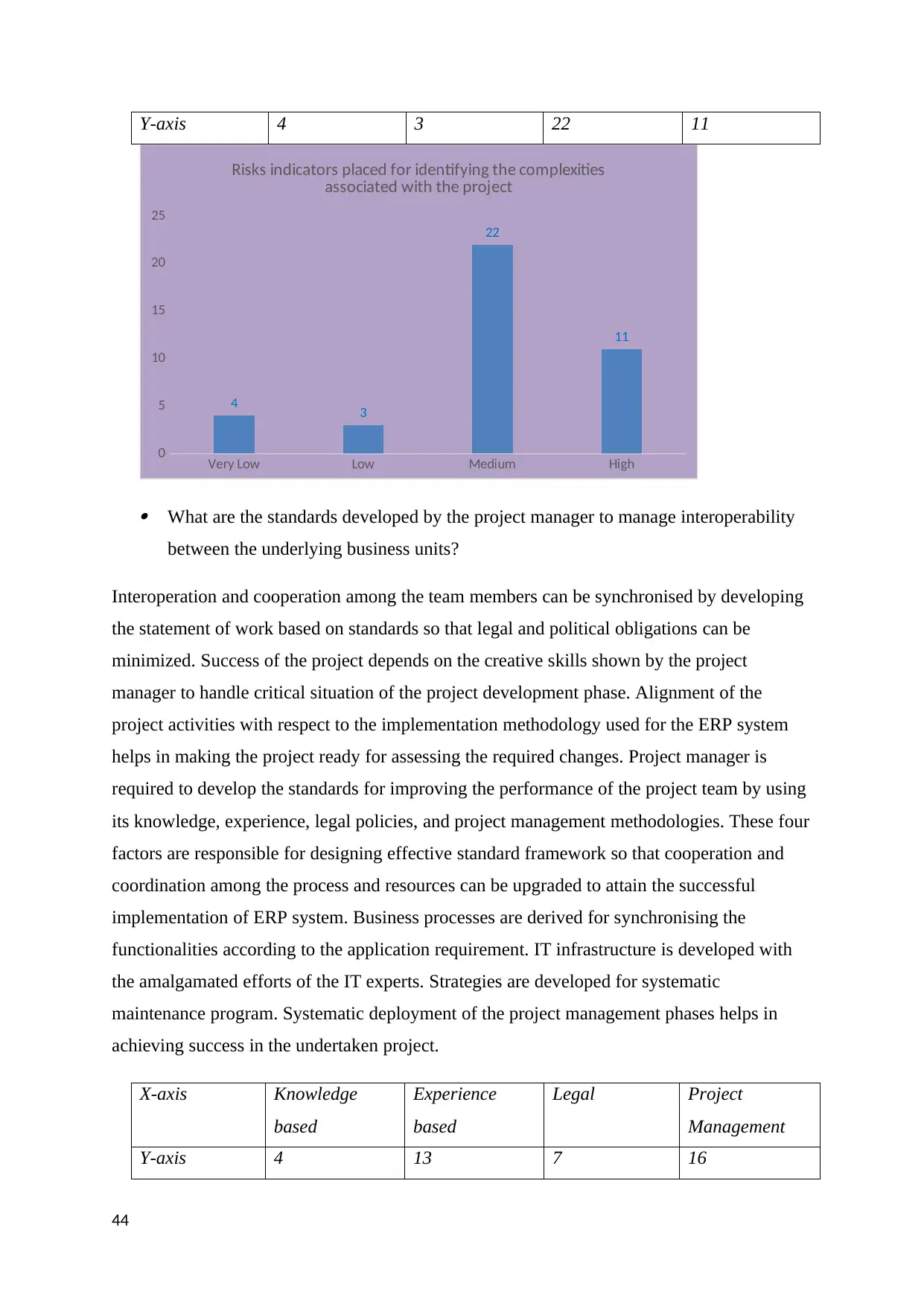
Y-axis 4 3 22 11
Very Low Low Medium High
0
5
10
15
20
25
4 3
22
11
Risks indicators placed for identifying the complexities
associated with the project
What are the standards developed by the project manager to manage interoperability
between the underlying business units?
Interoperation and cooperation among the team members can be synchronised by developing
the statement of work based on standards so that legal and political obligations can be
minimized. Success of the project depends on the creative skills shown by the project
manager to handle critical situation of the project development phase. Alignment of the
project activities with respect to the implementation methodology used for the ERP system
helps in making the project ready for assessing the required changes. Project manager is
required to develop the standards for improving the performance of the project team by using
its knowledge, experience, legal policies, and project management methodologies. These four
factors are responsible for designing effective standard framework so that cooperation and
coordination among the process and resources can be upgraded to attain the successful
implementation of ERP system. Business processes are derived for synchronising the
functionalities according to the application requirement. IT infrastructure is developed with
the amalgamated efforts of the IT experts. Strategies are developed for systematic
maintenance program. Systematic deployment of the project management phases helps in
achieving success in the undertaken project.
X-axis Knowledge
based
Experience
based
Legal Project
Management
Y-axis 4 13 7 16
44
Very Low Low Medium High
0
5
10
15
20
25
4 3
22
11
Risks indicators placed for identifying the complexities
associated with the project
What are the standards developed by the project manager to manage interoperability
between the underlying business units?
Interoperation and cooperation among the team members can be synchronised by developing
the statement of work based on standards so that legal and political obligations can be
minimized. Success of the project depends on the creative skills shown by the project
manager to handle critical situation of the project development phase. Alignment of the
project activities with respect to the implementation methodology used for the ERP system
helps in making the project ready for assessing the required changes. Project manager is
required to develop the standards for improving the performance of the project team by using
its knowledge, experience, legal policies, and project management methodologies. These four
factors are responsible for designing effective standard framework so that cooperation and
coordination among the process and resources can be upgraded to attain the successful
implementation of ERP system. Business processes are derived for synchronising the
functionalities according to the application requirement. IT infrastructure is developed with
the amalgamated efforts of the IT experts. Strategies are developed for systematic
maintenance program. Systematic deployment of the project management phases helps in
achieving success in the undertaken project.
X-axis Knowledge
based
Experience
based
Legal Project
Management
Y-axis 4 13 7 16
44
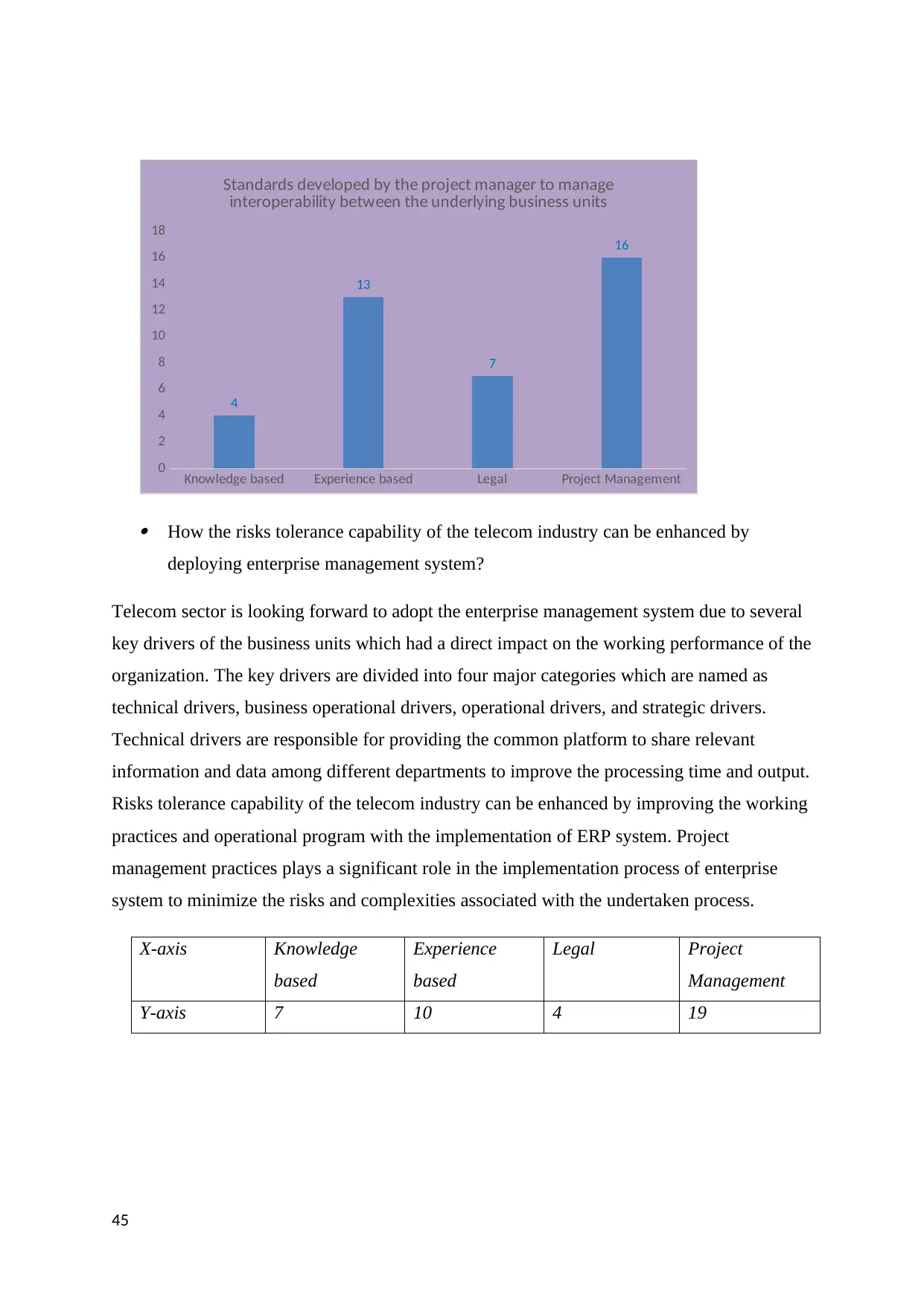
Knowledge based Experience based Legal Project Management
0
2
4
6
8
10
12
14
16
18
4
13
7
16
Standards developed by the project manager to manage
interoperability between the underlying business units
How the risks tolerance capability of the telecom industry can be enhanced by
deploying enterprise management system?
Telecom sector is looking forward to adopt the enterprise management system due to several
key drivers of the business units which had a direct impact on the working performance of the
organization. The key drivers are divided into four major categories which are named as
technical drivers, business operational drivers, operational drivers, and strategic drivers.
Technical drivers are responsible for providing the common platform to share relevant
information and data among different departments to improve the processing time and output.
Risks tolerance capability of the telecom industry can be enhanced by improving the working
practices and operational program with the implementation of ERP system. Project
management practices plays a significant role in the implementation process of enterprise
system to minimize the risks and complexities associated with the undertaken process.
X-axis Knowledge
based
Experience
based
Legal Project
Management
Y-axis 7 10 4 19
45
0
2
4
6
8
10
12
14
16
18
4
13
7
16
Standards developed by the project manager to manage
interoperability between the underlying business units
How the risks tolerance capability of the telecom industry can be enhanced by
deploying enterprise management system?
Telecom sector is looking forward to adopt the enterprise management system due to several
key drivers of the business units which had a direct impact on the working performance of the
organization. The key drivers are divided into four major categories which are named as
technical drivers, business operational drivers, operational drivers, and strategic drivers.
Technical drivers are responsible for providing the common platform to share relevant
information and data among different departments to improve the processing time and output.
Risks tolerance capability of the telecom industry can be enhanced by improving the working
practices and operational program with the implementation of ERP system. Project
management practices plays a significant role in the implementation process of enterprise
system to minimize the risks and complexities associated with the undertaken process.
X-axis Knowledge
based
Experience
based
Legal Project
Management
Y-axis 7 10 4 19
45
Secure Best Marks with AI Grader
Need help grading? Try our AI Grader for instant feedback on your assignments.
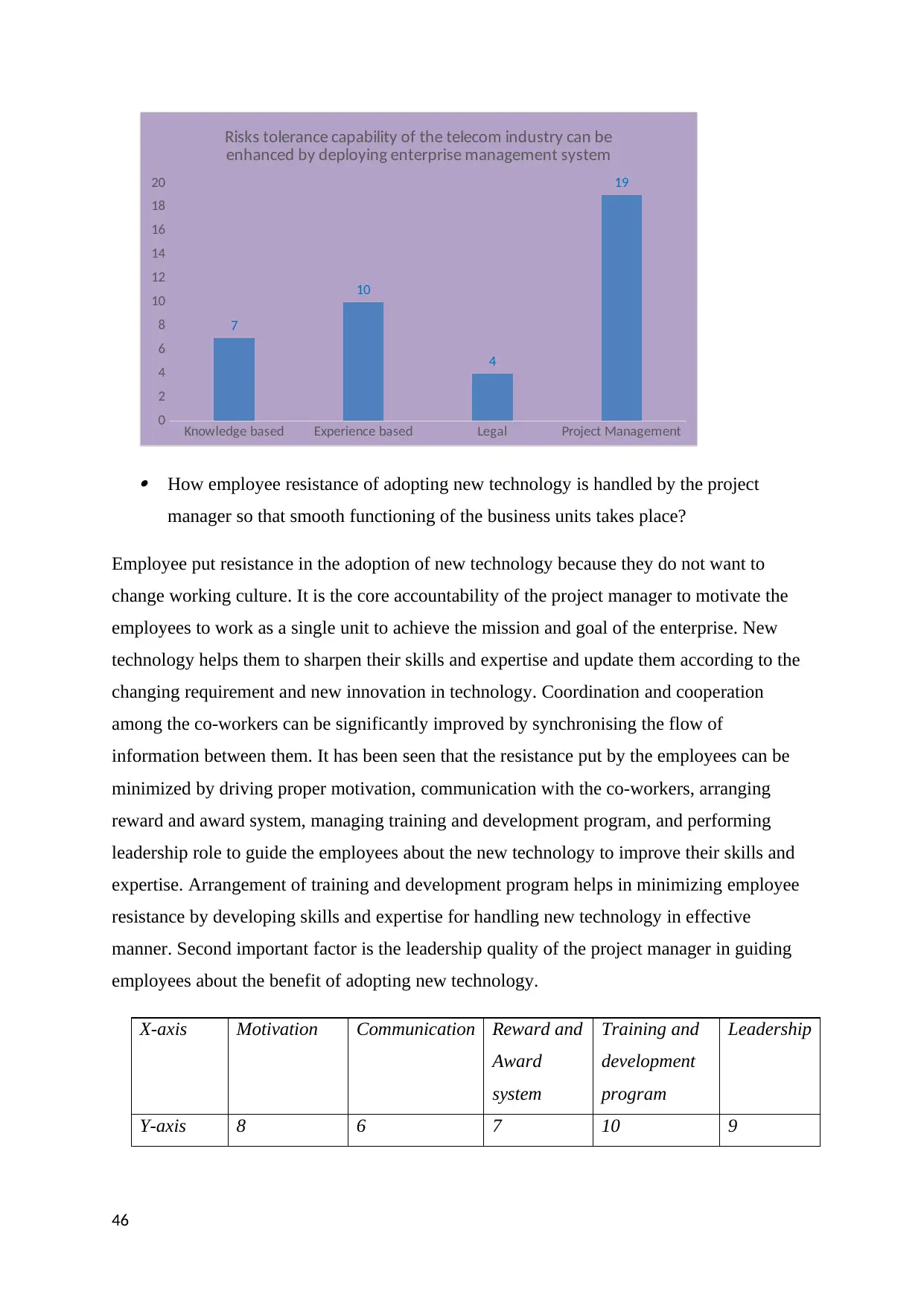
Knowledge based Experience based Legal Project Management
0
2
4
6
8
10
12
14
16
18
20
7
10
4
19
Risks tolerance capability of the telecom industry can be
enhanced by deploying enterprise management system
How employee resistance of adopting new technology is handled by the project
manager so that smooth functioning of the business units takes place?
Employee put resistance in the adoption of new technology because they do not want to
change working culture. It is the core accountability of the project manager to motivate the
employees to work as a single unit to achieve the mission and goal of the enterprise. New
technology helps them to sharpen their skills and expertise and update them according to the
changing requirement and new innovation in technology. Coordination and cooperation
among the co-workers can be significantly improved by synchronising the flow of
information between them. It has been seen that the resistance put by the employees can be
minimized by driving proper motivation, communication with the co-workers, arranging
reward and award system, managing training and development program, and performing
leadership role to guide the employees about the new technology to improve their skills and
expertise. Arrangement of training and development program helps in minimizing employee
resistance by developing skills and expertise for handling new technology in effective
manner. Second important factor is the leadership quality of the project manager in guiding
employees about the benefit of adopting new technology.
X-axis Motivation Communication Reward and
Award
system
Training and
development
program
Leadership
Y-axis 8 6 7 10 9
46
0
2
4
6
8
10
12
14
16
18
20
7
10
4
19
Risks tolerance capability of the telecom industry can be
enhanced by deploying enterprise management system
How employee resistance of adopting new technology is handled by the project
manager so that smooth functioning of the business units takes place?
Employee put resistance in the adoption of new technology because they do not want to
change working culture. It is the core accountability of the project manager to motivate the
employees to work as a single unit to achieve the mission and goal of the enterprise. New
technology helps them to sharpen their skills and expertise and update them according to the
changing requirement and new innovation in technology. Coordination and cooperation
among the co-workers can be significantly improved by synchronising the flow of
information between them. It has been seen that the resistance put by the employees can be
minimized by driving proper motivation, communication with the co-workers, arranging
reward and award system, managing training and development program, and performing
leadership role to guide the employees about the new technology to improve their skills and
expertise. Arrangement of training and development program helps in minimizing employee
resistance by developing skills and expertise for handling new technology in effective
manner. Second important factor is the leadership quality of the project manager in guiding
employees about the benefit of adopting new technology.
X-axis Motivation Communication Reward and
Award
system
Training and
development
program
Leadership
Y-axis 8 6 7 10 9
46
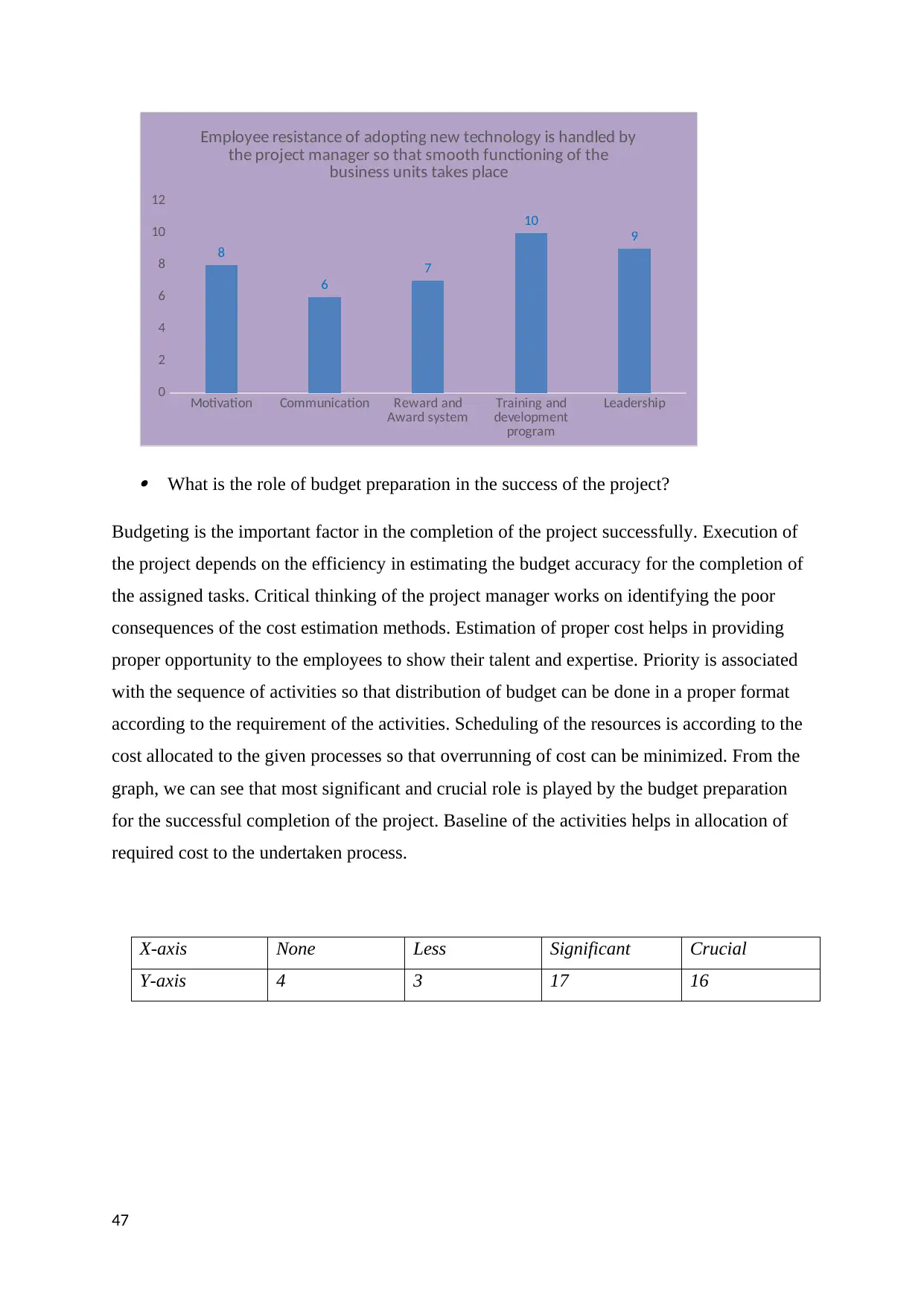
Motivation Communication Reward and
Award system Training and
development
program
Leadership
0
2
4
6
8
10
12
8
6
7
10
9
Employee resistance of adopting new technology is handled by
the project manager so that smooth functioning of the
business units takes place
What is the role of budget preparation in the success of the project?
Budgeting is the important factor in the completion of the project successfully. Execution of
the project depends on the efficiency in estimating the budget accuracy for the completion of
the assigned tasks. Critical thinking of the project manager works on identifying the poor
consequences of the cost estimation methods. Estimation of proper cost helps in providing
proper opportunity to the employees to show their talent and expertise. Priority is associated
with the sequence of activities so that distribution of budget can be done in a proper format
according to the requirement of the activities. Scheduling of the resources is according to the
cost allocated to the given processes so that overrunning of cost can be minimized. From the
graph, we can see that most significant and crucial role is played by the budget preparation
for the successful completion of the project. Baseline of the activities helps in allocation of
required cost to the undertaken process.
X-axis None Less Significant Crucial
Y-axis 4 3 17 16
47
Award system Training and
development
program
Leadership
0
2
4
6
8
10
12
8
6
7
10
9
Employee resistance of adopting new technology is handled by
the project manager so that smooth functioning of the
business units takes place
What is the role of budget preparation in the success of the project?
Budgeting is the important factor in the completion of the project successfully. Execution of
the project depends on the efficiency in estimating the budget accuracy for the completion of
the assigned tasks. Critical thinking of the project manager works on identifying the poor
consequences of the cost estimation methods. Estimation of proper cost helps in providing
proper opportunity to the employees to show their talent and expertise. Priority is associated
with the sequence of activities so that distribution of budget can be done in a proper format
according to the requirement of the activities. Scheduling of the resources is according to the
cost allocated to the given processes so that overrunning of cost can be minimized. From the
graph, we can see that most significant and crucial role is played by the budget preparation
for the successful completion of the project. Baseline of the activities helps in allocation of
required cost to the undertaken process.
X-axis None Less Significant Crucial
Y-axis 4 3 17 16
47
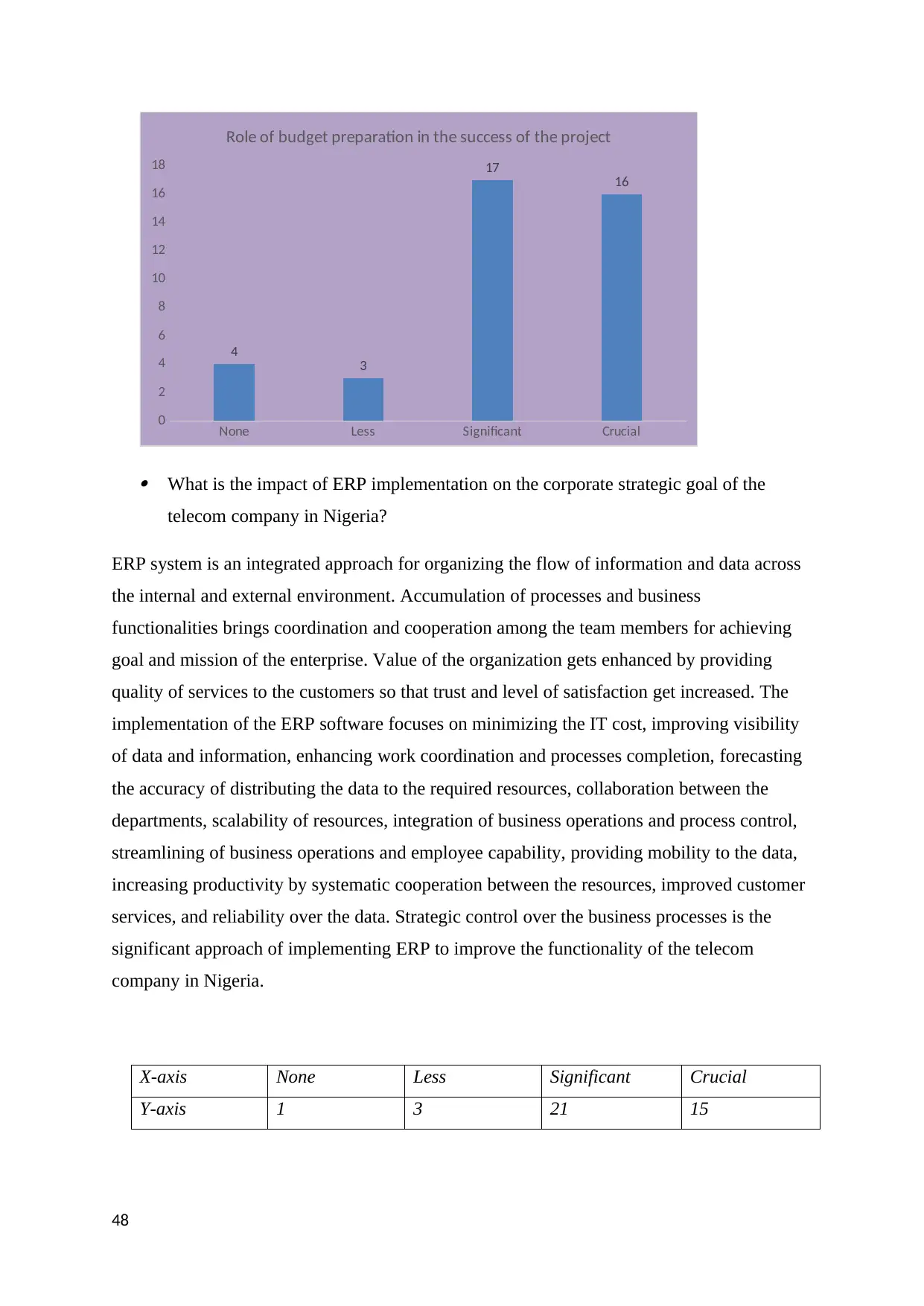
None Less Significant Crucial
0
2
4
6
8
10
12
14
16
18
4
3
17
16
Role of budget preparation in the success of the project
What is the impact of ERP implementation on the corporate strategic goal of the
telecom company in Nigeria?
ERP system is an integrated approach for organizing the flow of information and data across
the internal and external environment. Accumulation of processes and business
functionalities brings coordination and cooperation among the team members for achieving
goal and mission of the enterprise. Value of the organization gets enhanced by providing
quality of services to the customers so that trust and level of satisfaction get increased. The
implementation of the ERP software focuses on minimizing the IT cost, improving visibility
of data and information, enhancing work coordination and processes completion, forecasting
the accuracy of distributing the data to the required resources, collaboration between the
departments, scalability of resources, integration of business operations and process control,
streamlining of business operations and employee capability, providing mobility to the data,
increasing productivity by systematic cooperation between the resources, improved customer
services, and reliability over the data. Strategic control over the business processes is the
significant approach of implementing ERP to improve the functionality of the telecom
company in Nigeria.
X-axis None Less Significant Crucial
Y-axis 1 3 21 15
48
0
2
4
6
8
10
12
14
16
18
4
3
17
16
Role of budget preparation in the success of the project
What is the impact of ERP implementation on the corporate strategic goal of the
telecom company in Nigeria?
ERP system is an integrated approach for organizing the flow of information and data across
the internal and external environment. Accumulation of processes and business
functionalities brings coordination and cooperation among the team members for achieving
goal and mission of the enterprise. Value of the organization gets enhanced by providing
quality of services to the customers so that trust and level of satisfaction get increased. The
implementation of the ERP software focuses on minimizing the IT cost, improving visibility
of data and information, enhancing work coordination and processes completion, forecasting
the accuracy of distributing the data to the required resources, collaboration between the
departments, scalability of resources, integration of business operations and process control,
streamlining of business operations and employee capability, providing mobility to the data,
increasing productivity by systematic cooperation between the resources, improved customer
services, and reliability over the data. Strategic control over the business processes is the
significant approach of implementing ERP to improve the functionality of the telecom
company in Nigeria.
X-axis None Less Significant Crucial
Y-axis 1 3 21 15
48
Paraphrase This Document
Need a fresh take? Get an instant paraphrase of this document with our AI Paraphraser
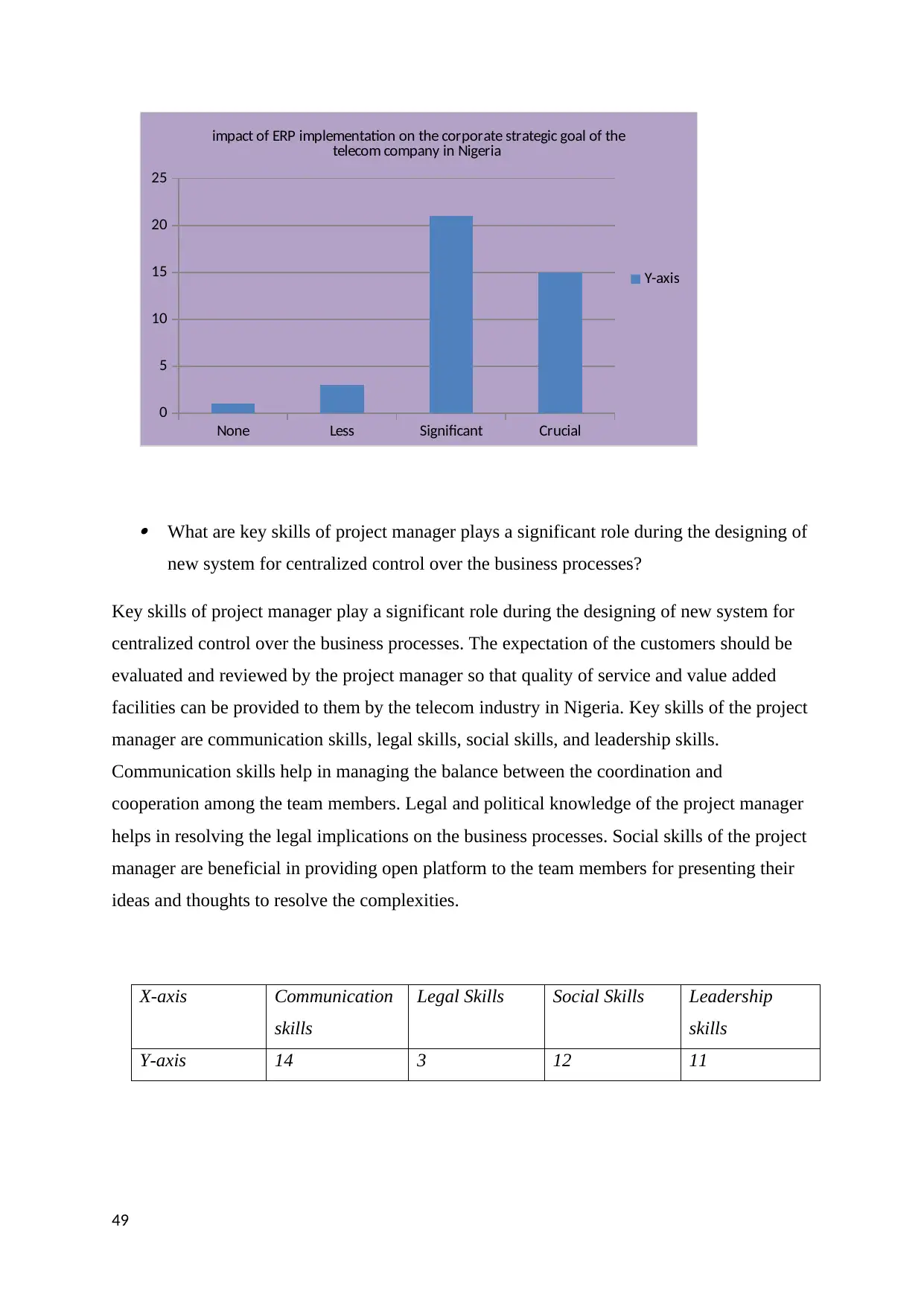
None Less Significant Crucial
0
5
10
15
20
25
impact of ERP implementation on the corporate strategic goal of the
telecom company in Nigeria
Y-axis
What are key skills of project manager plays a significant role during the designing of
new system for centralized control over the business processes?
Key skills of project manager play a significant role during the designing of new system for
centralized control over the business processes. The expectation of the customers should be
evaluated and reviewed by the project manager so that quality of service and value added
facilities can be provided to them by the telecom industry in Nigeria. Key skills of the project
manager are communication skills, legal skills, social skills, and leadership skills.
Communication skills help in managing the balance between the coordination and
cooperation among the team members. Legal and political knowledge of the project manager
helps in resolving the legal implications on the business processes. Social skills of the project
manager are beneficial in providing open platform to the team members for presenting their
ideas and thoughts to resolve the complexities.
X-axis Communication
skills
Legal Skills Social Skills Leadership
skills
Y-axis 14 3 12 11
49
0
5
10
15
20
25
impact of ERP implementation on the corporate strategic goal of the
telecom company in Nigeria
Y-axis
What are key skills of project manager plays a significant role during the designing of
new system for centralized control over the business processes?
Key skills of project manager play a significant role during the designing of new system for
centralized control over the business processes. The expectation of the customers should be
evaluated and reviewed by the project manager so that quality of service and value added
facilities can be provided to them by the telecom industry in Nigeria. Key skills of the project
manager are communication skills, legal skills, social skills, and leadership skills.
Communication skills help in managing the balance between the coordination and
cooperation among the team members. Legal and political knowledge of the project manager
helps in resolving the legal implications on the business processes. Social skills of the project
manager are beneficial in providing open platform to the team members for presenting their
ideas and thoughts to resolve the complexities.
X-axis Communication
skills
Legal Skills Social Skills Leadership
skills
Y-axis 14 3 12 11
49
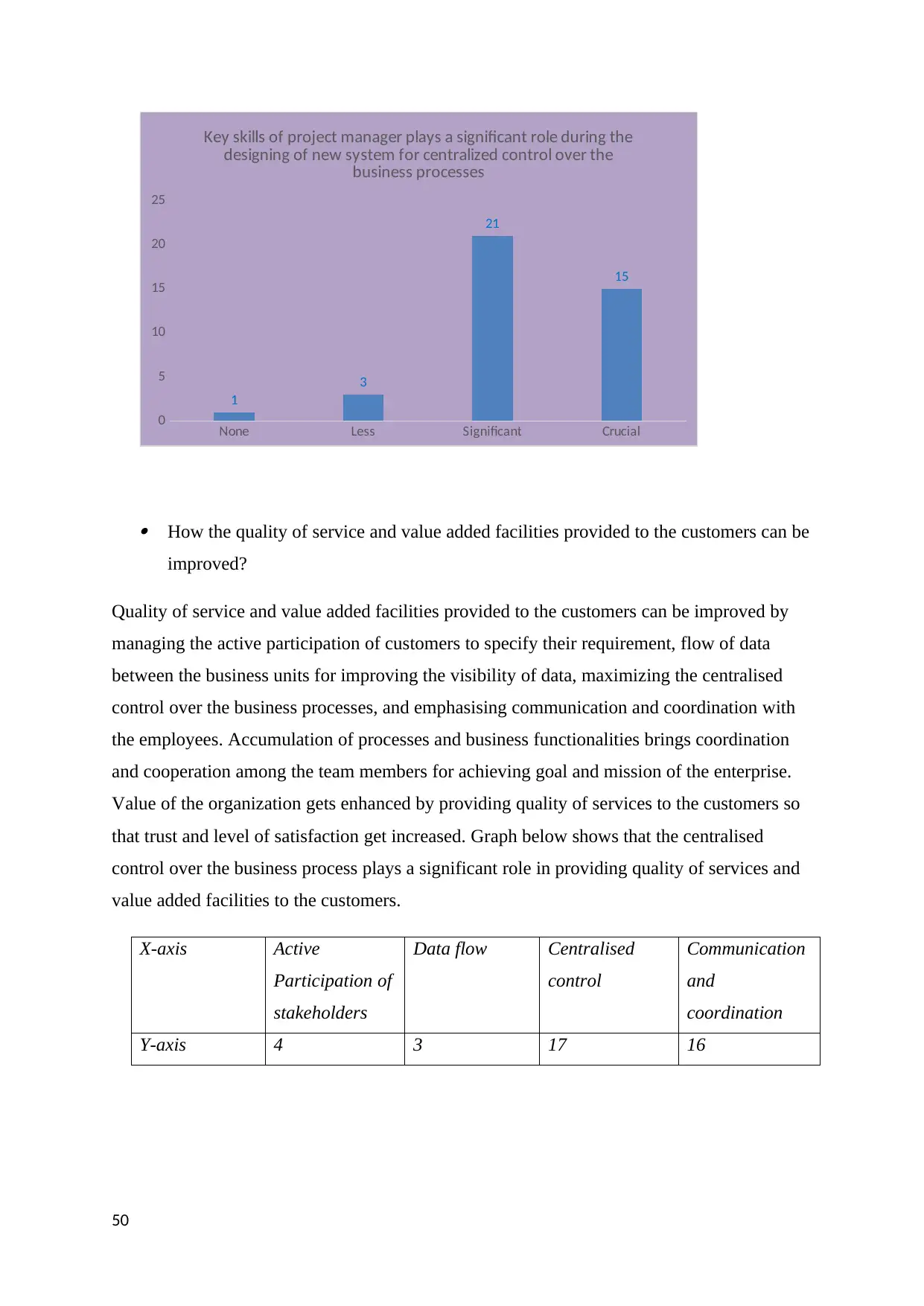
None Less Significant Crucial
0
5
10
15
20
25
1
3
21
15
Key skills of project manager plays a significant role during the
designing of new system for centralized control over the
business processes
How the quality of service and value added facilities provided to the customers can be
improved?
Quality of service and value added facilities provided to the customers can be improved by
managing the active participation of customers to specify their requirement, flow of data
between the business units for improving the visibility of data, maximizing the centralised
control over the business processes, and emphasising communication and coordination with
the employees. Accumulation of processes and business functionalities brings coordination
and cooperation among the team members for achieving goal and mission of the enterprise.
Value of the organization gets enhanced by providing quality of services to the customers so
that trust and level of satisfaction get increased. Graph below shows that the centralised
control over the business process plays a significant role in providing quality of services and
value added facilities to the customers.
X-axis Active
Participation of
stakeholders
Data flow Centralised
control
Communication
and
coordination
Y-axis 4 3 17 16
50
0
5
10
15
20
25
1
3
21
15
Key skills of project manager plays a significant role during the
designing of new system for centralized control over the
business processes
How the quality of service and value added facilities provided to the customers can be
improved?
Quality of service and value added facilities provided to the customers can be improved by
managing the active participation of customers to specify their requirement, flow of data
between the business units for improving the visibility of data, maximizing the centralised
control over the business processes, and emphasising communication and coordination with
the employees. Accumulation of processes and business functionalities brings coordination
and cooperation among the team members for achieving goal and mission of the enterprise.
Value of the organization gets enhanced by providing quality of services to the customers so
that trust and level of satisfaction get increased. Graph below shows that the centralised
control over the business process plays a significant role in providing quality of services and
value added facilities to the customers.
X-axis Active
Participation of
stakeholders
Data flow Centralised
control
Communication
and
coordination
Y-axis 4 3 17 16
50
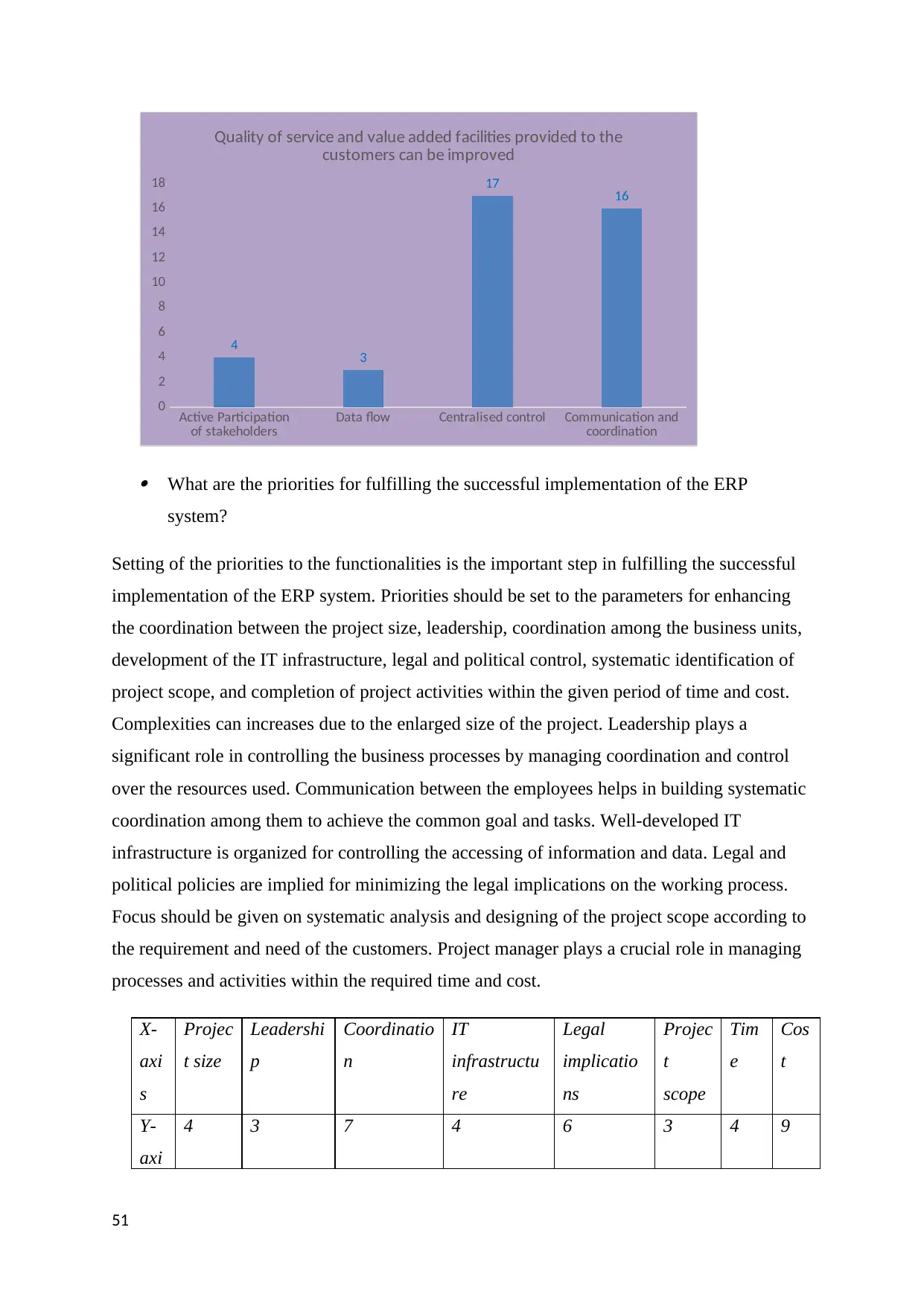
Active Participation
of stakeholders Data flow Centralised control Communication and
coordination
0
2
4
6
8
10
12
14
16
18
4 3
17 16
Quality of service and value added facilities provided to the
customers can be improved
What are the priorities for fulfilling the successful implementation of the ERP
system?
Setting of the priorities to the functionalities is the important step in fulfilling the successful
implementation of the ERP system. Priorities should be set to the parameters for enhancing
the coordination between the project size, leadership, coordination among the business units,
development of the IT infrastructure, legal and political control, systematic identification of
project scope, and completion of project activities within the given period of time and cost.
Complexities can increases due to the enlarged size of the project. Leadership plays a
significant role in controlling the business processes by managing coordination and control
over the resources used. Communication between the employees helps in building systematic
coordination among them to achieve the common goal and tasks. Well-developed IT
infrastructure is organized for controlling the accessing of information and data. Legal and
political policies are implied for minimizing the legal implications on the working process.
Focus should be given on systematic analysis and designing of the project scope according to
the requirement and need of the customers. Project manager plays a crucial role in managing
processes and activities within the required time and cost.
X-
axi
s
Projec
t size
Leadershi
p
Coordinatio
n
IT
infrastructu
re
Legal
implicatio
ns
Projec
t
scope
Tim
e
Cos
t
Y-
axi
4 3 7 4 6 3 4 9
51
of stakeholders Data flow Centralised control Communication and
coordination
0
2
4
6
8
10
12
14
16
18
4 3
17 16
Quality of service and value added facilities provided to the
customers can be improved
What are the priorities for fulfilling the successful implementation of the ERP
system?
Setting of the priorities to the functionalities is the important step in fulfilling the successful
implementation of the ERP system. Priorities should be set to the parameters for enhancing
the coordination between the project size, leadership, coordination among the business units,
development of the IT infrastructure, legal and political control, systematic identification of
project scope, and completion of project activities within the given period of time and cost.
Complexities can increases due to the enlarged size of the project. Leadership plays a
significant role in controlling the business processes by managing coordination and control
over the resources used. Communication between the employees helps in building systematic
coordination among them to achieve the common goal and tasks. Well-developed IT
infrastructure is organized for controlling the accessing of information and data. Legal and
political policies are implied for minimizing the legal implications on the working process.
Focus should be given on systematic analysis and designing of the project scope according to
the requirement and need of the customers. Project manager plays a crucial role in managing
processes and activities within the required time and cost.
X-
axi
s
Projec
t size
Leadershi
p
Coordinatio
n
IT
infrastructu
re
Legal
implicatio
ns
Projec
t
scope
Tim
e
Cos
t
Y-
axi
4 3 7 4 6 3 4 9
51
Secure Best Marks with AI Grader
Need help grading? Try our AI Grader for instant feedback on your assignments.
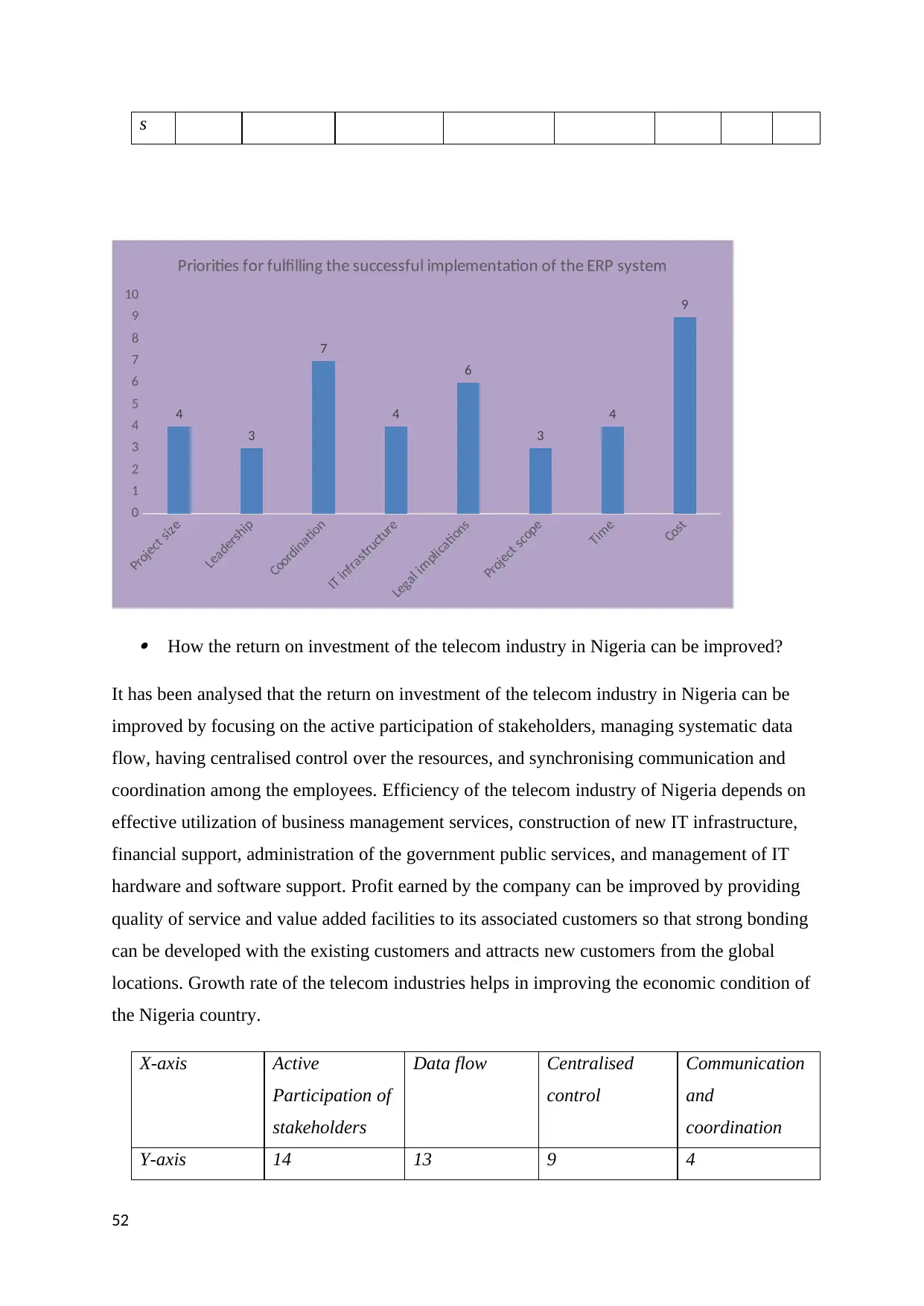
s
Project size
Leadership
Coordination
IT infrastructure
Legal implications
Project scope
Time
Cost
0
1
2
3
4
5
6
7
8
9
10
4
3
7
4
6
3
4
9
Priorities for fulfilling the successful implementation of the ERP system
How the return on investment of the telecom industry in Nigeria can be improved?
It has been analysed that the return on investment of the telecom industry in Nigeria can be
improved by focusing on the active participation of stakeholders, managing systematic data
flow, having centralised control over the resources, and synchronising communication and
coordination among the employees. Efficiency of the telecom industry of Nigeria depends on
effective utilization of business management services, construction of new IT infrastructure,
financial support, administration of the government public services, and management of IT
hardware and software support. Profit earned by the company can be improved by providing
quality of service and value added facilities to its associated customers so that strong bonding
can be developed with the existing customers and attracts new customers from the global
locations. Growth rate of the telecom industries helps in improving the economic condition of
the Nigeria country.
X-axis Active
Participation of
stakeholders
Data flow Centralised
control
Communication
and
coordination
Y-axis 14 13 9 4
52
Project size
Leadership
Coordination
IT infrastructure
Legal implications
Project scope
Time
Cost
0
1
2
3
4
5
6
7
8
9
10
4
3
7
4
6
3
4
9
Priorities for fulfilling the successful implementation of the ERP system
How the return on investment of the telecom industry in Nigeria can be improved?
It has been analysed that the return on investment of the telecom industry in Nigeria can be
improved by focusing on the active participation of stakeholders, managing systematic data
flow, having centralised control over the resources, and synchronising communication and
coordination among the employees. Efficiency of the telecom industry of Nigeria depends on
effective utilization of business management services, construction of new IT infrastructure,
financial support, administration of the government public services, and management of IT
hardware and software support. Profit earned by the company can be improved by providing
quality of service and value added facilities to its associated customers so that strong bonding
can be developed with the existing customers and attracts new customers from the global
locations. Growth rate of the telecom industries helps in improving the economic condition of
the Nigeria country.
X-axis Active
Participation of
stakeholders
Data flow Centralised
control
Communication
and
coordination
Y-axis 14 13 9 4
52
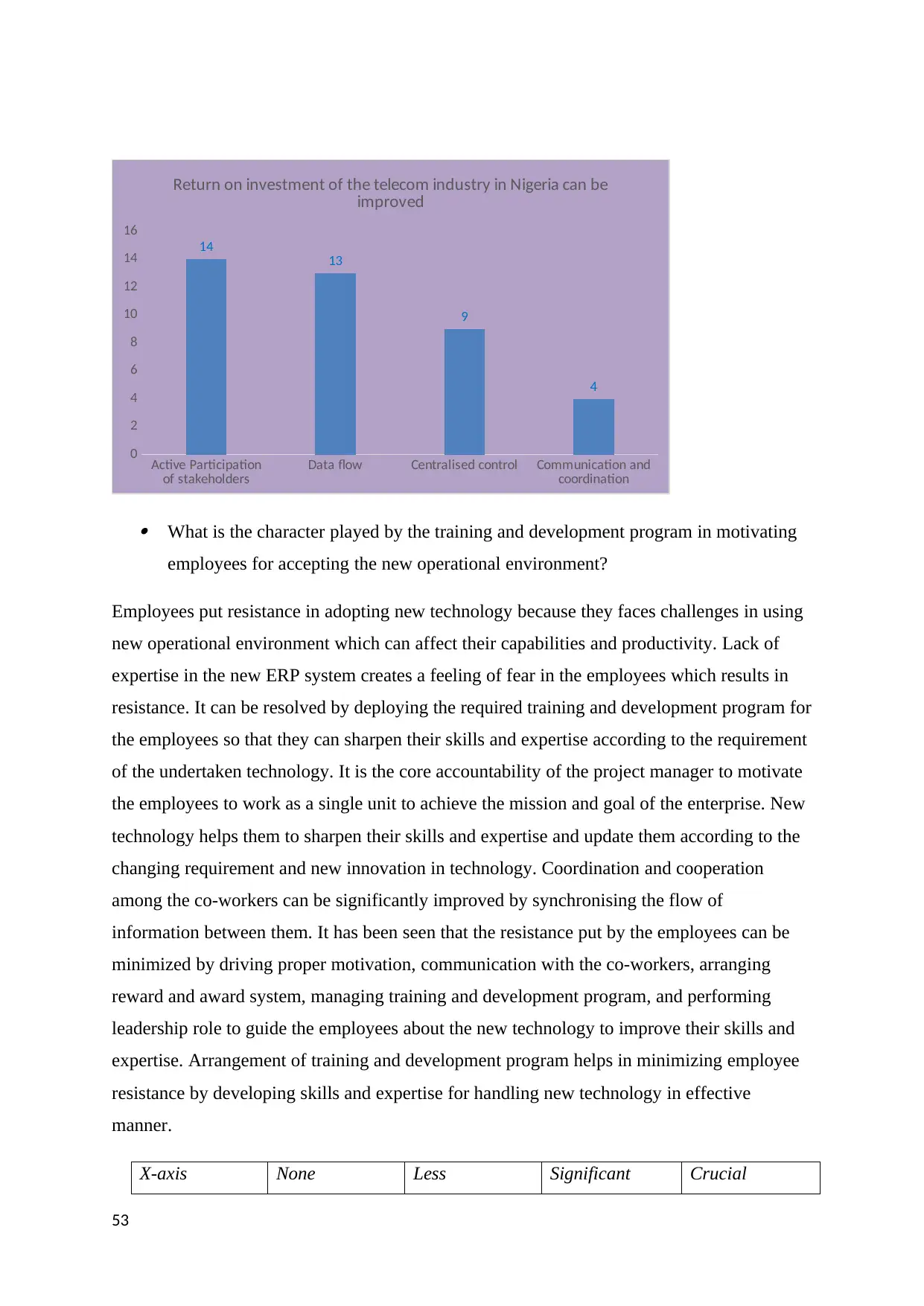
Active Participation
of stakeholders Data flow Centralised control Communication and
coordination
0
2
4
6
8
10
12
14
16
14
13
9
4
Return on investment of the telecom industry in Nigeria can be
improved
What is the character played by the training and development program in motivating
employees for accepting the new operational environment?
Employees put resistance in adopting new technology because they faces challenges in using
new operational environment which can affect their capabilities and productivity. Lack of
expertise in the new ERP system creates a feeling of fear in the employees which results in
resistance. It can be resolved by deploying the required training and development program for
the employees so that they can sharpen their skills and expertise according to the requirement
of the undertaken technology. It is the core accountability of the project manager to motivate
the employees to work as a single unit to achieve the mission and goal of the enterprise. New
technology helps them to sharpen their skills and expertise and update them according to the
changing requirement and new innovation in technology. Coordination and cooperation
among the co-workers can be significantly improved by synchronising the flow of
information between them. It has been seen that the resistance put by the employees can be
minimized by driving proper motivation, communication with the co-workers, arranging
reward and award system, managing training and development program, and performing
leadership role to guide the employees about the new technology to improve their skills and
expertise. Arrangement of training and development program helps in minimizing employee
resistance by developing skills and expertise for handling new technology in effective
manner.
X-axis None Less Significant Crucial
53
of stakeholders Data flow Centralised control Communication and
coordination
0
2
4
6
8
10
12
14
16
14
13
9
4
Return on investment of the telecom industry in Nigeria can be
improved
What is the character played by the training and development program in motivating
employees for accepting the new operational environment?
Employees put resistance in adopting new technology because they faces challenges in using
new operational environment which can affect their capabilities and productivity. Lack of
expertise in the new ERP system creates a feeling of fear in the employees which results in
resistance. It can be resolved by deploying the required training and development program for
the employees so that they can sharpen their skills and expertise according to the requirement
of the undertaken technology. It is the core accountability of the project manager to motivate
the employees to work as a single unit to achieve the mission and goal of the enterprise. New
technology helps them to sharpen their skills and expertise and update them according to the
changing requirement and new innovation in technology. Coordination and cooperation
among the co-workers can be significantly improved by synchronising the flow of
information between them. It has been seen that the resistance put by the employees can be
minimized by driving proper motivation, communication with the co-workers, arranging
reward and award system, managing training and development program, and performing
leadership role to guide the employees about the new technology to improve their skills and
expertise. Arrangement of training and development program helps in minimizing employee
resistance by developing skills and expertise for handling new technology in effective
manner.
X-axis None Less Significant Crucial
53
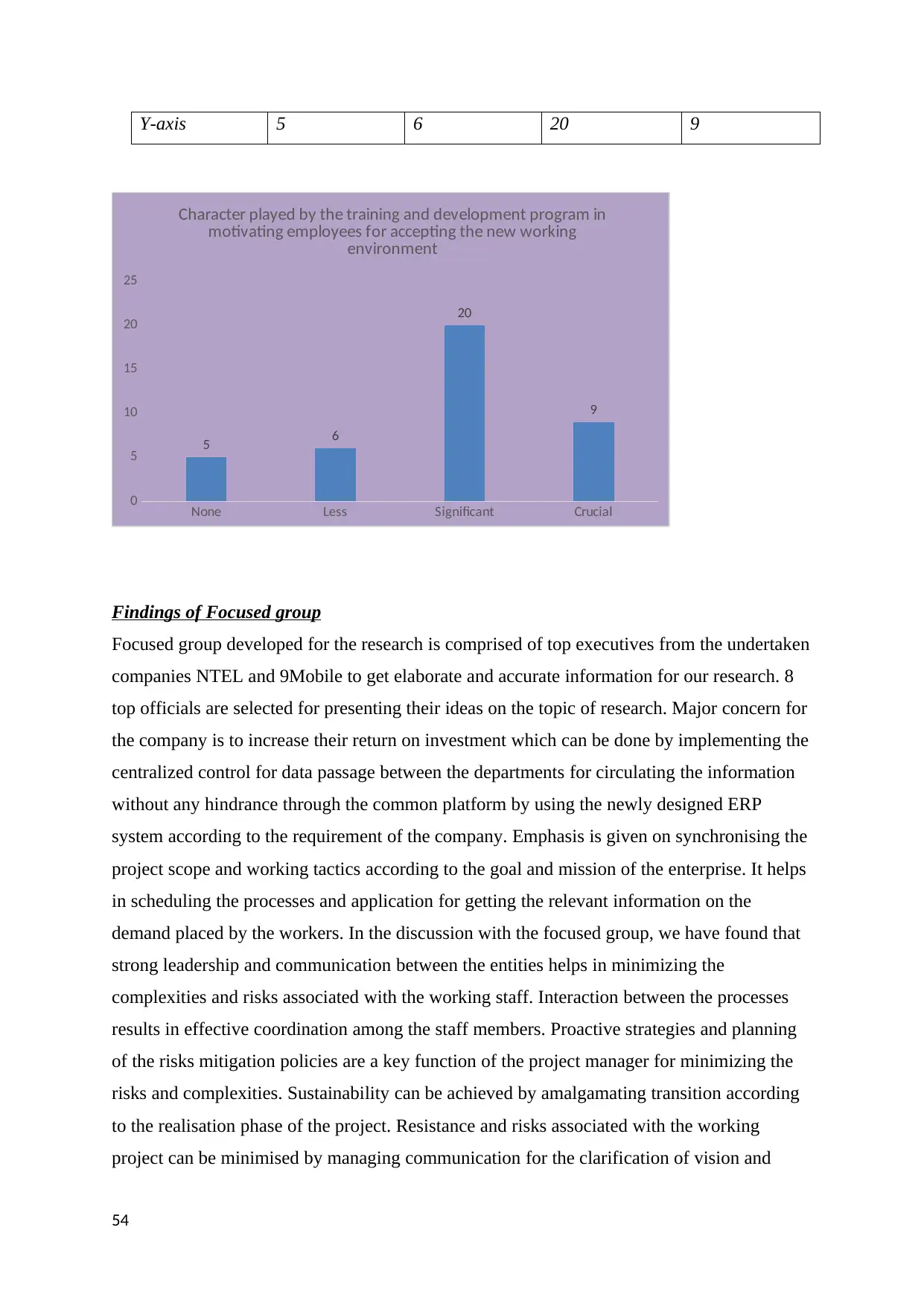
Y-axis 5 6 20 9
None Less Significant Crucial
0
5
10
15
20
25
5 6
20
9
Character played by the training and development program in
motivating employees for accepting the new working
environment
Findings of Focused group
Focused group developed for the research is comprised of top executives from the undertaken
companies NTEL and 9Mobile to get elaborate and accurate information for our research. 8
top officials are selected for presenting their ideas on the topic of research. Major concern for
the company is to increase their return on investment which can be done by implementing the
centralized control for data passage between the departments for circulating the information
without any hindrance through the common platform by using the newly designed ERP
system according to the requirement of the company. Emphasis is given on synchronising the
project scope and working tactics according to the goal and mission of the enterprise. It helps
in scheduling the processes and application for getting the relevant information on the
demand placed by the workers. In the discussion with the focused group, we have found that
strong leadership and communication between the entities helps in minimizing the
complexities and risks associated with the working staff. Interaction between the processes
results in effective coordination among the staff members. Proactive strategies and planning
of the risks mitigation policies are a key function of the project manager for minimizing the
risks and complexities. Sustainability can be achieved by amalgamating transition according
to the realisation phase of the project. Resistance and risks associated with the working
project can be minimised by managing communication for the clarification of vision and
54
None Less Significant Crucial
0
5
10
15
20
25
5 6
20
9
Character played by the training and development program in
motivating employees for accepting the new working
environment
Findings of Focused group
Focused group developed for the research is comprised of top executives from the undertaken
companies NTEL and 9Mobile to get elaborate and accurate information for our research. 8
top officials are selected for presenting their ideas on the topic of research. Major concern for
the company is to increase their return on investment which can be done by implementing the
centralized control for data passage between the departments for circulating the information
without any hindrance through the common platform by using the newly designed ERP
system according to the requirement of the company. Emphasis is given on synchronising the
project scope and working tactics according to the goal and mission of the enterprise. It helps
in scheduling the processes and application for getting the relevant information on the
demand placed by the workers. In the discussion with the focused group, we have found that
strong leadership and communication between the entities helps in minimizing the
complexities and risks associated with the working staff. Interaction between the processes
results in effective coordination among the staff members. Proactive strategies and planning
of the risks mitigation policies are a key function of the project manager for minimizing the
risks and complexities. Sustainability can be achieved by amalgamating transition according
to the realisation phase of the project. Resistance and risks associated with the working
project can be minimised by managing communication for the clarification of vision and
54
Paraphrase This Document
Need a fresh take? Get an instant paraphrase of this document with our AI Paraphraser
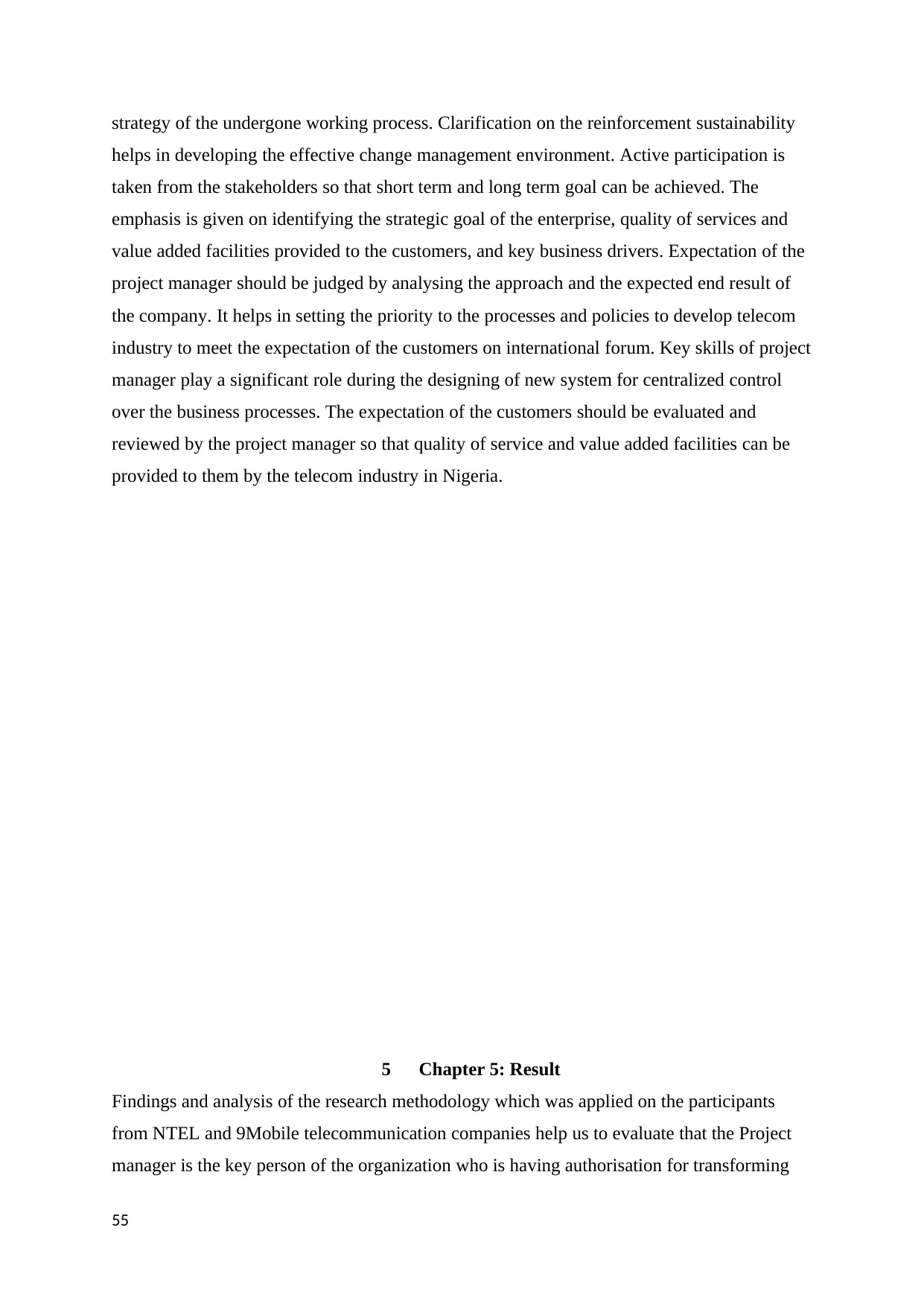
strategy of the undergone working process. Clarification on the reinforcement sustainability
helps in developing the effective change management environment. Active participation is
taken from the stakeholders so that short term and long term goal can be achieved. The
emphasis is given on identifying the strategic goal of the enterprise, quality of services and
value added facilities provided to the customers, and key business drivers. Expectation of the
project manager should be judged by analysing the approach and the expected end result of
the company. It helps in setting the priority to the processes and policies to develop telecom
industry to meet the expectation of the customers on international forum. Key skills of project
manager play a significant role during the designing of new system for centralized control
over the business processes. The expectation of the customers should be evaluated and
reviewed by the project manager so that quality of service and value added facilities can be
provided to them by the telecom industry in Nigeria.
5 Chapter 5: Result
Findings and analysis of the research methodology which was applied on the participants
from NTEL and 9Mobile telecommunication companies help us to evaluate that the Project
manager is the key person of the organization who is having authorisation for transforming
55
helps in developing the effective change management environment. Active participation is
taken from the stakeholders so that short term and long term goal can be achieved. The
emphasis is given on identifying the strategic goal of the enterprise, quality of services and
value added facilities provided to the customers, and key business drivers. Expectation of the
project manager should be judged by analysing the approach and the expected end result of
the company. It helps in setting the priority to the processes and policies to develop telecom
industry to meet the expectation of the customers on international forum. Key skills of project
manager play a significant role during the designing of new system for centralized control
over the business processes. The expectation of the customers should be evaluated and
reviewed by the project manager so that quality of service and value added facilities can be
provided to them by the telecom industry in Nigeria.
5 Chapter 5: Result
Findings and analysis of the research methodology which was applied on the participants
from NTEL and 9Mobile telecommunication companies help us to evaluate that the Project
manager is the key person of the organization who is having authorisation for transforming
55
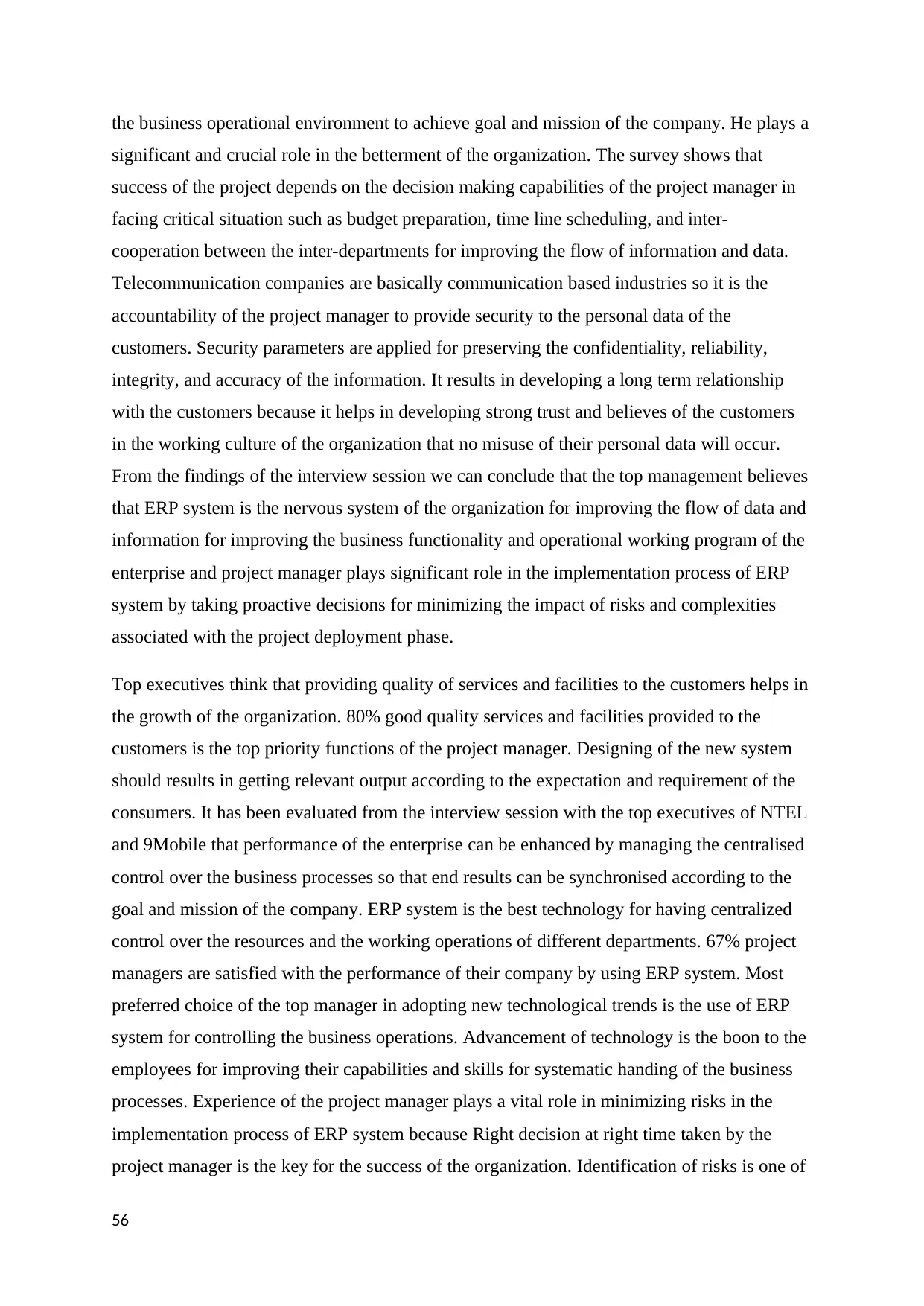
the business operational environment to achieve goal and mission of the company. He plays a
significant and crucial role in the betterment of the organization. The survey shows that
success of the project depends on the decision making capabilities of the project manager in
facing critical situation such as budget preparation, time line scheduling, and inter-
cooperation between the inter-departments for improving the flow of information and data.
Telecommunication companies are basically communication based industries so it is the
accountability of the project manager to provide security to the personal data of the
customers. Security parameters are applied for preserving the confidentiality, reliability,
integrity, and accuracy of the information. It results in developing a long term relationship
with the customers because it helps in developing strong trust and believes of the customers
in the working culture of the organization that no misuse of their personal data will occur.
From the findings of the interview session we can conclude that the top management believes
that ERP system is the nervous system of the organization for improving the flow of data and
information for improving the business functionality and operational working program of the
enterprise and project manager plays significant role in the implementation process of ERP
system by taking proactive decisions for minimizing the impact of risks and complexities
associated with the project deployment phase.
Top executives think that providing quality of services and facilities to the customers helps in
the growth of the organization. 80% good quality services and facilities provided to the
customers is the top priority functions of the project manager. Designing of the new system
should results in getting relevant output according to the expectation and requirement of the
consumers. It has been evaluated from the interview session with the top executives of NTEL
and 9Mobile that performance of the enterprise can be enhanced by managing the centralised
control over the business processes so that end results can be synchronised according to the
goal and mission of the company. ERP system is the best technology for having centralized
control over the resources and the working operations of different departments. 67% project
managers are satisfied with the performance of their company by using ERP system. Most
preferred choice of the top manager in adopting new technological trends is the use of ERP
system for controlling the business operations. Advancement of technology is the boon to the
employees for improving their capabilities and skills for systematic handing of the business
processes. Experience of the project manager plays a vital role in minimizing risks in the
implementation process of ERP system because Right decision at right time taken by the
project manager is the key for the success of the organization. Identification of risks is one of
56
significant and crucial role in the betterment of the organization. The survey shows that
success of the project depends on the decision making capabilities of the project manager in
facing critical situation such as budget preparation, time line scheduling, and inter-
cooperation between the inter-departments for improving the flow of information and data.
Telecommunication companies are basically communication based industries so it is the
accountability of the project manager to provide security to the personal data of the
customers. Security parameters are applied for preserving the confidentiality, reliability,
integrity, and accuracy of the information. It results in developing a long term relationship
with the customers because it helps in developing strong trust and believes of the customers
in the working culture of the organization that no misuse of their personal data will occur.
From the findings of the interview session we can conclude that the top management believes
that ERP system is the nervous system of the organization for improving the flow of data and
information for improving the business functionality and operational working program of the
enterprise and project manager plays significant role in the implementation process of ERP
system by taking proactive decisions for minimizing the impact of risks and complexities
associated with the project deployment phase.
Top executives think that providing quality of services and facilities to the customers helps in
the growth of the organization. 80% good quality services and facilities provided to the
customers is the top priority functions of the project manager. Designing of the new system
should results in getting relevant output according to the expectation and requirement of the
consumers. It has been evaluated from the interview session with the top executives of NTEL
and 9Mobile that performance of the enterprise can be enhanced by managing the centralised
control over the business processes so that end results can be synchronised according to the
goal and mission of the company. ERP system is the best technology for having centralized
control over the resources and the working operations of different departments. 67% project
managers are satisfied with the performance of their company by using ERP system. Most
preferred choice of the top manager in adopting new technological trends is the use of ERP
system for controlling the business operations. Advancement of technology is the boon to the
employees for improving their capabilities and skills for systematic handing of the business
processes. Experience of the project manager plays a vital role in minimizing risks in the
implementation process of ERP system because Right decision at right time taken by the
project manager is the key for the success of the organization. Identification of risks is one of
56
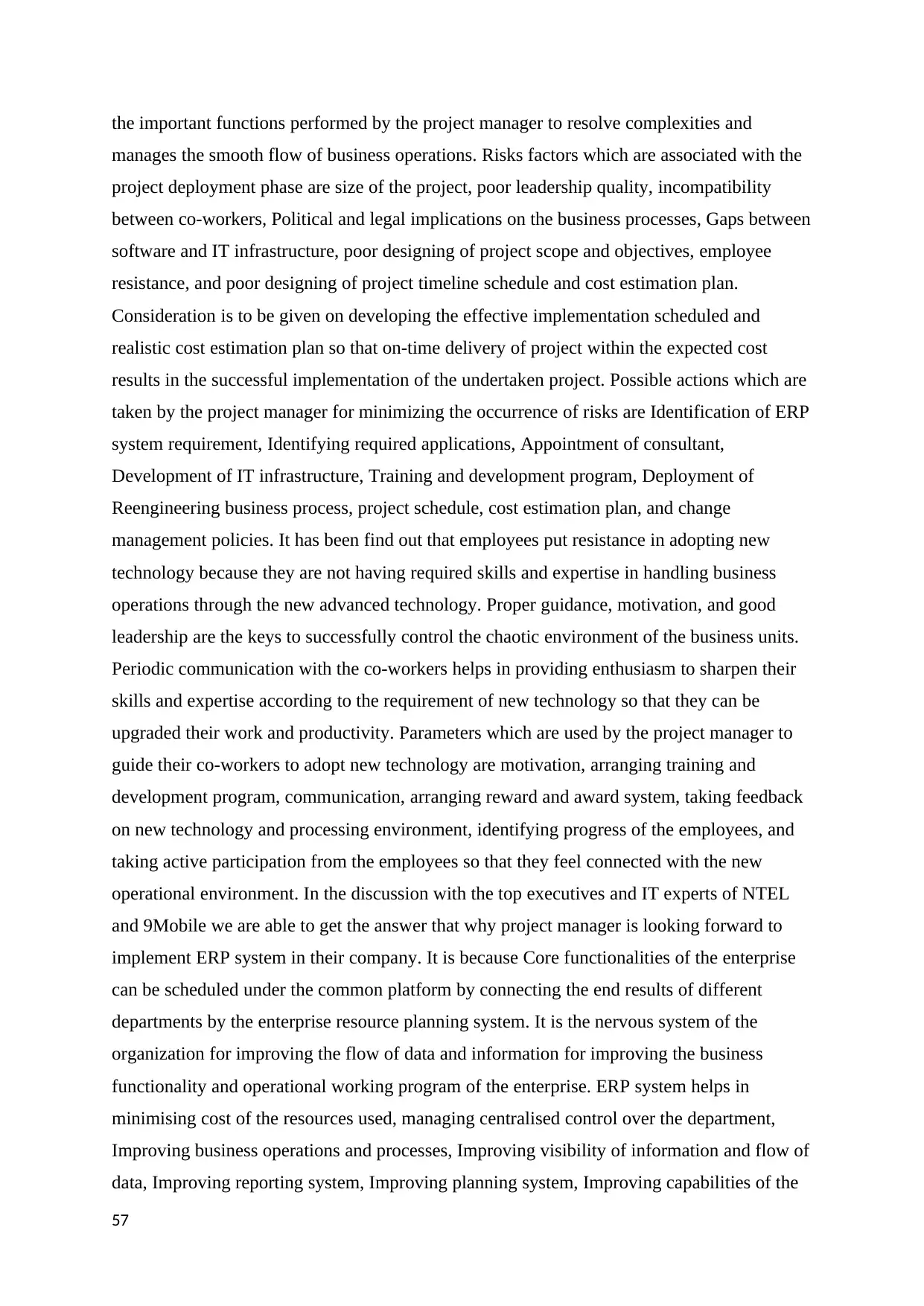
the important functions performed by the project manager to resolve complexities and
manages the smooth flow of business operations. Risks factors which are associated with the
project deployment phase are size of the project, poor leadership quality, incompatibility
between co-workers, Political and legal implications on the business processes, Gaps between
software and IT infrastructure, poor designing of project scope and objectives, employee
resistance, and poor designing of project timeline schedule and cost estimation plan.
Consideration is to be given on developing the effective implementation scheduled and
realistic cost estimation plan so that on-time delivery of project within the expected cost
results in the successful implementation of the undertaken project. Possible actions which are
taken by the project manager for minimizing the occurrence of risks are Identification of ERP
system requirement, Identifying required applications, Appointment of consultant,
Development of IT infrastructure, Training and development program, Deployment of
Reengineering business process, project schedule, cost estimation plan, and change
management policies. It has been find out that employees put resistance in adopting new
technology because they are not having required skills and expertise in handling business
operations through the new advanced technology. Proper guidance, motivation, and good
leadership are the keys to successfully control the chaotic environment of the business units.
Periodic communication with the co-workers helps in providing enthusiasm to sharpen their
skills and expertise according to the requirement of new technology so that they can be
upgraded their work and productivity. Parameters which are used by the project manager to
guide their co-workers to adopt new technology are motivation, arranging training and
development program, communication, arranging reward and award system, taking feedback
on new technology and processing environment, identifying progress of the employees, and
taking active participation from the employees so that they feel connected with the new
operational environment. In the discussion with the top executives and IT experts of NTEL
and 9Mobile we are able to get the answer that why project manager is looking forward to
implement ERP system in their company. It is because Core functionalities of the enterprise
can be scheduled under the common platform by connecting the end results of different
departments by the enterprise resource planning system. It is the nervous system of the
organization for improving the flow of data and information for improving the business
functionality and operational working program of the enterprise. ERP system helps in
minimising cost of the resources used, managing centralised control over the department,
Improving business operations and processes, Improving visibility of information and flow of
data, Improving reporting system, Improving planning system, Improving capabilities of the
57
manages the smooth flow of business operations. Risks factors which are associated with the
project deployment phase are size of the project, poor leadership quality, incompatibility
between co-workers, Political and legal implications on the business processes, Gaps between
software and IT infrastructure, poor designing of project scope and objectives, employee
resistance, and poor designing of project timeline schedule and cost estimation plan.
Consideration is to be given on developing the effective implementation scheduled and
realistic cost estimation plan so that on-time delivery of project within the expected cost
results in the successful implementation of the undertaken project. Possible actions which are
taken by the project manager for minimizing the occurrence of risks are Identification of ERP
system requirement, Identifying required applications, Appointment of consultant,
Development of IT infrastructure, Training and development program, Deployment of
Reengineering business process, project schedule, cost estimation plan, and change
management policies. It has been find out that employees put resistance in adopting new
technology because they are not having required skills and expertise in handling business
operations through the new advanced technology. Proper guidance, motivation, and good
leadership are the keys to successfully control the chaotic environment of the business units.
Periodic communication with the co-workers helps in providing enthusiasm to sharpen their
skills and expertise according to the requirement of new technology so that they can be
upgraded their work and productivity. Parameters which are used by the project manager to
guide their co-workers to adopt new technology are motivation, arranging training and
development program, communication, arranging reward and award system, taking feedback
on new technology and processing environment, identifying progress of the employees, and
taking active participation from the employees so that they feel connected with the new
operational environment. In the discussion with the top executives and IT experts of NTEL
and 9Mobile we are able to get the answer that why project manager is looking forward to
implement ERP system in their company. It is because Core functionalities of the enterprise
can be scheduled under the common platform by connecting the end results of different
departments by the enterprise resource planning system. It is the nervous system of the
organization for improving the flow of data and information for improving the business
functionality and operational working program of the enterprise. ERP system helps in
minimising cost of the resources used, managing centralised control over the department,
Improving business operations and processes, Improving visibility of information and flow of
data, Improving reporting system, Improving planning system, Improving capabilities of the
57
Secure Best Marks with AI Grader
Need help grading? Try our AI Grader for instant feedback on your assignments.
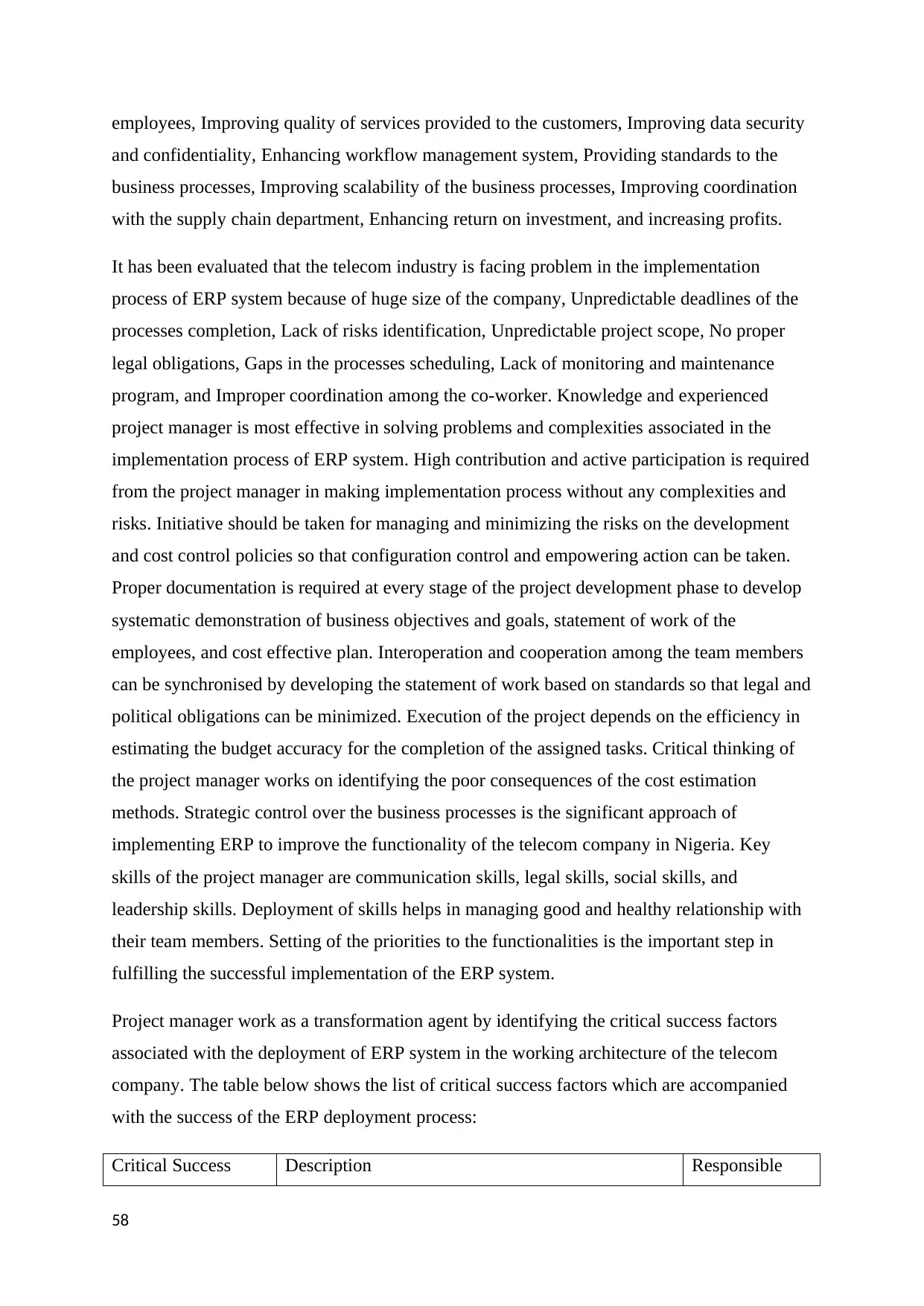
employees, Improving quality of services provided to the customers, Improving data security
and confidentiality, Enhancing workflow management system, Providing standards to the
business processes, Improving scalability of the business processes, Improving coordination
with the supply chain department, Enhancing return on investment, and increasing profits.
It has been evaluated that the telecom industry is facing problem in the implementation
process of ERP system because of huge size of the company, Unpredictable deadlines of the
processes completion, Lack of risks identification, Unpredictable project scope, No proper
legal obligations, Gaps in the processes scheduling, Lack of monitoring and maintenance
program, and Improper coordination among the co-worker. Knowledge and experienced
project manager is most effective in solving problems and complexities associated in the
implementation process of ERP system. High contribution and active participation is required
from the project manager in making implementation process without any complexities and
risks. Initiative should be taken for managing and minimizing the risks on the development
and cost control policies so that configuration control and empowering action can be taken.
Proper documentation is required at every stage of the project development phase to develop
systematic demonstration of business objectives and goals, statement of work of the
employees, and cost effective plan. Interoperation and cooperation among the team members
can be synchronised by developing the statement of work based on standards so that legal and
political obligations can be minimized. Execution of the project depends on the efficiency in
estimating the budget accuracy for the completion of the assigned tasks. Critical thinking of
the project manager works on identifying the poor consequences of the cost estimation
methods. Strategic control over the business processes is the significant approach of
implementing ERP to improve the functionality of the telecom company in Nigeria. Key
skills of the project manager are communication skills, legal skills, social skills, and
leadership skills. Deployment of skills helps in managing good and healthy relationship with
their team members. Setting of the priorities to the functionalities is the important step in
fulfilling the successful implementation of the ERP system.
Project manager work as a transformation agent by identifying the critical success factors
associated with the deployment of ERP system in the working architecture of the telecom
company. The table below shows the list of critical success factors which are accompanied
with the success of the ERP deployment process:
Critical Success Description Responsible
58
and confidentiality, Enhancing workflow management system, Providing standards to the
business processes, Improving scalability of the business processes, Improving coordination
with the supply chain department, Enhancing return on investment, and increasing profits.
It has been evaluated that the telecom industry is facing problem in the implementation
process of ERP system because of huge size of the company, Unpredictable deadlines of the
processes completion, Lack of risks identification, Unpredictable project scope, No proper
legal obligations, Gaps in the processes scheduling, Lack of monitoring and maintenance
program, and Improper coordination among the co-worker. Knowledge and experienced
project manager is most effective in solving problems and complexities associated in the
implementation process of ERP system. High contribution and active participation is required
from the project manager in making implementation process without any complexities and
risks. Initiative should be taken for managing and minimizing the risks on the development
and cost control policies so that configuration control and empowering action can be taken.
Proper documentation is required at every stage of the project development phase to develop
systematic demonstration of business objectives and goals, statement of work of the
employees, and cost effective plan. Interoperation and cooperation among the team members
can be synchronised by developing the statement of work based on standards so that legal and
political obligations can be minimized. Execution of the project depends on the efficiency in
estimating the budget accuracy for the completion of the assigned tasks. Critical thinking of
the project manager works on identifying the poor consequences of the cost estimation
methods. Strategic control over the business processes is the significant approach of
implementing ERP to improve the functionality of the telecom company in Nigeria. Key
skills of the project manager are communication skills, legal skills, social skills, and
leadership skills. Deployment of skills helps in managing good and healthy relationship with
their team members. Setting of the priorities to the functionalities is the important step in
fulfilling the successful implementation of the ERP system.
Project manager work as a transformation agent by identifying the critical success factors
associated with the deployment of ERP system in the working architecture of the telecom
company. The table below shows the list of critical success factors which are accompanied
with the success of the ERP deployment process:
Critical Success Description Responsible
58
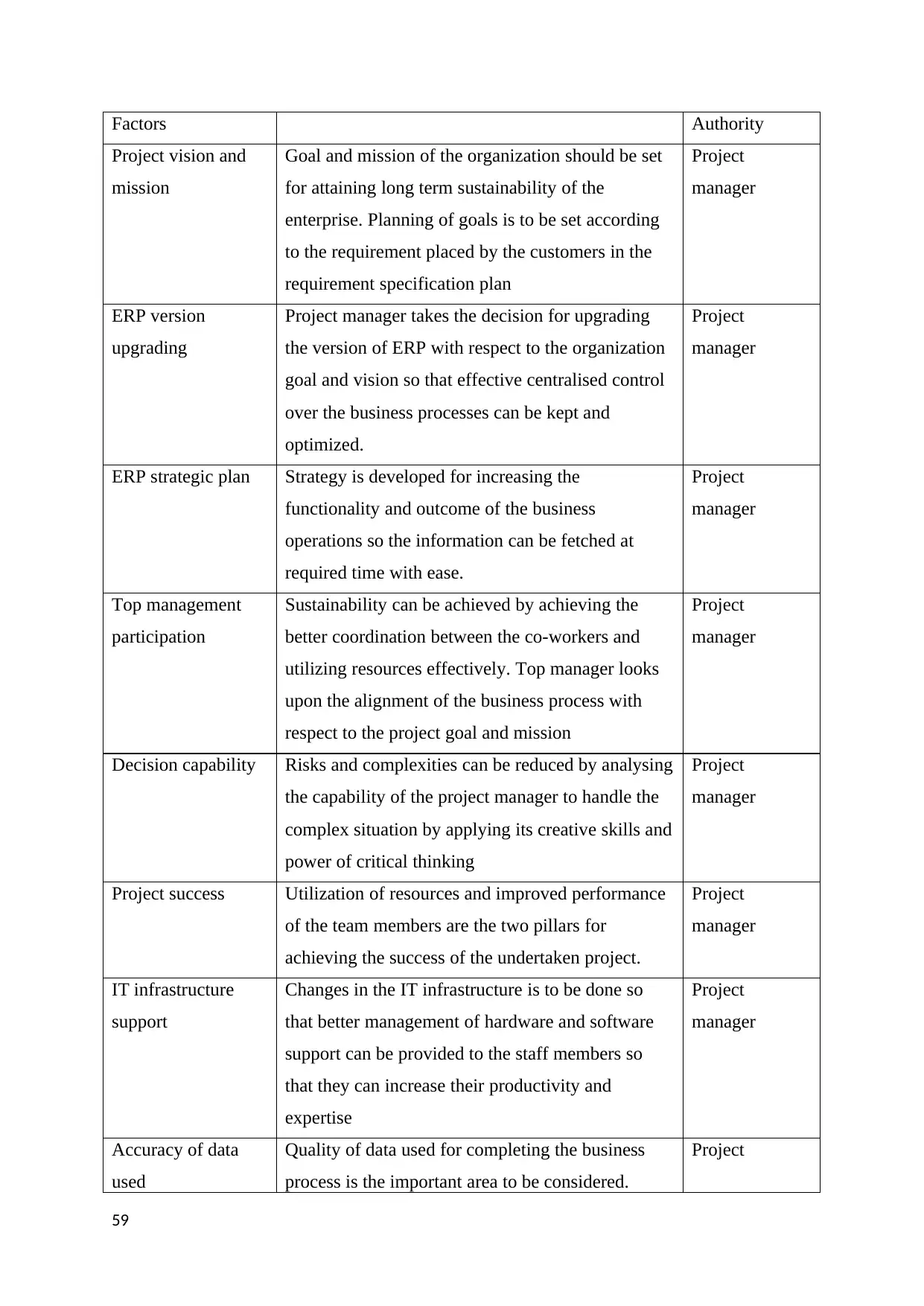
Factors Authority
Project vision and
mission
Goal and mission of the organization should be set
for attaining long term sustainability of the
enterprise. Planning of goals is to be set according
to the requirement placed by the customers in the
requirement specification plan
Project
manager
ERP version
upgrading
Project manager takes the decision for upgrading
the version of ERP with respect to the organization
goal and vision so that effective centralised control
over the business processes can be kept and
optimized.
Project
manager
ERP strategic plan Strategy is developed for increasing the
functionality and outcome of the business
operations so the information can be fetched at
required time with ease.
Project
manager
Top management
participation
Sustainability can be achieved by achieving the
better coordination between the co-workers and
utilizing resources effectively. Top manager looks
upon the alignment of the business process with
respect to the project goal and mission
Project
manager
Decision capability Risks and complexities can be reduced by analysing
the capability of the project manager to handle the
complex situation by applying its creative skills and
power of critical thinking
Project
manager
Project success Utilization of resources and improved performance
of the team members are the two pillars for
achieving the success of the undertaken project.
Project
manager
IT infrastructure
support
Changes in the IT infrastructure is to be done so
that better management of hardware and software
support can be provided to the staff members so
that they can increase their productivity and
expertise
Project
manager
Accuracy of data
used
Quality of data used for completing the business
process is the important area to be considered.
Project
59
Project vision and
mission
Goal and mission of the organization should be set
for attaining long term sustainability of the
enterprise. Planning of goals is to be set according
to the requirement placed by the customers in the
requirement specification plan
Project
manager
ERP version
upgrading
Project manager takes the decision for upgrading
the version of ERP with respect to the organization
goal and vision so that effective centralised control
over the business processes can be kept and
optimized.
Project
manager
ERP strategic plan Strategy is developed for increasing the
functionality and outcome of the business
operations so the information can be fetched at
required time with ease.
Project
manager
Top management
participation
Sustainability can be achieved by achieving the
better coordination between the co-workers and
utilizing resources effectively. Top manager looks
upon the alignment of the business process with
respect to the project goal and mission
Project
manager
Decision capability Risks and complexities can be reduced by analysing
the capability of the project manager to handle the
complex situation by applying its creative skills and
power of critical thinking
Project
manager
Project success Utilization of resources and improved performance
of the team members are the two pillars for
achieving the success of the undertaken project.
Project
manager
IT infrastructure
support
Changes in the IT infrastructure is to be done so
that better management of hardware and software
support can be provided to the staff members so
that they can increase their productivity and
expertise
Project
manager
Accuracy of data
used
Quality of data used for completing the business
process is the important area to be considered.
Project
59
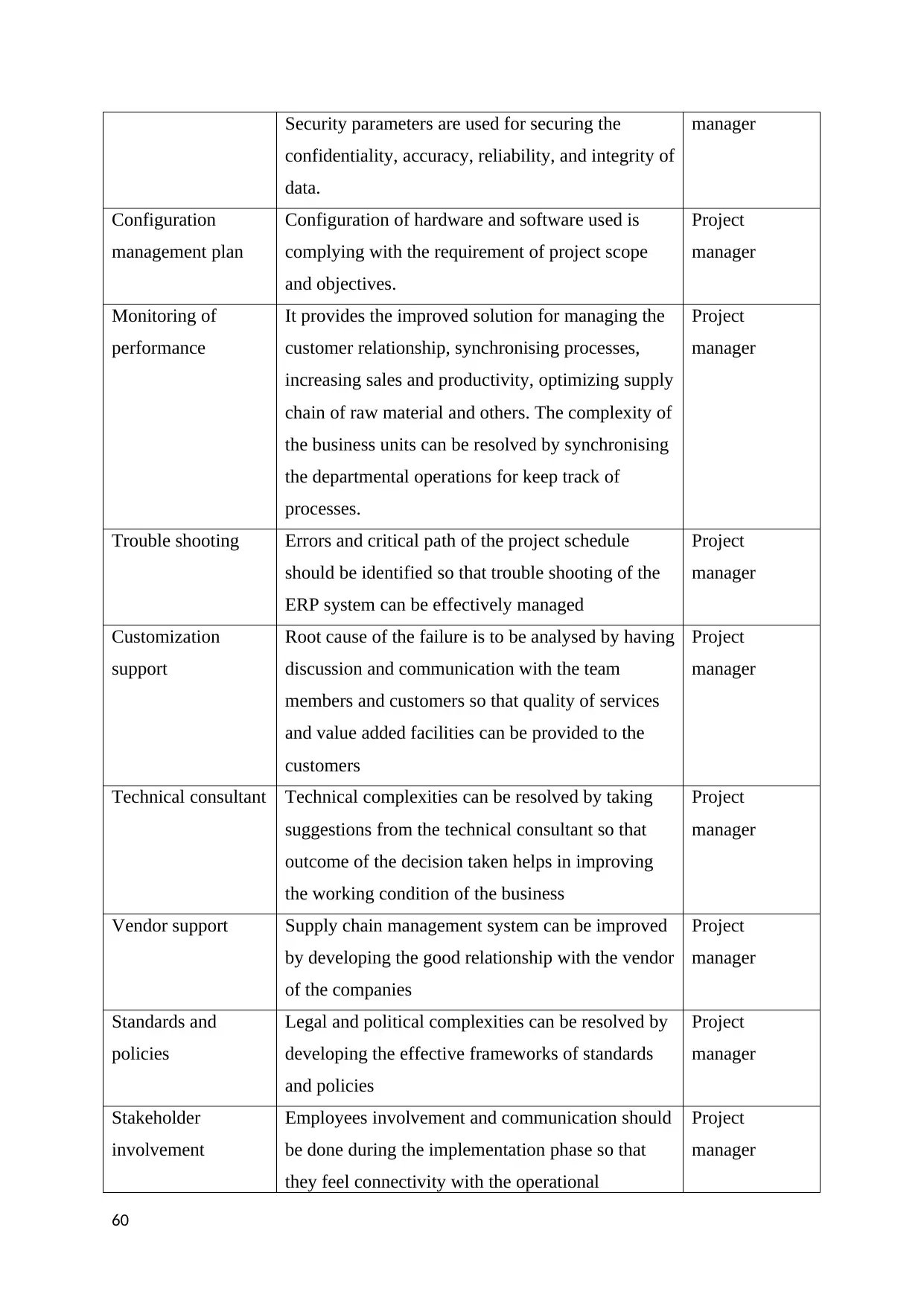
Security parameters are used for securing the
confidentiality, accuracy, reliability, and integrity of
data.
manager
Configuration
management plan
Configuration of hardware and software used is
complying with the requirement of project scope
and objectives.
Project
manager
Monitoring of
performance
It provides the improved solution for managing the
customer relationship, synchronising processes,
increasing sales and productivity, optimizing supply
chain of raw material and others. The complexity of
the business units can be resolved by synchronising
the departmental operations for keep track of
processes.
Project
manager
Trouble shooting Errors and critical path of the project schedule
should be identified so that trouble shooting of the
ERP system can be effectively managed
Project
manager
Customization
support
Root cause of the failure is to be analysed by having
discussion and communication with the team
members and customers so that quality of services
and value added facilities can be provided to the
customers
Project
manager
Technical consultant Technical complexities can be resolved by taking
suggestions from the technical consultant so that
outcome of the decision taken helps in improving
the working condition of the business
Project
manager
Vendor support Supply chain management system can be improved
by developing the good relationship with the vendor
of the companies
Project
manager
Standards and
policies
Legal and political complexities can be resolved by
developing the effective frameworks of standards
and policies
Project
manager
Stakeholder
involvement
Employees involvement and communication should
be done during the implementation phase so that
they feel connectivity with the operational
Project
manager
60
confidentiality, accuracy, reliability, and integrity of
data.
manager
Configuration
management plan
Configuration of hardware and software used is
complying with the requirement of project scope
and objectives.
Project
manager
Monitoring of
performance
It provides the improved solution for managing the
customer relationship, synchronising processes,
increasing sales and productivity, optimizing supply
chain of raw material and others. The complexity of
the business units can be resolved by synchronising
the departmental operations for keep track of
processes.
Project
manager
Trouble shooting Errors and critical path of the project schedule
should be identified so that trouble shooting of the
ERP system can be effectively managed
Project
manager
Customization
support
Root cause of the failure is to be analysed by having
discussion and communication with the team
members and customers so that quality of services
and value added facilities can be provided to the
customers
Project
manager
Technical consultant Technical complexities can be resolved by taking
suggestions from the technical consultant so that
outcome of the decision taken helps in improving
the working condition of the business
Project
manager
Vendor support Supply chain management system can be improved
by developing the good relationship with the vendor
of the companies
Project
manager
Standards and
policies
Legal and political complexities can be resolved by
developing the effective frameworks of standards
and policies
Project
manager
Stakeholder
involvement
Employees involvement and communication should
be done during the implementation phase so that
they feel connectivity with the operational
Project
manager
60
Paraphrase This Document
Need a fresh take? Get an instant paraphrase of this document with our AI Paraphraser
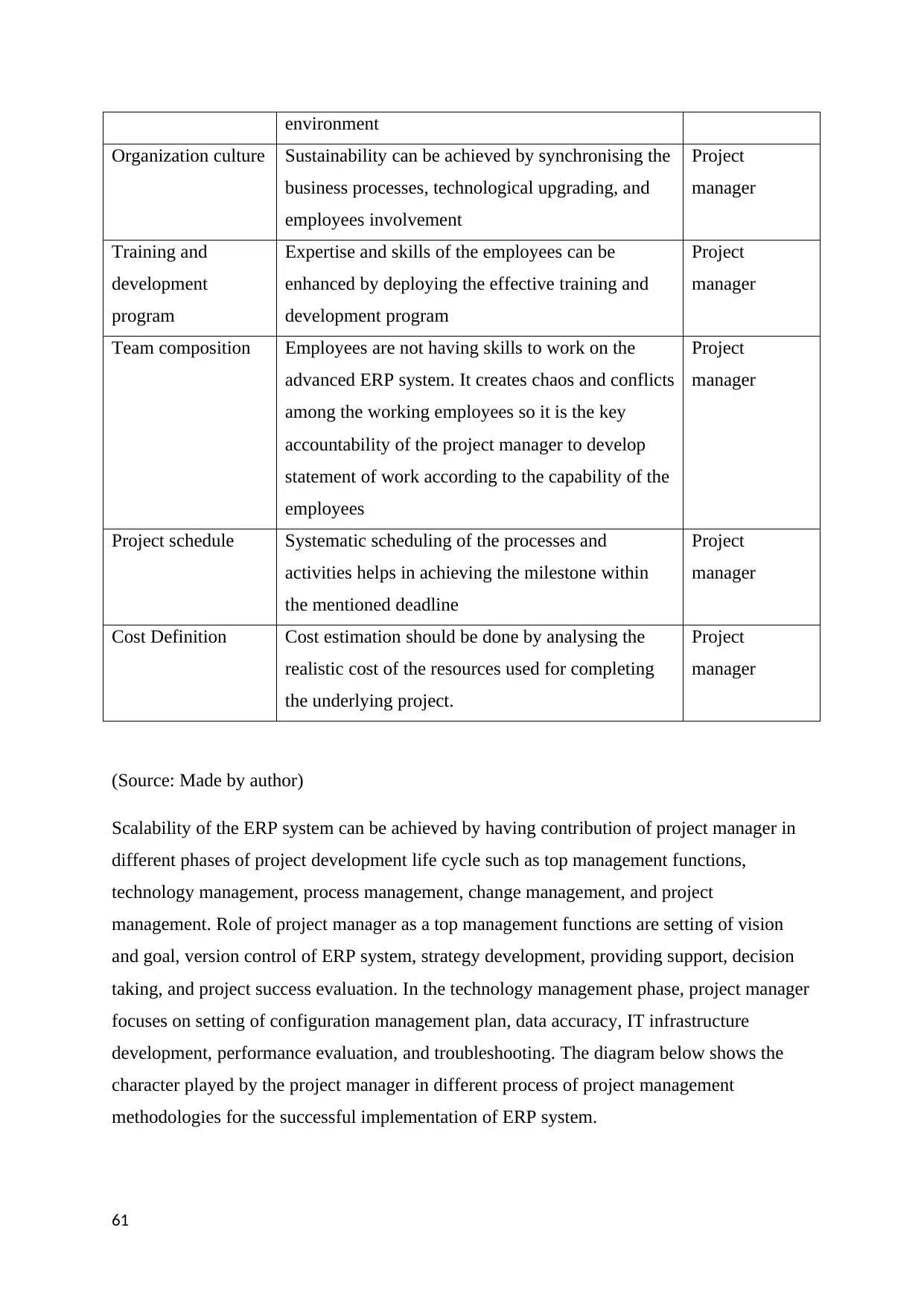
environment
Organization culture Sustainability can be achieved by synchronising the
business processes, technological upgrading, and
employees involvement
Project
manager
Training and
development
program
Expertise and skills of the employees can be
enhanced by deploying the effective training and
development program
Project
manager
Team composition Employees are not having skills to work on the
advanced ERP system. It creates chaos and conflicts
among the working employees so it is the key
accountability of the project manager to develop
statement of work according to the capability of the
employees
Project
manager
Project schedule Systematic scheduling of the processes and
activities helps in achieving the milestone within
the mentioned deadline
Project
manager
Cost Definition Cost estimation should be done by analysing the
realistic cost of the resources used for completing
the underlying project.
Project
manager
(Source: Made by author)
Scalability of the ERP system can be achieved by having contribution of project manager in
different phases of project development life cycle such as top management functions,
technology management, process management, change management, and project
management. Role of project manager as a top management functions are setting of vision
and goal, version control of ERP system, strategy development, providing support, decision
taking, and project success evaluation. In the technology management phase, project manager
focuses on setting of configuration management plan, data accuracy, IT infrastructure
development, performance evaluation, and troubleshooting. The diagram below shows the
character played by the project manager in different process of project management
methodologies for the successful implementation of ERP system.
61
Organization culture Sustainability can be achieved by synchronising the
business processes, technological upgrading, and
employees involvement
Project
manager
Training and
development
program
Expertise and skills of the employees can be
enhanced by deploying the effective training and
development program
Project
manager
Team composition Employees are not having skills to work on the
advanced ERP system. It creates chaos and conflicts
among the working employees so it is the key
accountability of the project manager to develop
statement of work according to the capability of the
employees
Project
manager
Project schedule Systematic scheduling of the processes and
activities helps in achieving the milestone within
the mentioned deadline
Project
manager
Cost Definition Cost estimation should be done by analysing the
realistic cost of the resources used for completing
the underlying project.
Project
manager
(Source: Made by author)
Scalability of the ERP system can be achieved by having contribution of project manager in
different phases of project development life cycle such as top management functions,
technology management, process management, change management, and project
management. Role of project manager as a top management functions are setting of vision
and goal, version control of ERP system, strategy development, providing support, decision
taking, and project success evaluation. In the technology management phase, project manager
focuses on setting of configuration management plan, data accuracy, IT infrastructure
development, performance evaluation, and troubleshooting. The diagram below shows the
character played by the project manager in different process of project management
methodologies for the successful implementation of ERP system.
61
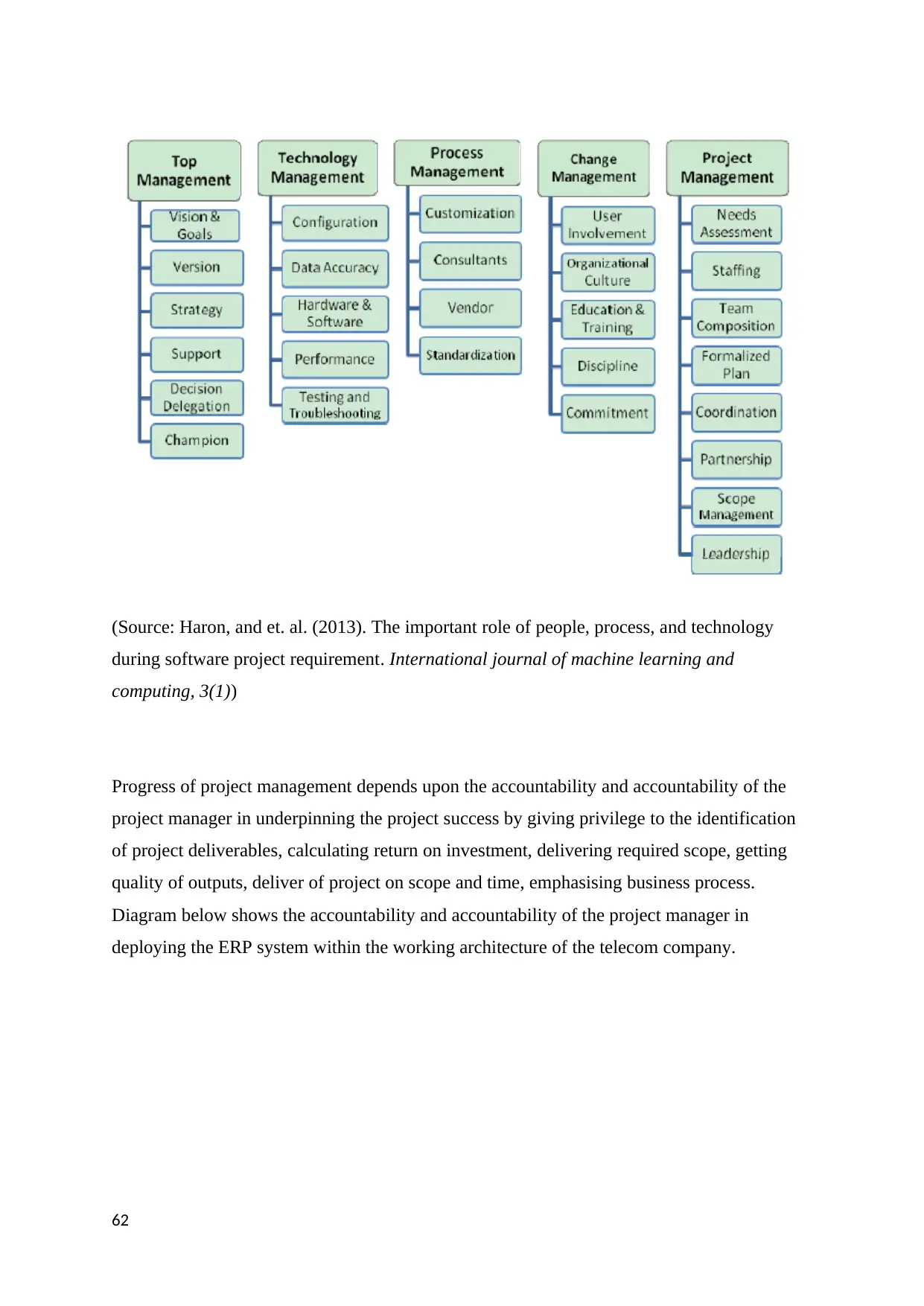
(Source: Haron, and et. al. (2013). The important role of people, process, and technology
during software project requirement. International journal of machine learning and
computing, 3(1))
Progress of project management depends upon the accountability and accountability of the
project manager in underpinning the project success by giving privilege to the identification
of project deliverables, calculating return on investment, delivering required scope, getting
quality of outputs, deliver of project on scope and time, emphasising business process.
Diagram below shows the accountability and accountability of the project manager in
deploying the ERP system within the working architecture of the telecom company.
62
during software project requirement. International journal of machine learning and
computing, 3(1))
Progress of project management depends upon the accountability and accountability of the
project manager in underpinning the project success by giving privilege to the identification
of project deliverables, calculating return on investment, delivering required scope, getting
quality of outputs, deliver of project on scope and time, emphasising business process.
Diagram below shows the accountability and accountability of the project manager in
deploying the ERP system within the working architecture of the telecom company.
62
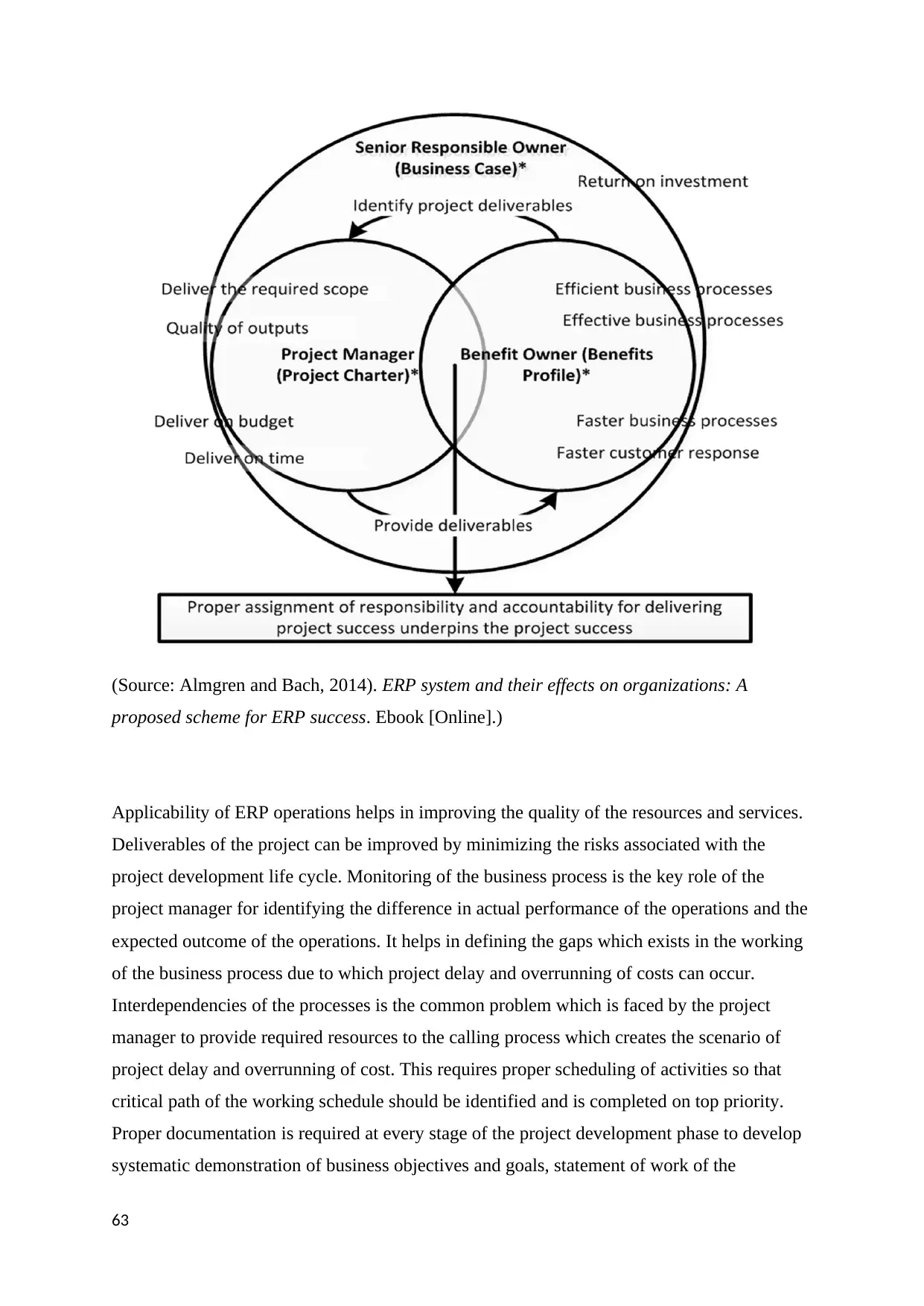
(Source: Almgren and Bach, 2014). ERP system and their effects on organizations: A
proposed scheme for ERP success. Ebook [Online].)
Applicability of ERP operations helps in improving the quality of the resources and services.
Deliverables of the project can be improved by minimizing the risks associated with the
project development life cycle. Monitoring of the business process is the key role of the
project manager for identifying the difference in actual performance of the operations and the
expected outcome of the operations. It helps in defining the gaps which exists in the working
of the business process due to which project delay and overrunning of costs can occur.
Interdependencies of the processes is the common problem which is faced by the project
manager to provide required resources to the calling process which creates the scenario of
project delay and overrunning of cost. This requires proper scheduling of activities so that
critical path of the working schedule should be identified and is completed on top priority.
Proper documentation is required at every stage of the project development phase to develop
systematic demonstration of business objectives and goals, statement of work of the
63
proposed scheme for ERP success. Ebook [Online].)
Applicability of ERP operations helps in improving the quality of the resources and services.
Deliverables of the project can be improved by minimizing the risks associated with the
project development life cycle. Monitoring of the business process is the key role of the
project manager for identifying the difference in actual performance of the operations and the
expected outcome of the operations. It helps in defining the gaps which exists in the working
of the business process due to which project delay and overrunning of costs can occur.
Interdependencies of the processes is the common problem which is faced by the project
manager to provide required resources to the calling process which creates the scenario of
project delay and overrunning of cost. This requires proper scheduling of activities so that
critical path of the working schedule should be identified and is completed on top priority.
Proper documentation is required at every stage of the project development phase to develop
systematic demonstration of business objectives and goals, statement of work of the
63
Secure Best Marks with AI Grader
Need help grading? Try our AI Grader for instant feedback on your assignments.

employees, and cost effective plan. Interoperation and cooperation among the team members
can be synchronised by developing the statement of work based on standards so that legal and
political obligations can be minimized. Consideration is to be given on developing the
effective implementation scheduled and realistic cost estimation plan so that on-time delivery
of project within the expected cost results in the successful implementation of the undertaken
project.
64
can be synchronised by developing the statement of work based on standards so that legal and
political obligations can be minimized. Consideration is to be given on developing the
effective implementation scheduled and realistic cost estimation plan so that on-time delivery
of project within the expected cost results in the successful implementation of the undertaken
project.
64
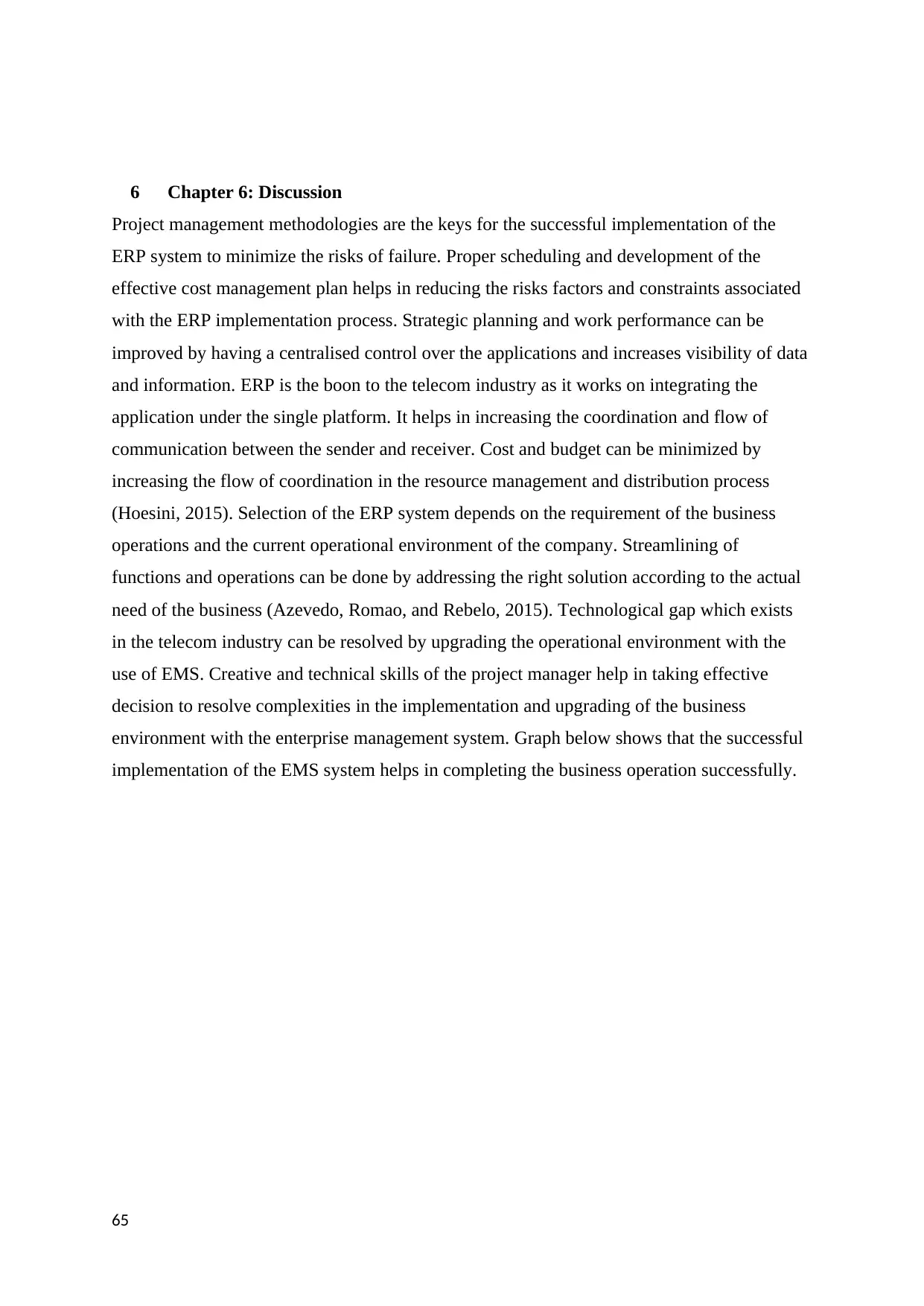
6 Chapter 6: Discussion
Project management methodologies are the keys for the successful implementation of the
ERP system to minimize the risks of failure. Proper scheduling and development of the
effective cost management plan helps in reducing the risks factors and constraints associated
with the ERP implementation process. Strategic planning and work performance can be
improved by having a centralised control over the applications and increases visibility of data
and information. ERP is the boon to the telecom industry as it works on integrating the
application under the single platform. It helps in increasing the coordination and flow of
communication between the sender and receiver. Cost and budget can be minimized by
increasing the flow of coordination in the resource management and distribution process
(Hoesini, 2015). Selection of the ERP system depends on the requirement of the business
operations and the current operational environment of the company. Streamlining of
functions and operations can be done by addressing the right solution according to the actual
need of the business (Azevedo, Romao, and Rebelo, 2015). Technological gap which exists
in the telecom industry can be resolved by upgrading the operational environment with the
use of EMS. Creative and technical skills of the project manager help in taking effective
decision to resolve complexities in the implementation and upgrading of the business
environment with the enterprise management system. Graph below shows that the successful
implementation of the EMS system helps in completing the business operation successfully.
65
Project management methodologies are the keys for the successful implementation of the
ERP system to minimize the risks of failure. Proper scheduling and development of the
effective cost management plan helps in reducing the risks factors and constraints associated
with the ERP implementation process. Strategic planning and work performance can be
improved by having a centralised control over the applications and increases visibility of data
and information. ERP is the boon to the telecom industry as it works on integrating the
application under the single platform. It helps in increasing the coordination and flow of
communication between the sender and receiver. Cost and budget can be minimized by
increasing the flow of coordination in the resource management and distribution process
(Hoesini, 2015). Selection of the ERP system depends on the requirement of the business
operations and the current operational environment of the company. Streamlining of
functions and operations can be done by addressing the right solution according to the actual
need of the business (Azevedo, Romao, and Rebelo, 2015). Technological gap which exists
in the telecom industry can be resolved by upgrading the operational environment with the
use of EMS. Creative and technical skills of the project manager help in taking effective
decision to resolve complexities in the implementation and upgrading of the business
environment with the enterprise management system. Graph below shows that the successful
implementation of the EMS system helps in completing the business operation successfully.
65
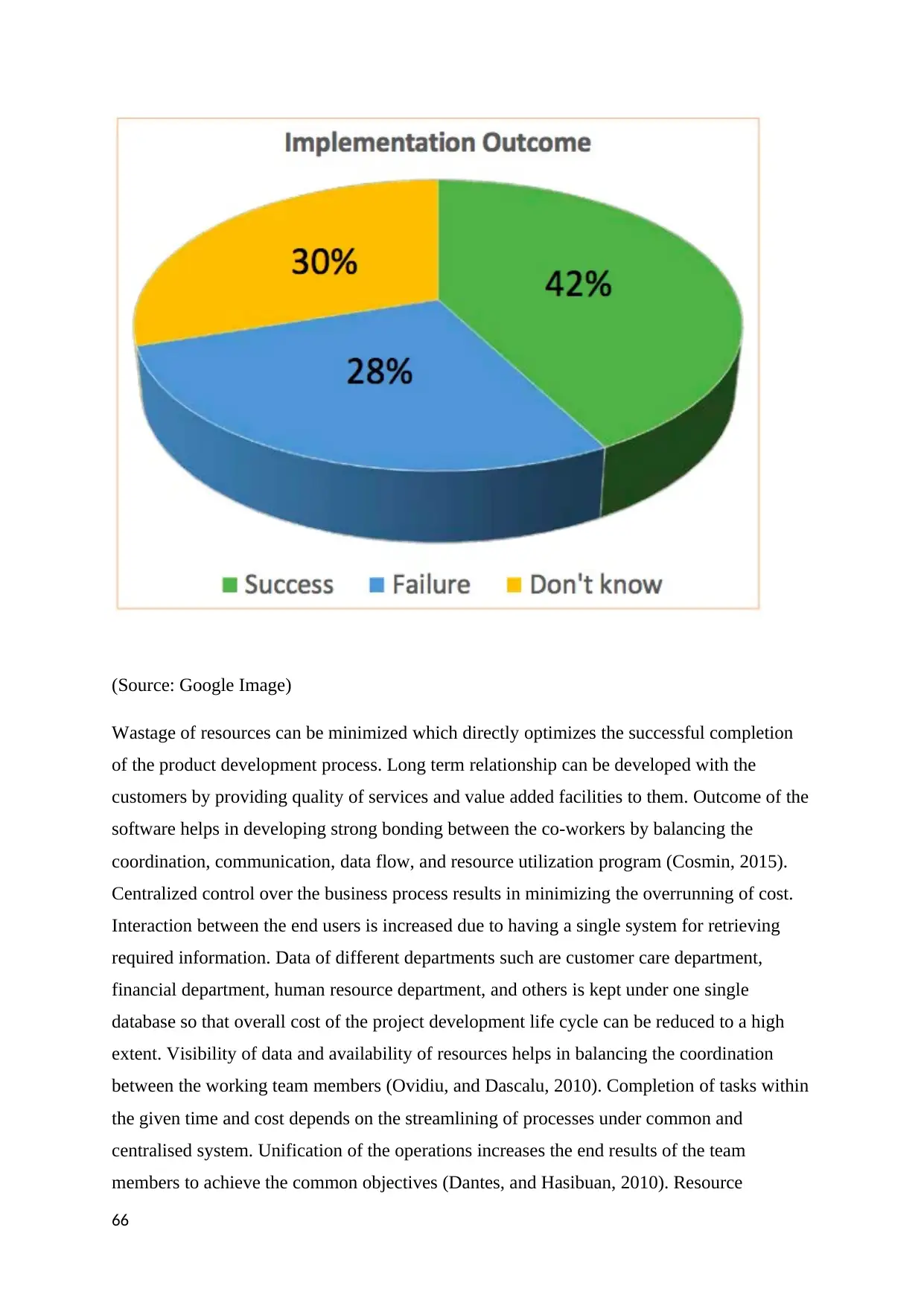
(Source: Google Image)
Wastage of resources can be minimized which directly optimizes the successful completion
of the product development process. Long term relationship can be developed with the
customers by providing quality of services and value added facilities to them. Outcome of the
software helps in developing strong bonding between the co-workers by balancing the
coordination, communication, data flow, and resource utilization program (Cosmin, 2015).
Centralized control over the business process results in minimizing the overrunning of cost.
Interaction between the end users is increased due to having a single system for retrieving
required information. Data of different departments such are customer care department,
financial department, human resource department, and others is kept under one single
database so that overall cost of the project development life cycle can be reduced to a high
extent. Visibility of data and availability of resources helps in balancing the coordination
between the working team members (Ovidiu, and Dascalu, 2010). Completion of tasks within
the given time and cost depends on the streamlining of processes under common and
centralised system. Unification of the operations increases the end results of the team
members to achieve the common objectives (Dantes, and Hasibuan, 2010). Resource
66
Wastage of resources can be minimized which directly optimizes the successful completion
of the product development process. Long term relationship can be developed with the
customers by providing quality of services and value added facilities to them. Outcome of the
software helps in developing strong bonding between the co-workers by balancing the
coordination, communication, data flow, and resource utilization program (Cosmin, 2015).
Centralized control over the business process results in minimizing the overrunning of cost.
Interaction between the end users is increased due to having a single system for retrieving
required information. Data of different departments such are customer care department,
financial department, human resource department, and others is kept under one single
database so that overall cost of the project development life cycle can be reduced to a high
extent. Visibility of data and availability of resources helps in balancing the coordination
between the working team members (Ovidiu, and Dascalu, 2010). Completion of tasks within
the given time and cost depends on the streamlining of processes under common and
centralised system. Unification of the operations increases the end results of the team
members to achieve the common objectives (Dantes, and Hasibuan, 2010). Resource
66
Paraphrase This Document
Need a fresh take? Get an instant paraphrase of this document with our AI Paraphraser
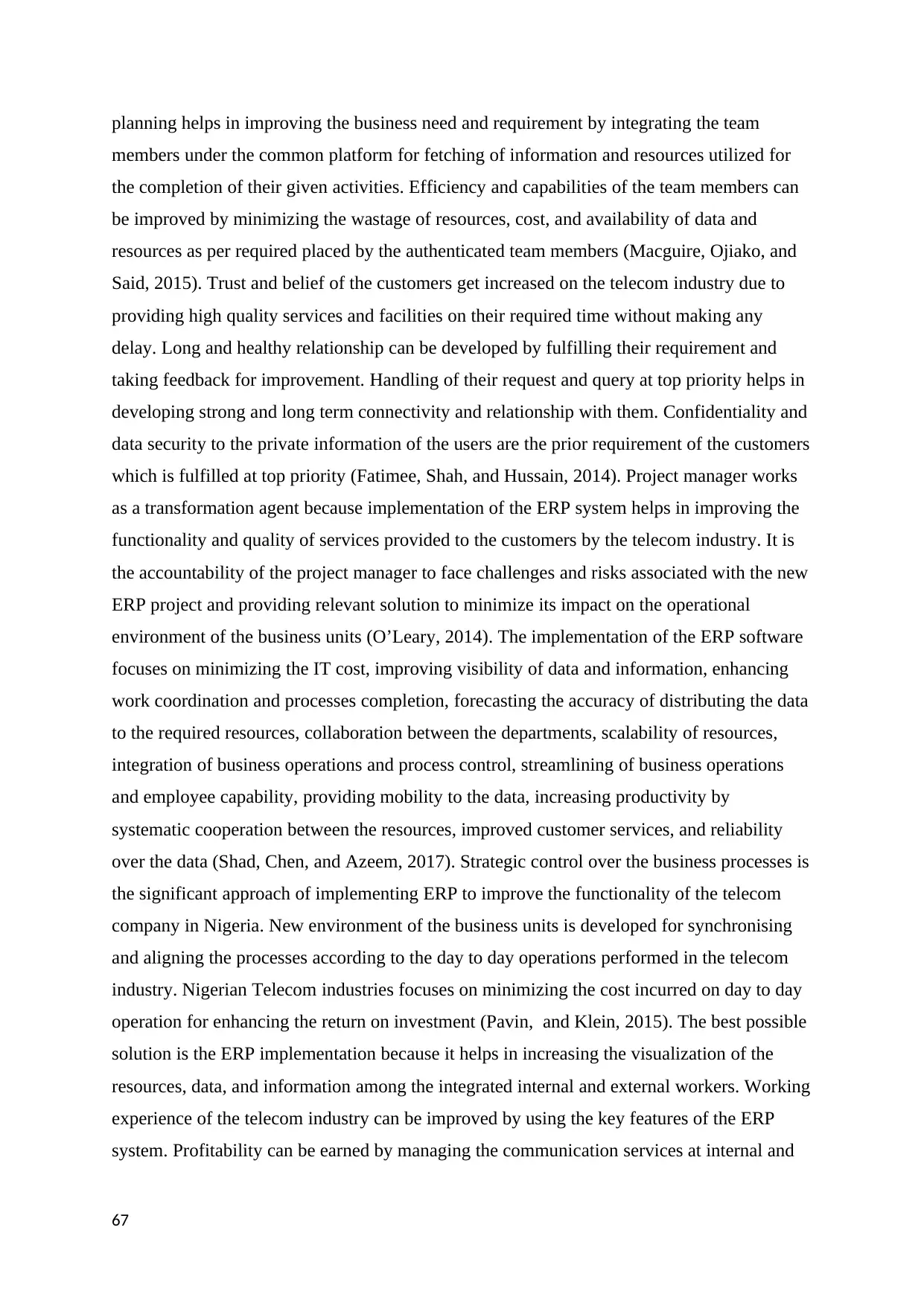
planning helps in improving the business need and requirement by integrating the team
members under the common platform for fetching of information and resources utilized for
the completion of their given activities. Efficiency and capabilities of the team members can
be improved by minimizing the wastage of resources, cost, and availability of data and
resources as per required placed by the authenticated team members (Macguire, Ojiako, and
Said, 2015). Trust and belief of the customers get increased on the telecom industry due to
providing high quality services and facilities on their required time without making any
delay. Long and healthy relationship can be developed by fulfilling their requirement and
taking feedback for improvement. Handling of their request and query at top priority helps in
developing strong and long term connectivity and relationship with them. Confidentiality and
data security to the private information of the users are the prior requirement of the customers
which is fulfilled at top priority (Fatimee, Shah, and Hussain, 2014). Project manager works
as a transformation agent because implementation of the ERP system helps in improving the
functionality and quality of services provided to the customers by the telecom industry. It is
the accountability of the project manager to face challenges and risks associated with the new
ERP project and providing relevant solution to minimize its impact on the operational
environment of the business units (O’Leary, 2014). The implementation of the ERP software
focuses on minimizing the IT cost, improving visibility of data and information, enhancing
work coordination and processes completion, forecasting the accuracy of distributing the data
to the required resources, collaboration between the departments, scalability of resources,
integration of business operations and process control, streamlining of business operations
and employee capability, providing mobility to the data, increasing productivity by
systematic cooperation between the resources, improved customer services, and reliability
over the data (Shad, Chen, and Azeem, 2017). Strategic control over the business processes is
the significant approach of implementing ERP to improve the functionality of the telecom
company in Nigeria. New environment of the business units is developed for synchronising
and aligning the processes according to the day to day operations performed in the telecom
industry. Nigerian Telecom industries focuses on minimizing the cost incurred on day to day
operation for enhancing the return on investment (Pavin, and Klein, 2015). The best possible
solution is the ERP implementation because it helps in increasing the visualization of the
resources, data, and information among the integrated internal and external workers. Working
experience of the telecom industry can be improved by using the key features of the ERP
system. Profitability can be earned by managing the communication services at internal and
67
members under the common platform for fetching of information and resources utilized for
the completion of their given activities. Efficiency and capabilities of the team members can
be improved by minimizing the wastage of resources, cost, and availability of data and
resources as per required placed by the authenticated team members (Macguire, Ojiako, and
Said, 2015). Trust and belief of the customers get increased on the telecom industry due to
providing high quality services and facilities on their required time without making any
delay. Long and healthy relationship can be developed by fulfilling their requirement and
taking feedback for improvement. Handling of their request and query at top priority helps in
developing strong and long term connectivity and relationship with them. Confidentiality and
data security to the private information of the users are the prior requirement of the customers
which is fulfilled at top priority (Fatimee, Shah, and Hussain, 2014). Project manager works
as a transformation agent because implementation of the ERP system helps in improving the
functionality and quality of services provided to the customers by the telecom industry. It is
the accountability of the project manager to face challenges and risks associated with the new
ERP project and providing relevant solution to minimize its impact on the operational
environment of the business units (O’Leary, 2014). The implementation of the ERP software
focuses on minimizing the IT cost, improving visibility of data and information, enhancing
work coordination and processes completion, forecasting the accuracy of distributing the data
to the required resources, collaboration between the departments, scalability of resources,
integration of business operations and process control, streamlining of business operations
and employee capability, providing mobility to the data, increasing productivity by
systematic cooperation between the resources, improved customer services, and reliability
over the data (Shad, Chen, and Azeem, 2017). Strategic control over the business processes is
the significant approach of implementing ERP to improve the functionality of the telecom
company in Nigeria. New environment of the business units is developed for synchronising
and aligning the processes according to the day to day operations performed in the telecom
industry. Nigerian Telecom industries focuses on minimizing the cost incurred on day to day
operation for enhancing the return on investment (Pavin, and Klein, 2015). The best possible
solution is the ERP implementation because it helps in increasing the visualization of the
resources, data, and information among the integrated internal and external workers. Working
experience of the telecom industry can be improved by using the key features of the ERP
system. Profitability can be earned by managing the communication services at internal and
67
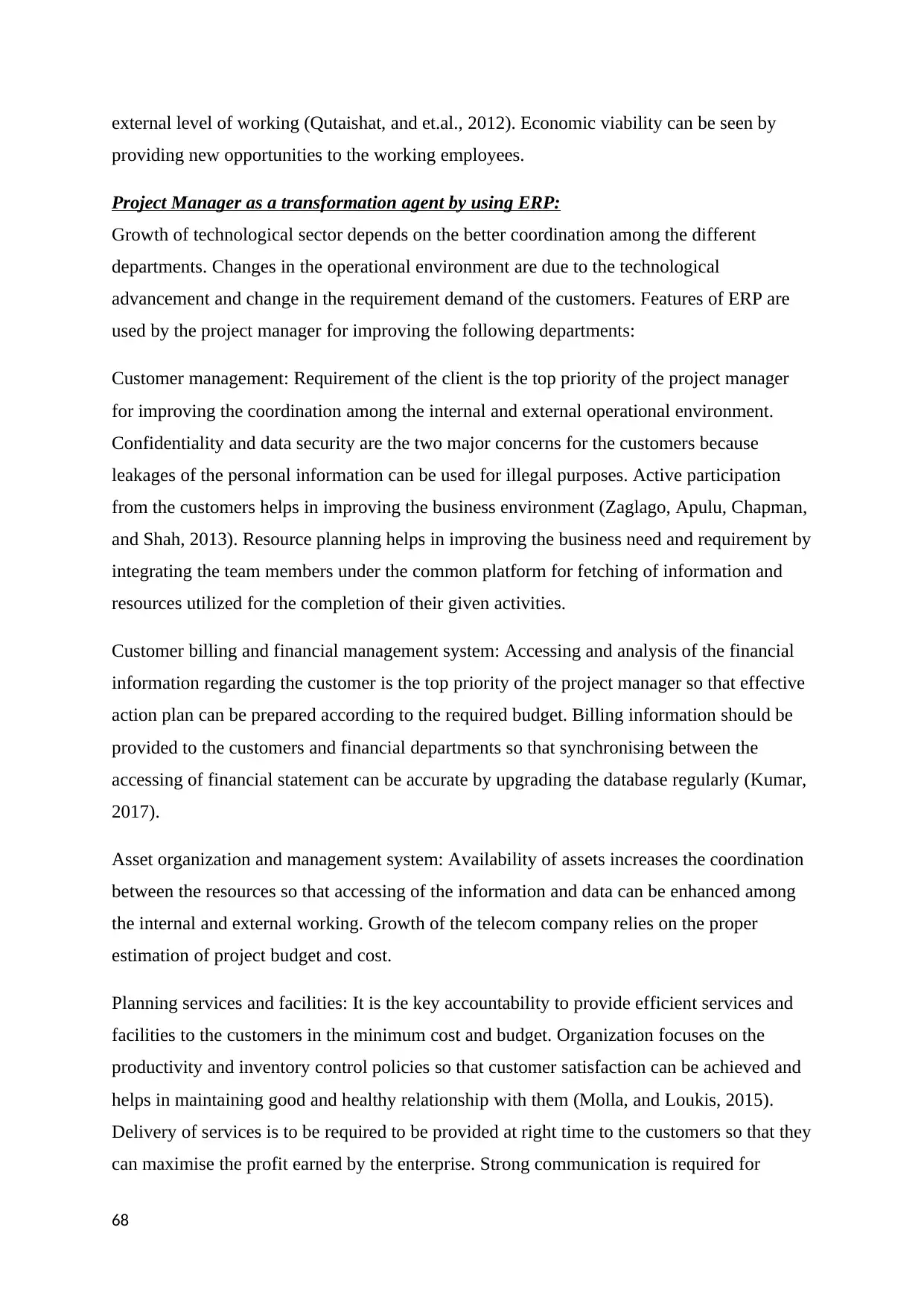
external level of working (Qutaishat, and et.al., 2012). Economic viability can be seen by
providing new opportunities to the working employees.
Project Manager as a transformation agent by using ERP:
Growth of technological sector depends on the better coordination among the different
departments. Changes in the operational environment are due to the technological
advancement and change in the requirement demand of the customers. Features of ERP are
used by the project manager for improving the following departments:
Customer management: Requirement of the client is the top priority of the project manager
for improving the coordination among the internal and external operational environment.
Confidentiality and data security are the two major concerns for the customers because
leakages of the personal information can be used for illegal purposes. Active participation
from the customers helps in improving the business environment (Zaglago, Apulu, Chapman,
and Shah, 2013). Resource planning helps in improving the business need and requirement by
integrating the team members under the common platform for fetching of information and
resources utilized for the completion of their given activities.
Customer billing and financial management system: Accessing and analysis of the financial
information regarding the customer is the top priority of the project manager so that effective
action plan can be prepared according to the required budget. Billing information should be
provided to the customers and financial departments so that synchronising between the
accessing of financial statement can be accurate by upgrading the database regularly (Kumar,
2017).
Asset organization and management system: Availability of assets increases the coordination
between the resources so that accessing of the information and data can be enhanced among
the internal and external working. Growth of the telecom company relies on the proper
estimation of project budget and cost.
Planning services and facilities: It is the key accountability to provide efficient services and
facilities to the customers in the minimum cost and budget. Organization focuses on the
productivity and inventory control policies so that customer satisfaction can be achieved and
helps in maintaining good and healthy relationship with them (Molla, and Loukis, 2015).
Delivery of services is to be required to be provided at right time to the customers so that they
can maximise the profit earned by the enterprise. Strong communication is required for
68
providing new opportunities to the working employees.
Project Manager as a transformation agent by using ERP:
Growth of technological sector depends on the better coordination among the different
departments. Changes in the operational environment are due to the technological
advancement and change in the requirement demand of the customers. Features of ERP are
used by the project manager for improving the following departments:
Customer management: Requirement of the client is the top priority of the project manager
for improving the coordination among the internal and external operational environment.
Confidentiality and data security are the two major concerns for the customers because
leakages of the personal information can be used for illegal purposes. Active participation
from the customers helps in improving the business environment (Zaglago, Apulu, Chapman,
and Shah, 2013). Resource planning helps in improving the business need and requirement by
integrating the team members under the common platform for fetching of information and
resources utilized for the completion of their given activities.
Customer billing and financial management system: Accessing and analysis of the financial
information regarding the customer is the top priority of the project manager so that effective
action plan can be prepared according to the required budget. Billing information should be
provided to the customers and financial departments so that synchronising between the
accessing of financial statement can be accurate by upgrading the database regularly (Kumar,
2017).
Asset organization and management system: Availability of assets increases the coordination
between the resources so that accessing of the information and data can be enhanced among
the internal and external working. Growth of the telecom company relies on the proper
estimation of project budget and cost.
Planning services and facilities: It is the key accountability to provide efficient services and
facilities to the customers in the minimum cost and budget. Organization focuses on the
productivity and inventory control policies so that customer satisfaction can be achieved and
helps in maintaining good and healthy relationship with them (Molla, and Loukis, 2015).
Delivery of services is to be required to be provided at right time to the customers so that they
can maximise the profit earned by the enterprise. Strong communication is required for
68
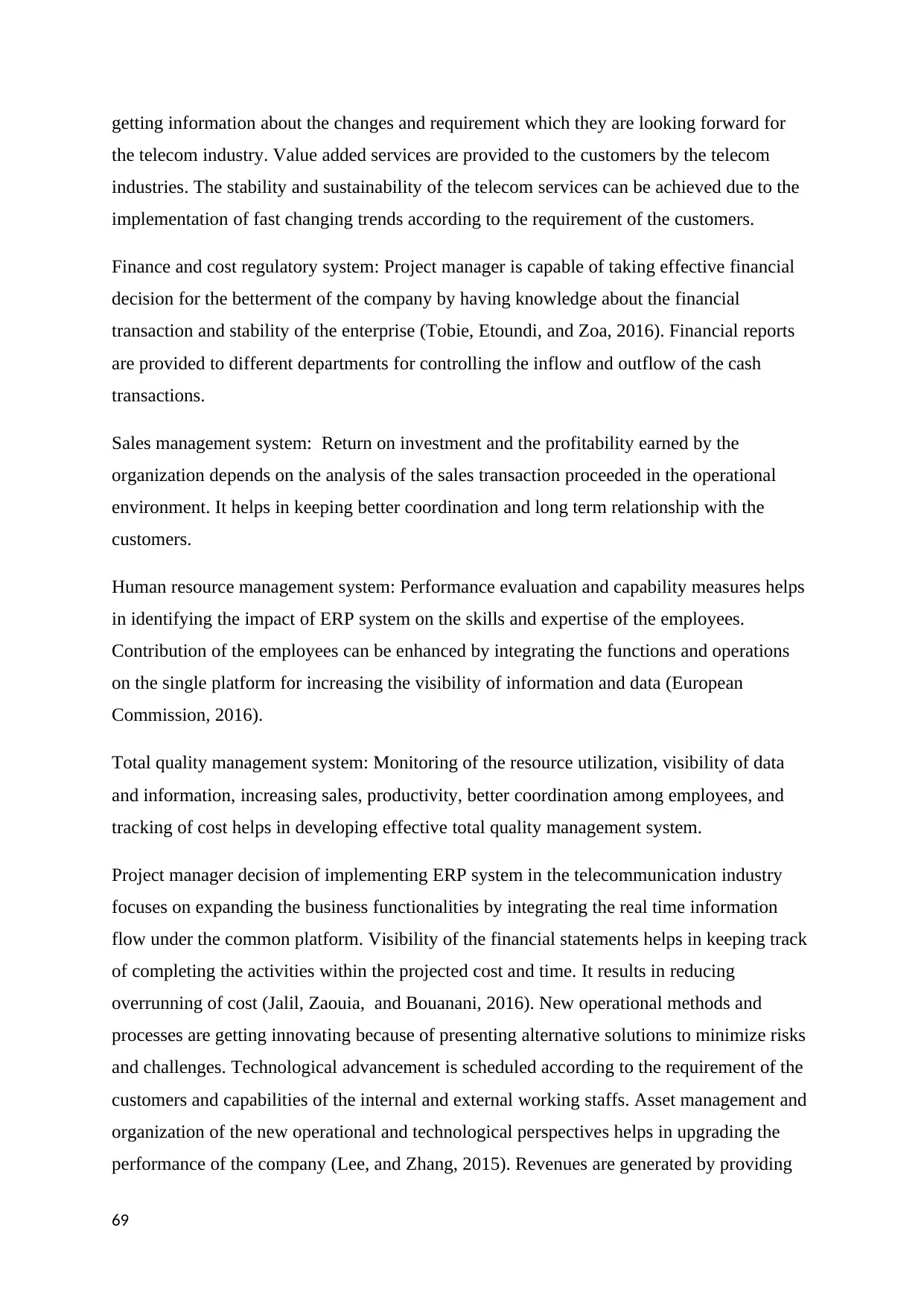
getting information about the changes and requirement which they are looking forward for
the telecom industry. Value added services are provided to the customers by the telecom
industries. The stability and sustainability of the telecom services can be achieved due to the
implementation of fast changing trends according to the requirement of the customers.
Finance and cost regulatory system: Project manager is capable of taking effective financial
decision for the betterment of the company by having knowledge about the financial
transaction and stability of the enterprise (Tobie, Etoundi, and Zoa, 2016). Financial reports
are provided to different departments for controlling the inflow and outflow of the cash
transactions.
Sales management system: Return on investment and the profitability earned by the
organization depends on the analysis of the sales transaction proceeded in the operational
environment. It helps in keeping better coordination and long term relationship with the
customers.
Human resource management system: Performance evaluation and capability measures helps
in identifying the impact of ERP system on the skills and expertise of the employees.
Contribution of the employees can be enhanced by integrating the functions and operations
on the single platform for increasing the visibility of information and data (European
Commission, 2016).
Total quality management system: Monitoring of the resource utilization, visibility of data
and information, increasing sales, productivity, better coordination among employees, and
tracking of cost helps in developing effective total quality management system.
Project manager decision of implementing ERP system in the telecommunication industry
focuses on expanding the business functionalities by integrating the real time information
flow under the common platform. Visibility of the financial statements helps in keeping track
of completing the activities within the projected cost and time. It results in reducing
overrunning of cost (Jalil, Zaouia, and Bouanani, 2016). New operational methods and
processes are getting innovating because of presenting alternative solutions to minimize risks
and challenges. Technological advancement is scheduled according to the requirement of the
customers and capabilities of the internal and external working staffs. Asset management and
organization of the new operational and technological perspectives helps in upgrading the
performance of the company (Lee, and Zhang, 2015). Revenues are generated by providing
69
the telecom industry. Value added services are provided to the customers by the telecom
industries. The stability and sustainability of the telecom services can be achieved due to the
implementation of fast changing trends according to the requirement of the customers.
Finance and cost regulatory system: Project manager is capable of taking effective financial
decision for the betterment of the company by having knowledge about the financial
transaction and stability of the enterprise (Tobie, Etoundi, and Zoa, 2016). Financial reports
are provided to different departments for controlling the inflow and outflow of the cash
transactions.
Sales management system: Return on investment and the profitability earned by the
organization depends on the analysis of the sales transaction proceeded in the operational
environment. It helps in keeping better coordination and long term relationship with the
customers.
Human resource management system: Performance evaluation and capability measures helps
in identifying the impact of ERP system on the skills and expertise of the employees.
Contribution of the employees can be enhanced by integrating the functions and operations
on the single platform for increasing the visibility of information and data (European
Commission, 2016).
Total quality management system: Monitoring of the resource utilization, visibility of data
and information, increasing sales, productivity, better coordination among employees, and
tracking of cost helps in developing effective total quality management system.
Project manager decision of implementing ERP system in the telecommunication industry
focuses on expanding the business functionalities by integrating the real time information
flow under the common platform. Visibility of the financial statements helps in keeping track
of completing the activities within the projected cost and time. It results in reducing
overrunning of cost (Jalil, Zaouia, and Bouanani, 2016). New operational methods and
processes are getting innovating because of presenting alternative solutions to minimize risks
and challenges. Technological advancement is scheduled according to the requirement of the
customers and capabilities of the internal and external working staffs. Asset management and
organization of the new operational and technological perspectives helps in upgrading the
performance of the company (Lee, and Zhang, 2015). Revenues are generated by providing
69
Secure Best Marks with AI Grader
Need help grading? Try our AI Grader for instant feedback on your assignments.
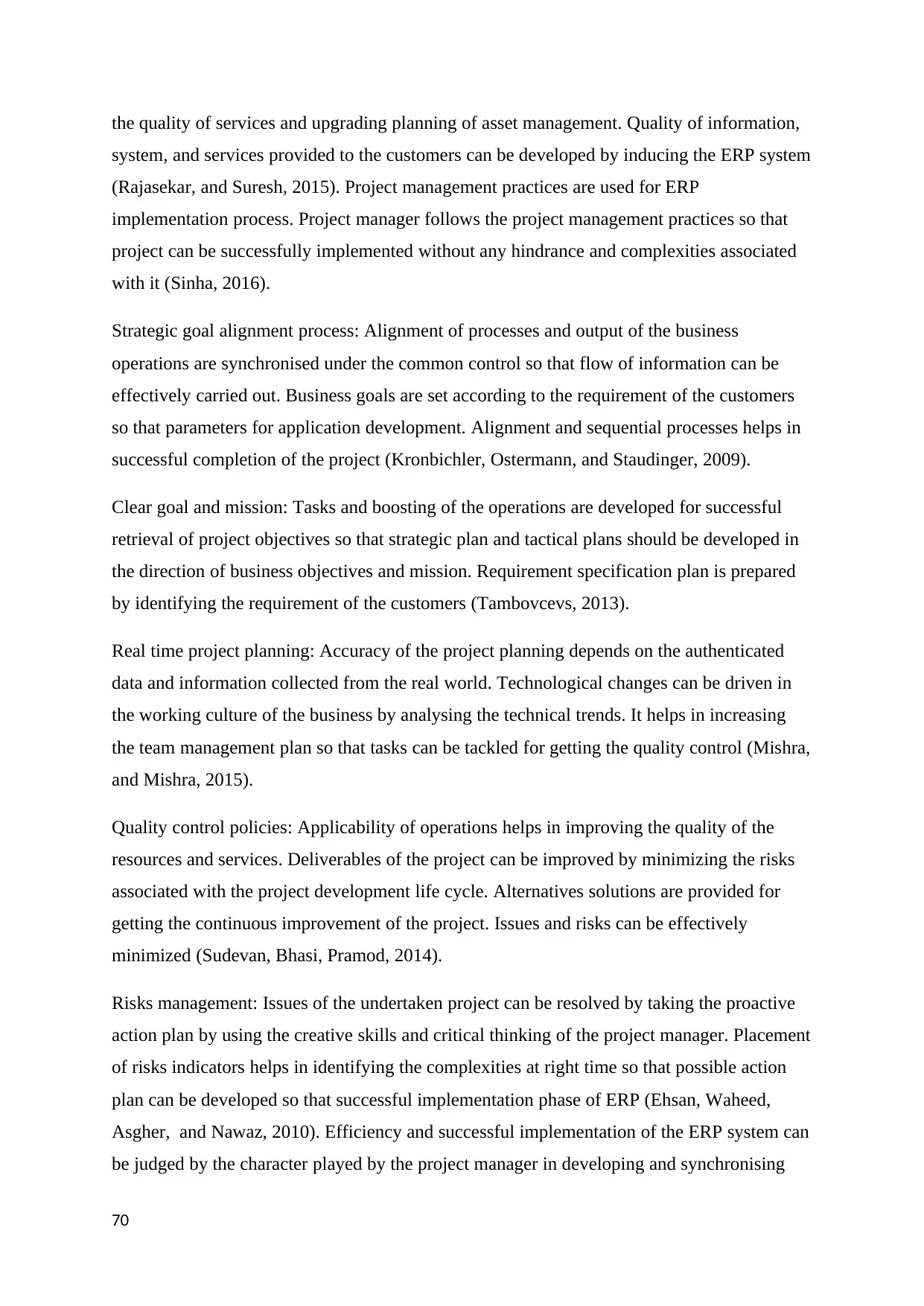
the quality of services and upgrading planning of asset management. Quality of information,
system, and services provided to the customers can be developed by inducing the ERP system
(Rajasekar, and Suresh, 2015). Project management practices are used for ERP
implementation process. Project manager follows the project management practices so that
project can be successfully implemented without any hindrance and complexities associated
with it (Sinha, 2016).
Strategic goal alignment process: Alignment of processes and output of the business
operations are synchronised under the common control so that flow of information can be
effectively carried out. Business goals are set according to the requirement of the customers
so that parameters for application development. Alignment and sequential processes helps in
successful completion of the project (Kronbichler, Ostermann, and Staudinger, 2009).
Clear goal and mission: Tasks and boosting of the operations are developed for successful
retrieval of project objectives so that strategic plan and tactical plans should be developed in
the direction of business objectives and mission. Requirement specification plan is prepared
by identifying the requirement of the customers (Tambovcevs, 2013).
Real time project planning: Accuracy of the project planning depends on the authenticated
data and information collected from the real world. Technological changes can be driven in
the working culture of the business by analysing the technical trends. It helps in increasing
the team management plan so that tasks can be tackled for getting the quality control (Mishra,
and Mishra, 2015).
Quality control policies: Applicability of operations helps in improving the quality of the
resources and services. Deliverables of the project can be improved by minimizing the risks
associated with the project development life cycle. Alternatives solutions are provided for
getting the continuous improvement of the project. Issues and risks can be effectively
minimized (Sudevan, Bhasi, Pramod, 2014).
Risks management: Issues of the undertaken project can be resolved by taking the proactive
action plan by using the creative skills and critical thinking of the project manager. Placement
of risks indicators helps in identifying the complexities at right time so that possible action
plan can be developed so that successful implementation phase of ERP (Ehsan, Waheed,
Asgher, and Nawaz, 2010). Efficiency and successful implementation of the ERP system can
be judged by the character played by the project manager in developing and synchronising
70
system, and services provided to the customers can be developed by inducing the ERP system
(Rajasekar, and Suresh, 2015). Project management practices are used for ERP
implementation process. Project manager follows the project management practices so that
project can be successfully implemented without any hindrance and complexities associated
with it (Sinha, 2016).
Strategic goal alignment process: Alignment of processes and output of the business
operations are synchronised under the common control so that flow of information can be
effectively carried out. Business goals are set according to the requirement of the customers
so that parameters for application development. Alignment and sequential processes helps in
successful completion of the project (Kronbichler, Ostermann, and Staudinger, 2009).
Clear goal and mission: Tasks and boosting of the operations are developed for successful
retrieval of project objectives so that strategic plan and tactical plans should be developed in
the direction of business objectives and mission. Requirement specification plan is prepared
by identifying the requirement of the customers (Tambovcevs, 2013).
Real time project planning: Accuracy of the project planning depends on the authenticated
data and information collected from the real world. Technological changes can be driven in
the working culture of the business by analysing the technical trends. It helps in increasing
the team management plan so that tasks can be tackled for getting the quality control (Mishra,
and Mishra, 2015).
Quality control policies: Applicability of operations helps in improving the quality of the
resources and services. Deliverables of the project can be improved by minimizing the risks
associated with the project development life cycle. Alternatives solutions are provided for
getting the continuous improvement of the project. Issues and risks can be effectively
minimized (Sudevan, Bhasi, Pramod, 2014).
Risks management: Issues of the undertaken project can be resolved by taking the proactive
action plan by using the creative skills and critical thinking of the project manager. Placement
of risks indicators helps in identifying the complexities at right time so that possible action
plan can be developed so that successful implementation phase of ERP (Ehsan, Waheed,
Asgher, and Nawaz, 2010). Efficiency and successful implementation of the ERP system can
be judged by the character played by the project manager in developing and synchronising
70
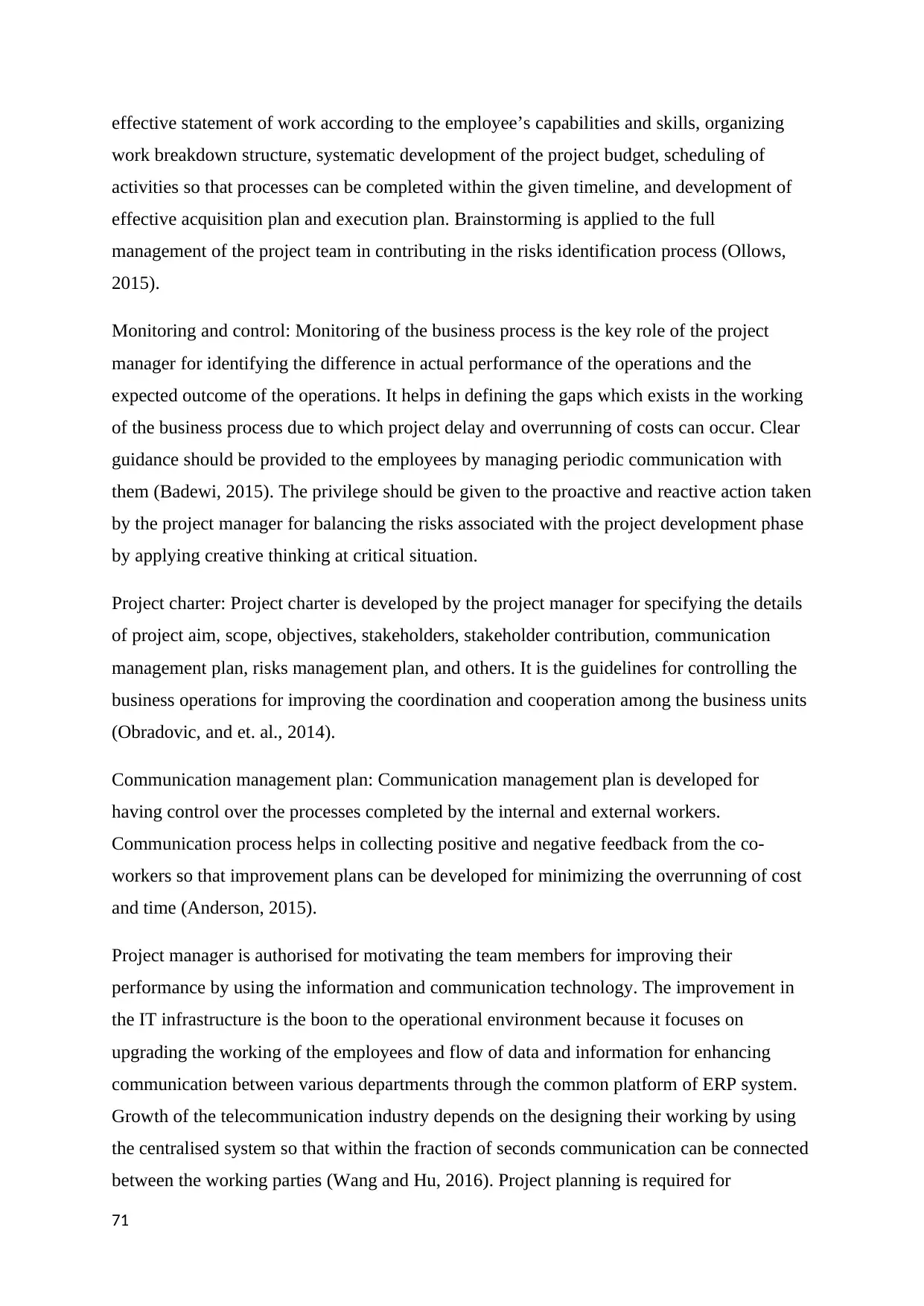
effective statement of work according to the employee’s capabilities and skills, organizing
work breakdown structure, systematic development of the project budget, scheduling of
activities so that processes can be completed within the given timeline, and development of
effective acquisition plan and execution plan. Brainstorming is applied to the full
management of the project team in contributing in the risks identification process (Ollows,
2015).
Monitoring and control: Monitoring of the business process is the key role of the project
manager for identifying the difference in actual performance of the operations and the
expected outcome of the operations. It helps in defining the gaps which exists in the working
of the business process due to which project delay and overrunning of costs can occur. Clear
guidance should be provided to the employees by managing periodic communication with
them (Badewi, 2015). The privilege should be given to the proactive and reactive action taken
by the project manager for balancing the risks associated with the project development phase
by applying creative thinking at critical situation.
Project charter: Project charter is developed by the project manager for specifying the details
of project aim, scope, objectives, stakeholders, stakeholder contribution, communication
management plan, risks management plan, and others. It is the guidelines for controlling the
business operations for improving the coordination and cooperation among the business units
(Obradovic, and et. al., 2014).
Communication management plan: Communication management plan is developed for
having control over the processes completed by the internal and external workers.
Communication process helps in collecting positive and negative feedback from the co-
workers so that improvement plans can be developed for minimizing the overrunning of cost
and time (Anderson, 2015).
Project manager is authorised for motivating the team members for improving their
performance by using the information and communication technology. The improvement in
the IT infrastructure is the boon to the operational environment because it focuses on
upgrading the working of the employees and flow of data and information for enhancing
communication between various departments through the common platform of ERP system.
Growth of the telecommunication industry depends on the designing their working by using
the centralised system so that within the fraction of seconds communication can be connected
between the working parties (Wang and Hu, 2016). Project planning is required for
71
work breakdown structure, systematic development of the project budget, scheduling of
activities so that processes can be completed within the given timeline, and development of
effective acquisition plan and execution plan. Brainstorming is applied to the full
management of the project team in contributing in the risks identification process (Ollows,
2015).
Monitoring and control: Monitoring of the business process is the key role of the project
manager for identifying the difference in actual performance of the operations and the
expected outcome of the operations. It helps in defining the gaps which exists in the working
of the business process due to which project delay and overrunning of costs can occur. Clear
guidance should be provided to the employees by managing periodic communication with
them (Badewi, 2015). The privilege should be given to the proactive and reactive action taken
by the project manager for balancing the risks associated with the project development phase
by applying creative thinking at critical situation.
Project charter: Project charter is developed by the project manager for specifying the details
of project aim, scope, objectives, stakeholders, stakeholder contribution, communication
management plan, risks management plan, and others. It is the guidelines for controlling the
business operations for improving the coordination and cooperation among the business units
(Obradovic, and et. al., 2014).
Communication management plan: Communication management plan is developed for
having control over the processes completed by the internal and external workers.
Communication process helps in collecting positive and negative feedback from the co-
workers so that improvement plans can be developed for minimizing the overrunning of cost
and time (Anderson, 2015).
Project manager is authorised for motivating the team members for improving their
performance by using the information and communication technology. The improvement in
the IT infrastructure is the boon to the operational environment because it focuses on
upgrading the working of the employees and flow of data and information for enhancing
communication between various departments through the common platform of ERP system.
Growth of the telecommunication industry depends on the designing their working by using
the centralised system so that within the fraction of seconds communication can be connected
between the working parties (Wang and Hu, 2016). Project planning is required for
71
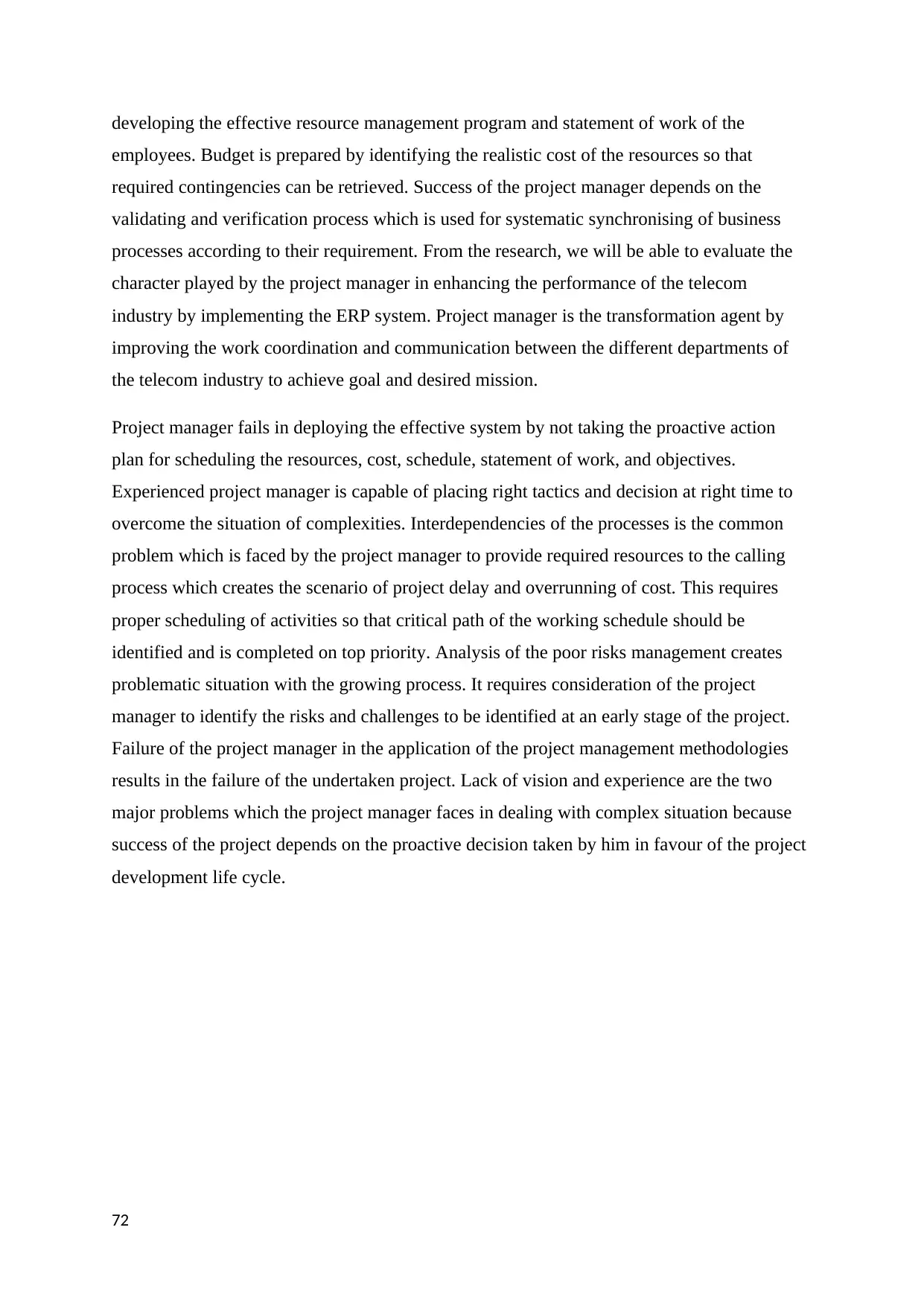
developing the effective resource management program and statement of work of the
employees. Budget is prepared by identifying the realistic cost of the resources so that
required contingencies can be retrieved. Success of the project manager depends on the
validating and verification process which is used for systematic synchronising of business
processes according to their requirement. From the research, we will be able to evaluate the
character played by the project manager in enhancing the performance of the telecom
industry by implementing the ERP system. Project manager is the transformation agent by
improving the work coordination and communication between the different departments of
the telecom industry to achieve goal and desired mission.
Project manager fails in deploying the effective system by not taking the proactive action
plan for scheduling the resources, cost, schedule, statement of work, and objectives.
Experienced project manager is capable of placing right tactics and decision at right time to
overcome the situation of complexities. Interdependencies of the processes is the common
problem which is faced by the project manager to provide required resources to the calling
process which creates the scenario of project delay and overrunning of cost. This requires
proper scheduling of activities so that critical path of the working schedule should be
identified and is completed on top priority. Analysis of the poor risks management creates
problematic situation with the growing process. It requires consideration of the project
manager to identify the risks and challenges to be identified at an early stage of the project.
Failure of the project manager in the application of the project management methodologies
results in the failure of the undertaken project. Lack of vision and experience are the two
major problems which the project manager faces in dealing with complex situation because
success of the project depends on the proactive decision taken by him in favour of the project
development life cycle.
72
employees. Budget is prepared by identifying the realistic cost of the resources so that
required contingencies can be retrieved. Success of the project manager depends on the
validating and verification process which is used for systematic synchronising of business
processes according to their requirement. From the research, we will be able to evaluate the
character played by the project manager in enhancing the performance of the telecom
industry by implementing the ERP system. Project manager is the transformation agent by
improving the work coordination and communication between the different departments of
the telecom industry to achieve goal and desired mission.
Project manager fails in deploying the effective system by not taking the proactive action
plan for scheduling the resources, cost, schedule, statement of work, and objectives.
Experienced project manager is capable of placing right tactics and decision at right time to
overcome the situation of complexities. Interdependencies of the processes is the common
problem which is faced by the project manager to provide required resources to the calling
process which creates the scenario of project delay and overrunning of cost. This requires
proper scheduling of activities so that critical path of the working schedule should be
identified and is completed on top priority. Analysis of the poor risks management creates
problematic situation with the growing process. It requires consideration of the project
manager to identify the risks and challenges to be identified at an early stage of the project.
Failure of the project manager in the application of the project management methodologies
results in the failure of the undertaken project. Lack of vision and experience are the two
major problems which the project manager faces in dealing with complex situation because
success of the project depends on the proactive decision taken by him in favour of the project
development life cycle.
72
Paraphrase This Document
Need a fresh take? Get an instant paraphrase of this document with our AI Paraphraser
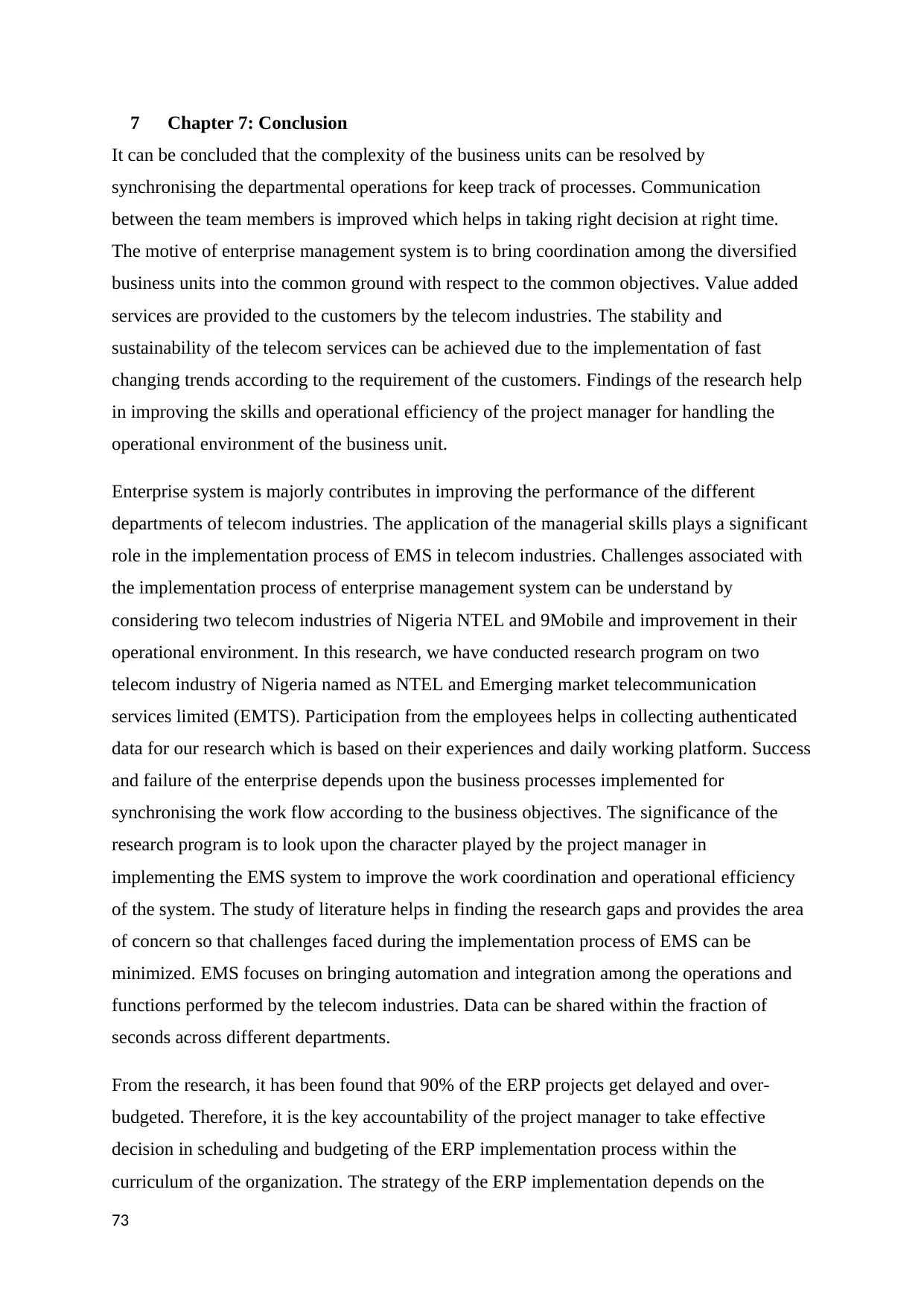
7 Chapter 7: Conclusion
It can be concluded that the complexity of the business units can be resolved by
synchronising the departmental operations for keep track of processes. Communication
between the team members is improved which helps in taking right decision at right time.
The motive of enterprise management system is to bring coordination among the diversified
business units into the common ground with respect to the common objectives. Value added
services are provided to the customers by the telecom industries. The stability and
sustainability of the telecom services can be achieved due to the implementation of fast
changing trends according to the requirement of the customers. Findings of the research help
in improving the skills and operational efficiency of the project manager for handling the
operational environment of the business unit.
Enterprise system is majorly contributes in improving the performance of the different
departments of telecom industries. The application of the managerial skills plays a significant
role in the implementation process of EMS in telecom industries. Challenges associated with
the implementation process of enterprise management system can be understand by
considering two telecom industries of Nigeria NTEL and 9Mobile and improvement in their
operational environment. In this research, we have conducted research program on two
telecom industry of Nigeria named as NTEL and Emerging market telecommunication
services limited (EMTS). Participation from the employees helps in collecting authenticated
data for our research which is based on their experiences and daily working platform. Success
and failure of the enterprise depends upon the business processes implemented for
synchronising the work flow according to the business objectives. The significance of the
research program is to look upon the character played by the project manager in
implementing the EMS system to improve the work coordination and operational efficiency
of the system. The study of literature helps in finding the research gaps and provides the area
of concern so that challenges faced during the implementation process of EMS can be
minimized. EMS focuses on bringing automation and integration among the operations and
functions performed by the telecom industries. Data can be shared within the fraction of
seconds across different departments.
From the research, it has been found that 90% of the ERP projects get delayed and over-
budgeted. Therefore, it is the key accountability of the project manager to take effective
decision in scheduling and budgeting of the ERP implementation process within the
curriculum of the organization. The strategy of the ERP implementation depends on the
73
It can be concluded that the complexity of the business units can be resolved by
synchronising the departmental operations for keep track of processes. Communication
between the team members is improved which helps in taking right decision at right time.
The motive of enterprise management system is to bring coordination among the diversified
business units into the common ground with respect to the common objectives. Value added
services are provided to the customers by the telecom industries. The stability and
sustainability of the telecom services can be achieved due to the implementation of fast
changing trends according to the requirement of the customers. Findings of the research help
in improving the skills and operational efficiency of the project manager for handling the
operational environment of the business unit.
Enterprise system is majorly contributes in improving the performance of the different
departments of telecom industries. The application of the managerial skills plays a significant
role in the implementation process of EMS in telecom industries. Challenges associated with
the implementation process of enterprise management system can be understand by
considering two telecom industries of Nigeria NTEL and 9Mobile and improvement in their
operational environment. In this research, we have conducted research program on two
telecom industry of Nigeria named as NTEL and Emerging market telecommunication
services limited (EMTS). Participation from the employees helps in collecting authenticated
data for our research which is based on their experiences and daily working platform. Success
and failure of the enterprise depends upon the business processes implemented for
synchronising the work flow according to the business objectives. The significance of the
research program is to look upon the character played by the project manager in
implementing the EMS system to improve the work coordination and operational efficiency
of the system. The study of literature helps in finding the research gaps and provides the area
of concern so that challenges faced during the implementation process of EMS can be
minimized. EMS focuses on bringing automation and integration among the operations and
functions performed by the telecom industries. Data can be shared within the fraction of
seconds across different departments.
From the research, it has been found that 90% of the ERP projects get delayed and over-
budgeted. Therefore, it is the key accountability of the project manager to take effective
decision in scheduling and budgeting of the ERP implementation process within the
curriculum of the organization. The strategy of the ERP implementation depends on the
73
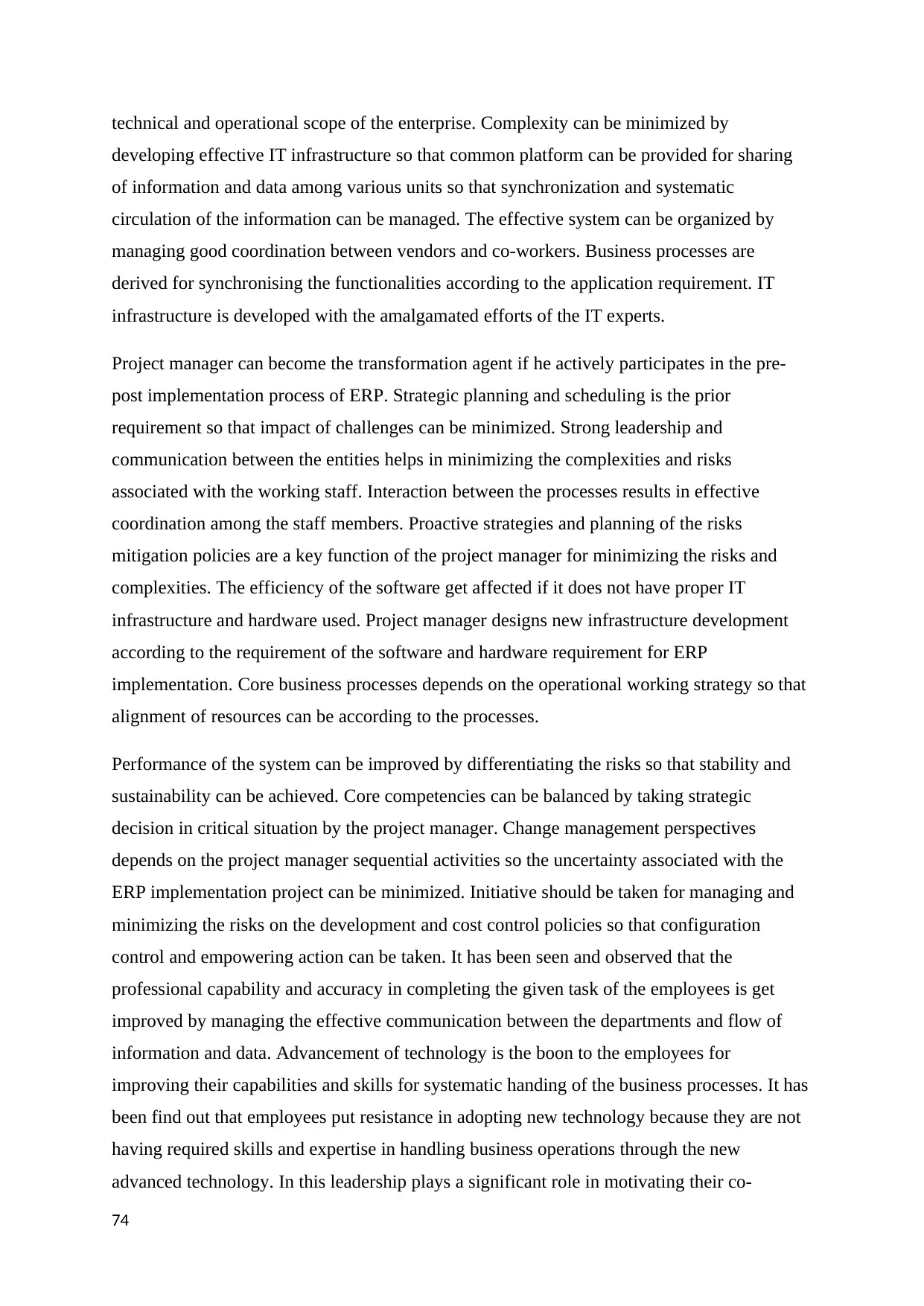
technical and operational scope of the enterprise. Complexity can be minimized by
developing effective IT infrastructure so that common platform can be provided for sharing
of information and data among various units so that synchronization and systematic
circulation of the information can be managed. The effective system can be organized by
managing good coordination between vendors and co-workers. Business processes are
derived for synchronising the functionalities according to the application requirement. IT
infrastructure is developed with the amalgamated efforts of the IT experts.
Project manager can become the transformation agent if he actively participates in the pre-
post implementation process of ERP. Strategic planning and scheduling is the prior
requirement so that impact of challenges can be minimized. Strong leadership and
communication between the entities helps in minimizing the complexities and risks
associated with the working staff. Interaction between the processes results in effective
coordination among the staff members. Proactive strategies and planning of the risks
mitigation policies are a key function of the project manager for minimizing the risks and
complexities. The efficiency of the software get affected if it does not have proper IT
infrastructure and hardware used. Project manager designs new infrastructure development
according to the requirement of the software and hardware requirement for ERP
implementation. Core business processes depends on the operational working strategy so that
alignment of resources can be according to the processes.
Performance of the system can be improved by differentiating the risks so that stability and
sustainability can be achieved. Core competencies can be balanced by taking strategic
decision in critical situation by the project manager. Change management perspectives
depends on the project manager sequential activities so the uncertainty associated with the
ERP implementation project can be minimized. Initiative should be taken for managing and
minimizing the risks on the development and cost control policies so that configuration
control and empowering action can be taken. It has been seen and observed that the
professional capability and accuracy in completing the given task of the employees is get
improved by managing the effective communication between the departments and flow of
information and data. Advancement of technology is the boon to the employees for
improving their capabilities and skills for systematic handing of the business processes. It has
been find out that employees put resistance in adopting new technology because they are not
having required skills and expertise in handling business operations through the new
advanced technology. In this leadership plays a significant role in motivating their co-
74
developing effective IT infrastructure so that common platform can be provided for sharing
of information and data among various units so that synchronization and systematic
circulation of the information can be managed. The effective system can be organized by
managing good coordination between vendors and co-workers. Business processes are
derived for synchronising the functionalities according to the application requirement. IT
infrastructure is developed with the amalgamated efforts of the IT experts.
Project manager can become the transformation agent if he actively participates in the pre-
post implementation process of ERP. Strategic planning and scheduling is the prior
requirement so that impact of challenges can be minimized. Strong leadership and
communication between the entities helps in minimizing the complexities and risks
associated with the working staff. Interaction between the processes results in effective
coordination among the staff members. Proactive strategies and planning of the risks
mitigation policies are a key function of the project manager for minimizing the risks and
complexities. The efficiency of the software get affected if it does not have proper IT
infrastructure and hardware used. Project manager designs new infrastructure development
according to the requirement of the software and hardware requirement for ERP
implementation. Core business processes depends on the operational working strategy so that
alignment of resources can be according to the processes.
Performance of the system can be improved by differentiating the risks so that stability and
sustainability can be achieved. Core competencies can be balanced by taking strategic
decision in critical situation by the project manager. Change management perspectives
depends on the project manager sequential activities so the uncertainty associated with the
ERP implementation project can be minimized. Initiative should be taken for managing and
minimizing the risks on the development and cost control policies so that configuration
control and empowering action can be taken. It has been seen and observed that the
professional capability and accuracy in completing the given task of the employees is get
improved by managing the effective communication between the departments and flow of
information and data. Advancement of technology is the boon to the employees for
improving their capabilities and skills for systematic handing of the business processes. It has
been find out that employees put resistance in adopting new technology because they are not
having required skills and expertise in handling business operations through the new
advanced technology. In this leadership plays a significant role in motivating their co-
74
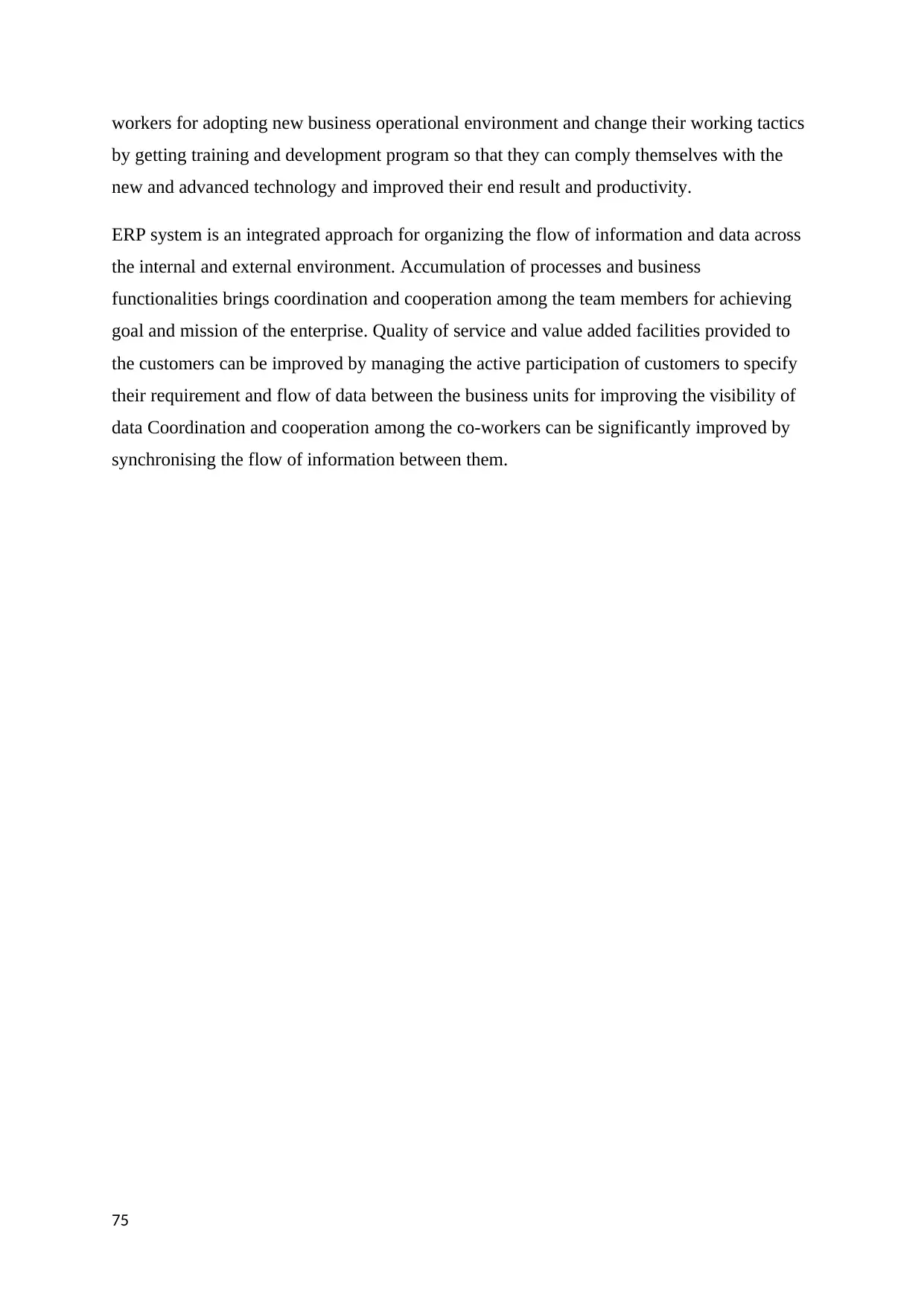
workers for adopting new business operational environment and change their working tactics
by getting training and development program so that they can comply themselves with the
new and advanced technology and improved their end result and productivity.
ERP system is an integrated approach for organizing the flow of information and data across
the internal and external environment. Accumulation of processes and business
functionalities brings coordination and cooperation among the team members for achieving
goal and mission of the enterprise. Quality of service and value added facilities provided to
the customers can be improved by managing the active participation of customers to specify
their requirement and flow of data between the business units for improving the visibility of
data Coordination and cooperation among the co-workers can be significantly improved by
synchronising the flow of information between them.
75
by getting training and development program so that they can comply themselves with the
new and advanced technology and improved their end result and productivity.
ERP system is an integrated approach for organizing the flow of information and data across
the internal and external environment. Accumulation of processes and business
functionalities brings coordination and cooperation among the team members for achieving
goal and mission of the enterprise. Quality of service and value added facilities provided to
the customers can be improved by managing the active participation of customers to specify
their requirement and flow of data between the business units for improving the visibility of
data Coordination and cooperation among the co-workers can be significantly improved by
synchronising the flow of information between them.
75
Secure Best Marks with AI Grader
Need help grading? Try our AI Grader for instant feedback on your assignments.
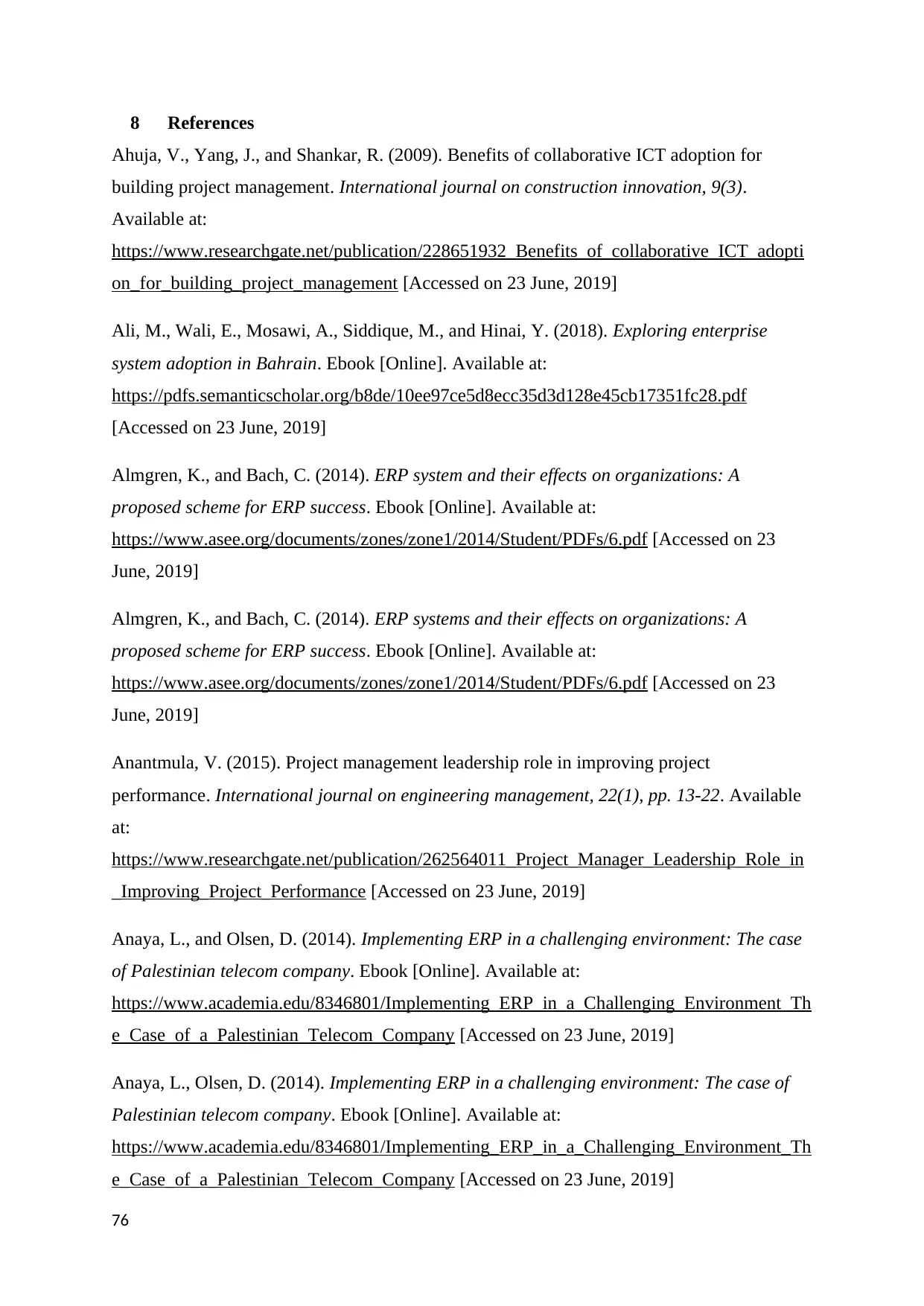
8 References
Ahuja, V., Yang, J., and Shankar, R. (2009). Benefits of collaborative ICT adoption for
building project management. International journal on construction innovation, 9(3).
Available at:
https://www.researchgate.net/publication/228651932_Benefits_of_collaborative_ICT_adopti
on_for_building_project_management [Accessed on 23 June, 2019]
Ali, M., Wali, E., Mosawi, A., Siddique, M., and Hinai, Y. (2018). Exploring enterprise
system adoption in Bahrain. Ebook [Online]. Available at:
https://pdfs.semanticscholar.org/b8de/10ee97ce5d8ecc35d3d128e45cb17351fc28.pdf
[Accessed on 23 June, 2019]
Almgren, K., and Bach, C. (2014). ERP system and their effects on organizations: A
proposed scheme for ERP success. Ebook [Online]. Available at:
https://www.asee.org/documents/zones/zone1/2014/Student/PDFs/6.pdf [Accessed on 23
June, 2019]
Almgren, K., and Bach, C. (2014). ERP systems and their effects on organizations: A
proposed scheme for ERP success. Ebook [Online]. Available at:
https://www.asee.org/documents/zones/zone1/2014/Student/PDFs/6.pdf [Accessed on 23
June, 2019]
Anantmula, V. (2015). Project management leadership role in improving project
performance. International journal on engineering management, 22(1), pp. 13-22. Available
at:
https://www.researchgate.net/publication/262564011_Project_Manager_Leadership_Role_in
_Improving_Project_Performance [Accessed on 23 June, 2019]
Anaya, L., and Olsen, D. (2014). Implementing ERP in a challenging environment: The case
of Palestinian telecom company. Ebook [Online]. Available at:
https://www.academia.edu/8346801/Implementing_ERP_in_a_Challenging_Environment_Th
e_Case_of_a_Palestinian_Telecom_Company [Accessed on 23 June, 2019]
Anaya, L., Olsen, D. (2014). Implementing ERP in a challenging environment: The case of
Palestinian telecom company. Ebook [Online]. Available at:
https://www.academia.edu/8346801/Implementing_ERP_in_a_Challenging_Environment_Th
e_Case_of_a_Palestinian_Telecom_Company [Accessed on 23 June, 2019]
76
Ahuja, V., Yang, J., and Shankar, R. (2009). Benefits of collaborative ICT adoption for
building project management. International journal on construction innovation, 9(3).
Available at:
https://www.researchgate.net/publication/228651932_Benefits_of_collaborative_ICT_adopti
on_for_building_project_management [Accessed on 23 June, 2019]
Ali, M., Wali, E., Mosawi, A., Siddique, M., and Hinai, Y. (2018). Exploring enterprise
system adoption in Bahrain. Ebook [Online]. Available at:
https://pdfs.semanticscholar.org/b8de/10ee97ce5d8ecc35d3d128e45cb17351fc28.pdf
[Accessed on 23 June, 2019]
Almgren, K., and Bach, C. (2014). ERP system and their effects on organizations: A
proposed scheme for ERP success. Ebook [Online]. Available at:
https://www.asee.org/documents/zones/zone1/2014/Student/PDFs/6.pdf [Accessed on 23
June, 2019]
Almgren, K., and Bach, C. (2014). ERP systems and their effects on organizations: A
proposed scheme for ERP success. Ebook [Online]. Available at:
https://www.asee.org/documents/zones/zone1/2014/Student/PDFs/6.pdf [Accessed on 23
June, 2019]
Anantmula, V. (2015). Project management leadership role in improving project
performance. International journal on engineering management, 22(1), pp. 13-22. Available
at:
https://www.researchgate.net/publication/262564011_Project_Manager_Leadership_Role_in
_Improving_Project_Performance [Accessed on 23 June, 2019]
Anaya, L., and Olsen, D. (2014). Implementing ERP in a challenging environment: The case
of Palestinian telecom company. Ebook [Online]. Available at:
https://www.academia.edu/8346801/Implementing_ERP_in_a_Challenging_Environment_Th
e_Case_of_a_Palestinian_Telecom_Company [Accessed on 23 June, 2019]
Anaya, L., Olsen, D. (2014). Implementing ERP in a challenging environment: The case of
Palestinian telecom company. Ebook [Online]. Available at:
https://www.academia.edu/8346801/Implementing_ERP_in_a_Challenging_Environment_Th
e_Case_of_a_Palestinian_Telecom_Company [Accessed on 23 June, 2019]
76
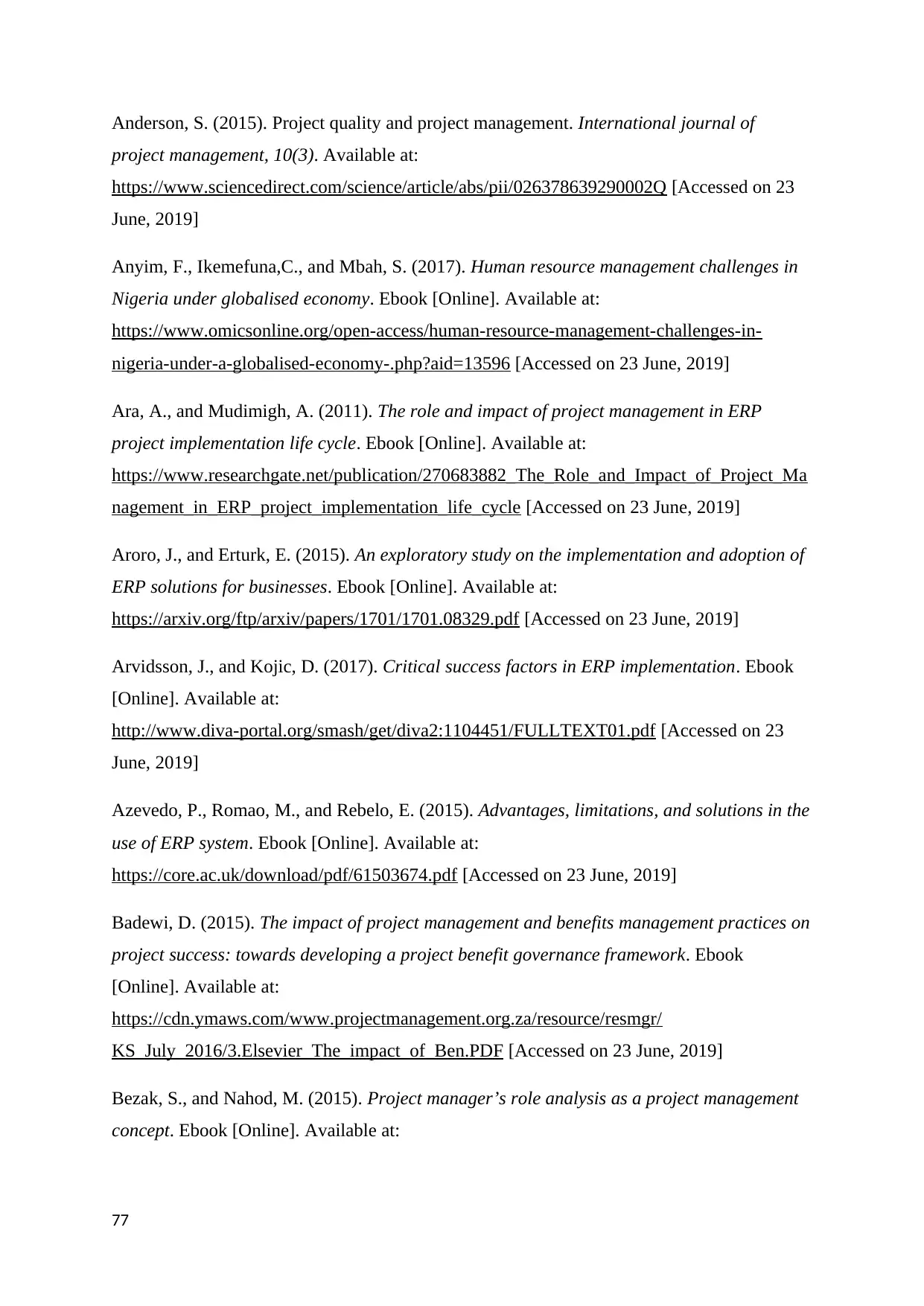
Anderson, S. (2015). Project quality and project management. International journal of
project management, 10(3). Available at:
https://www.sciencedirect.com/science/article/abs/pii/026378639290002Q [Accessed on 23
June, 2019]
Anyim, F., Ikemefuna,C., and Mbah, S. (2017). Human resource management challenges in
Nigeria under globalised economy. Ebook [Online]. Available at:
https://www.omicsonline.org/open-access/human-resource-management-challenges-in-
nigeria-under-a-globalised-economy-.php?aid=13596 [Accessed on 23 June, 2019]
Ara, A., and Mudimigh, A. (2011). The role and impact of project management in ERP
project implementation life cycle. Ebook [Online]. Available at:
https://www.researchgate.net/publication/270683882_The_Role_and_Impact_of_Project_Ma
nagement_in_ERP_project_implementation_life_cycle [Accessed on 23 June, 2019]
Aroro, J., and Erturk, E. (2015). An exploratory study on the implementation and adoption of
ERP solutions for businesses. Ebook [Online]. Available at:
https://arxiv.org/ftp/arxiv/papers/1701/1701.08329.pdf [Accessed on 23 June, 2019]
Arvidsson, J., and Kojic, D. (2017). Critical success factors in ERP implementation. Ebook
[Online]. Available at:
http://www.diva-portal.org/smash/get/diva2:1104451/FULLTEXT01.pdf [Accessed on 23
June, 2019]
Azevedo, P., Romao, M., and Rebelo, E. (2015). Advantages, limitations, and solutions in the
use of ERP system. Ebook [Online]. Available at:
https://core.ac.uk/download/pdf/61503674.pdf [Accessed on 23 June, 2019]
Badewi, D. (2015). The impact of project management and benefits management practices on
project success: towards developing a project benefit governance framework. Ebook
[Online]. Available at:
https://cdn.ymaws.com/www.projectmanagement.org.za/resource/resmgr/
KS_July_2016/3.Elsevier_The_impact_of_Ben.PDF [Accessed on 23 June, 2019]
Bezak, S., and Nahod, M. (2015). Project manager’s role analysis as a project management
concept. Ebook [Online]. Available at:
77
project management, 10(3). Available at:
https://www.sciencedirect.com/science/article/abs/pii/026378639290002Q [Accessed on 23
June, 2019]
Anyim, F., Ikemefuna,C., and Mbah, S. (2017). Human resource management challenges in
Nigeria under globalised economy. Ebook [Online]. Available at:
https://www.omicsonline.org/open-access/human-resource-management-challenges-in-
nigeria-under-a-globalised-economy-.php?aid=13596 [Accessed on 23 June, 2019]
Ara, A., and Mudimigh, A. (2011). The role and impact of project management in ERP
project implementation life cycle. Ebook [Online]. Available at:
https://www.researchgate.net/publication/270683882_The_Role_and_Impact_of_Project_Ma
nagement_in_ERP_project_implementation_life_cycle [Accessed on 23 June, 2019]
Aroro, J., and Erturk, E. (2015). An exploratory study on the implementation and adoption of
ERP solutions for businesses. Ebook [Online]. Available at:
https://arxiv.org/ftp/arxiv/papers/1701/1701.08329.pdf [Accessed on 23 June, 2019]
Arvidsson, J., and Kojic, D. (2017). Critical success factors in ERP implementation. Ebook
[Online]. Available at:
http://www.diva-portal.org/smash/get/diva2:1104451/FULLTEXT01.pdf [Accessed on 23
June, 2019]
Azevedo, P., Romao, M., and Rebelo, E. (2015). Advantages, limitations, and solutions in the
use of ERP system. Ebook [Online]. Available at:
https://core.ac.uk/download/pdf/61503674.pdf [Accessed on 23 June, 2019]
Badewi, D. (2015). The impact of project management and benefits management practices on
project success: towards developing a project benefit governance framework. Ebook
[Online]. Available at:
https://cdn.ymaws.com/www.projectmanagement.org.za/resource/resmgr/
KS_July_2016/3.Elsevier_The_impact_of_Ben.PDF [Accessed on 23 June, 2019]
Bezak, S., and Nahod, M. (2015). Project manager’s role analysis as a project management
concept. Ebook [Online]. Available at:
77
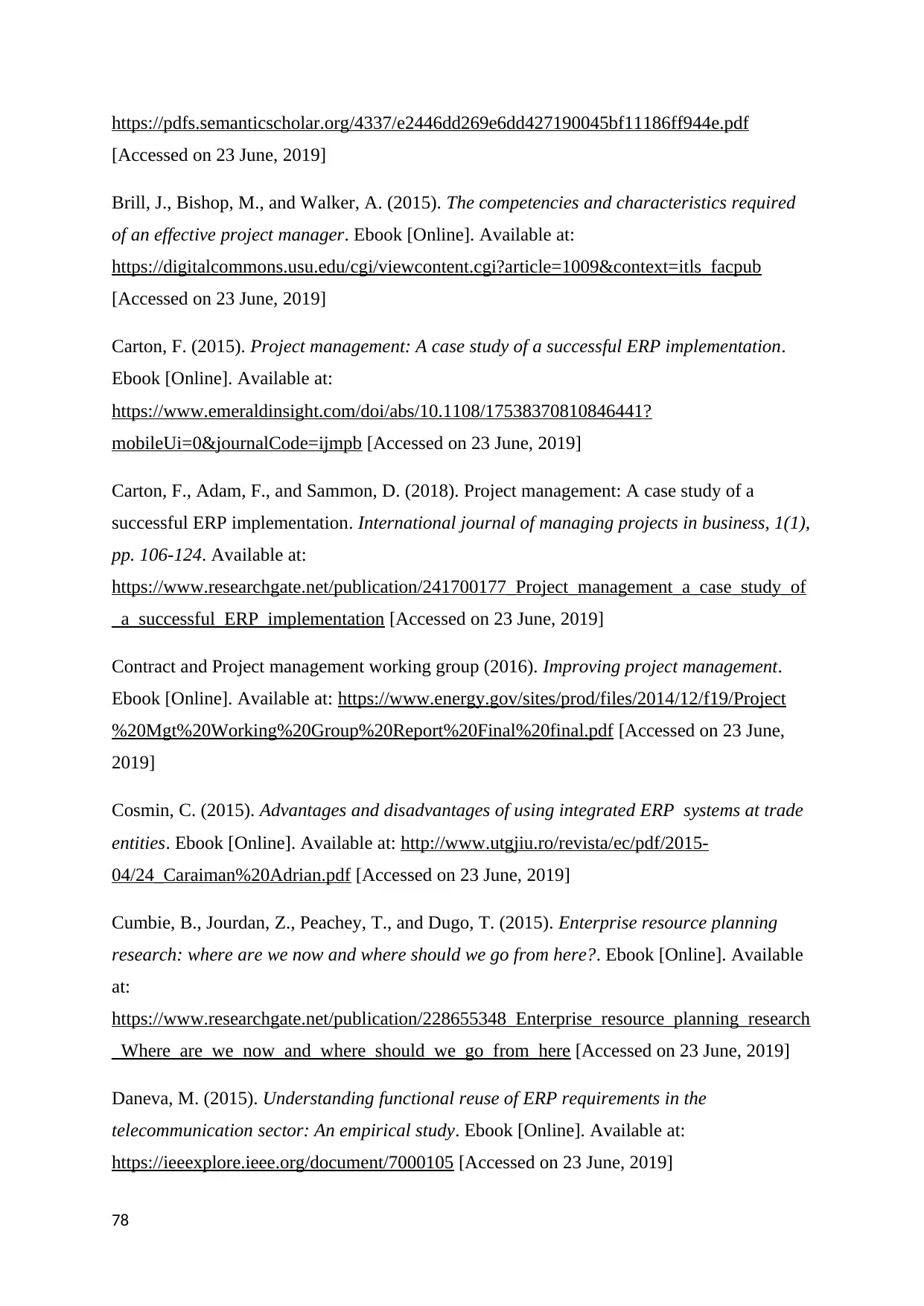
https://pdfs.semanticscholar.org/4337/e2446dd269e6dd427190045bf11186ff944e.pdf
[Accessed on 23 June, 2019]
Brill, J., Bishop, M., and Walker, A. (2015). The competencies and characteristics required
of an effective project manager. Ebook [Online]. Available at:
https://digitalcommons.usu.edu/cgi/viewcontent.cgi?article=1009&context=itls_facpub
[Accessed on 23 June, 2019]
Carton, F. (2015). Project management: A case study of a successful ERP implementation.
Ebook [Online]. Available at:
https://www.emeraldinsight.com/doi/abs/10.1108/17538370810846441?
mobileUi=0&journalCode=ijmpb [Accessed on 23 June, 2019]
Carton, F., Adam, F., and Sammon, D. (2018). Project management: A case study of a
successful ERP implementation. International journal of managing projects in business, 1(1),
pp. 106-124. Available at:
https://www.researchgate.net/publication/241700177_Project_management_a_case_study_of
_a_successful_ERP_implementation [Accessed on 23 June, 2019]
Contract and Project management working group (2016). Improving project management.
Ebook [Online]. Available at: https://www.energy.gov/sites/prod/files/2014/12/f19/Project
%20Mgt%20Working%20Group%20Report%20Final%20final.pdf [Accessed on 23 June,
2019]
Cosmin, C. (2015). Advantages and disadvantages of using integrated ERP systems at trade
entities. Ebook [Online]. Available at: http://www.utgjiu.ro/revista/ec/pdf/2015-
04/24_Caraiman%20Adrian.pdf [Accessed on 23 June, 2019]
Cumbie, B., Jourdan, Z., Peachey, T., and Dugo, T. (2015). Enterprise resource planning
research: where are we now and where should we go from here?. Ebook [Online]. Available
at:
https://www.researchgate.net/publication/228655348_Enterprise_resource_planning_research
_Where_are_we_now_and_where_should_we_go_from_here [Accessed on 23 June, 2019]
Daneva, M. (2015). Understanding functional reuse of ERP requirements in the
telecommunication sector: An empirical study. Ebook [Online]. Available at:
https://ieeexplore.ieee.org/document/7000105 [Accessed on 23 June, 2019]
78
[Accessed on 23 June, 2019]
Brill, J., Bishop, M., and Walker, A. (2015). The competencies and characteristics required
of an effective project manager. Ebook [Online]. Available at:
https://digitalcommons.usu.edu/cgi/viewcontent.cgi?article=1009&context=itls_facpub
[Accessed on 23 June, 2019]
Carton, F. (2015). Project management: A case study of a successful ERP implementation.
Ebook [Online]. Available at:
https://www.emeraldinsight.com/doi/abs/10.1108/17538370810846441?
mobileUi=0&journalCode=ijmpb [Accessed on 23 June, 2019]
Carton, F., Adam, F., and Sammon, D. (2018). Project management: A case study of a
successful ERP implementation. International journal of managing projects in business, 1(1),
pp. 106-124. Available at:
https://www.researchgate.net/publication/241700177_Project_management_a_case_study_of
_a_successful_ERP_implementation [Accessed on 23 June, 2019]
Contract and Project management working group (2016). Improving project management.
Ebook [Online]. Available at: https://www.energy.gov/sites/prod/files/2014/12/f19/Project
%20Mgt%20Working%20Group%20Report%20Final%20final.pdf [Accessed on 23 June,
2019]
Cosmin, C. (2015). Advantages and disadvantages of using integrated ERP systems at trade
entities. Ebook [Online]. Available at: http://www.utgjiu.ro/revista/ec/pdf/2015-
04/24_Caraiman%20Adrian.pdf [Accessed on 23 June, 2019]
Cumbie, B., Jourdan, Z., Peachey, T., and Dugo, T. (2015). Enterprise resource planning
research: where are we now and where should we go from here?. Ebook [Online]. Available
at:
https://www.researchgate.net/publication/228655348_Enterprise_resource_planning_research
_Where_are_we_now_and_where_should_we_go_from_here [Accessed on 23 June, 2019]
Daneva, M. (2015). Understanding functional reuse of ERP requirements in the
telecommunication sector: An empirical study. Ebook [Online]. Available at:
https://ieeexplore.ieee.org/document/7000105 [Accessed on 23 June, 2019]
78
Paraphrase This Document
Need a fresh take? Get an instant paraphrase of this document with our AI Paraphraser
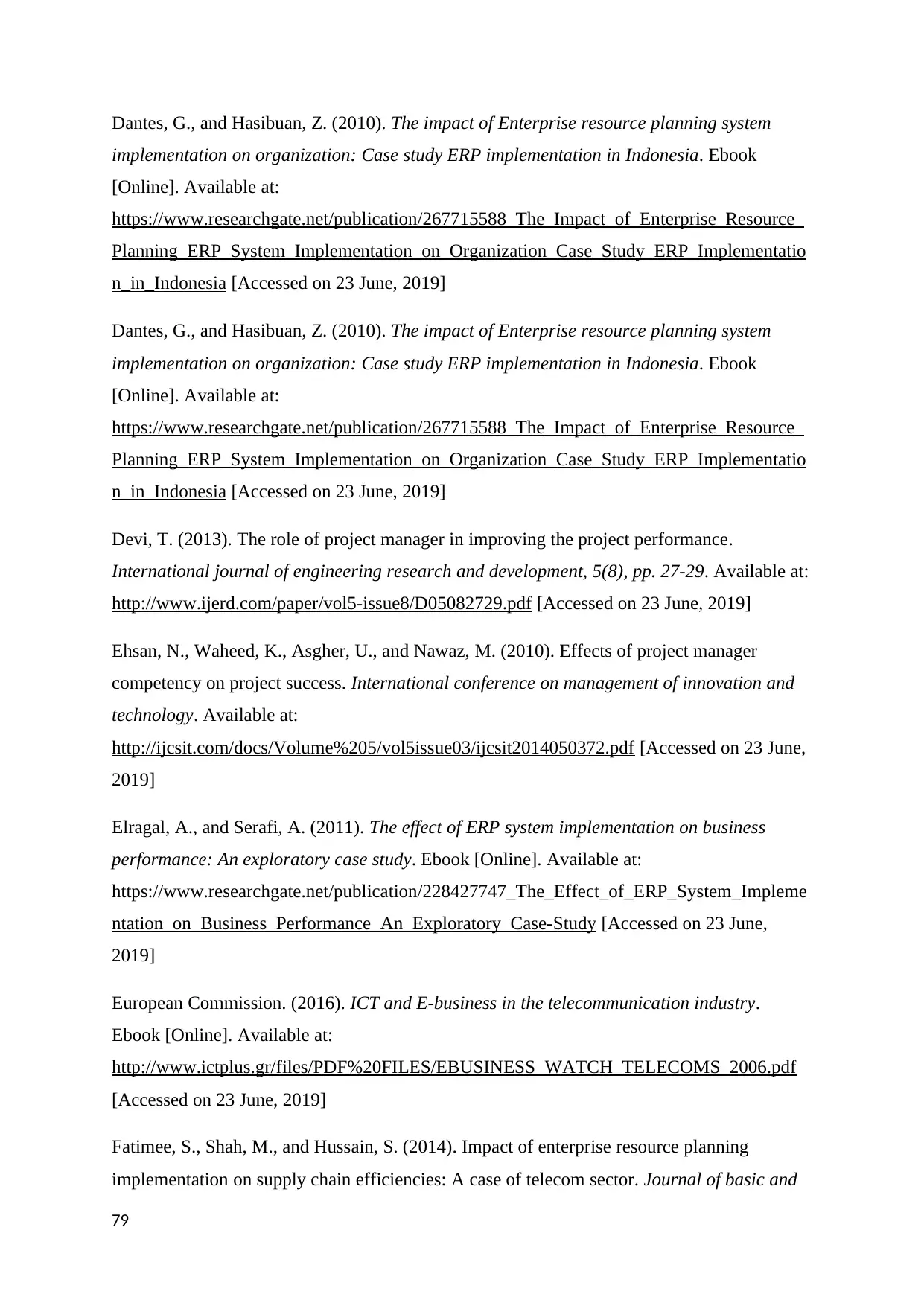
Dantes, G., and Hasibuan, Z. (2010). The impact of Enterprise resource planning system
implementation on organization: Case study ERP implementation in Indonesia. Ebook
[Online]. Available at:
https://www.researchgate.net/publication/267715588_The_Impact_of_Enterprise_Resource_
Planning_ERP_System_Implementation_on_Organization_Case_Study_ERP_Implementatio
n_in_Indonesia [Accessed on 23 June, 2019]
Dantes, G., and Hasibuan, Z. (2010). The impact of Enterprise resource planning system
implementation on organization: Case study ERP implementation in Indonesia. Ebook
[Online]. Available at:
https://www.researchgate.net/publication/267715588_The_Impact_of_Enterprise_Resource_
Planning_ERP_System_Implementation_on_Organization_Case_Study_ERP_Implementatio
n_in_Indonesia [Accessed on 23 June, 2019]
Devi, T. (2013). The role of project manager in improving the project performance.
International journal of engineering research and development, 5(8), pp. 27-29. Available at:
http://www.ijerd.com/paper/vol5-issue8/D05082729.pdf [Accessed on 23 June, 2019]
Ehsan, N., Waheed, K., Asgher, U., and Nawaz, M. (2010). Effects of project manager
competency on project success. International conference on management of innovation and
technology. Available at:
http://ijcsit.com/docs/Volume%205/vol5issue03/ijcsit2014050372.pdf [Accessed on 23 June,
2019]
Elragal, A., and Serafi, A. (2011). The effect of ERP system implementation on business
performance: An exploratory case study. Ebook [Online]. Available at:
https://www.researchgate.net/publication/228427747_The_Effect_of_ERP_System_Impleme
ntation_on_Business_Performance_An_Exploratory_Case-Study [Accessed on 23 June,
2019]
European Commission. (2016). ICT and E-business in the telecommunication industry.
Ebook [Online]. Available at:
http://www.ictplus.gr/files/PDF%20FILES/EBUSINESS_WATCH_TELECOMS_2006.pdf
[Accessed on 23 June, 2019]
Fatimee, S., Shah, M., and Hussain, S. (2014). Impact of enterprise resource planning
implementation on supply chain efficiencies: A case of telecom sector. Journal of basic and
79
implementation on organization: Case study ERP implementation in Indonesia. Ebook
[Online]. Available at:
https://www.researchgate.net/publication/267715588_The_Impact_of_Enterprise_Resource_
Planning_ERP_System_Implementation_on_Organization_Case_Study_ERP_Implementatio
n_in_Indonesia [Accessed on 23 June, 2019]
Dantes, G., and Hasibuan, Z. (2010). The impact of Enterprise resource planning system
implementation on organization: Case study ERP implementation in Indonesia. Ebook
[Online]. Available at:
https://www.researchgate.net/publication/267715588_The_Impact_of_Enterprise_Resource_
Planning_ERP_System_Implementation_on_Organization_Case_Study_ERP_Implementatio
n_in_Indonesia [Accessed on 23 June, 2019]
Devi, T. (2013). The role of project manager in improving the project performance.
International journal of engineering research and development, 5(8), pp. 27-29. Available at:
http://www.ijerd.com/paper/vol5-issue8/D05082729.pdf [Accessed on 23 June, 2019]
Ehsan, N., Waheed, K., Asgher, U., and Nawaz, M. (2010). Effects of project manager
competency on project success. International conference on management of innovation and
technology. Available at:
http://ijcsit.com/docs/Volume%205/vol5issue03/ijcsit2014050372.pdf [Accessed on 23 June,
2019]
Elragal, A., and Serafi, A. (2011). The effect of ERP system implementation on business
performance: An exploratory case study. Ebook [Online]. Available at:
https://www.researchgate.net/publication/228427747_The_Effect_of_ERP_System_Impleme
ntation_on_Business_Performance_An_Exploratory_Case-Study [Accessed on 23 June,
2019]
European Commission. (2016). ICT and E-business in the telecommunication industry.
Ebook [Online]. Available at:
http://www.ictplus.gr/files/PDF%20FILES/EBUSINESS_WATCH_TELECOMS_2006.pdf
[Accessed on 23 June, 2019]
Fatimee, S., Shah, M., and Hussain, S. (2014). Impact of enterprise resource planning
implementation on supply chain efficiencies: A case of telecom sector. Journal of basic and
79
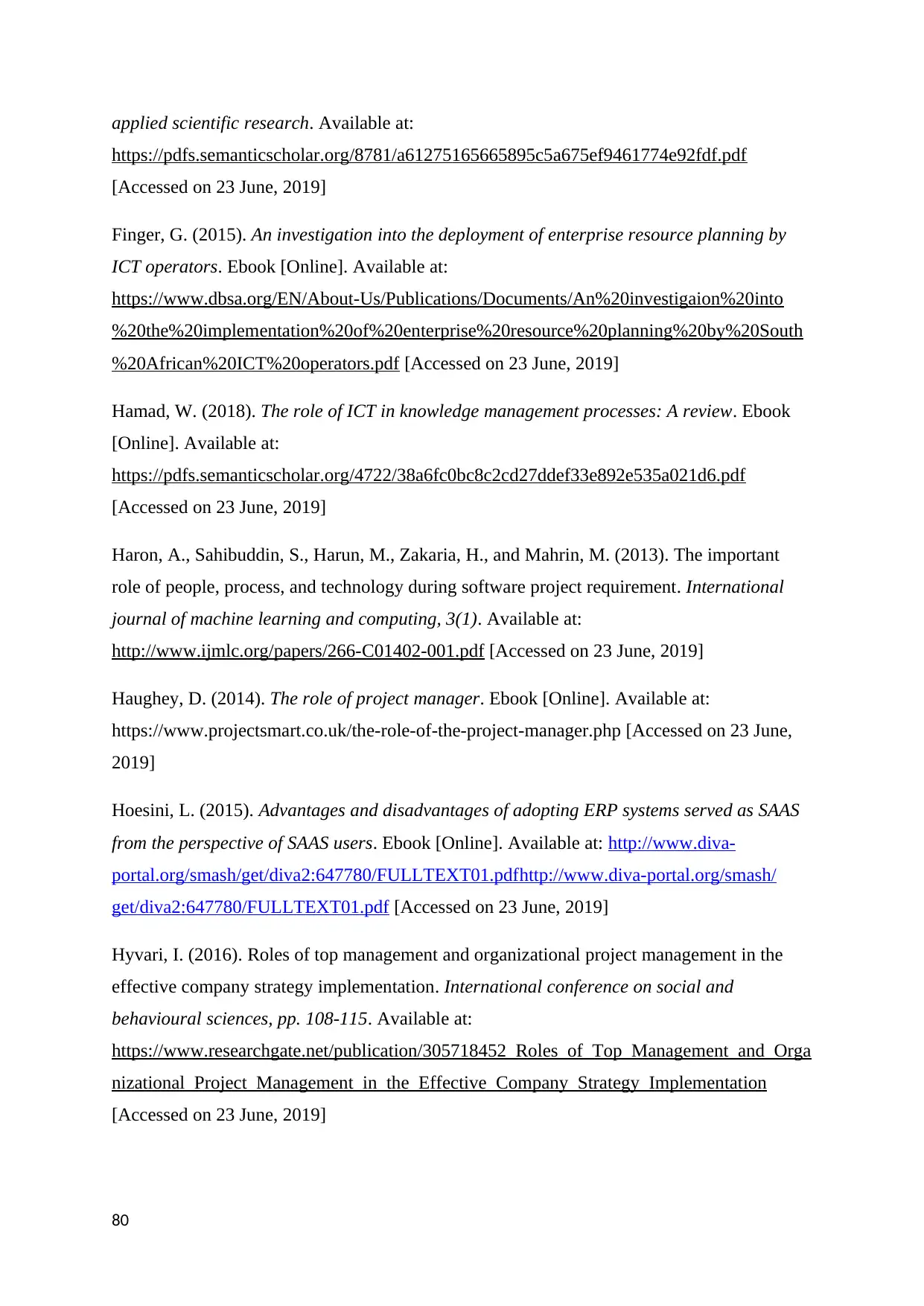
applied scientific research. Available at:
https://pdfs.semanticscholar.org/8781/a61275165665895c5a675ef9461774e92fdf.pdf
[Accessed on 23 June, 2019]
Finger, G. (2015). An investigation into the deployment of enterprise resource planning by
ICT operators. Ebook [Online]. Available at:
https://www.dbsa.org/EN/About-Us/Publications/Documents/An%20investigaion%20into
%20the%20implementation%20of%20enterprise%20resource%20planning%20by%20South
%20African%20ICT%20operators.pdf [Accessed on 23 June, 2019]
Hamad, W. (2018). The role of ICT in knowledge management processes: A review. Ebook
[Online]. Available at:
https://pdfs.semanticscholar.org/4722/38a6fc0bc8c2cd27ddef33e892e535a021d6.pdf
[Accessed on 23 June, 2019]
Haron, A., Sahibuddin, S., Harun, M., Zakaria, H., and Mahrin, M. (2013). The important
role of people, process, and technology during software project requirement. International
journal of machine learning and computing, 3(1). Available at:
http://www.ijmlc.org/papers/266-C01402-001.pdf [Accessed on 23 June, 2019]
Haughey, D. (2014). The role of project manager. Ebook [Online]. Available at:
https://www.projectsmart.co.uk/the-role-of-the-project-manager.php [Accessed on 23 June,
2019]
Hoesini, L. (2015). Advantages and disadvantages of adopting ERP systems served as SAAS
from the perspective of SAAS users. Ebook [Online]. Available at: http://www.diva-
portal.org/smash/get/diva2:647780/FULLTEXT01.pdfhttp://www.diva-portal.org/smash/
get/diva2:647780/FULLTEXT01.pdf [Accessed on 23 June, 2019]
Hyvari, I. (2016). Roles of top management and organizational project management in the
effective company strategy implementation. International conference on social and
behavioural sciences, pp. 108-115. Available at:
https://www.researchgate.net/publication/305718452_Roles_of_Top_Management_and_Orga
nizational_Project_Management_in_the_Effective_Company_Strategy_Implementation
[Accessed on 23 June, 2019]
80
https://pdfs.semanticscholar.org/8781/a61275165665895c5a675ef9461774e92fdf.pdf
[Accessed on 23 June, 2019]
Finger, G. (2015). An investigation into the deployment of enterprise resource planning by
ICT operators. Ebook [Online]. Available at:
https://www.dbsa.org/EN/About-Us/Publications/Documents/An%20investigaion%20into
%20the%20implementation%20of%20enterprise%20resource%20planning%20by%20South
%20African%20ICT%20operators.pdf [Accessed on 23 June, 2019]
Hamad, W. (2018). The role of ICT in knowledge management processes: A review. Ebook
[Online]. Available at:
https://pdfs.semanticscholar.org/4722/38a6fc0bc8c2cd27ddef33e892e535a021d6.pdf
[Accessed on 23 June, 2019]
Haron, A., Sahibuddin, S., Harun, M., Zakaria, H., and Mahrin, M. (2013). The important
role of people, process, and technology during software project requirement. International
journal of machine learning and computing, 3(1). Available at:
http://www.ijmlc.org/papers/266-C01402-001.pdf [Accessed on 23 June, 2019]
Haughey, D. (2014). The role of project manager. Ebook [Online]. Available at:
https://www.projectsmart.co.uk/the-role-of-the-project-manager.php [Accessed on 23 June,
2019]
Hoesini, L. (2015). Advantages and disadvantages of adopting ERP systems served as SAAS
from the perspective of SAAS users. Ebook [Online]. Available at: http://www.diva-
portal.org/smash/get/diva2:647780/FULLTEXT01.pdfhttp://www.diva-portal.org/smash/
get/diva2:647780/FULLTEXT01.pdf [Accessed on 23 June, 2019]
Hyvari, I. (2016). Roles of top management and organizational project management in the
effective company strategy implementation. International conference on social and
behavioural sciences, pp. 108-115. Available at:
https://www.researchgate.net/publication/305718452_Roles_of_Top_Management_and_Orga
nizational_Project_Management_in_the_Effective_Company_Strategy_Implementation
[Accessed on 23 June, 2019]
80
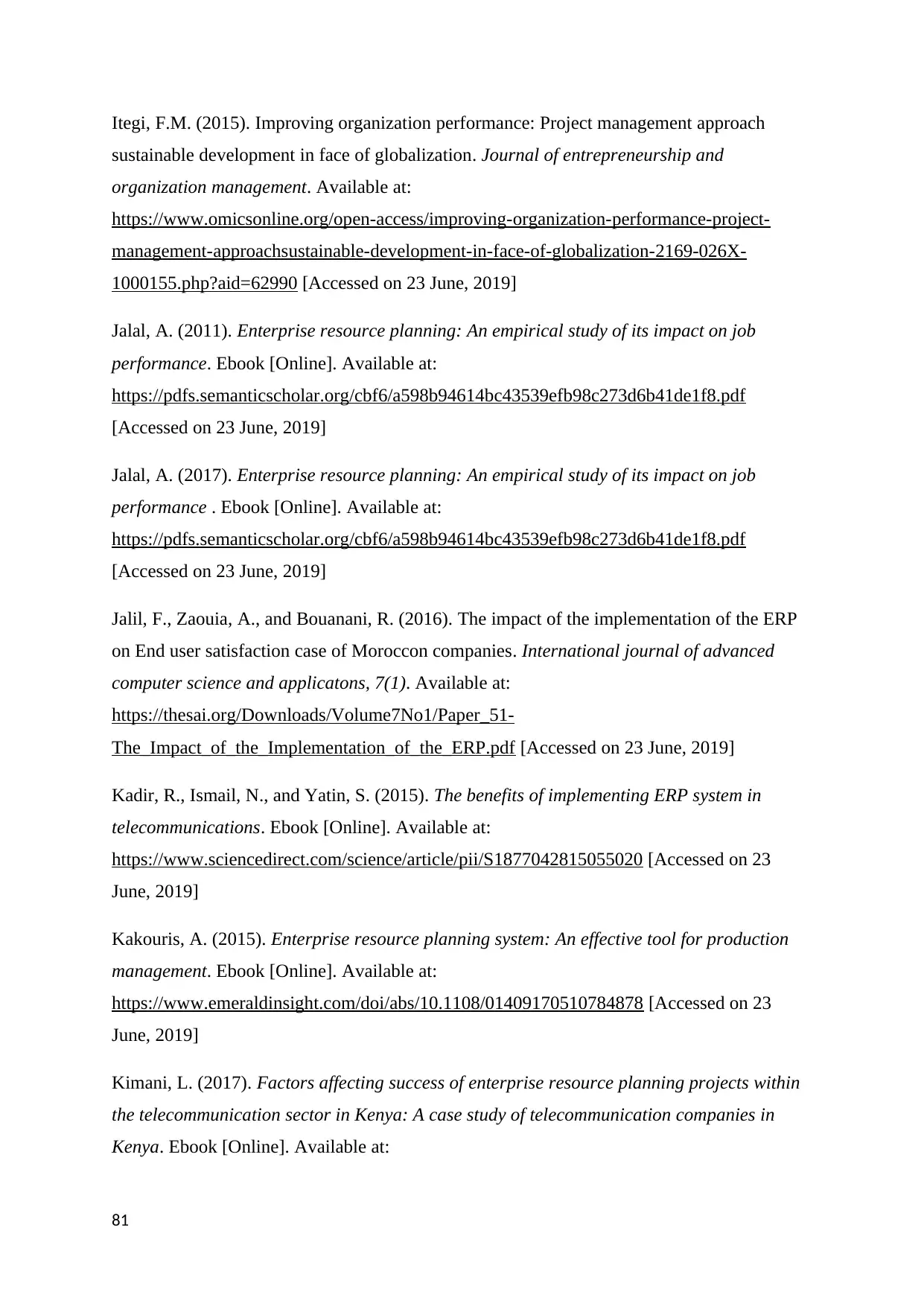
Itegi, F.M. (2015). Improving organization performance: Project management approach
sustainable development in face of globalization. Journal of entrepreneurship and
organization management. Available at:
https://www.omicsonline.org/open-access/improving-organization-performance-project-
management-approachsustainable-development-in-face-of-globalization-2169-026X-
1000155.php?aid=62990 [Accessed on 23 June, 2019]
Jalal, A. (2011). Enterprise resource planning: An empirical study of its impact on job
performance. Ebook [Online]. Available at:
https://pdfs.semanticscholar.org/cbf6/a598b94614bc43539efb98c273d6b41de1f8.pdf
[Accessed on 23 June, 2019]
Jalal, A. (2017). Enterprise resource planning: An empirical study of its impact on job
performance . Ebook [Online]. Available at:
https://pdfs.semanticscholar.org/cbf6/a598b94614bc43539efb98c273d6b41de1f8.pdf
[Accessed on 23 June, 2019]
Jalil, F., Zaouia, A., and Bouanani, R. (2016). The impact of the implementation of the ERP
on End user satisfaction case of Moroccon companies. International journal of advanced
computer science and applicatons, 7(1). Available at:
https://thesai.org/Downloads/Volume7No1/Paper_51-
The_Impact_of_the_Implementation_of_the_ERP.pdf [Accessed on 23 June, 2019]
Kadir, R., Ismail, N., and Yatin, S. (2015). The benefits of implementing ERP system in
telecommunications. Ebook [Online]. Available at:
https://www.sciencedirect.com/science/article/pii/S1877042815055020 [Accessed on 23
June, 2019]
Kakouris, A. (2015). Enterprise resource planning system: An effective tool for production
management. Ebook [Online]. Available at:
https://www.emeraldinsight.com/doi/abs/10.1108/01409170510784878 [Accessed on 23
June, 2019]
Kimani, L. (2017). Factors affecting success of enterprise resource planning projects within
the telecommunication sector in Kenya: A case study of telecommunication companies in
Kenya. Ebook [Online]. Available at:
81
sustainable development in face of globalization. Journal of entrepreneurship and
organization management. Available at:
https://www.omicsonline.org/open-access/improving-organization-performance-project-
management-approachsustainable-development-in-face-of-globalization-2169-026X-
1000155.php?aid=62990 [Accessed on 23 June, 2019]
Jalal, A. (2011). Enterprise resource planning: An empirical study of its impact on job
performance. Ebook [Online]. Available at:
https://pdfs.semanticscholar.org/cbf6/a598b94614bc43539efb98c273d6b41de1f8.pdf
[Accessed on 23 June, 2019]
Jalal, A. (2017). Enterprise resource planning: An empirical study of its impact on job
performance . Ebook [Online]. Available at:
https://pdfs.semanticscholar.org/cbf6/a598b94614bc43539efb98c273d6b41de1f8.pdf
[Accessed on 23 June, 2019]
Jalil, F., Zaouia, A., and Bouanani, R. (2016). The impact of the implementation of the ERP
on End user satisfaction case of Moroccon companies. International journal of advanced
computer science and applicatons, 7(1). Available at:
https://thesai.org/Downloads/Volume7No1/Paper_51-
The_Impact_of_the_Implementation_of_the_ERP.pdf [Accessed on 23 June, 2019]
Kadir, R., Ismail, N., and Yatin, S. (2015). The benefits of implementing ERP system in
telecommunications. Ebook [Online]. Available at:
https://www.sciencedirect.com/science/article/pii/S1877042815055020 [Accessed on 23
June, 2019]
Kakouris, A. (2015). Enterprise resource planning system: An effective tool for production
management. Ebook [Online]. Available at:
https://www.emeraldinsight.com/doi/abs/10.1108/01409170510784878 [Accessed on 23
June, 2019]
Kimani, L. (2017). Factors affecting success of enterprise resource planning projects within
the telecommunication sector in Kenya: A case study of telecommunication companies in
Kenya. Ebook [Online]. Available at:
81
Secure Best Marks with AI Grader
Need help grading? Try our AI Grader for instant feedback on your assignments.
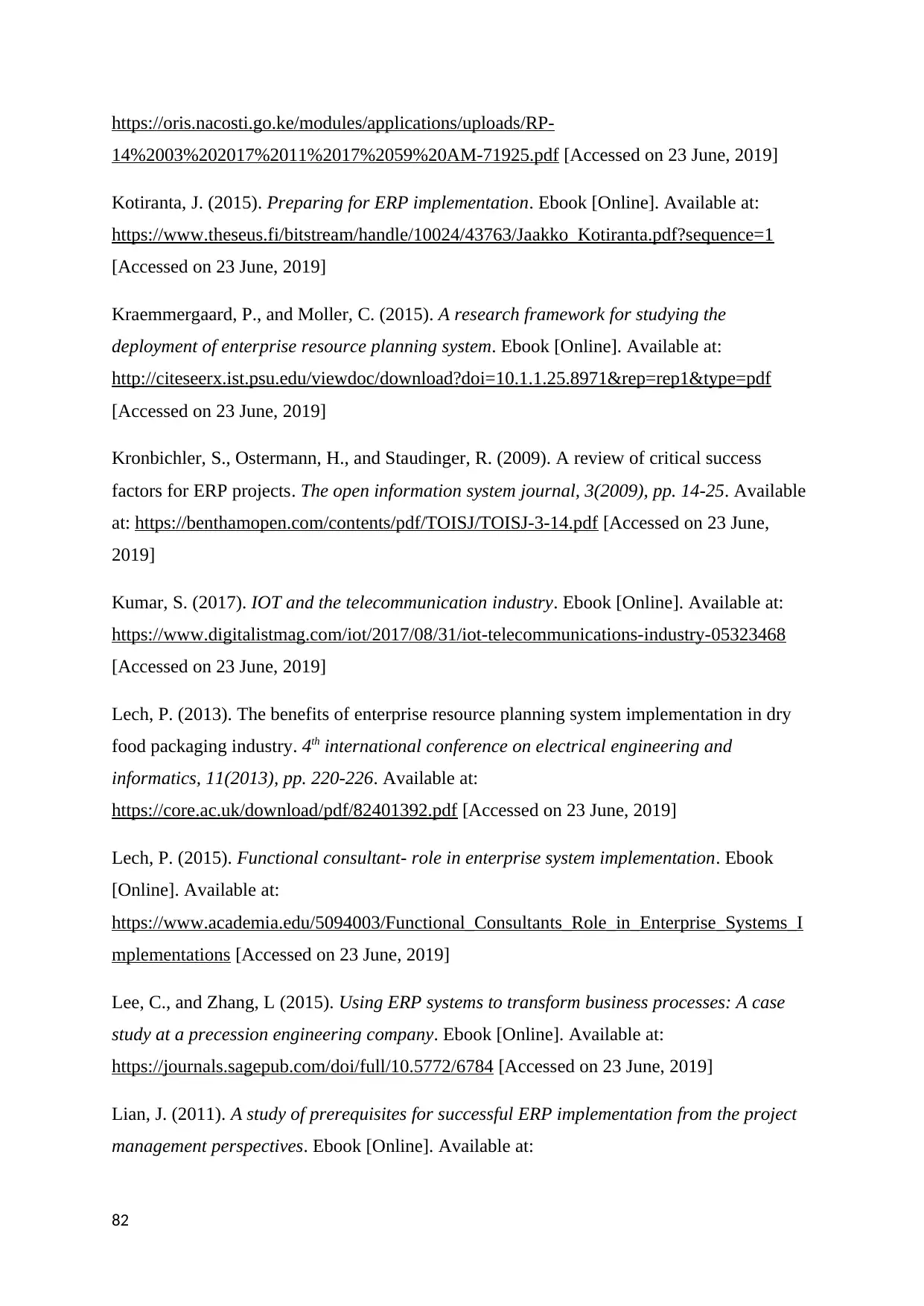
https://oris.nacosti.go.ke/modules/applications/uploads/RP-
14%2003%202017%2011%2017%2059%20AM-71925.pdf [Accessed on 23 June, 2019]
Kotiranta, J. (2015). Preparing for ERP implementation. Ebook [Online]. Available at:
https://www.theseus.fi/bitstream/handle/10024/43763/Jaakko_Kotiranta.pdf?sequence=1
[Accessed on 23 June, 2019]
Kraemmergaard, P., and Moller, C. (2015). A research framework for studying the
deployment of enterprise resource planning system. Ebook [Online]. Available at:
http://citeseerx.ist.psu.edu/viewdoc/download?doi=10.1.1.25.8971&rep=rep1&type=pdf
[Accessed on 23 June, 2019]
Kronbichler, S., Ostermann, H., and Staudinger, R. (2009). A review of critical success
factors for ERP projects. The open information system journal, 3(2009), pp. 14-25. Available
at: https://benthamopen.com/contents/pdf/TOISJ/TOISJ-3-14.pdf [Accessed on 23 June,
2019]
Kumar, S. (2017). IOT and the telecommunication industry. Ebook [Online]. Available at:
https://www.digitalistmag.com/iot/2017/08/31/iot-telecommunications-industry-05323468
[Accessed on 23 June, 2019]
Lech, P. (2013). The benefits of enterprise resource planning system implementation in dry
food packaging industry. 4th international conference on electrical engineering and
informatics, 11(2013), pp. 220-226. Available at:
https://core.ac.uk/download/pdf/82401392.pdf [Accessed on 23 June, 2019]
Lech, P. (2015). Functional consultant- role in enterprise system implementation. Ebook
[Online]. Available at:
https://www.academia.edu/5094003/Functional_Consultants_Role_in_Enterprise_Systems_I
mplementations [Accessed on 23 June, 2019]
Lee, C., and Zhang, L (2015). Using ERP systems to transform business processes: A case
study at a precession engineering company. Ebook [Online]. Available at:
https://journals.sagepub.com/doi/full/10.5772/6784 [Accessed on 23 June, 2019]
Lian, J. (2011). A study of prerequisites for successful ERP implementation from the project
management perspectives. Ebook [Online]. Available at:
82
14%2003%202017%2011%2017%2059%20AM-71925.pdf [Accessed on 23 June, 2019]
Kotiranta, J. (2015). Preparing for ERP implementation. Ebook [Online]. Available at:
https://www.theseus.fi/bitstream/handle/10024/43763/Jaakko_Kotiranta.pdf?sequence=1
[Accessed on 23 June, 2019]
Kraemmergaard, P., and Moller, C. (2015). A research framework for studying the
deployment of enterprise resource planning system. Ebook [Online]. Available at:
http://citeseerx.ist.psu.edu/viewdoc/download?doi=10.1.1.25.8971&rep=rep1&type=pdf
[Accessed on 23 June, 2019]
Kronbichler, S., Ostermann, H., and Staudinger, R. (2009). A review of critical success
factors for ERP projects. The open information system journal, 3(2009), pp. 14-25. Available
at: https://benthamopen.com/contents/pdf/TOISJ/TOISJ-3-14.pdf [Accessed on 23 June,
2019]
Kumar, S. (2017). IOT and the telecommunication industry. Ebook [Online]. Available at:
https://www.digitalistmag.com/iot/2017/08/31/iot-telecommunications-industry-05323468
[Accessed on 23 June, 2019]
Lech, P. (2013). The benefits of enterprise resource planning system implementation in dry
food packaging industry. 4th international conference on electrical engineering and
informatics, 11(2013), pp. 220-226. Available at:
https://core.ac.uk/download/pdf/82401392.pdf [Accessed on 23 June, 2019]
Lech, P. (2015). Functional consultant- role in enterprise system implementation. Ebook
[Online]. Available at:
https://www.academia.edu/5094003/Functional_Consultants_Role_in_Enterprise_Systems_I
mplementations [Accessed on 23 June, 2019]
Lee, C., and Zhang, L (2015). Using ERP systems to transform business processes: A case
study at a precession engineering company. Ebook [Online]. Available at:
https://journals.sagepub.com/doi/full/10.5772/6784 [Accessed on 23 June, 2019]
Lian, J. (2011). A study of prerequisites for successful ERP implementation from the project
management perspectives. Ebook [Online]. Available at:
82
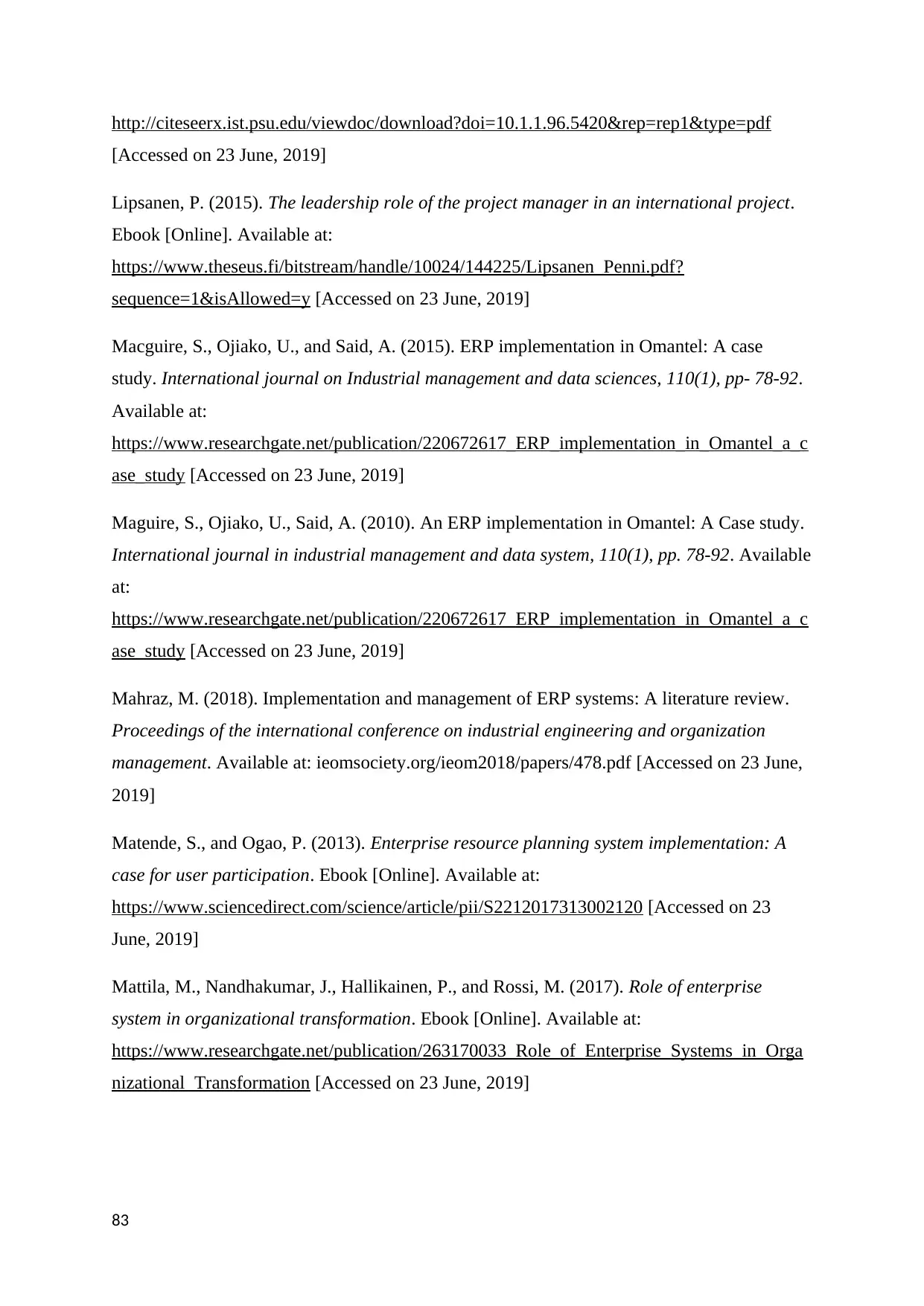
http://citeseerx.ist.psu.edu/viewdoc/download?doi=10.1.1.96.5420&rep=rep1&type=pdf
[Accessed on 23 June, 2019]
Lipsanen, P. (2015). The leadership role of the project manager in an international project.
Ebook [Online]. Available at:
https://www.theseus.fi/bitstream/handle/10024/144225/Lipsanen_Penni.pdf?
sequence=1&isAllowed=y [Accessed on 23 June, 2019]
Macguire, S., Ojiako, U., and Said, A. (2015). ERP implementation in Omantel: A case
study. International journal on Industrial management and data sciences, 110(1), pp- 78-92.
Available at:
https://www.researchgate.net/publication/220672617_ERP_implementation_in_Omantel_a_c
ase_study [Accessed on 23 June, 2019]
Maguire, S., Ojiako, U., Said, A. (2010). An ERP implementation in Omantel: A Case study.
International journal in industrial management and data system, 110(1), pp. 78-92. Available
at:
https://www.researchgate.net/publication/220672617_ERP_implementation_in_Omantel_a_c
ase_study [Accessed on 23 June, 2019]
Mahraz, M. (2018). Implementation and management of ERP systems: A literature review.
Proceedings of the international conference on industrial engineering and organization
management. Available at: ieomsociety.org/ieom2018/papers/478.pdf [Accessed on 23 June,
2019]
Matende, S., and Ogao, P. (2013). Enterprise resource planning system implementation: A
case for user participation. Ebook [Online]. Available at:
https://www.sciencedirect.com/science/article/pii/S2212017313002120 [Accessed on 23
June, 2019]
Mattila, M., Nandhakumar, J., Hallikainen, P., and Rossi, M. (2017). Role of enterprise
system in organizational transformation. Ebook [Online]. Available at:
https://www.researchgate.net/publication/263170033_Role_of_Enterprise_Systems_in_Orga
nizational_Transformation [Accessed on 23 June, 2019]
83
[Accessed on 23 June, 2019]
Lipsanen, P. (2015). The leadership role of the project manager in an international project.
Ebook [Online]. Available at:
https://www.theseus.fi/bitstream/handle/10024/144225/Lipsanen_Penni.pdf?
sequence=1&isAllowed=y [Accessed on 23 June, 2019]
Macguire, S., Ojiako, U., and Said, A. (2015). ERP implementation in Omantel: A case
study. International journal on Industrial management and data sciences, 110(1), pp- 78-92.
Available at:
https://www.researchgate.net/publication/220672617_ERP_implementation_in_Omantel_a_c
ase_study [Accessed on 23 June, 2019]
Maguire, S., Ojiako, U., Said, A. (2010). An ERP implementation in Omantel: A Case study.
International journal in industrial management and data system, 110(1), pp. 78-92. Available
at:
https://www.researchgate.net/publication/220672617_ERP_implementation_in_Omantel_a_c
ase_study [Accessed on 23 June, 2019]
Mahraz, M. (2018). Implementation and management of ERP systems: A literature review.
Proceedings of the international conference on industrial engineering and organization
management. Available at: ieomsociety.org/ieom2018/papers/478.pdf [Accessed on 23 June,
2019]
Matende, S., and Ogao, P. (2013). Enterprise resource planning system implementation: A
case for user participation. Ebook [Online]. Available at:
https://www.sciencedirect.com/science/article/pii/S2212017313002120 [Accessed on 23
June, 2019]
Mattila, M., Nandhakumar, J., Hallikainen, P., and Rossi, M. (2017). Role of enterprise
system in organizational transformation. Ebook [Online]. Available at:
https://www.researchgate.net/publication/263170033_Role_of_Enterprise_Systems_in_Orga
nizational_Transformation [Accessed on 23 June, 2019]
83
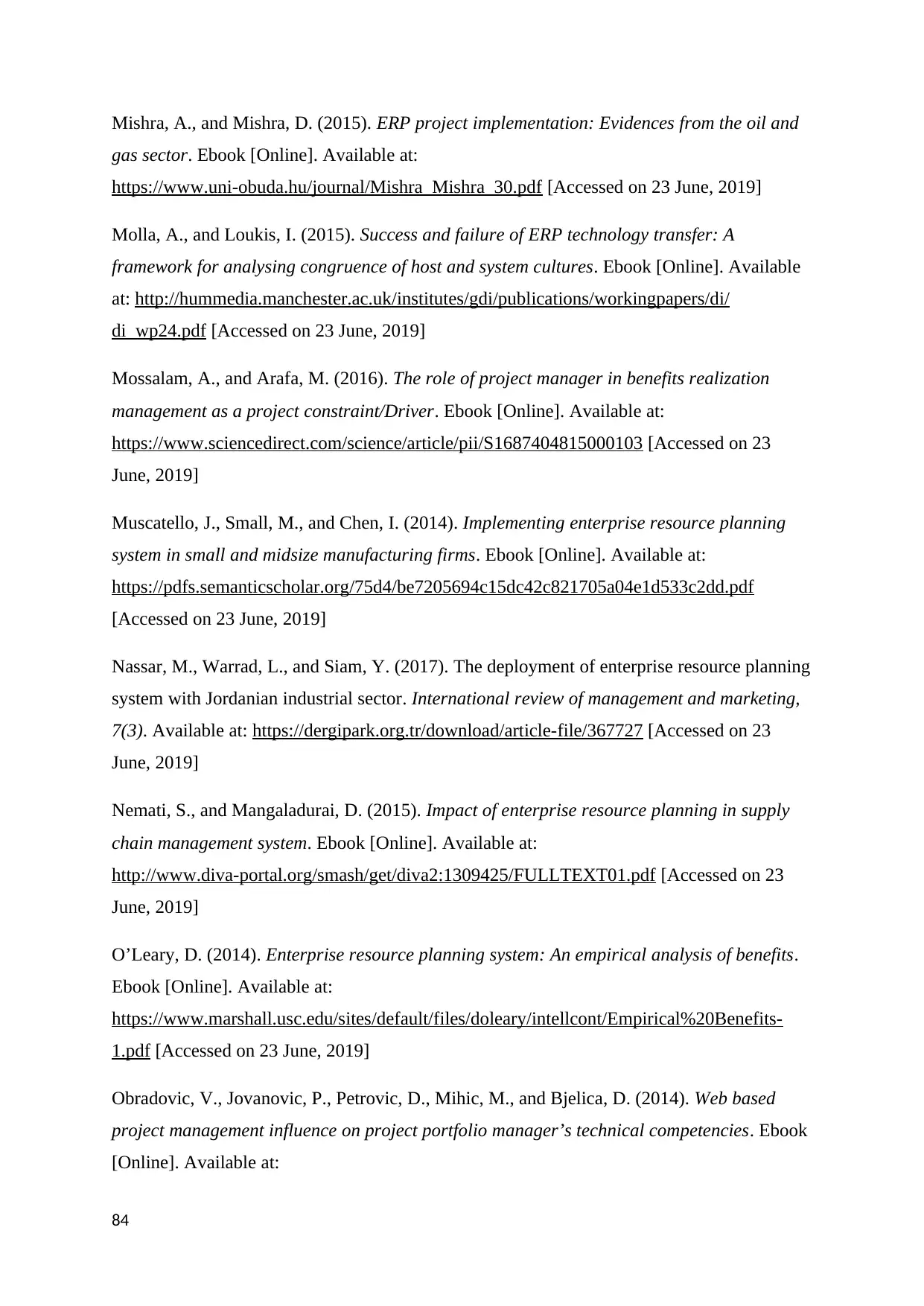
Mishra, A., and Mishra, D. (2015). ERP project implementation: Evidences from the oil and
gas sector. Ebook [Online]. Available at:
https://www.uni-obuda.hu/journal/Mishra_Mishra_30.pdf [Accessed on 23 June, 2019]
Molla, A., and Loukis, I. (2015). Success and failure of ERP technology transfer: A
framework for analysing congruence of host and system cultures. Ebook [Online]. Available
at: http://hummedia.manchester.ac.uk/institutes/gdi/publications/workingpapers/di/
di_wp24.pdf [Accessed on 23 June, 2019]
Mossalam, A., and Arafa, M. (2016). The role of project manager in benefits realization
management as a project constraint/Driver. Ebook [Online]. Available at:
https://www.sciencedirect.com/science/article/pii/S1687404815000103 [Accessed on 23
June, 2019]
Muscatello, J., Small, M., and Chen, I. (2014). Implementing enterprise resource planning
system in small and midsize manufacturing firms. Ebook [Online]. Available at:
https://pdfs.semanticscholar.org/75d4/be7205694c15dc42c821705a04e1d533c2dd.pdf
[Accessed on 23 June, 2019]
Nassar, M., Warrad, L., and Siam, Y. (2017). The deployment of enterprise resource planning
system with Jordanian industrial sector. International review of management and marketing,
7(3). Available at: https://dergipark.org.tr/download/article-file/367727 [Accessed on 23
June, 2019]
Nemati, S., and Mangaladurai, D. (2015). Impact of enterprise resource planning in supply
chain management system. Ebook [Online]. Available at:
http://www.diva-portal.org/smash/get/diva2:1309425/FULLTEXT01.pdf [Accessed on 23
June, 2019]
O’Leary, D. (2014). Enterprise resource planning system: An empirical analysis of benefits.
Ebook [Online]. Available at:
https://www.marshall.usc.edu/sites/default/files/doleary/intellcont/Empirical%20Benefits-
1.pdf [Accessed on 23 June, 2019]
Obradovic, V., Jovanovic, P., Petrovic, D., Mihic, M., and Bjelica, D. (2014). Web based
project management influence on project portfolio manager’s technical competencies. Ebook
[Online]. Available at:
84
gas sector. Ebook [Online]. Available at:
https://www.uni-obuda.hu/journal/Mishra_Mishra_30.pdf [Accessed on 23 June, 2019]
Molla, A., and Loukis, I. (2015). Success and failure of ERP technology transfer: A
framework for analysing congruence of host and system cultures. Ebook [Online]. Available
at: http://hummedia.manchester.ac.uk/institutes/gdi/publications/workingpapers/di/
di_wp24.pdf [Accessed on 23 June, 2019]
Mossalam, A., and Arafa, M. (2016). The role of project manager in benefits realization
management as a project constraint/Driver. Ebook [Online]. Available at:
https://www.sciencedirect.com/science/article/pii/S1687404815000103 [Accessed on 23
June, 2019]
Muscatello, J., Small, M., and Chen, I. (2014). Implementing enterprise resource planning
system in small and midsize manufacturing firms. Ebook [Online]. Available at:
https://pdfs.semanticscholar.org/75d4/be7205694c15dc42c821705a04e1d533c2dd.pdf
[Accessed on 23 June, 2019]
Nassar, M., Warrad, L., and Siam, Y. (2017). The deployment of enterprise resource planning
system with Jordanian industrial sector. International review of management and marketing,
7(3). Available at: https://dergipark.org.tr/download/article-file/367727 [Accessed on 23
June, 2019]
Nemati, S., and Mangaladurai, D. (2015). Impact of enterprise resource planning in supply
chain management system. Ebook [Online]. Available at:
http://www.diva-portal.org/smash/get/diva2:1309425/FULLTEXT01.pdf [Accessed on 23
June, 2019]
O’Leary, D. (2014). Enterprise resource planning system: An empirical analysis of benefits.
Ebook [Online]. Available at:
https://www.marshall.usc.edu/sites/default/files/doleary/intellcont/Empirical%20Benefits-
1.pdf [Accessed on 23 June, 2019]
Obradovic, V., Jovanovic, P., Petrovic, D., Mihic, M., and Bjelica, D. (2014). Web based
project management influence on project portfolio manager’s technical competencies. Ebook
[Online]. Available at:
84
Paraphrase This Document
Need a fresh take? Get an instant paraphrase of this document with our AI Paraphraser
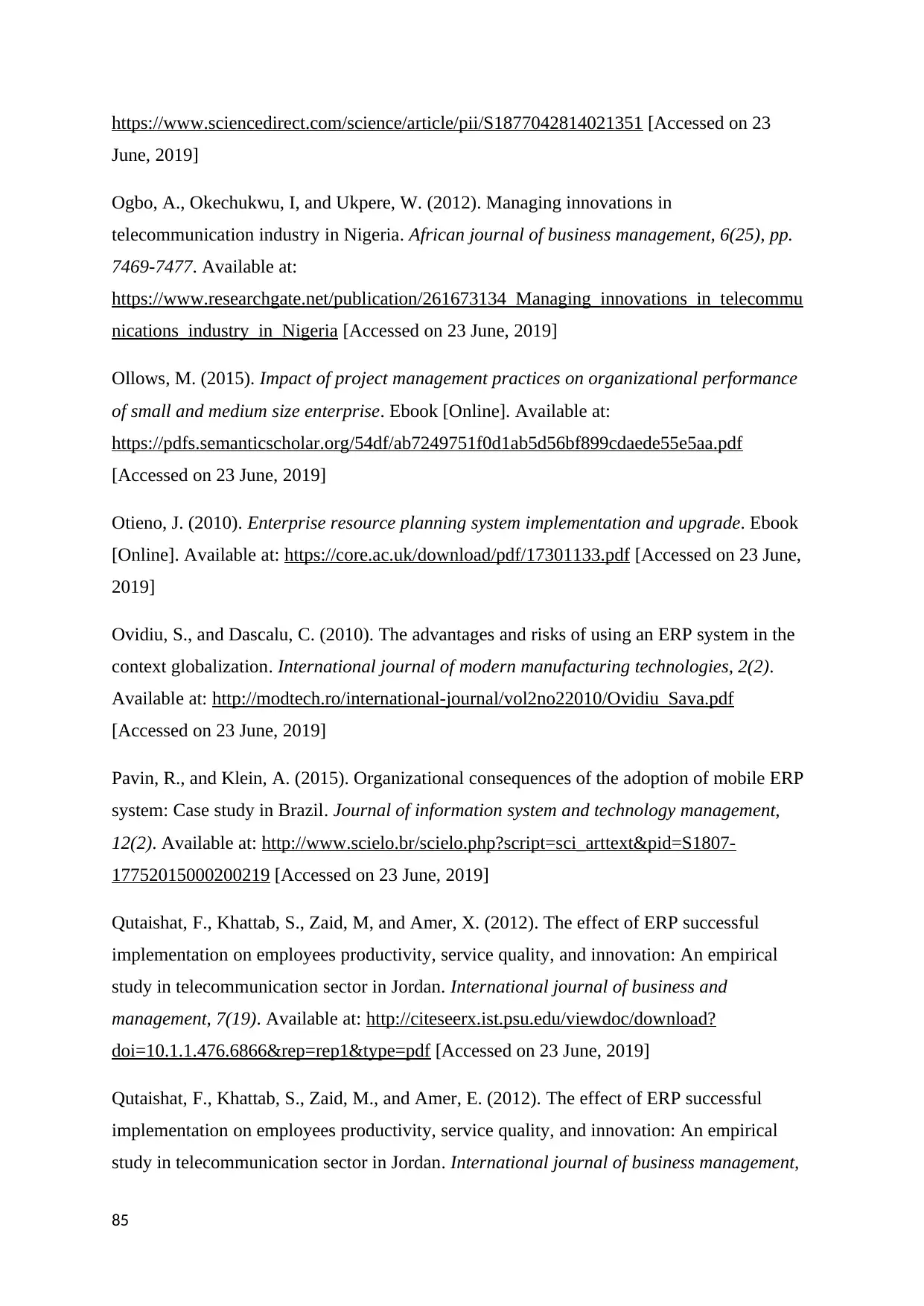
https://www.sciencedirect.com/science/article/pii/S1877042814021351 [Accessed on 23
June, 2019]
Ogbo, A., Okechukwu, I, and Ukpere, W. (2012). Managing innovations in
telecommunication industry in Nigeria. African journal of business management, 6(25), pp.
7469-7477. Available at:
https://www.researchgate.net/publication/261673134_Managing_innovations_in_telecommu
nications_industry_in_Nigeria [Accessed on 23 June, 2019]
Ollows, M. (2015). Impact of project management practices on organizational performance
of small and medium size enterprise. Ebook [Online]. Available at:
https://pdfs.semanticscholar.org/54df/ab7249751f0d1ab5d56bf899cdaede55e5aa.pdf
[Accessed on 23 June, 2019]
Otieno, J. (2010). Enterprise resource planning system implementation and upgrade. Ebook
[Online]. Available at: https://core.ac.uk/download/pdf/17301133.pdf [Accessed on 23 June,
2019]
Ovidiu, S., and Dascalu, C. (2010). The advantages and risks of using an ERP system in the
context globalization. International journal of modern manufacturing technologies, 2(2).
Available at: http://modtech.ro/international-journal/vol2no22010/Ovidiu_Sava.pdf
[Accessed on 23 June, 2019]
Pavin, R., and Klein, A. (2015). Organizational consequences of the adoption of mobile ERP
system: Case study in Brazil. Journal of information system and technology management,
12(2). Available at: http://www.scielo.br/scielo.php?script=sci_arttext&pid=S1807-
17752015000200219 [Accessed on 23 June, 2019]
Qutaishat, F., Khattab, S., Zaid, M, and Amer, X. (2012). The effect of ERP successful
implementation on employees productivity, service quality, and innovation: An empirical
study in telecommunication sector in Jordan. International journal of business and
management, 7(19). Available at: http://citeseerx.ist.psu.edu/viewdoc/download?
doi=10.1.1.476.6866&rep=rep1&type=pdf [Accessed on 23 June, 2019]
Qutaishat, F., Khattab, S., Zaid, M., and Amer, E. (2012). The effect of ERP successful
implementation on employees productivity, service quality, and innovation: An empirical
study in telecommunication sector in Jordan. International journal of business management,
85
June, 2019]
Ogbo, A., Okechukwu, I, and Ukpere, W. (2012). Managing innovations in
telecommunication industry in Nigeria. African journal of business management, 6(25), pp.
7469-7477. Available at:
https://www.researchgate.net/publication/261673134_Managing_innovations_in_telecommu
nications_industry_in_Nigeria [Accessed on 23 June, 2019]
Ollows, M. (2015). Impact of project management practices on organizational performance
of small and medium size enterprise. Ebook [Online]. Available at:
https://pdfs.semanticscholar.org/54df/ab7249751f0d1ab5d56bf899cdaede55e5aa.pdf
[Accessed on 23 June, 2019]
Otieno, J. (2010). Enterprise resource planning system implementation and upgrade. Ebook
[Online]. Available at: https://core.ac.uk/download/pdf/17301133.pdf [Accessed on 23 June,
2019]
Ovidiu, S., and Dascalu, C. (2010). The advantages and risks of using an ERP system in the
context globalization. International journal of modern manufacturing technologies, 2(2).
Available at: http://modtech.ro/international-journal/vol2no22010/Ovidiu_Sava.pdf
[Accessed on 23 June, 2019]
Pavin, R., and Klein, A. (2015). Organizational consequences of the adoption of mobile ERP
system: Case study in Brazil. Journal of information system and technology management,
12(2). Available at: http://www.scielo.br/scielo.php?script=sci_arttext&pid=S1807-
17752015000200219 [Accessed on 23 June, 2019]
Qutaishat, F., Khattab, S., Zaid, M, and Amer, X. (2012). The effect of ERP successful
implementation on employees productivity, service quality, and innovation: An empirical
study in telecommunication sector in Jordan. International journal of business and
management, 7(19). Available at: http://citeseerx.ist.psu.edu/viewdoc/download?
doi=10.1.1.476.6866&rep=rep1&type=pdf [Accessed on 23 June, 2019]
Qutaishat, F., Khattab, S., Zaid, M., and Amer, E. (2012). The effect of ERP successful
implementation on employees productivity, service quality, and innovation: An empirical
study in telecommunication sector in Jordan. International journal of business management,
85
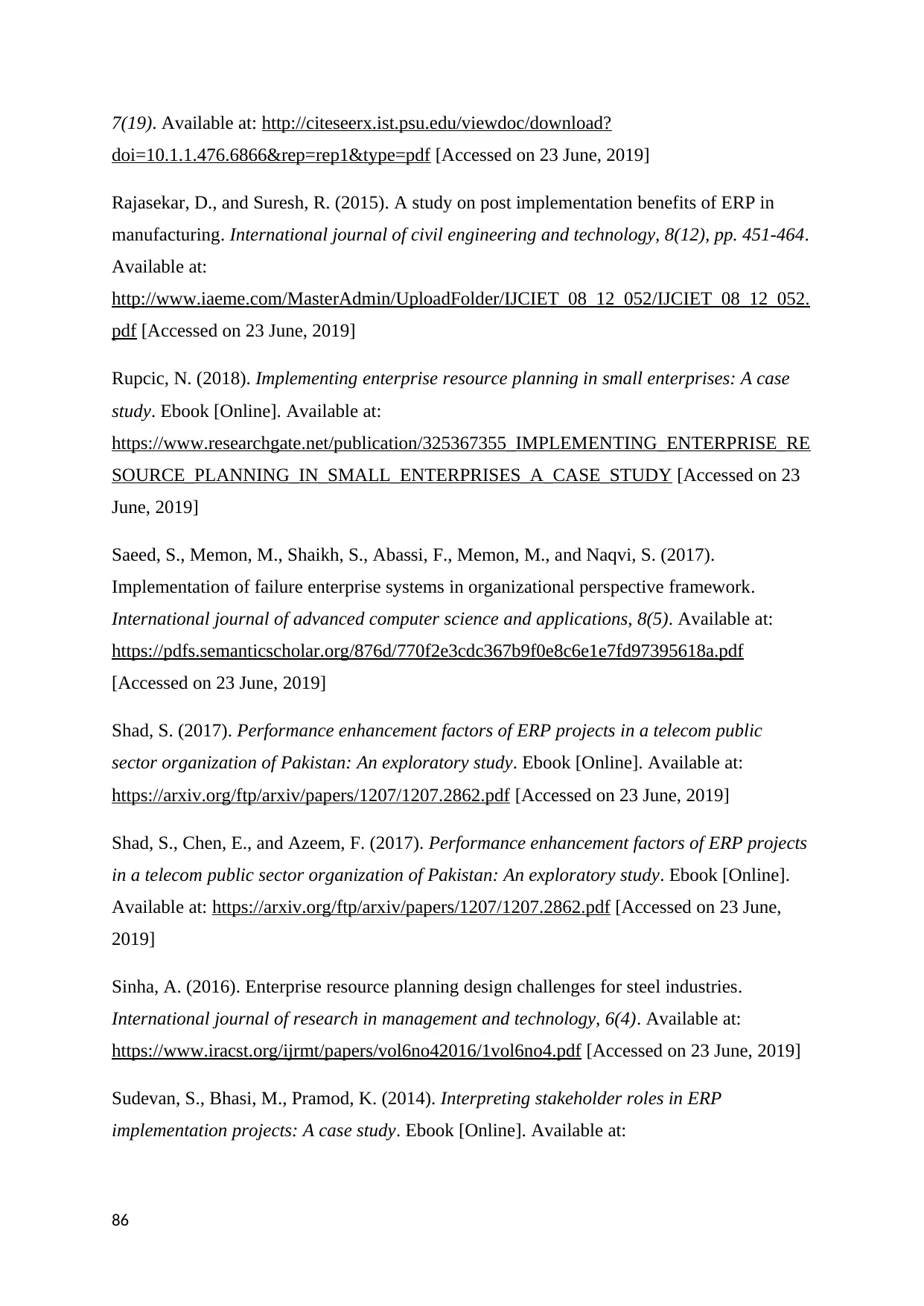
7(19). Available at: http://citeseerx.ist.psu.edu/viewdoc/download?
doi=10.1.1.476.6866&rep=rep1&type=pdf [Accessed on 23 June, 2019]
Rajasekar, D., and Suresh, R. (2015). A study on post implementation benefits of ERP in
manufacturing. International journal of civil engineering and technology, 8(12), pp. 451-464.
Available at:
http://www.iaeme.com/MasterAdmin/UploadFolder/IJCIET_08_12_052/IJCIET_08_12_052.
pdf [Accessed on 23 June, 2019]
Rupcic, N. (2018). Implementing enterprise resource planning in small enterprises: A case
study. Ebook [Online]. Available at:
https://www.researchgate.net/publication/325367355_IMPLEMENTING_ENTERPRISE_RE
SOURCE_PLANNING_IN_SMALL_ENTERPRISES_A_CASE_STUDY [Accessed on 23
June, 2019]
Saeed, S., Memon, M., Shaikh, S., Abassi, F., Memon, M., and Naqvi, S. (2017).
Implementation of failure enterprise systems in organizational perspective framework.
International journal of advanced computer science and applications, 8(5). Available at:
https://pdfs.semanticscholar.org/876d/770f2e3cdc367b9f0e8c6e1e7fd97395618a.pdf
[Accessed on 23 June, 2019]
Shad, S. (2017). Performance enhancement factors of ERP projects in a telecom public
sector organization of Pakistan: An exploratory study. Ebook [Online]. Available at:
https://arxiv.org/ftp/arxiv/papers/1207/1207.2862.pdf [Accessed on 23 June, 2019]
Shad, S., Chen, E., and Azeem, F. (2017). Performance enhancement factors of ERP projects
in a telecom public sector organization of Pakistan: An exploratory study. Ebook [Online].
Available at: https://arxiv.org/ftp/arxiv/papers/1207/1207.2862.pdf [Accessed on 23 June,
2019]
Sinha, A. (2016). Enterprise resource planning design challenges for steel industries.
International journal of research in management and technology, 6(4). Available at:
https://www.iracst.org/ijrmt/papers/vol6no42016/1vol6no4.pdf [Accessed on 23 June, 2019]
Sudevan, S., Bhasi, M., Pramod, K. (2014). Interpreting stakeholder roles in ERP
implementation projects: A case study. Ebook [Online]. Available at:
86
doi=10.1.1.476.6866&rep=rep1&type=pdf [Accessed on 23 June, 2019]
Rajasekar, D., and Suresh, R. (2015). A study on post implementation benefits of ERP in
manufacturing. International journal of civil engineering and technology, 8(12), pp. 451-464.
Available at:
http://www.iaeme.com/MasterAdmin/UploadFolder/IJCIET_08_12_052/IJCIET_08_12_052.
pdf [Accessed on 23 June, 2019]
Rupcic, N. (2018). Implementing enterprise resource planning in small enterprises: A case
study. Ebook [Online]. Available at:
https://www.researchgate.net/publication/325367355_IMPLEMENTING_ENTERPRISE_RE
SOURCE_PLANNING_IN_SMALL_ENTERPRISES_A_CASE_STUDY [Accessed on 23
June, 2019]
Saeed, S., Memon, M., Shaikh, S., Abassi, F., Memon, M., and Naqvi, S. (2017).
Implementation of failure enterprise systems in organizational perspective framework.
International journal of advanced computer science and applications, 8(5). Available at:
https://pdfs.semanticscholar.org/876d/770f2e3cdc367b9f0e8c6e1e7fd97395618a.pdf
[Accessed on 23 June, 2019]
Shad, S. (2017). Performance enhancement factors of ERP projects in a telecom public
sector organization of Pakistan: An exploratory study. Ebook [Online]. Available at:
https://arxiv.org/ftp/arxiv/papers/1207/1207.2862.pdf [Accessed on 23 June, 2019]
Shad, S., Chen, E., and Azeem, F. (2017). Performance enhancement factors of ERP projects
in a telecom public sector organization of Pakistan: An exploratory study. Ebook [Online].
Available at: https://arxiv.org/ftp/arxiv/papers/1207/1207.2862.pdf [Accessed on 23 June,
2019]
Sinha, A. (2016). Enterprise resource planning design challenges for steel industries.
International journal of research in management and technology, 6(4). Available at:
https://www.iracst.org/ijrmt/papers/vol6no42016/1vol6no4.pdf [Accessed on 23 June, 2019]
Sudevan, S., Bhasi, M., Pramod, K. (2014). Interpreting stakeholder roles in ERP
implementation projects: A case study. Ebook [Online]. Available at:
86
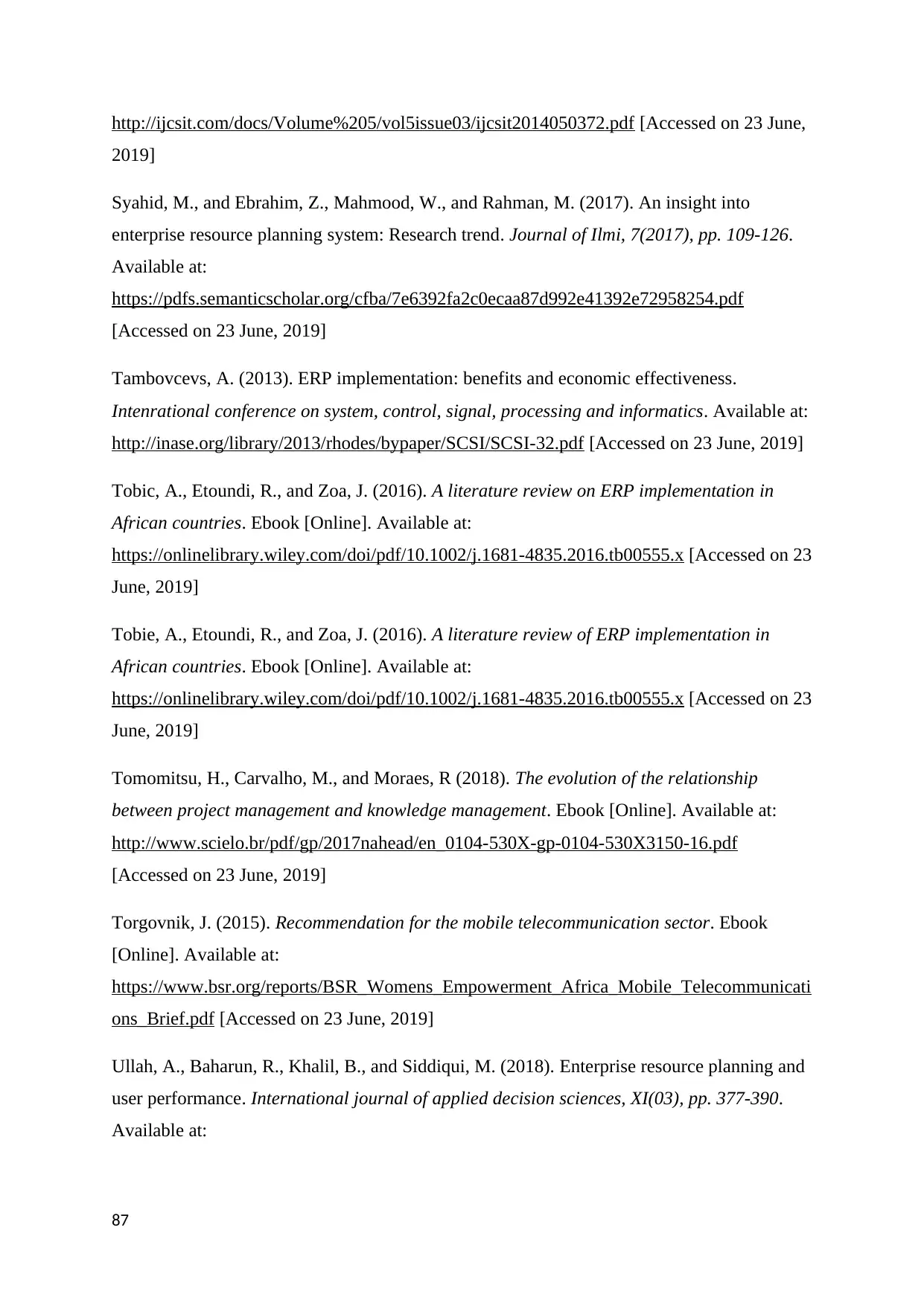
http://ijcsit.com/docs/Volume%205/vol5issue03/ijcsit2014050372.pdf [Accessed on 23 June,
2019]
Syahid, M., and Ebrahim, Z., Mahmood, W., and Rahman, M. (2017). An insight into
enterprise resource planning system: Research trend. Journal of Ilmi, 7(2017), pp. 109-126.
Available at:
https://pdfs.semanticscholar.org/cfba/7e6392fa2c0ecaa87d992e41392e72958254.pdf
[Accessed on 23 June, 2019]
Tambovcevs, A. (2013). ERP implementation: benefits and economic effectiveness.
Intenrational conference on system, control, signal, processing and informatics. Available at:
http://inase.org/library/2013/rhodes/bypaper/SCSI/SCSI-32.pdf [Accessed on 23 June, 2019]
Tobic, A., Etoundi, R., and Zoa, J. (2016). A literature review on ERP implementation in
African countries. Ebook [Online]. Available at:
https://onlinelibrary.wiley.com/doi/pdf/10.1002/j.1681-4835.2016.tb00555.x [Accessed on 23
June, 2019]
Tobie, A., Etoundi, R., and Zoa, J. (2016). A literature review of ERP implementation in
African countries. Ebook [Online]. Available at:
https://onlinelibrary.wiley.com/doi/pdf/10.1002/j.1681-4835.2016.tb00555.x [Accessed on 23
June, 2019]
Tomomitsu, H., Carvalho, M., and Moraes, R (2018). The evolution of the relationship
between project management and knowledge management. Ebook [Online]. Available at:
http://www.scielo.br/pdf/gp/2017nahead/en_0104-530X-gp-0104-530X3150-16.pdf
[Accessed on 23 June, 2019]
Torgovnik, J. (2015). Recommendation for the mobile telecommunication sector. Ebook
[Online]. Available at:
https://www.bsr.org/reports/BSR_Womens_Empowerment_Africa_Mobile_Telecommunicati
ons_Brief.pdf [Accessed on 23 June, 2019]
Ullah, A., Baharun, R., Khalil, B., and Siddiqui, M. (2018). Enterprise resource planning and
user performance. International journal of applied decision sciences, XI(03), pp. 377-390.
Available at:
87
2019]
Syahid, M., and Ebrahim, Z., Mahmood, W., and Rahman, M. (2017). An insight into
enterprise resource planning system: Research trend. Journal of Ilmi, 7(2017), pp. 109-126.
Available at:
https://pdfs.semanticscholar.org/cfba/7e6392fa2c0ecaa87d992e41392e72958254.pdf
[Accessed on 23 June, 2019]
Tambovcevs, A. (2013). ERP implementation: benefits and economic effectiveness.
Intenrational conference on system, control, signal, processing and informatics. Available at:
http://inase.org/library/2013/rhodes/bypaper/SCSI/SCSI-32.pdf [Accessed on 23 June, 2019]
Tobic, A., Etoundi, R., and Zoa, J. (2016). A literature review on ERP implementation in
African countries. Ebook [Online]. Available at:
https://onlinelibrary.wiley.com/doi/pdf/10.1002/j.1681-4835.2016.tb00555.x [Accessed on 23
June, 2019]
Tobie, A., Etoundi, R., and Zoa, J. (2016). A literature review of ERP implementation in
African countries. Ebook [Online]. Available at:
https://onlinelibrary.wiley.com/doi/pdf/10.1002/j.1681-4835.2016.tb00555.x [Accessed on 23
June, 2019]
Tomomitsu, H., Carvalho, M., and Moraes, R (2018). The evolution of the relationship
between project management and knowledge management. Ebook [Online]. Available at:
http://www.scielo.br/pdf/gp/2017nahead/en_0104-530X-gp-0104-530X3150-16.pdf
[Accessed on 23 June, 2019]
Torgovnik, J. (2015). Recommendation for the mobile telecommunication sector. Ebook
[Online]. Available at:
https://www.bsr.org/reports/BSR_Womens_Empowerment_Africa_Mobile_Telecommunicati
ons_Brief.pdf [Accessed on 23 June, 2019]
Ullah, A., Baharun, R., Khalil, B., and Siddiqui, M. (2018). Enterprise resource planning and
user performance. International journal of applied decision sciences, XI(03), pp. 377-390.
Available at:
87
Secure Best Marks with AI Grader
Need help grading? Try our AI Grader for instant feedback on your assignments.
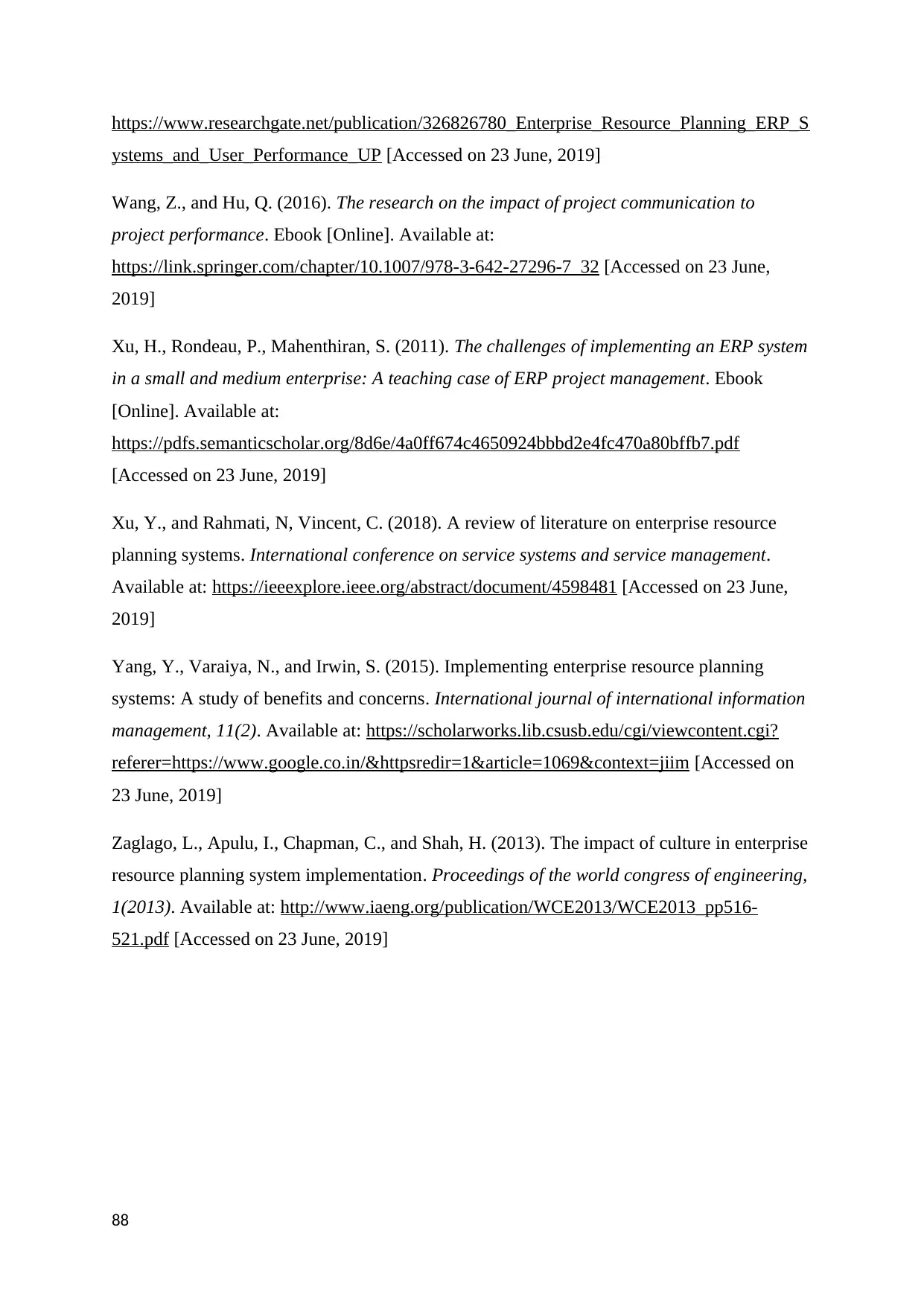
https://www.researchgate.net/publication/326826780_Enterprise_Resource_Planning_ERP_S
ystems_and_User_Performance_UP [Accessed on 23 June, 2019]
Wang, Z., and Hu, Q. (2016). The research on the impact of project communication to
project performance. Ebook [Online]. Available at:
https://link.springer.com/chapter/10.1007/978-3-642-27296-7_32 [Accessed on 23 June,
2019]
Xu, H., Rondeau, P., Mahenthiran, S. (2011). The challenges of implementing an ERP system
in a small and medium enterprise: A teaching case of ERP project management. Ebook
[Online]. Available at:
https://pdfs.semanticscholar.org/8d6e/4a0ff674c4650924bbbd2e4fc470a80bffb7.pdf
[Accessed on 23 June, 2019]
Xu, Y., and Rahmati, N, Vincent, C. (2018). A review of literature on enterprise resource
planning systems. International conference on service systems and service management.
Available at: https://ieeexplore.ieee.org/abstract/document/4598481 [Accessed on 23 June,
2019]
Yang, Y., Varaiya, N., and Irwin, S. (2015). Implementing enterprise resource planning
systems: A study of benefits and concerns. International journal of international information
management, 11(2). Available at: https://scholarworks.lib.csusb.edu/cgi/viewcontent.cgi?
referer=https://www.google.co.in/&httpsredir=1&article=1069&context=jiim [Accessed on
23 June, 2019]
Zaglago, L., Apulu, I., Chapman, C., and Shah, H. (2013). The impact of culture in enterprise
resource planning system implementation. Proceedings of the world congress of engineering,
1(2013). Available at: http://www.iaeng.org/publication/WCE2013/WCE2013_pp516-
521.pdf [Accessed on 23 June, 2019]
88
ystems_and_User_Performance_UP [Accessed on 23 June, 2019]
Wang, Z., and Hu, Q. (2016). The research on the impact of project communication to
project performance. Ebook [Online]. Available at:
https://link.springer.com/chapter/10.1007/978-3-642-27296-7_32 [Accessed on 23 June,
2019]
Xu, H., Rondeau, P., Mahenthiran, S. (2011). The challenges of implementing an ERP system
in a small and medium enterprise: A teaching case of ERP project management. Ebook
[Online]. Available at:
https://pdfs.semanticscholar.org/8d6e/4a0ff674c4650924bbbd2e4fc470a80bffb7.pdf
[Accessed on 23 June, 2019]
Xu, Y., and Rahmati, N, Vincent, C. (2018). A review of literature on enterprise resource
planning systems. International conference on service systems and service management.
Available at: https://ieeexplore.ieee.org/abstract/document/4598481 [Accessed on 23 June,
2019]
Yang, Y., Varaiya, N., and Irwin, S. (2015). Implementing enterprise resource planning
systems: A study of benefits and concerns. International journal of international information
management, 11(2). Available at: https://scholarworks.lib.csusb.edu/cgi/viewcontent.cgi?
referer=https://www.google.co.in/&httpsredir=1&article=1069&context=jiim [Accessed on
23 June, 2019]
Zaglago, L., Apulu, I., Chapman, C., and Shah, H. (2013). The impact of culture in enterprise
resource planning system implementation. Proceedings of the world congress of engineering,
1(2013). Available at: http://www.iaeng.org/publication/WCE2013/WCE2013_pp516-
521.pdf [Accessed on 23 June, 2019]
88
1 out of 89
Related Documents
Your All-in-One AI-Powered Toolkit for Academic Success.
+13062052269
info@desklib.com
Available 24*7 on WhatsApp / Email
![[object Object]](/_next/static/media/star-bottom.7253800d.svg)
Unlock your academic potential
© 2024 | Zucol Services PVT LTD | All rights reserved.





